Psychological Contract in Collaborating Economies: Western World Vs China
VerifiedAdded on 2023/04/21
|82
|20673
|342
AI Summary
This study aims to compare the impact of western and Chinese psychological contracts on employee motivation and engagement in the hospitality industry of China. It examines the fulfillment of current Western and Chinese psychological contract practices for both Chinese and foreign employees. The research focuses on the human resource system of the hospitality industry in Suzhou, China.
Contribute Materials
Your contribution can guide someone’s learning journey. Share your
documents today.
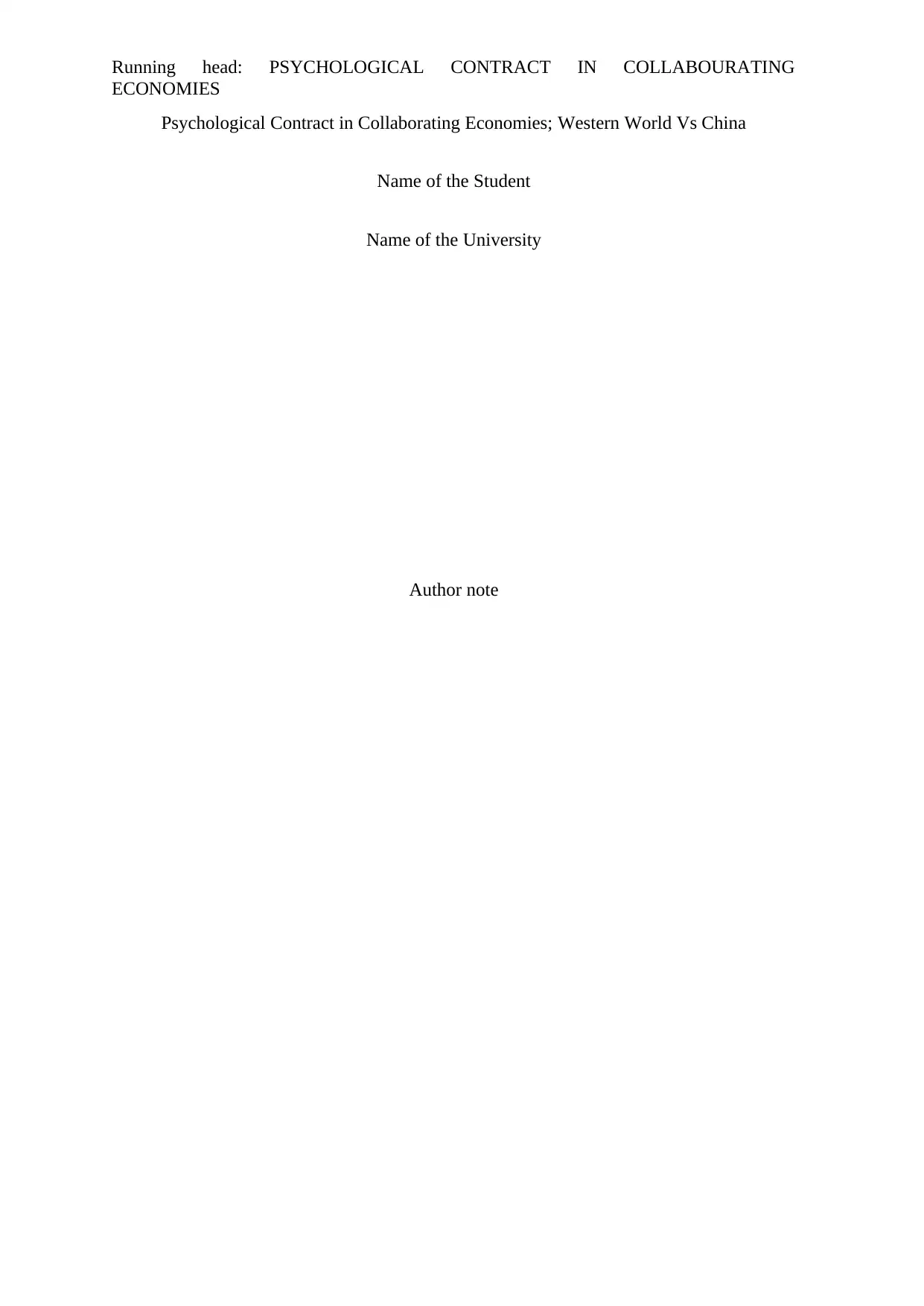
Running head: PSYCHOLOGICAL CONTRACT IN COLLABOURATING
ECONOMIES
Psychological Contract in Collaborating Economies; Western World Vs China
Name of the Student
Name of the University
Author note
ECONOMIES
Psychological Contract in Collaborating Economies; Western World Vs China
Name of the Student
Name of the University
Author note
Secure Best Marks with AI Grader
Need help grading? Try our AI Grader for instant feedback on your assignments.
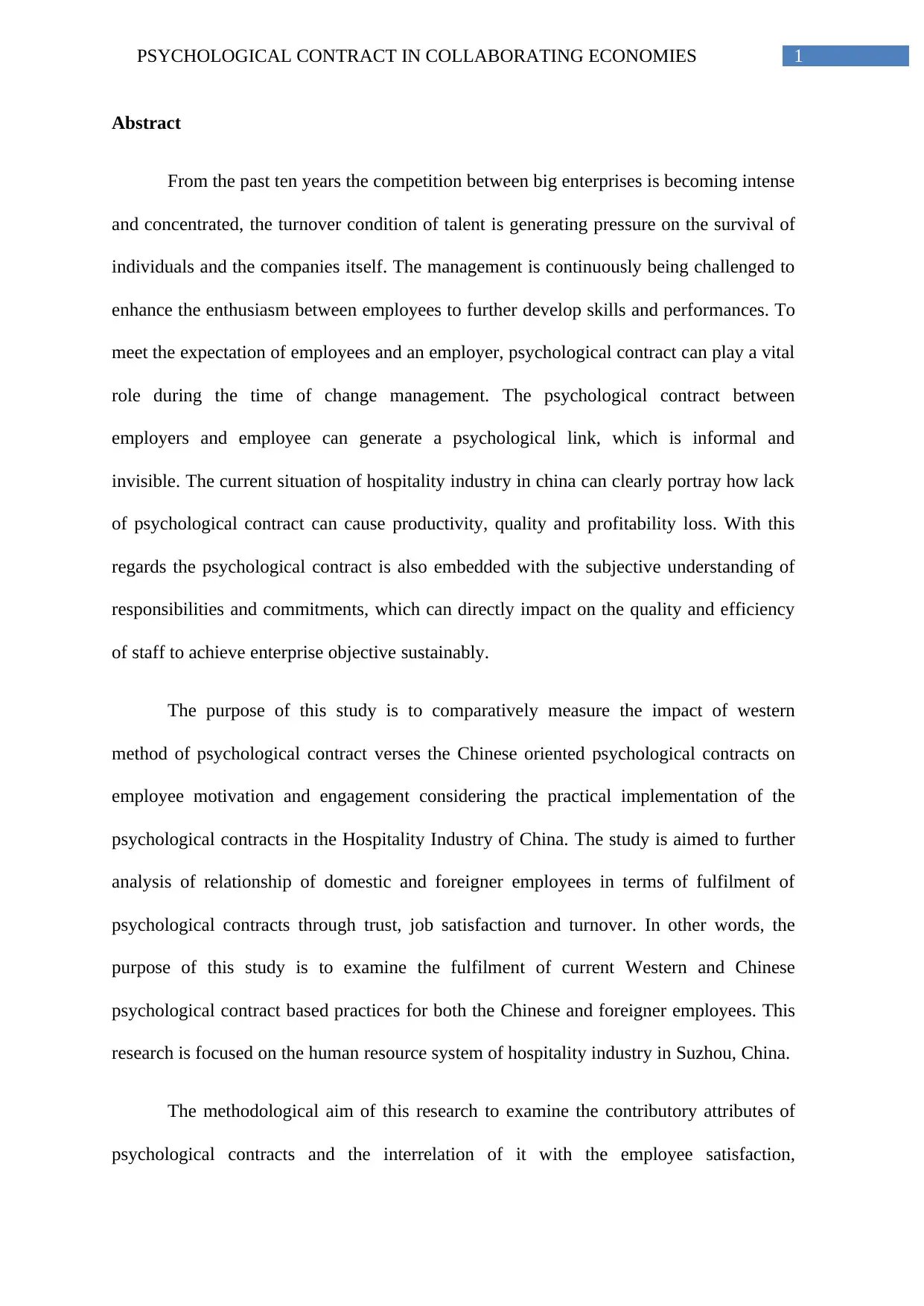
1PSYCHOLOGICAL CONTRACT IN COLLABORATING ECONOMIES
Abstract
From the past ten years the competition between big enterprises is becoming intense
and concentrated, the turnover condition of talent is generating pressure on the survival of
individuals and the companies itself. The management is continuously being challenged to
enhance the enthusiasm between employees to further develop skills and performances. To
meet the expectation of employees and an employer, psychological contract can play a vital
role during the time of change management. The psychological contract between
employers and employee can generate a psychological link, which is informal and
invisible. The current situation of hospitality industry in china can clearly portray how lack
of psychological contract can cause productivity, quality and profitability loss. With this
regards the psychological contract is also embedded with the subjective understanding of
responsibilities and commitments, which can directly impact on the quality and efficiency
of staff to achieve enterprise objective sustainably.
The purpose of this study is to comparatively measure the impact of western
method of psychological contract verses the Chinese oriented psychological contracts on
employee motivation and engagement considering the practical implementation of the
psychological contracts in the Hospitality Industry of China. The study is aimed to further
analysis of relationship of domestic and foreigner employees in terms of fulfilment of
psychological contracts through trust, job satisfaction and turnover. In other words, the
purpose of this study is to examine the fulfilment of current Western and Chinese
psychological contract based practices for both the Chinese and foreigner employees. This
research is focused on the human resource system of hospitality industry in Suzhou, China.
The methodological aim of this research to examine the contributory attributes of
psychological contracts and the interrelation of it with the employee satisfaction,
Abstract
From the past ten years the competition between big enterprises is becoming intense
and concentrated, the turnover condition of talent is generating pressure on the survival of
individuals and the companies itself. The management is continuously being challenged to
enhance the enthusiasm between employees to further develop skills and performances. To
meet the expectation of employees and an employer, psychological contract can play a vital
role during the time of change management. The psychological contract between
employers and employee can generate a psychological link, which is informal and
invisible. The current situation of hospitality industry in china can clearly portray how lack
of psychological contract can cause productivity, quality and profitability loss. With this
regards the psychological contract is also embedded with the subjective understanding of
responsibilities and commitments, which can directly impact on the quality and efficiency
of staff to achieve enterprise objective sustainably.
The purpose of this study is to comparatively measure the impact of western
method of psychological contract verses the Chinese oriented psychological contracts on
employee motivation and engagement considering the practical implementation of the
psychological contracts in the Hospitality Industry of China. The study is aimed to further
analysis of relationship of domestic and foreigner employees in terms of fulfilment of
psychological contracts through trust, job satisfaction and turnover. In other words, the
purpose of this study is to examine the fulfilment of current Western and Chinese
psychological contract based practices for both the Chinese and foreigner employees. This
research is focused on the human resource system of hospitality industry in Suzhou, China.
The methodological aim of this research to examine the contributory attributes of
psychological contracts and the interrelation of it with the employee satisfaction,
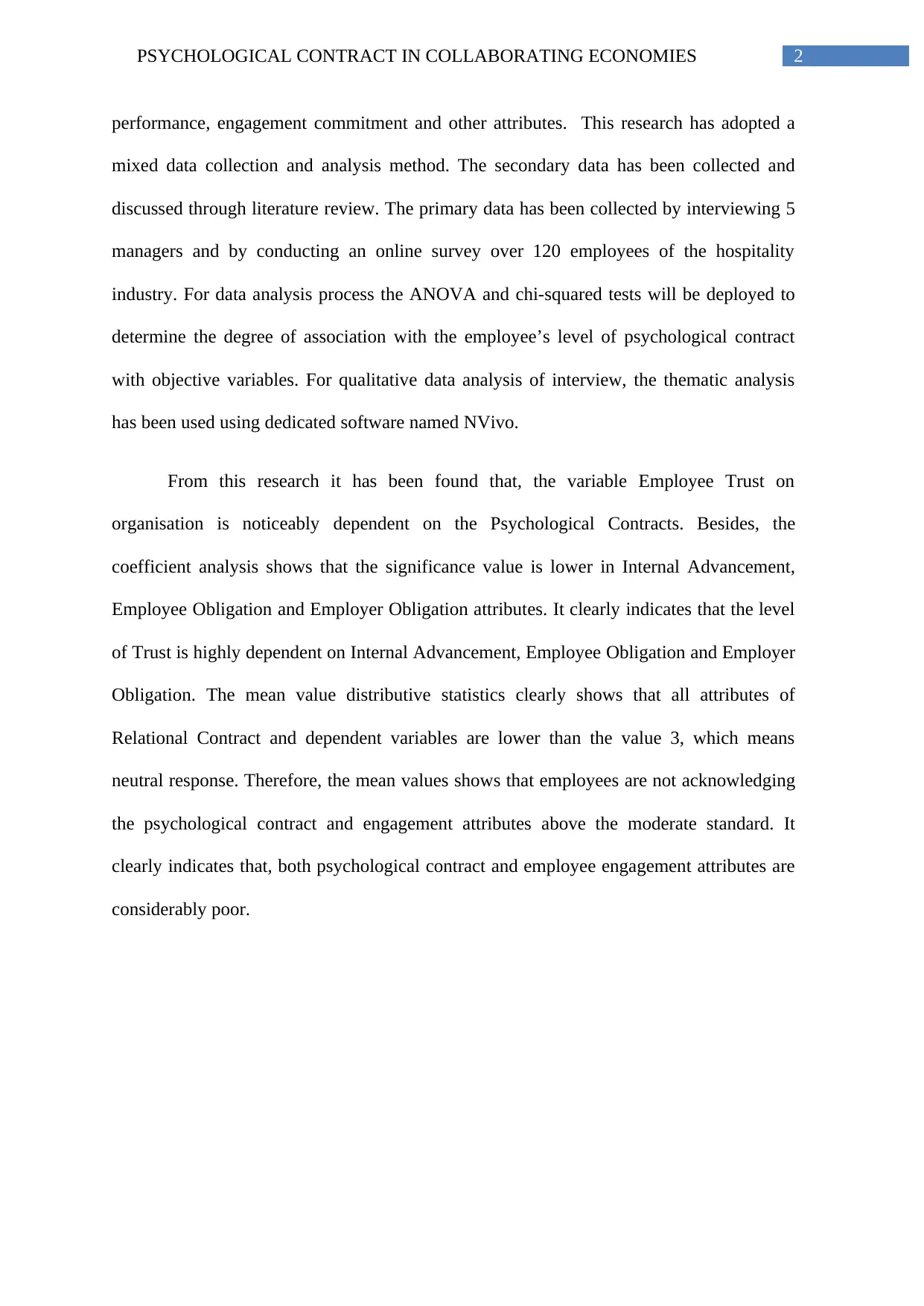
2PSYCHOLOGICAL CONTRACT IN COLLABORATING ECONOMIES
performance, engagement commitment and other attributes. This research has adopted a
mixed data collection and analysis method. The secondary data has been collected and
discussed through literature review. The primary data has been collected by interviewing 5
managers and by conducting an online survey over 120 employees of the hospitality
industry. For data analysis process the ANOVA and chi-squared tests will be deployed to
determine the degree of association with the employee’s level of psychological contract
with objective variables. For qualitative data analysis of interview, the thematic analysis
has been used using dedicated software named NVivo.
From this research it has been found that, the variable Employee Trust on
organisation is noticeably dependent on the Psychological Contracts. Besides, the
coefficient analysis shows that the significance value is lower in Internal Advancement,
Employee Obligation and Employer Obligation attributes. It clearly indicates that the level
of Trust is highly dependent on Internal Advancement, Employee Obligation and Employer
Obligation. The mean value distributive statistics clearly shows that all attributes of
Relational Contract and dependent variables are lower than the value 3, which means
neutral response. Therefore, the mean values shows that employees are not acknowledging
the psychological contract and engagement attributes above the moderate standard. It
clearly indicates that, both psychological contract and employee engagement attributes are
considerably poor.
performance, engagement commitment and other attributes. This research has adopted a
mixed data collection and analysis method. The secondary data has been collected and
discussed through literature review. The primary data has been collected by interviewing 5
managers and by conducting an online survey over 120 employees of the hospitality
industry. For data analysis process the ANOVA and chi-squared tests will be deployed to
determine the degree of association with the employee’s level of psychological contract
with objective variables. For qualitative data analysis of interview, the thematic analysis
has been used using dedicated software named NVivo.
From this research it has been found that, the variable Employee Trust on
organisation is noticeably dependent on the Psychological Contracts. Besides, the
coefficient analysis shows that the significance value is lower in Internal Advancement,
Employee Obligation and Employer Obligation attributes. It clearly indicates that the level
of Trust is highly dependent on Internal Advancement, Employee Obligation and Employer
Obligation. The mean value distributive statistics clearly shows that all attributes of
Relational Contract and dependent variables are lower than the value 3, which means
neutral response. Therefore, the mean values shows that employees are not acknowledging
the psychological contract and engagement attributes above the moderate standard. It
clearly indicates that, both psychological contract and employee engagement attributes are
considerably poor.
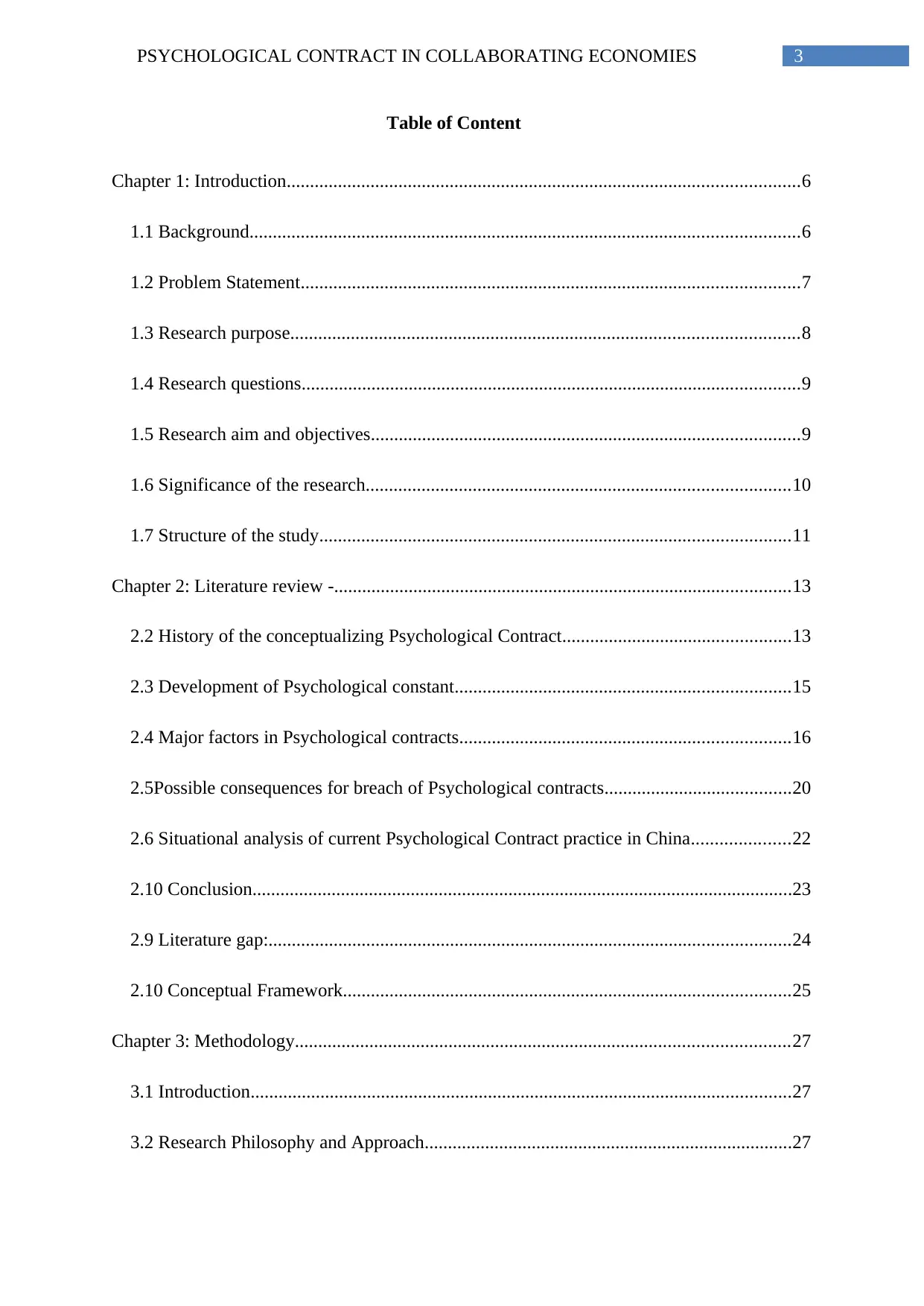
3PSYCHOLOGICAL CONTRACT IN COLLABORATING ECONOMIES
Table of Content
Chapter 1: Introduction..............................................................................................................6
1.1 Background......................................................................................................................6
1.2 Problem Statement...........................................................................................................7
1.3 Research purpose.............................................................................................................8
1.4 Research questions...........................................................................................................9
1.5 Research aim and objectives............................................................................................9
1.6 Significance of the research...........................................................................................10
1.7 Structure of the study.....................................................................................................11
Chapter 2: Literature review -..................................................................................................13
2.2 History of the conceptualizing Psychological Contract.................................................13
2.3 Development of Psychological constant........................................................................15
2.4 Major factors in Psychological contracts.......................................................................16
2.5Possible consequences for breach of Psychological contracts........................................20
2.6 Situational analysis of current Psychological Contract practice in China.....................22
2.10 Conclusion....................................................................................................................23
2.9 Literature gap:................................................................................................................24
2.10 Conceptual Framework................................................................................................25
Chapter 3: Methodology..........................................................................................................27
3.1 Introduction....................................................................................................................27
3.2 Research Philosophy and Approach...............................................................................27
Table of Content
Chapter 1: Introduction..............................................................................................................6
1.1 Background......................................................................................................................6
1.2 Problem Statement...........................................................................................................7
1.3 Research purpose.............................................................................................................8
1.4 Research questions...........................................................................................................9
1.5 Research aim and objectives............................................................................................9
1.6 Significance of the research...........................................................................................10
1.7 Structure of the study.....................................................................................................11
Chapter 2: Literature review -..................................................................................................13
2.2 History of the conceptualizing Psychological Contract.................................................13
2.3 Development of Psychological constant........................................................................15
2.4 Major factors in Psychological contracts.......................................................................16
2.5Possible consequences for breach of Psychological contracts........................................20
2.6 Situational analysis of current Psychological Contract practice in China.....................22
2.10 Conclusion....................................................................................................................23
2.9 Literature gap:................................................................................................................24
2.10 Conceptual Framework................................................................................................25
Chapter 3: Methodology..........................................................................................................27
3.1 Introduction....................................................................................................................27
3.2 Research Philosophy and Approach...............................................................................27
Secure Best Marks with AI Grader
Need help grading? Try our AI Grader for instant feedback on your assignments.
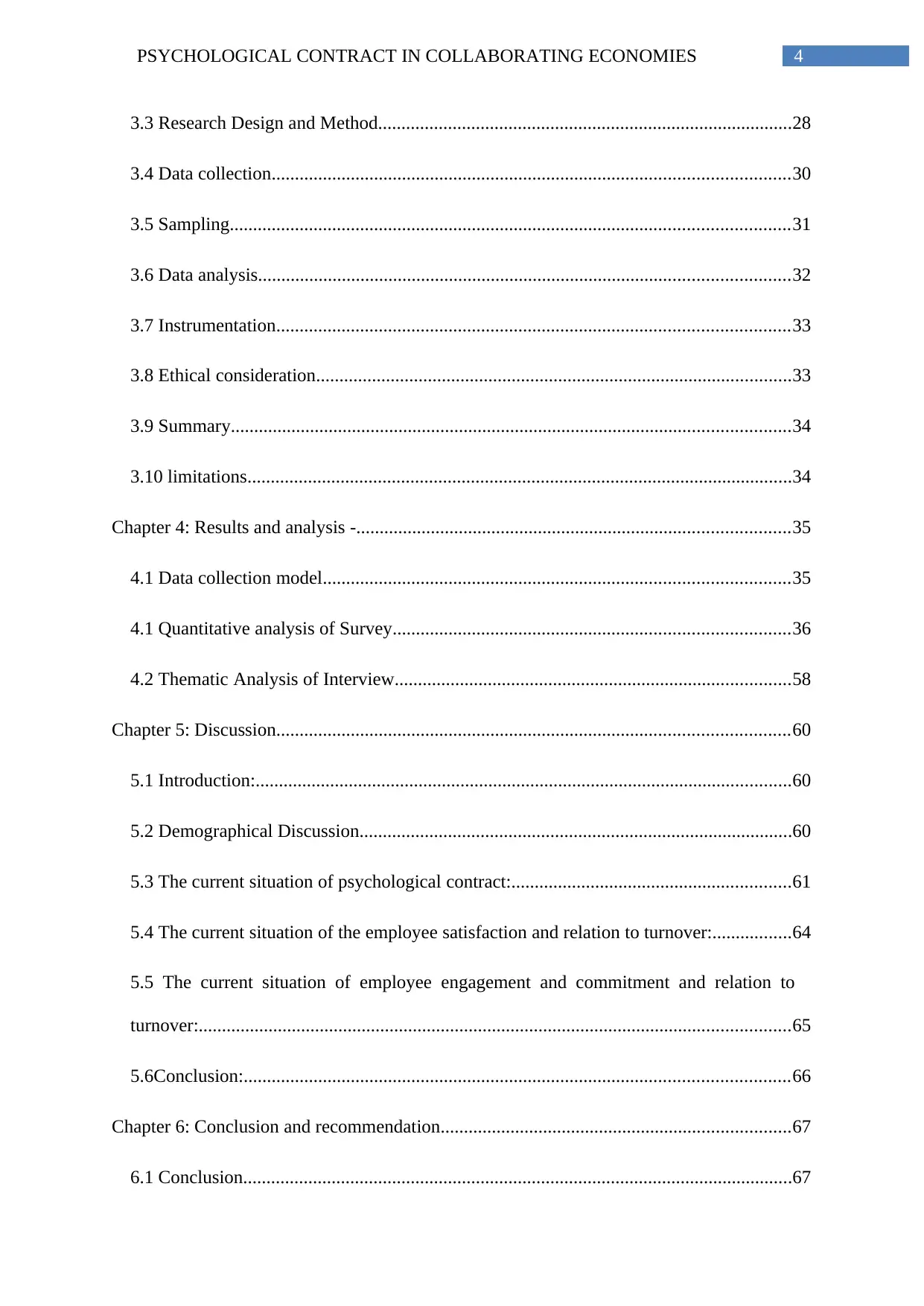
4PSYCHOLOGICAL CONTRACT IN COLLABORATING ECONOMIES
3.3 Research Design and Method.........................................................................................28
3.4 Data collection...............................................................................................................30
3.5 Sampling........................................................................................................................31
3.6 Data analysis..................................................................................................................32
3.7 Instrumentation..............................................................................................................33
3.8 Ethical consideration......................................................................................................33
3.9 Summary........................................................................................................................34
3.10 limitations.....................................................................................................................34
Chapter 4: Results and analysis -.............................................................................................35
4.1 Data collection model....................................................................................................35
4.1 Quantitative analysis of Survey.....................................................................................36
4.2 Thematic Analysis of Interview.....................................................................................58
Chapter 5: Discussion..............................................................................................................60
5.1 Introduction:...................................................................................................................60
5.2 Demographical Discussion.............................................................................................60
5.3 The current situation of psychological contract:............................................................61
5.4 The current situation of the employee satisfaction and relation to turnover:.................64
5.5 The current situation of employee engagement and commitment and relation to
turnover:...............................................................................................................................65
5.6Conclusion:.....................................................................................................................66
Chapter 6: Conclusion and recommendation...........................................................................67
6.1 Conclusion......................................................................................................................67
3.3 Research Design and Method.........................................................................................28
3.4 Data collection...............................................................................................................30
3.5 Sampling........................................................................................................................31
3.6 Data analysis..................................................................................................................32
3.7 Instrumentation..............................................................................................................33
3.8 Ethical consideration......................................................................................................33
3.9 Summary........................................................................................................................34
3.10 limitations.....................................................................................................................34
Chapter 4: Results and analysis -.............................................................................................35
4.1 Data collection model....................................................................................................35
4.1 Quantitative analysis of Survey.....................................................................................36
4.2 Thematic Analysis of Interview.....................................................................................58
Chapter 5: Discussion..............................................................................................................60
5.1 Introduction:...................................................................................................................60
5.2 Demographical Discussion.............................................................................................60
5.3 The current situation of psychological contract:............................................................61
5.4 The current situation of the employee satisfaction and relation to turnover:.................64
5.5 The current situation of employee engagement and commitment and relation to
turnover:...............................................................................................................................65
5.6Conclusion:.....................................................................................................................66
Chapter 6: Conclusion and recommendation...........................................................................67
6.1 Conclusion......................................................................................................................67

5PSYCHOLOGICAL CONTRACT IN COLLABORATING ECONOMIES
6.2 Linking with objectives..................................................................................................69
References:...............................................................................................................................72
6.2 Linking with objectives..................................................................................................69
References:...............................................................................................................................72
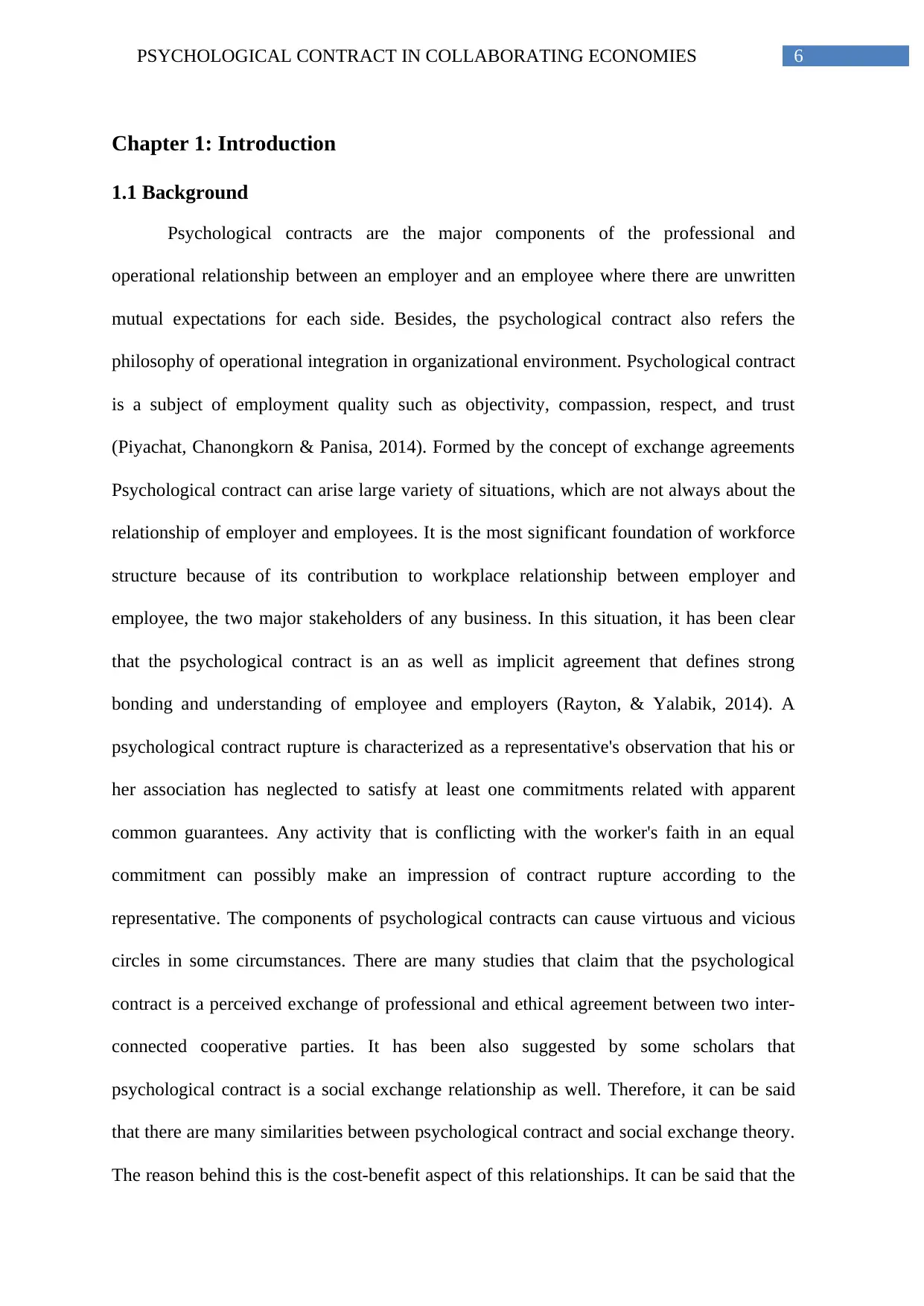
6PSYCHOLOGICAL CONTRACT IN COLLABORATING ECONOMIES
Chapter 1: Introduction
1.1 Background
Psychological contracts are the major components of the professional and
operational relationship between an employer and an employee where there are unwritten
mutual expectations for each side. Besides, the psychological contract also refers the
philosophy of operational integration in organizational environment. Psychological contract
is a subject of employment quality such as objectivity, compassion, respect, and trust
(Piyachat, Chanongkorn & Panisa, 2014). Formed by the concept of exchange agreements
Psychological contract can arise large variety of situations, which are not always about the
relationship of employer and employees. It is the most significant foundation of workforce
structure because of its contribution to workplace relationship between employer and
employee, the two major stakeholders of any business. In this situation, it has been clear
that the psychological contract is an as well as implicit agreement that defines strong
bonding and understanding of employee and employers (Rayton, & Yalabik, 2014). A
psychological contract rupture is characterized as a representative's observation that his or
her association has neglected to satisfy at least one commitments related with apparent
common guarantees. Any activity that is conflicting with the worker's faith in an equal
commitment can possibly make an impression of contract rupture according to the
representative. The components of psychological contracts can cause virtuous and vicious
circles in some circumstances. There are many studies that claim that the psychological
contract is a perceived exchange of professional and ethical agreement between two inter-
connected cooperative parties. It has been also suggested by some scholars that
psychological contract is a social exchange relationship as well. Therefore, it can be said
that there are many similarities between psychological contract and social exchange theory.
The reason behind this is the cost-benefit aspect of this relationships. It can be said that the
Chapter 1: Introduction
1.1 Background
Psychological contracts are the major components of the professional and
operational relationship between an employer and an employee where there are unwritten
mutual expectations for each side. Besides, the psychological contract also refers the
philosophy of operational integration in organizational environment. Psychological contract
is a subject of employment quality such as objectivity, compassion, respect, and trust
(Piyachat, Chanongkorn & Panisa, 2014). Formed by the concept of exchange agreements
Psychological contract can arise large variety of situations, which are not always about the
relationship of employer and employees. It is the most significant foundation of workforce
structure because of its contribution to workplace relationship between employer and
employee, the two major stakeholders of any business. In this situation, it has been clear
that the psychological contract is an as well as implicit agreement that defines strong
bonding and understanding of employee and employers (Rayton, & Yalabik, 2014). A
psychological contract rupture is characterized as a representative's observation that his or
her association has neglected to satisfy at least one commitments related with apparent
common guarantees. Any activity that is conflicting with the worker's faith in an equal
commitment can possibly make an impression of contract rupture according to the
representative. The components of psychological contracts can cause virtuous and vicious
circles in some circumstances. There are many studies that claim that the psychological
contract is a perceived exchange of professional and ethical agreement between two inter-
connected cooperative parties. It has been also suggested by some scholars that
psychological contract is a social exchange relationship as well. Therefore, it can be said
that there are many similarities between psychological contract and social exchange theory.
The reason behind this is the cost-benefit aspect of this relationships. It can be said that the
Paraphrase This Document
Need a fresh take? Get an instant paraphrase of this document with our AI Paraphraser
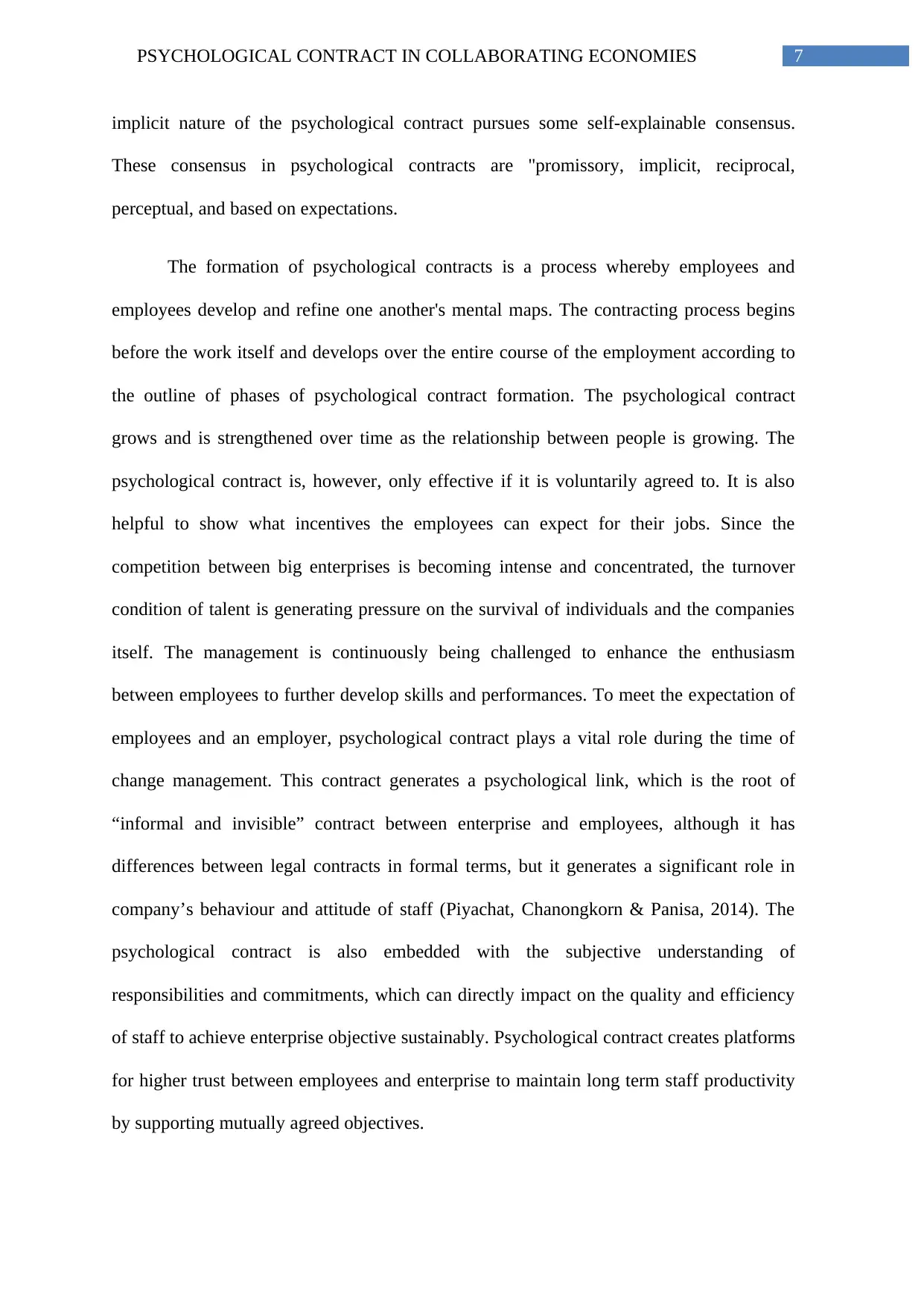
7PSYCHOLOGICAL CONTRACT IN COLLABORATING ECONOMIES
implicit nature of the psychological contract pursues some self-explainable consensus.
These consensus in psychological contracts are "promissory, implicit, reciprocal,
perceptual, and based on expectations.
The formation of psychological contracts is a process whereby employees and
employees develop and refine one another's mental maps. The contracting process begins
before the work itself and develops over the entire course of the employment according to
the outline of phases of psychological contract formation. The psychological contract
grows and is strengthened over time as the relationship between people is growing. The
psychological contract is, however, only effective if it is voluntarily agreed to. It is also
helpful to show what incentives the employees can expect for their jobs. Since the
competition between big enterprises is becoming intense and concentrated, the turnover
condition of talent is generating pressure on the survival of individuals and the companies
itself. The management is continuously being challenged to enhance the enthusiasm
between employees to further develop skills and performances. To meet the expectation of
employees and an employer, psychological contract plays a vital role during the time of
change management. This contract generates a psychological link, which is the root of
“informal and invisible” contract between enterprise and employees, although it has
differences between legal contracts in formal terms, but it generates a significant role in
company’s behaviour and attitude of staff (Piyachat, Chanongkorn & Panisa, 2014). The
psychological contract is also embedded with the subjective understanding of
responsibilities and commitments, which can directly impact on the quality and efficiency
of staff to achieve enterprise objective sustainably. Psychological contract creates platforms
for higher trust between employees and enterprise to maintain long term staff productivity
by supporting mutually agreed objectives.
implicit nature of the psychological contract pursues some self-explainable consensus.
These consensus in psychological contracts are "promissory, implicit, reciprocal,
perceptual, and based on expectations.
The formation of psychological contracts is a process whereby employees and
employees develop and refine one another's mental maps. The contracting process begins
before the work itself and develops over the entire course of the employment according to
the outline of phases of psychological contract formation. The psychological contract
grows and is strengthened over time as the relationship between people is growing. The
psychological contract is, however, only effective if it is voluntarily agreed to. It is also
helpful to show what incentives the employees can expect for their jobs. Since the
competition between big enterprises is becoming intense and concentrated, the turnover
condition of talent is generating pressure on the survival of individuals and the companies
itself. The management is continuously being challenged to enhance the enthusiasm
between employees to further develop skills and performances. To meet the expectation of
employees and an employer, psychological contract plays a vital role during the time of
change management. This contract generates a psychological link, which is the root of
“informal and invisible” contract between enterprise and employees, although it has
differences between legal contracts in formal terms, but it generates a significant role in
company’s behaviour and attitude of staff (Piyachat, Chanongkorn & Panisa, 2014). The
psychological contract is also embedded with the subjective understanding of
responsibilities and commitments, which can directly impact on the quality and efficiency
of staff to achieve enterprise objective sustainably. Psychological contract creates platforms
for higher trust between employees and enterprise to maintain long term staff productivity
by supporting mutually agreed objectives.
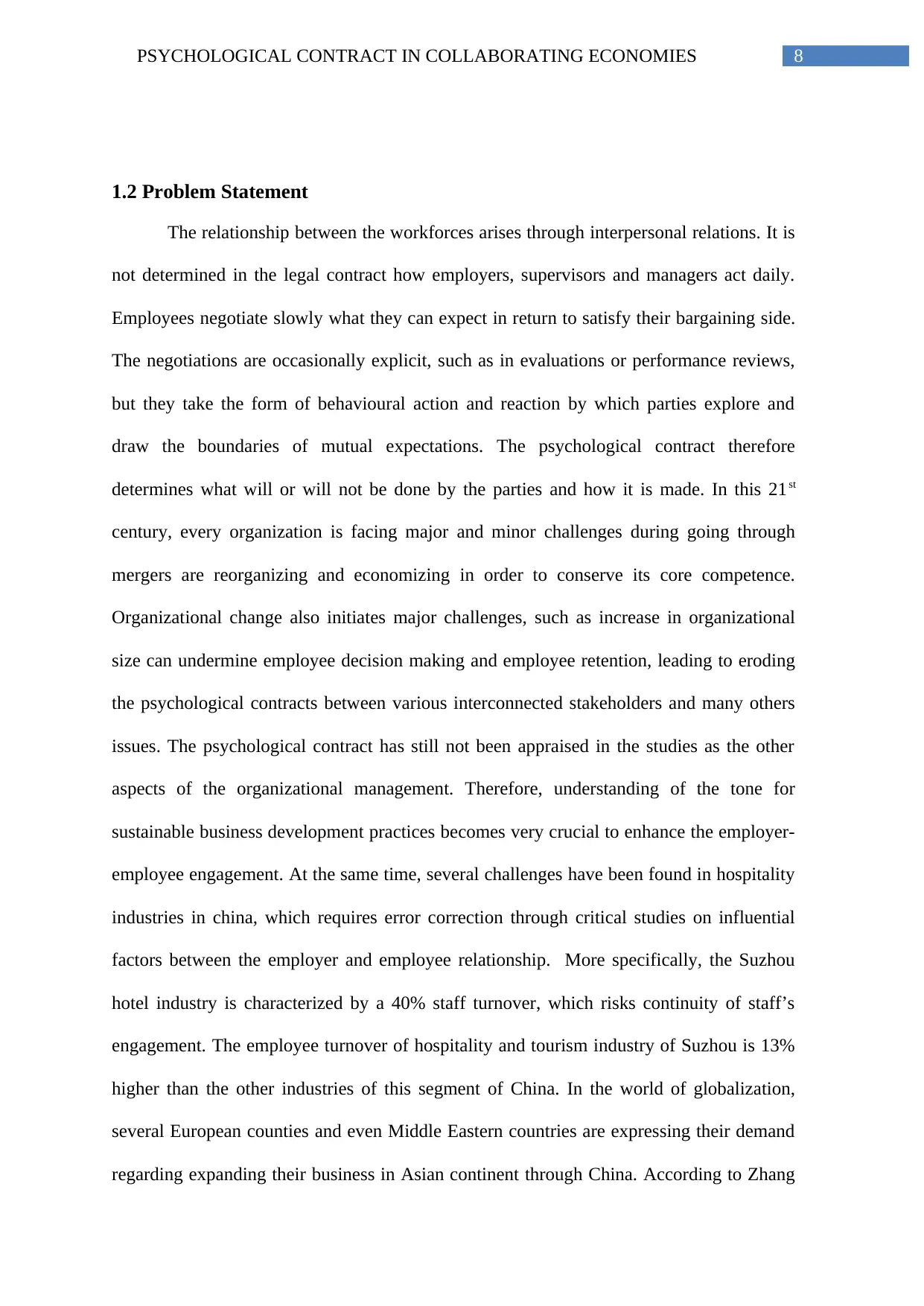
8PSYCHOLOGICAL CONTRACT IN COLLABORATING ECONOMIES
1.2 Problem Statement
The relationship between the workforces arises through interpersonal relations. It is
not determined in the legal contract how employers, supervisors and managers act daily.
Employees negotiate slowly what they can expect in return to satisfy their bargaining side.
The negotiations are occasionally explicit, such as in evaluations or performance reviews,
but they take the form of behavioural action and reaction by which parties explore and
draw the boundaries of mutual expectations. The psychological contract therefore
determines what will or will not be done by the parties and how it is made. In this 21st
century, every organization is facing major and minor challenges during going through
mergers are reorganizing and economizing in order to conserve its core competence.
Organizational change also initiates major challenges, such as increase in organizational
size can undermine employee decision making and employee retention, leading to eroding
the psychological contracts between various interconnected stakeholders and many others
issues. The psychological contract has still not been appraised in the studies as the other
aspects of the organizational management. Therefore, understanding of the tone for
sustainable business development practices becomes very crucial to enhance the employer-
employee engagement. At the same time, several challenges have been found in hospitality
industries in china, which requires error correction through critical studies on influential
factors between the employer and employee relationship. More specifically, the Suzhou
hotel industry is characterized by a 40% staff turnover, which risks continuity of staff’s
engagement. The employee turnover of hospitality and tourism industry of Suzhou is 13%
higher than the other industries of this segment of China. In the world of globalization,
several European counties and even Middle Eastern countries are expressing their demand
regarding expanding their business in Asian continent through China. According to Zhang
1.2 Problem Statement
The relationship between the workforces arises through interpersonal relations. It is
not determined in the legal contract how employers, supervisors and managers act daily.
Employees negotiate slowly what they can expect in return to satisfy their bargaining side.
The negotiations are occasionally explicit, such as in evaluations or performance reviews,
but they take the form of behavioural action and reaction by which parties explore and
draw the boundaries of mutual expectations. The psychological contract therefore
determines what will or will not be done by the parties and how it is made. In this 21st
century, every organization is facing major and minor challenges during going through
mergers are reorganizing and economizing in order to conserve its core competence.
Organizational change also initiates major challenges, such as increase in organizational
size can undermine employee decision making and employee retention, leading to eroding
the psychological contracts between various interconnected stakeholders and many others
issues. The psychological contract has still not been appraised in the studies as the other
aspects of the organizational management. Therefore, understanding of the tone for
sustainable business development practices becomes very crucial to enhance the employer-
employee engagement. At the same time, several challenges have been found in hospitality
industries in china, which requires error correction through critical studies on influential
factors between the employer and employee relationship. More specifically, the Suzhou
hotel industry is characterized by a 40% staff turnover, which risks continuity of staff’s
engagement. The employee turnover of hospitality and tourism industry of Suzhou is 13%
higher than the other industries of this segment of China. In the world of globalization,
several European counties and even Middle Eastern countries are expressing their demand
regarding expanding their business in Asian continent through China. According to Zhang
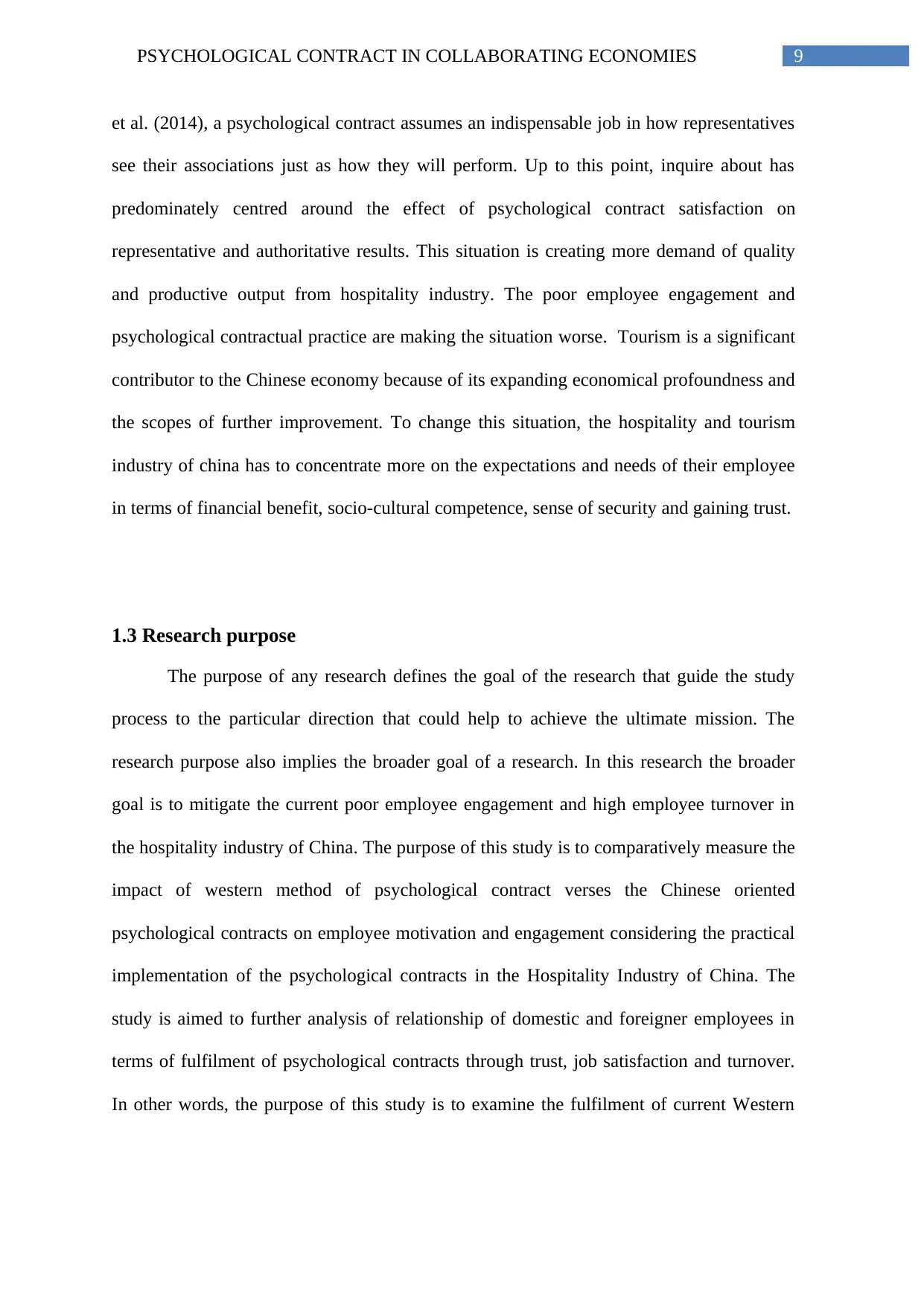
9PSYCHOLOGICAL CONTRACT IN COLLABORATING ECONOMIES
et al. (2014), a psychological contract assumes an indispensable job in how representatives
see their associations just as how they will perform. Up to this point, inquire about has
predominately centred around the effect of psychological contract satisfaction on
representative and authoritative results. This situation is creating more demand of quality
and productive output from hospitality industry. The poor employee engagement and
psychological contractual practice are making the situation worse. Tourism is a significant
contributor to the Chinese economy because of its expanding economical profoundness and
the scopes of further improvement. To change this situation, the hospitality and tourism
industry of china has to concentrate more on the expectations and needs of their employee
in terms of financial benefit, socio-cultural competence, sense of security and gaining trust.
1.3 Research purpose
The purpose of any research defines the goal of the research that guide the study
process to the particular direction that could help to achieve the ultimate mission. The
research purpose also implies the broader goal of a research. In this research the broader
goal is to mitigate the current poor employee engagement and high employee turnover in
the hospitality industry of China. The purpose of this study is to comparatively measure the
impact of western method of psychological contract verses the Chinese oriented
psychological contracts on employee motivation and engagement considering the practical
implementation of the psychological contracts in the Hospitality Industry of China. The
study is aimed to further analysis of relationship of domestic and foreigner employees in
terms of fulfilment of psychological contracts through trust, job satisfaction and turnover.
In other words, the purpose of this study is to examine the fulfilment of current Western
et al. (2014), a psychological contract assumes an indispensable job in how representatives
see their associations just as how they will perform. Up to this point, inquire about has
predominately centred around the effect of psychological contract satisfaction on
representative and authoritative results. This situation is creating more demand of quality
and productive output from hospitality industry. The poor employee engagement and
psychological contractual practice are making the situation worse. Tourism is a significant
contributor to the Chinese economy because of its expanding economical profoundness and
the scopes of further improvement. To change this situation, the hospitality and tourism
industry of china has to concentrate more on the expectations and needs of their employee
in terms of financial benefit, socio-cultural competence, sense of security and gaining trust.
1.3 Research purpose
The purpose of any research defines the goal of the research that guide the study
process to the particular direction that could help to achieve the ultimate mission. The
research purpose also implies the broader goal of a research. In this research the broader
goal is to mitigate the current poor employee engagement and high employee turnover in
the hospitality industry of China. The purpose of this study is to comparatively measure the
impact of western method of psychological contract verses the Chinese oriented
psychological contracts on employee motivation and engagement considering the practical
implementation of the psychological contracts in the Hospitality Industry of China. The
study is aimed to further analysis of relationship of domestic and foreigner employees in
terms of fulfilment of psychological contracts through trust, job satisfaction and turnover.
In other words, the purpose of this study is to examine the fulfilment of current Western
Secure Best Marks with AI Grader
Need help grading? Try our AI Grader for instant feedback on your assignments.
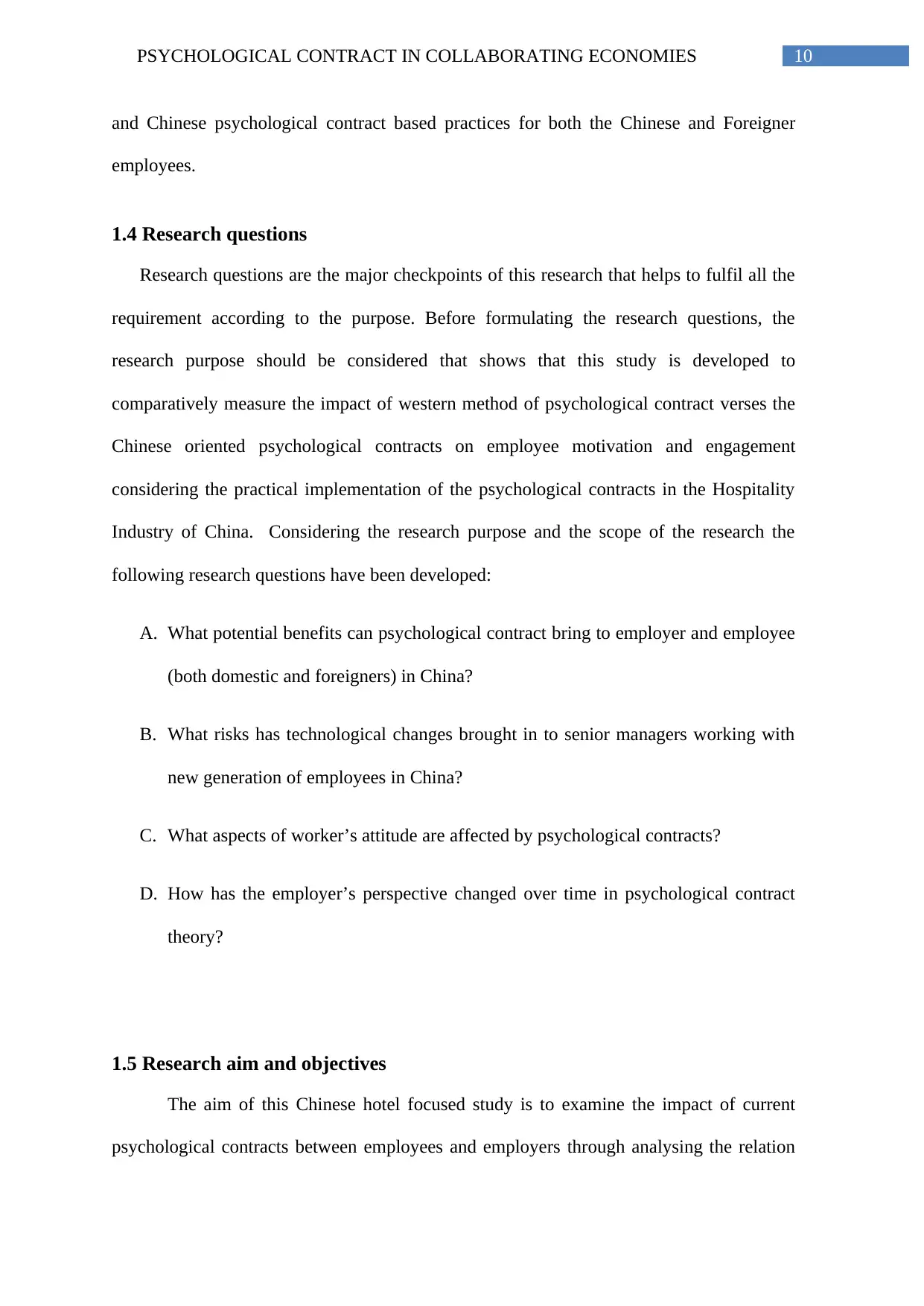
10PSYCHOLOGICAL CONTRACT IN COLLABORATING ECONOMIES
and Chinese psychological contract based practices for both the Chinese and Foreigner
employees.
1.4 Research questions
Research questions are the major checkpoints of this research that helps to fulfil all the
requirement according to the purpose. Before formulating the research questions, the
research purpose should be considered that shows that this study is developed to
comparatively measure the impact of western method of psychological contract verses the
Chinese oriented psychological contracts on employee motivation and engagement
considering the practical implementation of the psychological contracts in the Hospitality
Industry of China. Considering the research purpose and the scope of the research the
following research questions have been developed:
A. What potential benefits can psychological contract bring to employer and employee
(both domestic and foreigners) in China?
B. What risks has technological changes brought in to senior managers working with
new generation of employees in China?
C. What aspects of worker’s attitude are affected by psychological contracts?
D. How has the employer’s perspective changed over time in psychological contract
theory?
1.5 Research aim and objectives
The aim of this Chinese hotel focused study is to examine the impact of current
psychological contracts between employees and employers through analysing the relation
and Chinese psychological contract based practices for both the Chinese and Foreigner
employees.
1.4 Research questions
Research questions are the major checkpoints of this research that helps to fulfil all the
requirement according to the purpose. Before formulating the research questions, the
research purpose should be considered that shows that this study is developed to
comparatively measure the impact of western method of psychological contract verses the
Chinese oriented psychological contracts on employee motivation and engagement
considering the practical implementation of the psychological contracts in the Hospitality
Industry of China. Considering the research purpose and the scope of the research the
following research questions have been developed:
A. What potential benefits can psychological contract bring to employer and employee
(both domestic and foreigners) in China?
B. What risks has technological changes brought in to senior managers working with
new generation of employees in China?
C. What aspects of worker’s attitude are affected by psychological contracts?
D. How has the employer’s perspective changed over time in psychological contract
theory?
1.5 Research aim and objectives
The aim of this Chinese hotel focused study is to examine the impact of current
psychological contracts between employees and employers through analysing the relation
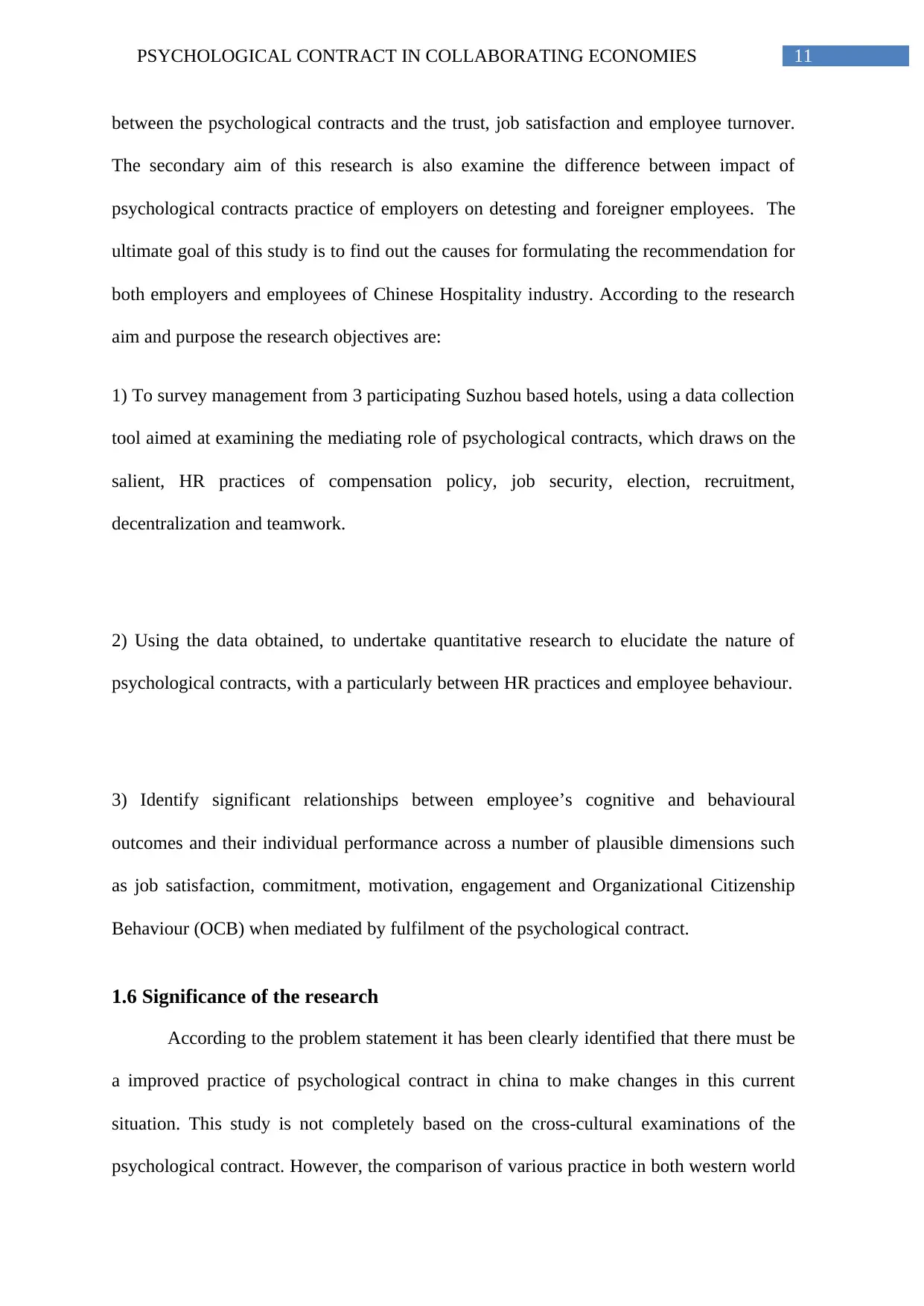
11PSYCHOLOGICAL CONTRACT IN COLLABORATING ECONOMIES
between the psychological contracts and the trust, job satisfaction and employee turnover.
The secondary aim of this research is also examine the difference between impact of
psychological contracts practice of employers on detesting and foreigner employees. The
ultimate goal of this study is to find out the causes for formulating the recommendation for
both employers and employees of Chinese Hospitality industry. According to the research
aim and purpose the research objectives are:
1) To survey management from 3 participating Suzhou based hotels, using a data collection
tool aimed at examining the mediating role of psychological contracts, which draws on the
salient, HR practices of compensation policy, job security, election, recruitment,
decentralization and teamwork.
2) Using the data obtained, to undertake quantitative research to elucidate the nature of
psychological contracts, with a particularly between HR practices and employee behaviour.
3) Identify significant relationships between employee’s cognitive and behavioural
outcomes and their individual performance across a number of plausible dimensions such
as job satisfaction, commitment, motivation, engagement and Organizational Citizenship
Behaviour (OCB) when mediated by fulfilment of the psychological contract.
1.6 Significance of the research
According to the problem statement it has been clearly identified that there must be
a improved practice of psychological contract in china to make changes in this current
situation. This study is not completely based on the cross-cultural examinations of the
psychological contract. However, the comparison of various practice in both western world
between the psychological contracts and the trust, job satisfaction and employee turnover.
The secondary aim of this research is also examine the difference between impact of
psychological contracts practice of employers on detesting and foreigner employees. The
ultimate goal of this study is to find out the causes for formulating the recommendation for
both employers and employees of Chinese Hospitality industry. According to the research
aim and purpose the research objectives are:
1) To survey management from 3 participating Suzhou based hotels, using a data collection
tool aimed at examining the mediating role of psychological contracts, which draws on the
salient, HR practices of compensation policy, job security, election, recruitment,
decentralization and teamwork.
2) Using the data obtained, to undertake quantitative research to elucidate the nature of
psychological contracts, with a particularly between HR practices and employee behaviour.
3) Identify significant relationships between employee’s cognitive and behavioural
outcomes and their individual performance across a number of plausible dimensions such
as job satisfaction, commitment, motivation, engagement and Organizational Citizenship
Behaviour (OCB) when mediated by fulfilment of the psychological contract.
1.6 Significance of the research
According to the problem statement it has been clearly identified that there must be
a improved practice of psychological contract in china to make changes in this current
situation. This study is not completely based on the cross-cultural examinations of the
psychological contract. However, the comparison of various practice in both western world
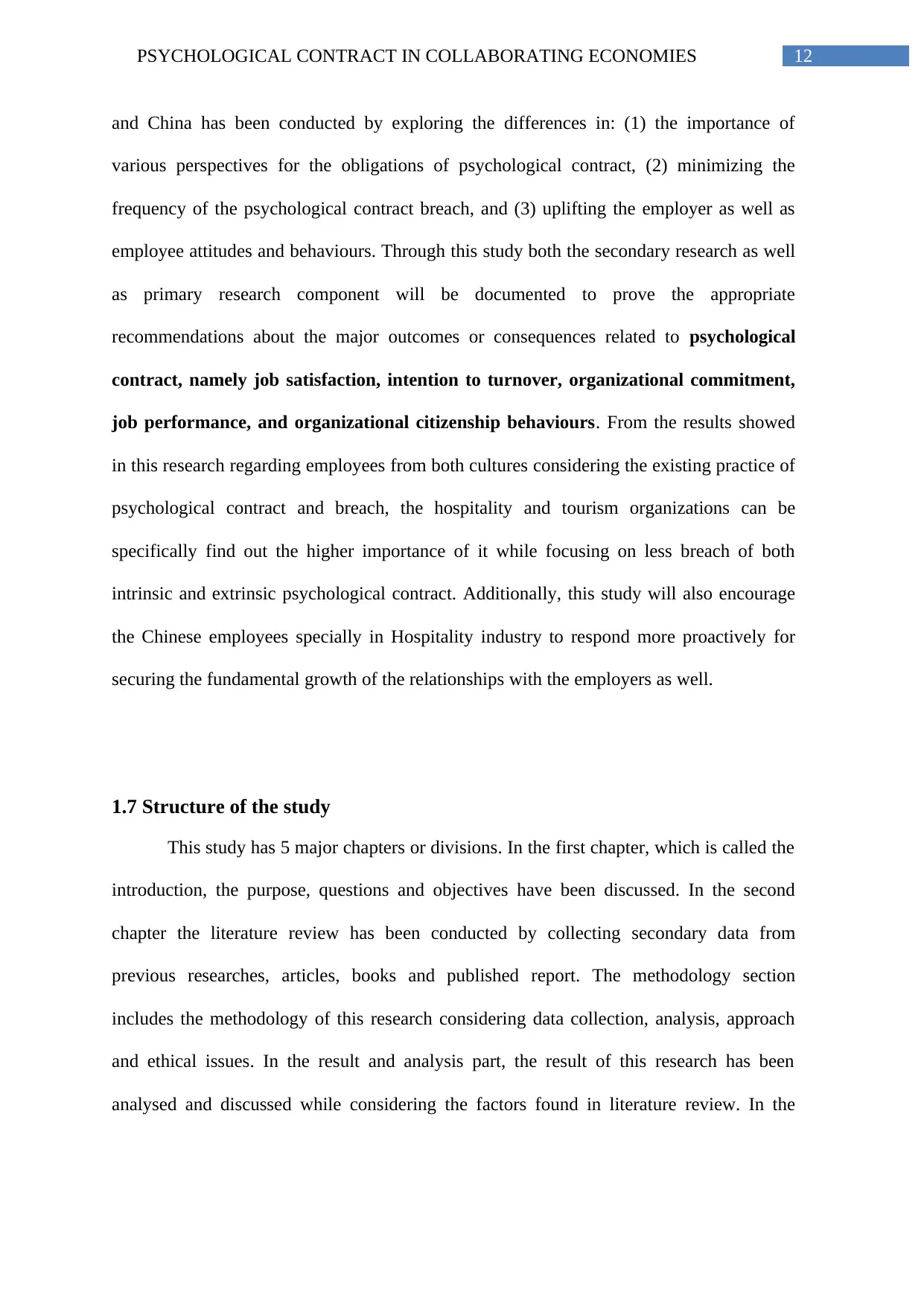
12PSYCHOLOGICAL CONTRACT IN COLLABORATING ECONOMIES
and China has been conducted by exploring the differences in: (1) the importance of
various perspectives for the obligations of psychological contract, (2) minimizing the
frequency of the psychological contract breach, and (3) uplifting the employer as well as
employee attitudes and behaviours. Through this study both the secondary research as well
as primary research component will be documented to prove the appropriate
recommendations about the major outcomes or consequences related to psychological
contract, namely job satisfaction, intention to turnover, organizational commitment,
job performance, and organizational citizenship behaviours. From the results showed
in this research regarding employees from both cultures considering the existing practice of
psychological contract and breach, the hospitality and tourism organizations can be
specifically find out the higher importance of it while focusing on less breach of both
intrinsic and extrinsic psychological contract. Additionally, this study will also encourage
the Chinese employees specially in Hospitality industry to respond more proactively for
securing the fundamental growth of the relationships with the employers as well.
1.7 Structure of the study
This study has 5 major chapters or divisions. In the first chapter, which is called the
introduction, the purpose, questions and objectives have been discussed. In the second
chapter the literature review has been conducted by collecting secondary data from
previous researches, articles, books and published report. The methodology section
includes the methodology of this research considering data collection, analysis, approach
and ethical issues. In the result and analysis part, the result of this research has been
analysed and discussed while considering the factors found in literature review. In the
and China has been conducted by exploring the differences in: (1) the importance of
various perspectives for the obligations of psychological contract, (2) minimizing the
frequency of the psychological contract breach, and (3) uplifting the employer as well as
employee attitudes and behaviours. Through this study both the secondary research as well
as primary research component will be documented to prove the appropriate
recommendations about the major outcomes or consequences related to psychological
contract, namely job satisfaction, intention to turnover, organizational commitment,
job performance, and organizational citizenship behaviours. From the results showed
in this research regarding employees from both cultures considering the existing practice of
psychological contract and breach, the hospitality and tourism organizations can be
specifically find out the higher importance of it while focusing on less breach of both
intrinsic and extrinsic psychological contract. Additionally, this study will also encourage
the Chinese employees specially in Hospitality industry to respond more proactively for
securing the fundamental growth of the relationships with the employers as well.
1.7 Structure of the study
This study has 5 major chapters or divisions. In the first chapter, which is called the
introduction, the purpose, questions and objectives have been discussed. In the second
chapter the literature review has been conducted by collecting secondary data from
previous researches, articles, books and published report. The methodology section
includes the methodology of this research considering data collection, analysis, approach
and ethical issues. In the result and analysis part, the result of this research has been
analysed and discussed while considering the factors found in literature review. In the
Paraphrase This Document
Need a fresh take? Get an instant paraphrase of this document with our AI Paraphraser
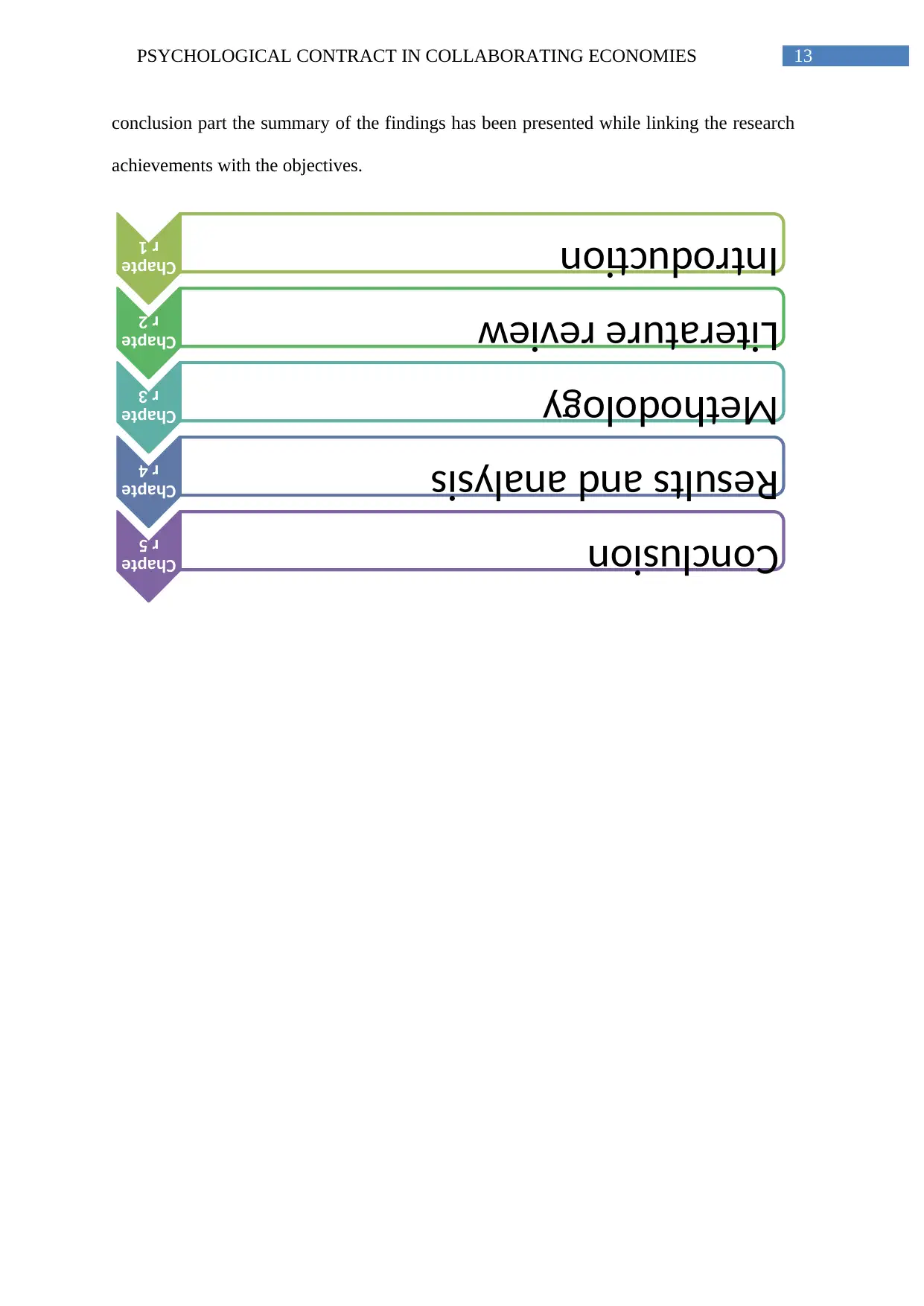
13PSYCHOLOGICAL CONTRACT IN COLLABORATING ECONOMIES
conclusion part the summary of the findings has been presented while linking the research
achievements with the objectives.
Chapte
r 1Introduction
Chapte
r 2Literature review
Chapte
r 3Methodology
Chapte
r 4Results and analysis
Chapte
r 5Conclusion
conclusion part the summary of the findings has been presented while linking the research
achievements with the objectives.
Chapte
r 1Introduction
Chapte
r 2Literature review
Chapte
r 3Methodology
Chapte
r 4Results and analysis
Chapte
r 5Conclusion
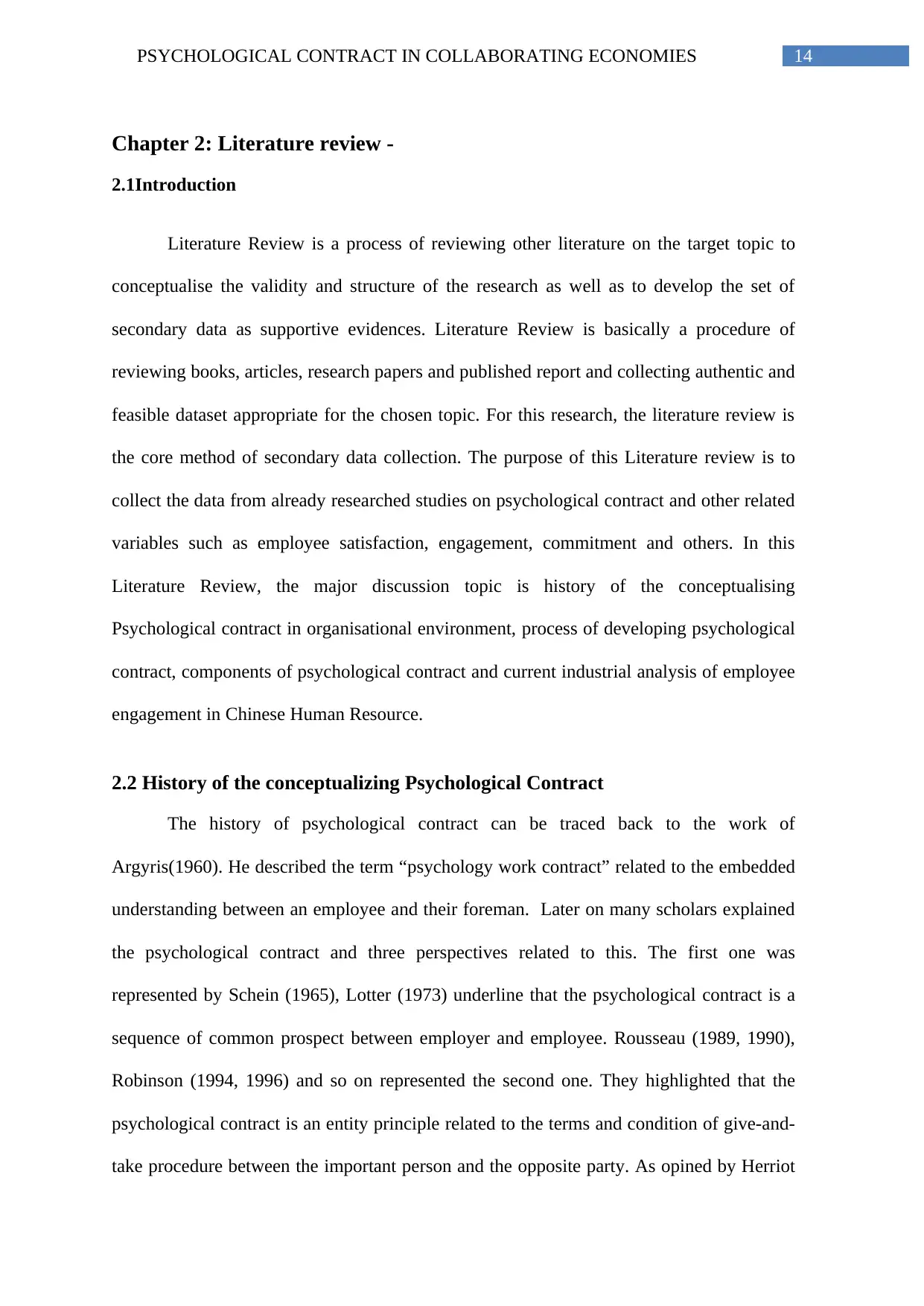
14PSYCHOLOGICAL CONTRACT IN COLLABORATING ECONOMIES
Chapter 2: Literature review -
2.1Introduction
Literature Review is a process of reviewing other literature on the target topic to
conceptualise the validity and structure of the research as well as to develop the set of
secondary data as supportive evidences. Literature Review is basically a procedure of
reviewing books, articles, research papers and published report and collecting authentic and
feasible dataset appropriate for the chosen topic. For this research, the literature review is
the core method of secondary data collection. The purpose of this Literature review is to
collect the data from already researched studies on psychological contract and other related
variables such as employee satisfaction, engagement, commitment and others. In this
Literature Review, the major discussion topic is history of the conceptualising
Psychological contract in organisational environment, process of developing psychological
contract, components of psychological contract and current industrial analysis of employee
engagement in Chinese Human Resource.
2.2 History of the conceptualizing Psychological Contract
The history of psychological contract can be traced back to the work of
Argyris(1960). He described the term “psychology work contract” related to the embedded
understanding between an employee and their foreman. Later on many scholars explained
the psychological contract and three perspectives related to this. The first one was
represented by Schein (1965), Lotter (1973) underline that the psychological contract is a
sequence of common prospect between employer and employee. Rousseau (1989, 1990),
Robinson (1994, 1996) and so on represented the second one. They highlighted that the
psychological contract is an entity principle related to the terms and condition of give-and-
take procedure between the important person and the opposite party. As opined by Herriot
Chapter 2: Literature review -
2.1Introduction
Literature Review is a process of reviewing other literature on the target topic to
conceptualise the validity and structure of the research as well as to develop the set of
secondary data as supportive evidences. Literature Review is basically a procedure of
reviewing books, articles, research papers and published report and collecting authentic and
feasible dataset appropriate for the chosen topic. For this research, the literature review is
the core method of secondary data collection. The purpose of this Literature review is to
collect the data from already researched studies on psychological contract and other related
variables such as employee satisfaction, engagement, commitment and others. In this
Literature Review, the major discussion topic is history of the conceptualising
Psychological contract in organisational environment, process of developing psychological
contract, components of psychological contract and current industrial analysis of employee
engagement in Chinese Human Resource.
2.2 History of the conceptualizing Psychological Contract
The history of psychological contract can be traced back to the work of
Argyris(1960). He described the term “psychology work contract” related to the embedded
understanding between an employee and their foreman. Later on many scholars explained
the psychological contract and three perspectives related to this. The first one was
represented by Schein (1965), Lotter (1973) underline that the psychological contract is a
sequence of common prospect between employer and employee. Rousseau (1989, 1990),
Robinson (1994, 1996) and so on represented the second one. They highlighted that the
psychological contract is an entity principle related to the terms and condition of give-and-
take procedure between the important person and the opposite party. As opined by Herriot
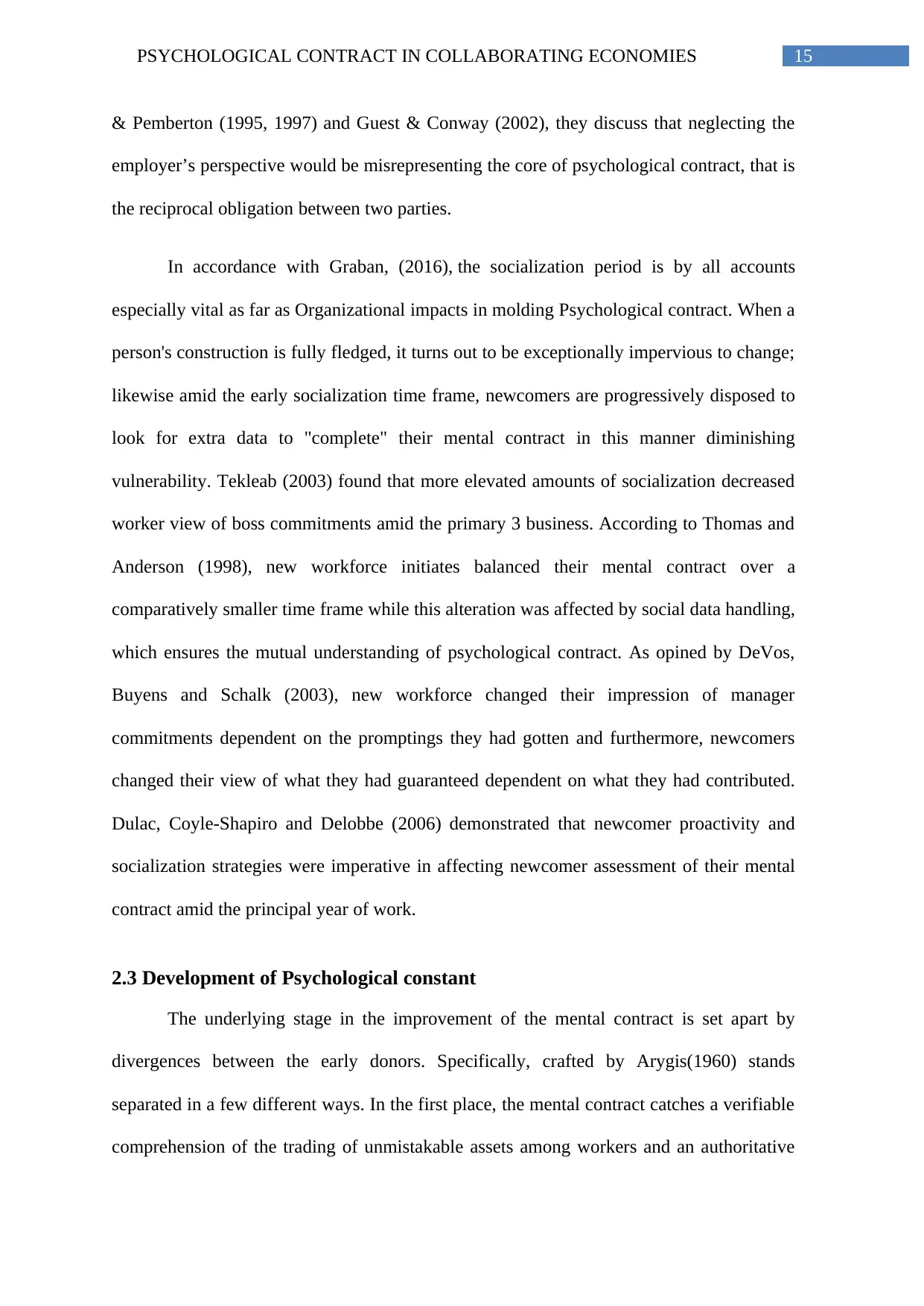
15PSYCHOLOGICAL CONTRACT IN COLLABORATING ECONOMIES
& Pemberton (1995, 1997) and Guest & Conway (2002), they discuss that neglecting the
employer’s perspective would be misrepresenting the core of psychological contract, that is
the reciprocal obligation between two parties.
In accordance with Graban, (2016), the socialization period is by all accounts
especially vital as far as Organizational impacts in molding Psychological contract. When a
person's construction is fully fledged, it turns out to be exceptionally impervious to change;
likewise amid the early socialization time frame, newcomers are progressively disposed to
look for extra data to "complete" their mental contract in this manner diminishing
vulnerability. Tekleab (2003) found that more elevated amounts of socialization decreased
worker view of boss commitments amid the primary 3 business. According to Thomas and
Anderson (1998), new workforce initiates balanced their mental contract over a
comparatively smaller time frame while this alteration was affected by social data handling,
which ensures the mutual understanding of psychological contract. As opined by DeVos,
Buyens and Schalk (2003), new workforce changed their impression of manager
commitments dependent on the promptings they had gotten and furthermore, newcomers
changed their view of what they had guaranteed dependent on what they had contributed.
Dulac, Coyle-Shapiro and Delobbe (2006) demonstrated that newcomer proactivity and
socialization strategies were imperative in affecting newcomer assessment of their mental
contract amid the principal year of work.
2.3 Development of Psychological constant
The underlying stage in the improvement of the mental contract is set apart by
divergences between the early donors. Specifically, crafted by Arygis(1960) stands
separated in a few different ways. In the first place, the mental contract catches a verifiable
comprehension of the trading of unmistakable assets among workers and an authoritative
& Pemberton (1995, 1997) and Guest & Conway (2002), they discuss that neglecting the
employer’s perspective would be misrepresenting the core of psychological contract, that is
the reciprocal obligation between two parties.
In accordance with Graban, (2016), the socialization period is by all accounts
especially vital as far as Organizational impacts in molding Psychological contract. When a
person's construction is fully fledged, it turns out to be exceptionally impervious to change;
likewise amid the early socialization time frame, newcomers are progressively disposed to
look for extra data to "complete" their mental contract in this manner diminishing
vulnerability. Tekleab (2003) found that more elevated amounts of socialization decreased
worker view of boss commitments amid the primary 3 business. According to Thomas and
Anderson (1998), new workforce initiates balanced their mental contract over a
comparatively smaller time frame while this alteration was affected by social data handling,
which ensures the mutual understanding of psychological contract. As opined by DeVos,
Buyens and Schalk (2003), new workforce changed their impression of manager
commitments dependent on the promptings they had gotten and furthermore, newcomers
changed their view of what they had guaranteed dependent on what they had contributed.
Dulac, Coyle-Shapiro and Delobbe (2006) demonstrated that newcomer proactivity and
socialization strategies were imperative in affecting newcomer assessment of their mental
contract amid the principal year of work.
2.3 Development of Psychological constant
The underlying stage in the improvement of the mental contract is set apart by
divergences between the early donors. Specifically, crafted by Arygis(1960) stands
separated in a few different ways. In the first place, the mental contract catches a verifiable
comprehension of the trading of unmistakable assets among workers and an authoritative
Secure Best Marks with AI Grader
Need help grading? Try our AI Grader for instant feedback on your assignments.
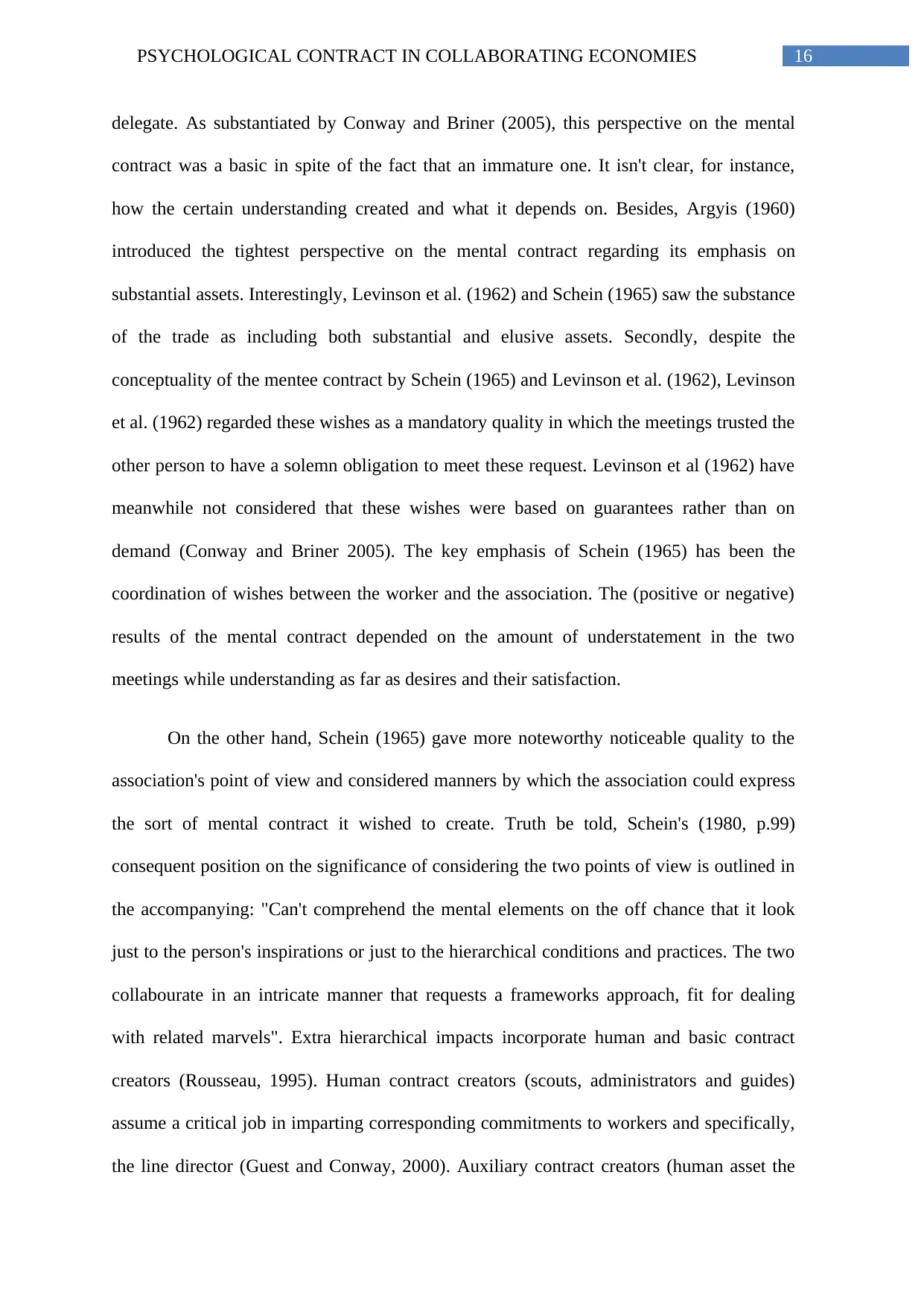
16PSYCHOLOGICAL CONTRACT IN COLLABORATING ECONOMIES
delegate. As substantiated by Conway and Briner (2005), this perspective on the mental
contract was a basic in spite of the fact that an immature one. It isn't clear, for instance,
how the certain understanding created and what it depends on. Besides, Argyis (1960)
introduced the tightest perspective on the mental contract regarding its emphasis on
substantial assets. Interestingly, Levinson et al. (1962) and Schein (1965) saw the substance
of the trade as including both substantial and elusive assets. Secondly, despite the
conceptuality of the mentee contract by Schein (1965) and Levinson et al. (1962), Levinson
et al. (1962) regarded these wishes as a mandatory quality in which the meetings trusted the
other person to have a solemn obligation to meet these request. Levinson et al (1962) have
meanwhile not considered that these wishes were based on guarantees rather than on
demand (Conway and Briner 2005). The key emphasis of Schein (1965) has been the
coordination of wishes between the worker and the association. The (positive or negative)
results of the mental contract depended on the amount of understatement in the two
meetings while understanding as far as desires and their satisfaction.
On the other hand, Schein (1965) gave more noteworthy noticeable quality to the
association's point of view and considered manners by which the association could express
the sort of mental contract it wished to create. Truth be told, Schein's (1980, p.99)
consequent position on the significance of considering the two points of view is outlined in
the accompanying: "Can't comprehend the mental elements on the off chance that it look
just to the person's inspirations or just to the hierarchical conditions and practices. The two
collabourate in an intricate manner that requests a frameworks approach, fit for dealing
with related marvels". Extra hierarchical impacts incorporate human and basic contract
creators (Rousseau, 1995). Human contract creators (scouts, administrators and guides)
assume a critical job in imparting corresponding commitments to workers and specifically,
the line director (Guest and Conway, 2000). Auxiliary contract creators (human asset the
delegate. As substantiated by Conway and Briner (2005), this perspective on the mental
contract was a basic in spite of the fact that an immature one. It isn't clear, for instance,
how the certain understanding created and what it depends on. Besides, Argyis (1960)
introduced the tightest perspective on the mental contract regarding its emphasis on
substantial assets. Interestingly, Levinson et al. (1962) and Schein (1965) saw the substance
of the trade as including both substantial and elusive assets. Secondly, despite the
conceptuality of the mentee contract by Schein (1965) and Levinson et al. (1962), Levinson
et al. (1962) regarded these wishes as a mandatory quality in which the meetings trusted the
other person to have a solemn obligation to meet these request. Levinson et al (1962) have
meanwhile not considered that these wishes were based on guarantees rather than on
demand (Conway and Briner 2005). The key emphasis of Schein (1965) has been the
coordination of wishes between the worker and the association. The (positive or negative)
results of the mental contract depended on the amount of understatement in the two
meetings while understanding as far as desires and their satisfaction.
On the other hand, Schein (1965) gave more noteworthy noticeable quality to the
association's point of view and considered manners by which the association could express
the sort of mental contract it wished to create. Truth be told, Schein's (1980, p.99)
consequent position on the significance of considering the two points of view is outlined in
the accompanying: "Can't comprehend the mental elements on the off chance that it look
just to the person's inspirations or just to the hierarchical conditions and practices. The two
collabourate in an intricate manner that requests a frameworks approach, fit for dealing
with related marvels". Extra hierarchical impacts incorporate human and basic contract
creators (Rousseau, 1995). Human contract creators (scouts, administrators and guides)
assume a critical job in imparting corresponding commitments to workers and specifically,
the line director (Guest and Conway, 2000). Auxiliary contract creators (human asset the
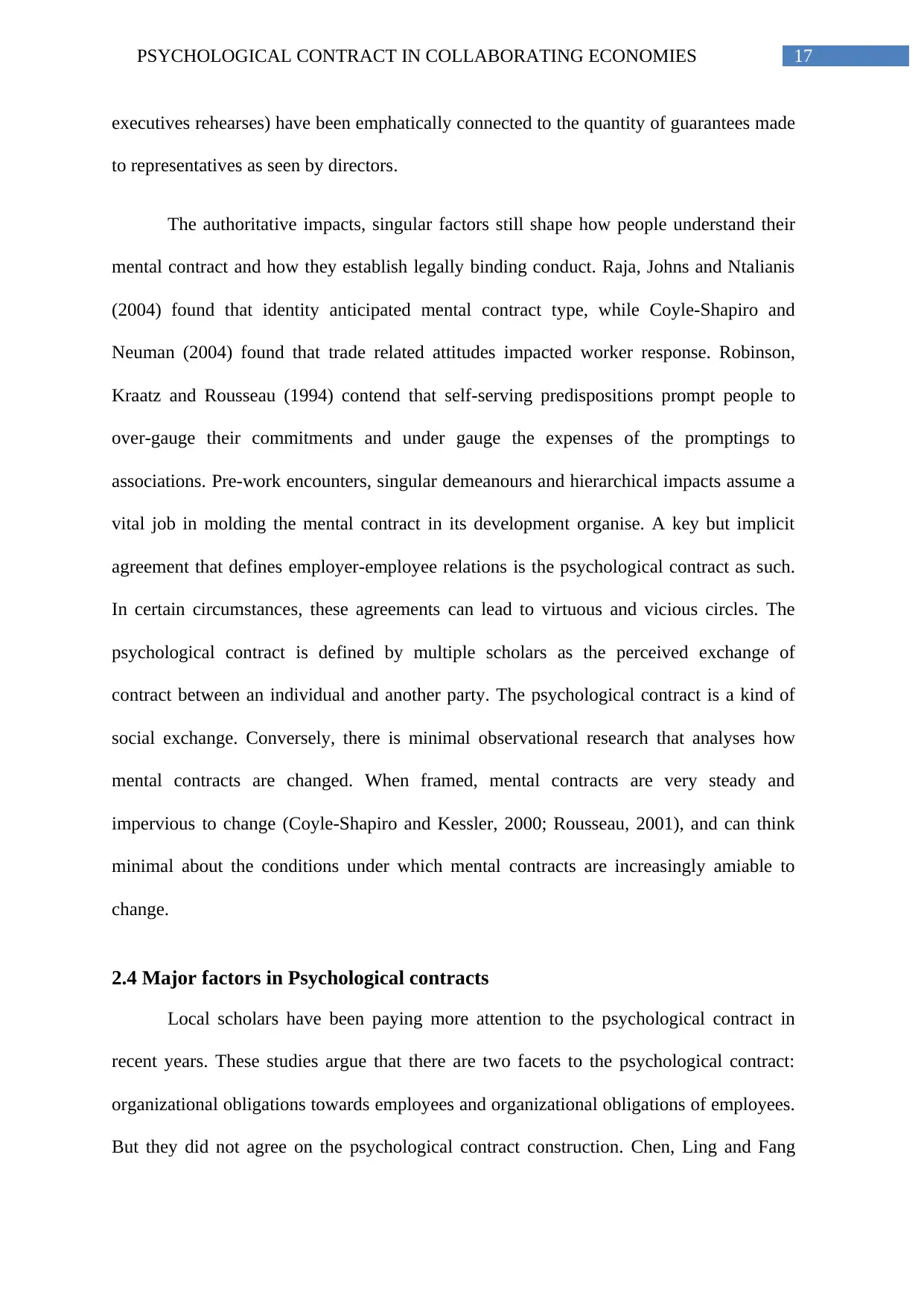
17PSYCHOLOGICAL CONTRACT IN COLLABORATING ECONOMIES
executives rehearses) have been emphatically connected to the quantity of guarantees made
to representatives as seen by directors.
The authoritative impacts, singular factors still shape how people understand their
mental contract and how they establish legally binding conduct. Raja, Johns and Ntalianis
(2004) found that identity anticipated mental contract type, while Coyle-Shapiro and
Neuman (2004) found that trade related attitudes impacted worker response. Robinson,
Kraatz and Rousseau (1994) contend that self-serving predispositions prompt people to
over-gauge their commitments and under gauge the expenses of the promptings to
associations. Pre-work encounters, singular demeanours and hierarchical impacts assume a
vital job in molding the mental contract in its development organise. A key but implicit
agreement that defines employer-employee relations is the psychological contract as such.
In certain circumstances, these agreements can lead to virtuous and vicious circles. The
psychological contract is defined by multiple scholars as the perceived exchange of
contract between an individual and another party. The psychological contract is a kind of
social exchange. Conversely, there is minimal observational research that analyses how
mental contracts are changed. When framed, mental contracts are very steady and
impervious to change (Coyle-Shapiro and Kessler, 2000; Rousseau, 2001), and can think
minimal about the conditions under which mental contracts are increasingly amiable to
change.
2.4 Major factors in Psychological contracts
Local scholars have been paying more attention to the psychological contract in
recent years. These studies argue that there are two facets to the psychological contract:
organizational obligations towards employees and organizational obligations of employees.
But they did not agree on the psychological contract construction. Chen, Ling and Fang
executives rehearses) have been emphatically connected to the quantity of guarantees made
to representatives as seen by directors.
The authoritative impacts, singular factors still shape how people understand their
mental contract and how they establish legally binding conduct. Raja, Johns and Ntalianis
(2004) found that identity anticipated mental contract type, while Coyle-Shapiro and
Neuman (2004) found that trade related attitudes impacted worker response. Robinson,
Kraatz and Rousseau (1994) contend that self-serving predispositions prompt people to
over-gauge their commitments and under gauge the expenses of the promptings to
associations. Pre-work encounters, singular demeanours and hierarchical impacts assume a
vital job in molding the mental contract in its development organise. A key but implicit
agreement that defines employer-employee relations is the psychological contract as such.
In certain circumstances, these agreements can lead to virtuous and vicious circles. The
psychological contract is defined by multiple scholars as the perceived exchange of
contract between an individual and another party. The psychological contract is a kind of
social exchange. Conversely, there is minimal observational research that analyses how
mental contracts are changed. When framed, mental contracts are very steady and
impervious to change (Coyle-Shapiro and Kessler, 2000; Rousseau, 2001), and can think
minimal about the conditions under which mental contracts are increasingly amiable to
change.
2.4 Major factors in Psychological contracts
Local scholars have been paying more attention to the psychological contract in
recent years. These studies argue that there are two facets to the psychological contract:
organizational obligations towards employees and organizational obligations of employees.
But they did not agree on the psychological contract construction. Chen, Ling and Fang
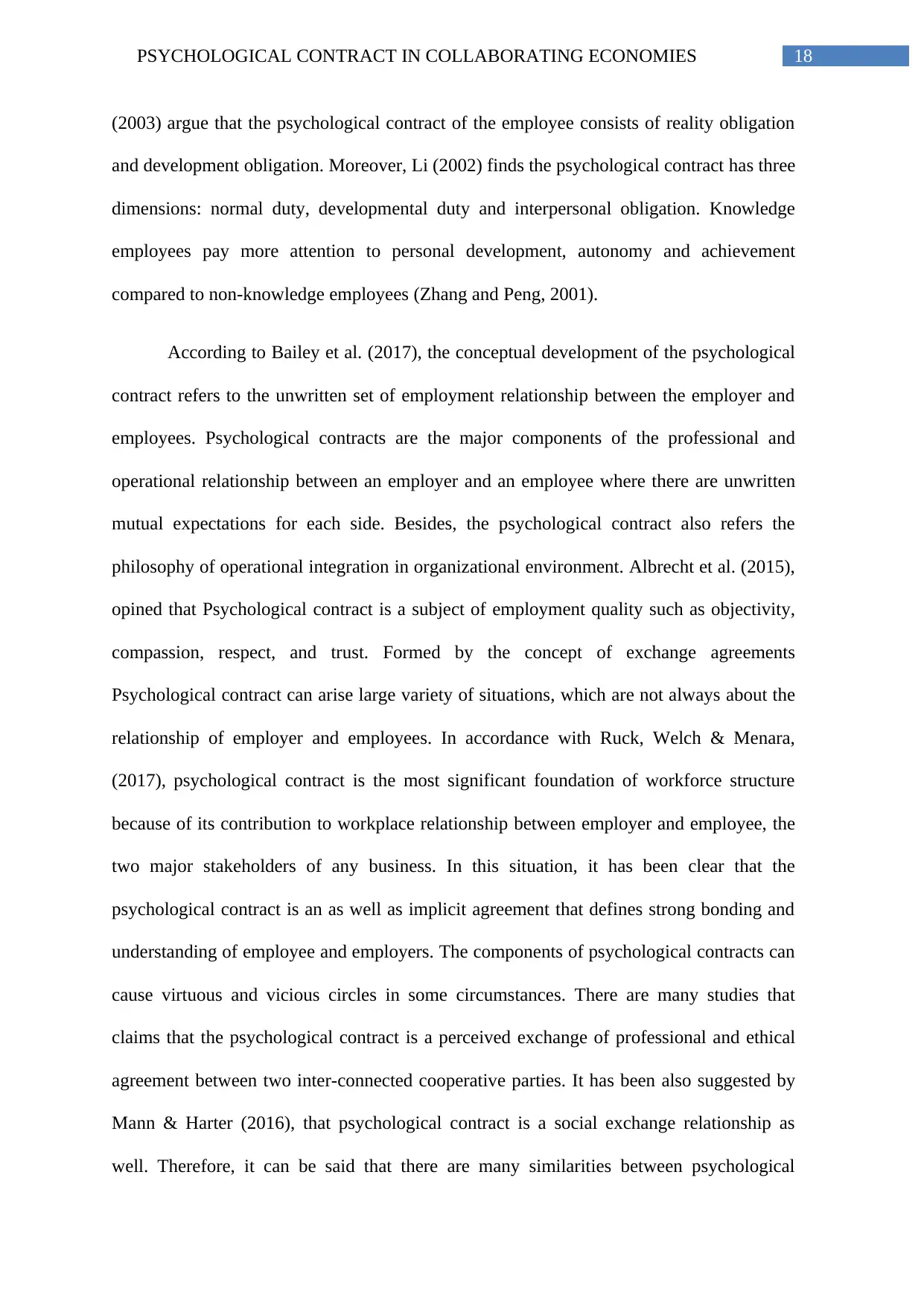
18PSYCHOLOGICAL CONTRACT IN COLLABORATING ECONOMIES
(2003) argue that the psychological contract of the employee consists of reality obligation
and development obligation. Moreover, Li (2002) finds the psychological contract has three
dimensions: normal duty, developmental duty and interpersonal obligation. Knowledge
employees pay more attention to personal development, autonomy and achievement
compared to non-knowledge employees (Zhang and Peng, 2001).
According to Bailey et al. (2017), the conceptual development of the psychological
contract refers to the unwritten set of employment relationship between the employer and
employees. Psychological contracts are the major components of the professional and
operational relationship between an employer and an employee where there are unwritten
mutual expectations for each side. Besides, the psychological contract also refers the
philosophy of operational integration in organizational environment. Albrecht et al. (2015),
opined that Psychological contract is a subject of employment quality such as objectivity,
compassion, respect, and trust. Formed by the concept of exchange agreements
Psychological contract can arise large variety of situations, which are not always about the
relationship of employer and employees. In accordance with Ruck, Welch & Menara,
(2017), psychological contract is the most significant foundation of workforce structure
because of its contribution to workplace relationship between employer and employee, the
two major stakeholders of any business. In this situation, it has been clear that the
psychological contract is an as well as implicit agreement that defines strong bonding and
understanding of employee and employers. The components of psychological contracts can
cause virtuous and vicious circles in some circumstances. There are many studies that
claims that the psychological contract is a perceived exchange of professional and ethical
agreement between two inter-connected cooperative parties. It has been also suggested by
Mann & Harter (2016), that psychological contract is a social exchange relationship as
well. Therefore, it can be said that there are many similarities between psychological
(2003) argue that the psychological contract of the employee consists of reality obligation
and development obligation. Moreover, Li (2002) finds the psychological contract has three
dimensions: normal duty, developmental duty and interpersonal obligation. Knowledge
employees pay more attention to personal development, autonomy and achievement
compared to non-knowledge employees (Zhang and Peng, 2001).
According to Bailey et al. (2017), the conceptual development of the psychological
contract refers to the unwritten set of employment relationship between the employer and
employees. Psychological contracts are the major components of the professional and
operational relationship between an employer and an employee where there are unwritten
mutual expectations for each side. Besides, the psychological contract also refers the
philosophy of operational integration in organizational environment. Albrecht et al. (2015),
opined that Psychological contract is a subject of employment quality such as objectivity,
compassion, respect, and trust. Formed by the concept of exchange agreements
Psychological contract can arise large variety of situations, which are not always about the
relationship of employer and employees. In accordance with Ruck, Welch & Menara,
(2017), psychological contract is the most significant foundation of workforce structure
because of its contribution to workplace relationship between employer and employee, the
two major stakeholders of any business. In this situation, it has been clear that the
psychological contract is an as well as implicit agreement that defines strong bonding and
understanding of employee and employers. The components of psychological contracts can
cause virtuous and vicious circles in some circumstances. There are many studies that
claims that the psychological contract is a perceived exchange of professional and ethical
agreement between two inter-connected cooperative parties. It has been also suggested by
Mann & Harter (2016), that psychological contract is a social exchange relationship as
well. Therefore, it can be said that there are many similarities between psychological
Paraphrase This Document
Need a fresh take? Get an instant paraphrase of this document with our AI Paraphraser
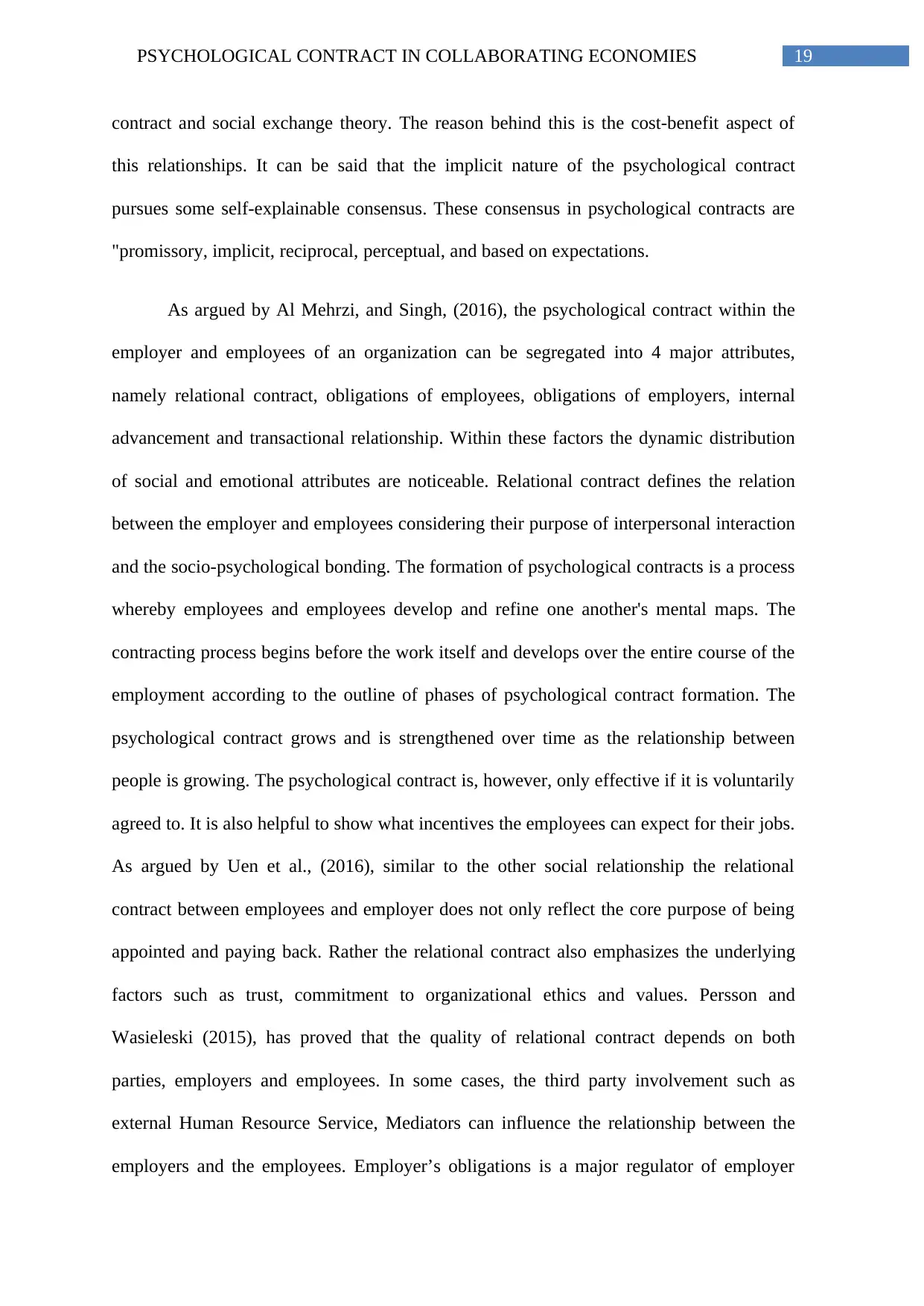
19PSYCHOLOGICAL CONTRACT IN COLLABORATING ECONOMIES
contract and social exchange theory. The reason behind this is the cost-benefit aspect of
this relationships. It can be said that the implicit nature of the psychological contract
pursues some self-explainable consensus. These consensus in psychological contracts are
"promissory, implicit, reciprocal, perceptual, and based on expectations.
As argued by Al Mehrzi, and Singh, (2016), the psychological contract within the
employer and employees of an organization can be segregated into 4 major attributes,
namely relational contract, obligations of employees, obligations of employers, internal
advancement and transactional relationship. Within these factors the dynamic distribution
of social and emotional attributes are noticeable. Relational contract defines the relation
between the employer and employees considering their purpose of interpersonal interaction
and the socio-psychological bonding. The formation of psychological contracts is a process
whereby employees and employees develop and refine one another's mental maps. The
contracting process begins before the work itself and develops over the entire course of the
employment according to the outline of phases of psychological contract formation. The
psychological contract grows and is strengthened over time as the relationship between
people is growing. The psychological contract is, however, only effective if it is voluntarily
agreed to. It is also helpful to show what incentives the employees can expect for their jobs.
As argued by Uen et al., (2016), similar to the other social relationship the relational
contract between employees and employer does not only reflect the core purpose of being
appointed and paying back. Rather the relational contract also emphasizes the underlying
factors such as trust, commitment to organizational ethics and values. Persson and
Wasieleski (2015), has proved that the quality of relational contract depends on both
parties, employers and employees. In some cases, the third party involvement such as
external Human Resource Service, Mediators can influence the relationship between the
employers and the employees. Employer’s obligations is a major regulator of employer
contract and social exchange theory. The reason behind this is the cost-benefit aspect of
this relationships. It can be said that the implicit nature of the psychological contract
pursues some self-explainable consensus. These consensus in psychological contracts are
"promissory, implicit, reciprocal, perceptual, and based on expectations.
As argued by Al Mehrzi, and Singh, (2016), the psychological contract within the
employer and employees of an organization can be segregated into 4 major attributes,
namely relational contract, obligations of employees, obligations of employers, internal
advancement and transactional relationship. Within these factors the dynamic distribution
of social and emotional attributes are noticeable. Relational contract defines the relation
between the employer and employees considering their purpose of interpersonal interaction
and the socio-psychological bonding. The formation of psychological contracts is a process
whereby employees and employees develop and refine one another's mental maps. The
contracting process begins before the work itself and develops over the entire course of the
employment according to the outline of phases of psychological contract formation. The
psychological contract grows and is strengthened over time as the relationship between
people is growing. The psychological contract is, however, only effective if it is voluntarily
agreed to. It is also helpful to show what incentives the employees can expect for their jobs.
As argued by Uen et al., (2016), similar to the other social relationship the relational
contract between employees and employer does not only reflect the core purpose of being
appointed and paying back. Rather the relational contract also emphasizes the underlying
factors such as trust, commitment to organizational ethics and values. Persson and
Wasieleski (2015), has proved that the quality of relational contract depends on both
parties, employers and employees. In some cases, the third party involvement such as
external Human Resource Service, Mediators can influence the relationship between the
employers and the employees. Employer’s obligations is a major regulator of employer
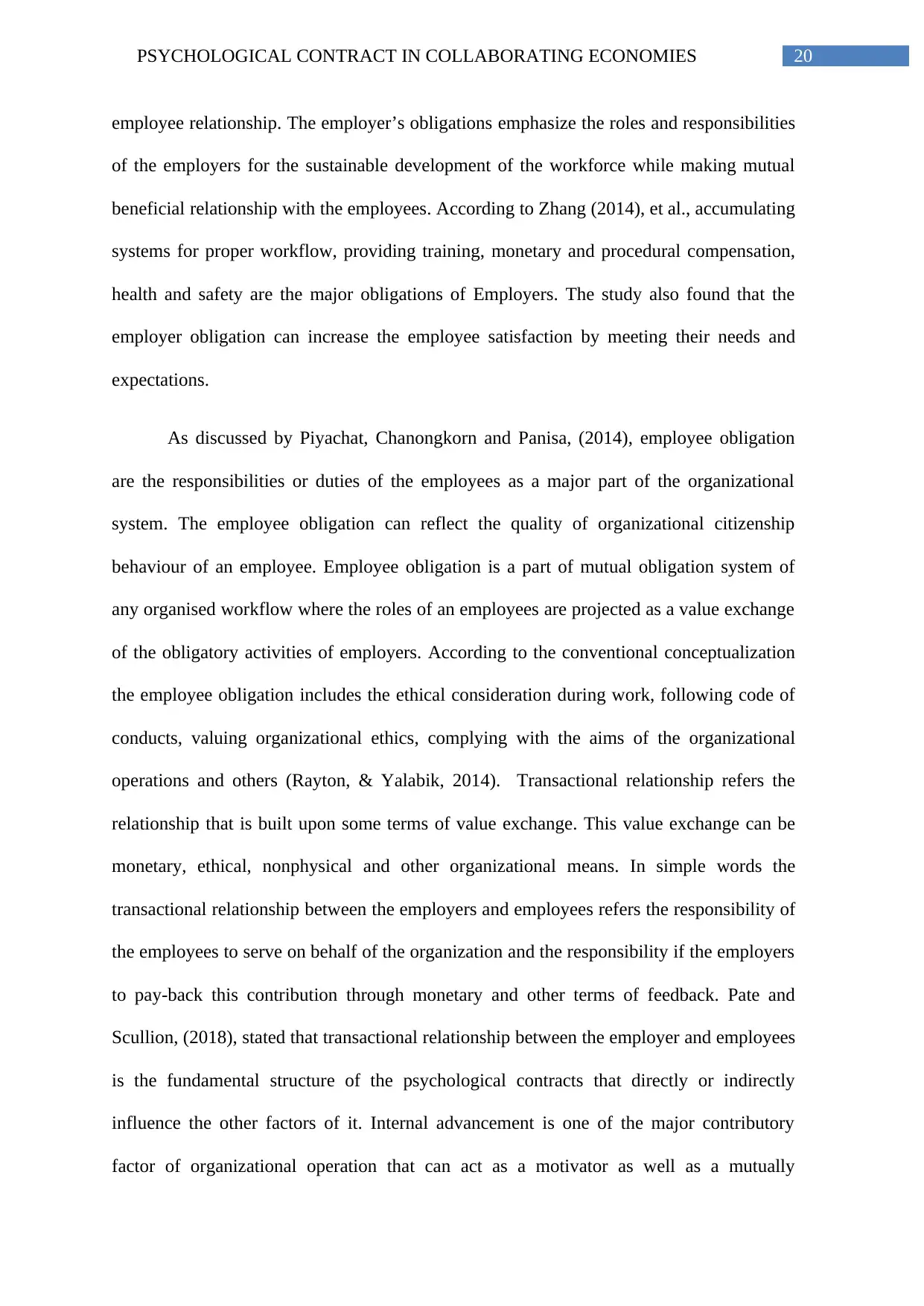
20PSYCHOLOGICAL CONTRACT IN COLLABORATING ECONOMIES
employee relationship. The employer’s obligations emphasize the roles and responsibilities
of the employers for the sustainable development of the workforce while making mutual
beneficial relationship with the employees. According to Zhang (2014), et al., accumulating
systems for proper workflow, providing training, monetary and procedural compensation,
health and safety are the major obligations of Employers. The study also found that the
employer obligation can increase the employee satisfaction by meeting their needs and
expectations.
As discussed by Piyachat, Chanongkorn and Panisa, (2014), employee obligation
are the responsibilities or duties of the employees as a major part of the organizational
system. The employee obligation can reflect the quality of organizational citizenship
behaviour of an employee. Employee obligation is a part of mutual obligation system of
any organised workflow where the roles of an employees are projected as a value exchange
of the obligatory activities of employers. According to the conventional conceptualization
the employee obligation includes the ethical consideration during work, following code of
conducts, valuing organizational ethics, complying with the aims of the organizational
operations and others (Rayton, & Yalabik, 2014). Transactional relationship refers the
relationship that is built upon some terms of value exchange. This value exchange can be
monetary, ethical, nonphysical and other organizational means. In simple words the
transactional relationship between the employers and employees refers the responsibility of
the employees to serve on behalf of the organization and the responsibility if the employers
to pay-back this contribution through monetary and other terms of feedback. Pate and
Scullion, (2018), stated that transactional relationship between the employer and employees
is the fundamental structure of the psychological contracts that directly or indirectly
influence the other factors of it. Internal advancement is one of the major contributory
factor of organizational operation that can act as a motivator as well as a mutually
employee relationship. The employer’s obligations emphasize the roles and responsibilities
of the employers for the sustainable development of the workforce while making mutual
beneficial relationship with the employees. According to Zhang (2014), et al., accumulating
systems for proper workflow, providing training, monetary and procedural compensation,
health and safety are the major obligations of Employers. The study also found that the
employer obligation can increase the employee satisfaction by meeting their needs and
expectations.
As discussed by Piyachat, Chanongkorn and Panisa, (2014), employee obligation
are the responsibilities or duties of the employees as a major part of the organizational
system. The employee obligation can reflect the quality of organizational citizenship
behaviour of an employee. Employee obligation is a part of mutual obligation system of
any organised workflow where the roles of an employees are projected as a value exchange
of the obligatory activities of employers. According to the conventional conceptualization
the employee obligation includes the ethical consideration during work, following code of
conducts, valuing organizational ethics, complying with the aims of the organizational
operations and others (Rayton, & Yalabik, 2014). Transactional relationship refers the
relationship that is built upon some terms of value exchange. This value exchange can be
monetary, ethical, nonphysical and other organizational means. In simple words the
transactional relationship between the employers and employees refers the responsibility of
the employees to serve on behalf of the organization and the responsibility if the employers
to pay-back this contribution through monetary and other terms of feedback. Pate and
Scullion, (2018), stated that transactional relationship between the employer and employees
is the fundamental structure of the psychological contracts that directly or indirectly
influence the other factors of it. Internal advancement is one of the major contributory
factor of organizational operation that can act as a motivator as well as a mutually
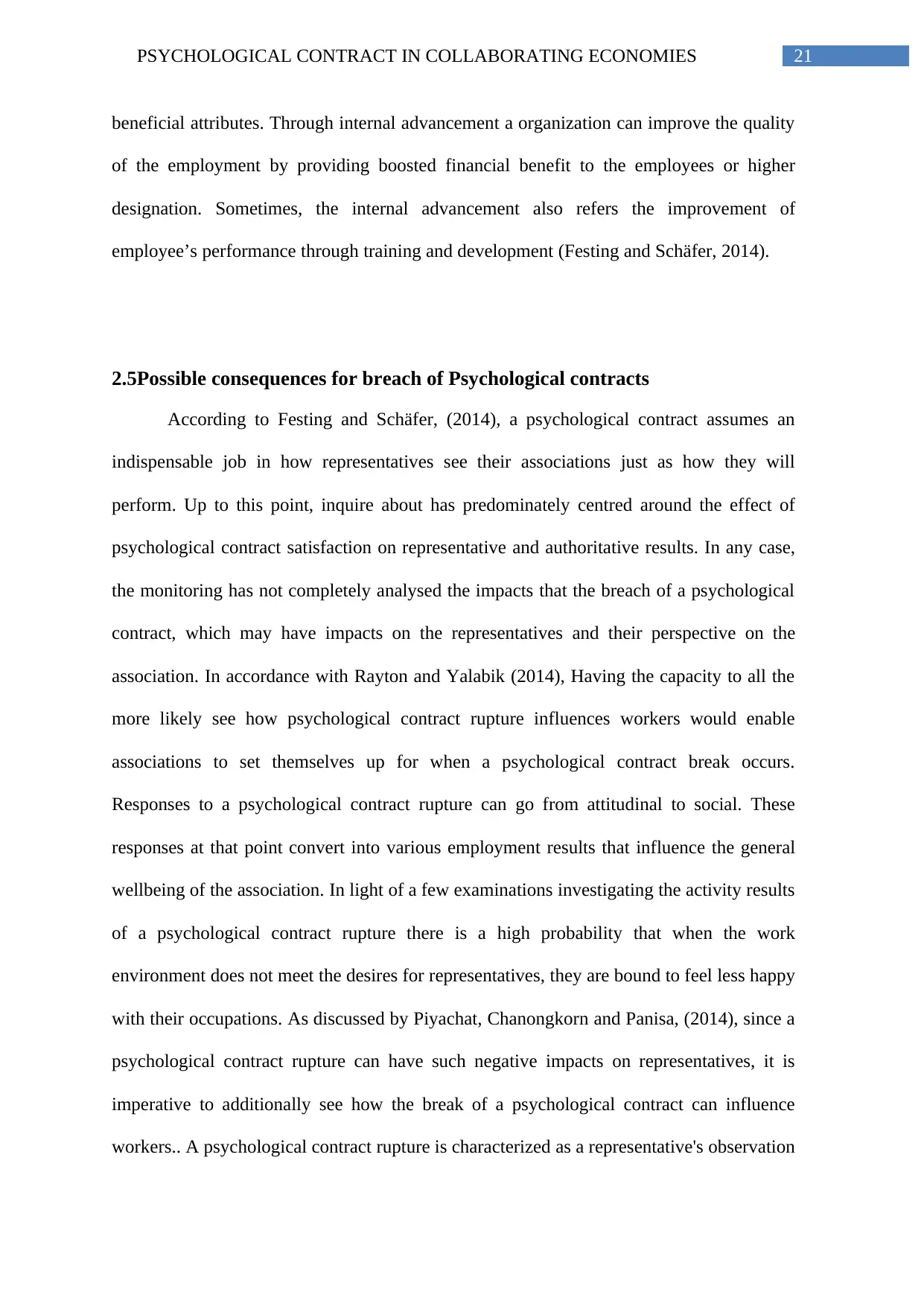
21PSYCHOLOGICAL CONTRACT IN COLLABORATING ECONOMIES
beneficial attributes. Through internal advancement a organization can improve the quality
of the employment by providing boosted financial benefit to the employees or higher
designation. Sometimes, the internal advancement also refers the improvement of
employee’s performance through training and development (Festing and Schäfer, 2014).
2.5Possible consequences for breach of Psychological contracts
According to Festing and Schäfer, (2014), a psychological contract assumes an
indispensable job in how representatives see their associations just as how they will
perform. Up to this point, inquire about has predominately centred around the effect of
psychological contract satisfaction on representative and authoritative results. In any case,
the monitoring has not completely analysed the impacts that the breach of a psychological
contract, which may have impacts on the representatives and their perspective on the
association. In accordance with Rayton and Yalabik (2014), Having the capacity to all the
more likely see how psychological contract rupture influences workers would enable
associations to set themselves up for when a psychological contract break occurs.
Responses to a psychological contract rupture can go from attitudinal to social. These
responses at that point convert into various employment results that influence the general
wellbeing of the association. In light of a few examinations investigating the activity results
of a psychological contract rupture there is a high probability that when the work
environment does not meet the desires for representatives, they are bound to feel less happy
with their occupations. As discussed by Piyachat, Chanongkorn and Panisa, (2014), since a
psychological contract rupture can have such negative impacts on representatives, it is
imperative to additionally see how the break of a psychological contract can influence
workers.. A psychological contract rupture is characterized as a representative's observation
beneficial attributes. Through internal advancement a organization can improve the quality
of the employment by providing boosted financial benefit to the employees or higher
designation. Sometimes, the internal advancement also refers the improvement of
employee’s performance through training and development (Festing and Schäfer, 2014).
2.5Possible consequences for breach of Psychological contracts
According to Festing and Schäfer, (2014), a psychological contract assumes an
indispensable job in how representatives see their associations just as how they will
perform. Up to this point, inquire about has predominately centred around the effect of
psychological contract satisfaction on representative and authoritative results. In any case,
the monitoring has not completely analysed the impacts that the breach of a psychological
contract, which may have impacts on the representatives and their perspective on the
association. In accordance with Rayton and Yalabik (2014), Having the capacity to all the
more likely see how psychological contract rupture influences workers would enable
associations to set themselves up for when a psychological contract break occurs.
Responses to a psychological contract rupture can go from attitudinal to social. These
responses at that point convert into various employment results that influence the general
wellbeing of the association. In light of a few examinations investigating the activity results
of a psychological contract rupture there is a high probability that when the work
environment does not meet the desires for representatives, they are bound to feel less happy
with their occupations. As discussed by Piyachat, Chanongkorn and Panisa, (2014), since a
psychological contract rupture can have such negative impacts on representatives, it is
imperative to additionally see how the break of a psychological contract can influence
workers.. A psychological contract rupture is characterized as a representative's observation
Secure Best Marks with AI Grader
Need help grading? Try our AI Grader for instant feedback on your assignments.
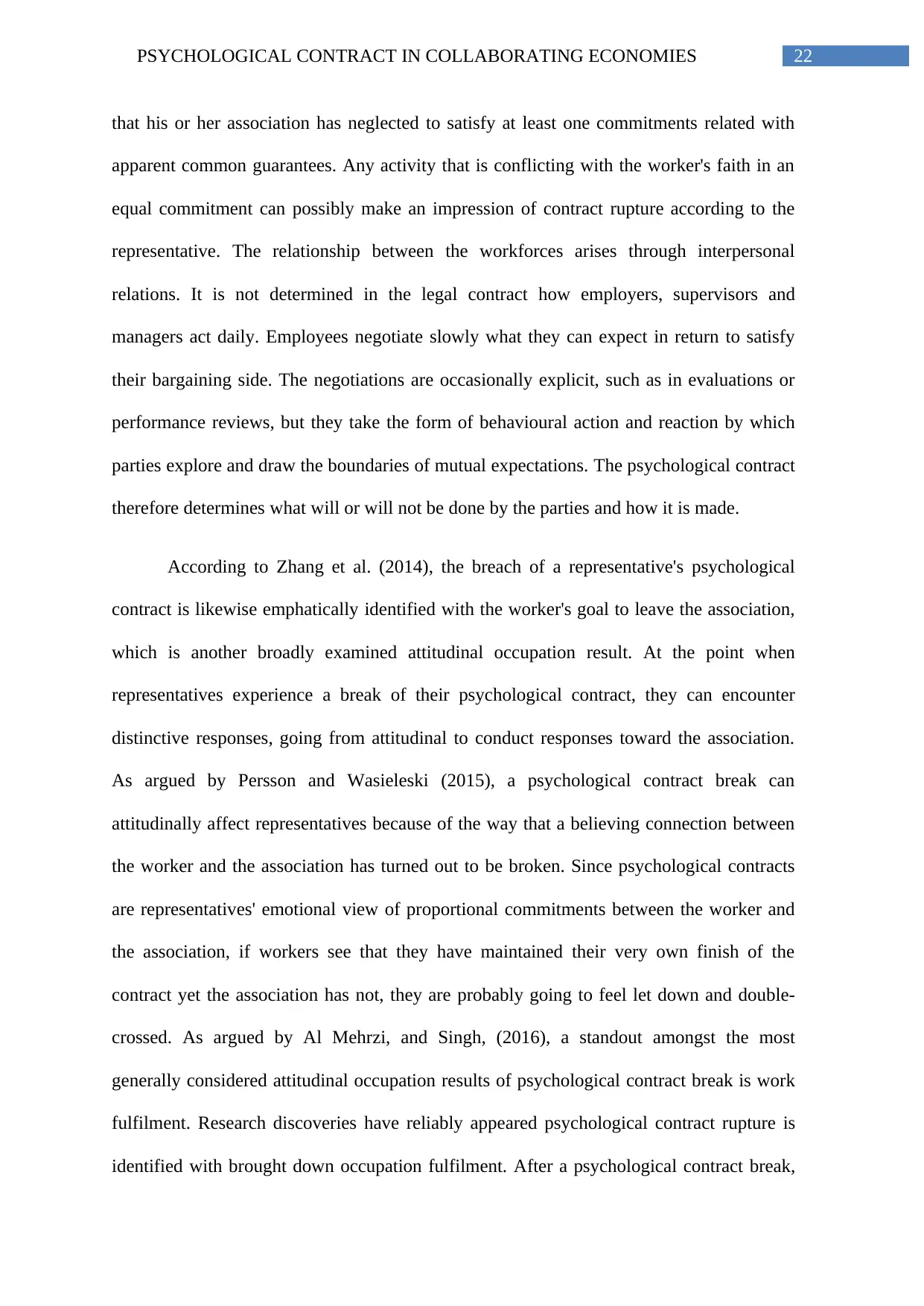
22PSYCHOLOGICAL CONTRACT IN COLLABORATING ECONOMIES
that his or her association has neglected to satisfy at least one commitments related with
apparent common guarantees. Any activity that is conflicting with the worker's faith in an
equal commitment can possibly make an impression of contract rupture according to the
representative. The relationship between the workforces arises through interpersonal
relations. It is not determined in the legal contract how employers, supervisors and
managers act daily. Employees negotiate slowly what they can expect in return to satisfy
their bargaining side. The negotiations are occasionally explicit, such as in evaluations or
performance reviews, but they take the form of behavioural action and reaction by which
parties explore and draw the boundaries of mutual expectations. The psychological contract
therefore determines what will or will not be done by the parties and how it is made.
According to Zhang et al. (2014), the breach of a representative's psychological
contract is likewise emphatically identified with the worker's goal to leave the association,
which is another broadly examined attitudinal occupation result. At the point when
representatives experience a break of their psychological contract, they can encounter
distinctive responses, going from attitudinal to conduct responses toward the association.
As argued by Persson and Wasieleski (2015), a psychological contract break can
attitudinally affect representatives because of the way that a believing connection between
the worker and the association has turned out to be broken. Since psychological contracts
are representatives' emotional view of proportional commitments between the worker and
the association, if workers see that they have maintained their very own finish of the
contract yet the association has not, they are probably going to feel let down and double-
crossed. As argued by Al Mehrzi, and Singh, (2016), a standout amongst the most
generally considered attitudinal occupation results of psychological contract break is work
fulfilment. Research discoveries have reliably appeared psychological contract rupture is
identified with brought down occupation fulfilment. After a psychological contract break,
that his or her association has neglected to satisfy at least one commitments related with
apparent common guarantees. Any activity that is conflicting with the worker's faith in an
equal commitment can possibly make an impression of contract rupture according to the
representative. The relationship between the workforces arises through interpersonal
relations. It is not determined in the legal contract how employers, supervisors and
managers act daily. Employees negotiate slowly what they can expect in return to satisfy
their bargaining side. The negotiations are occasionally explicit, such as in evaluations or
performance reviews, but they take the form of behavioural action and reaction by which
parties explore and draw the boundaries of mutual expectations. The psychological contract
therefore determines what will or will not be done by the parties and how it is made.
According to Zhang et al. (2014), the breach of a representative's psychological
contract is likewise emphatically identified with the worker's goal to leave the association,
which is another broadly examined attitudinal occupation result. At the point when
representatives experience a break of their psychological contract, they can encounter
distinctive responses, going from attitudinal to conduct responses toward the association.
As argued by Persson and Wasieleski (2015), a psychological contract break can
attitudinally affect representatives because of the way that a believing connection between
the worker and the association has turned out to be broken. Since psychological contracts
are representatives' emotional view of proportional commitments between the worker and
the association, if workers see that they have maintained their very own finish of the
contract yet the association has not, they are probably going to feel let down and double-
crossed. As argued by Al Mehrzi, and Singh, (2016), a standout amongst the most
generally considered attitudinal occupation results of psychological contract break is work
fulfilment. Research discoveries have reliably appeared psychological contract rupture is
identified with brought down occupation fulfilment. After a psychological contract break,
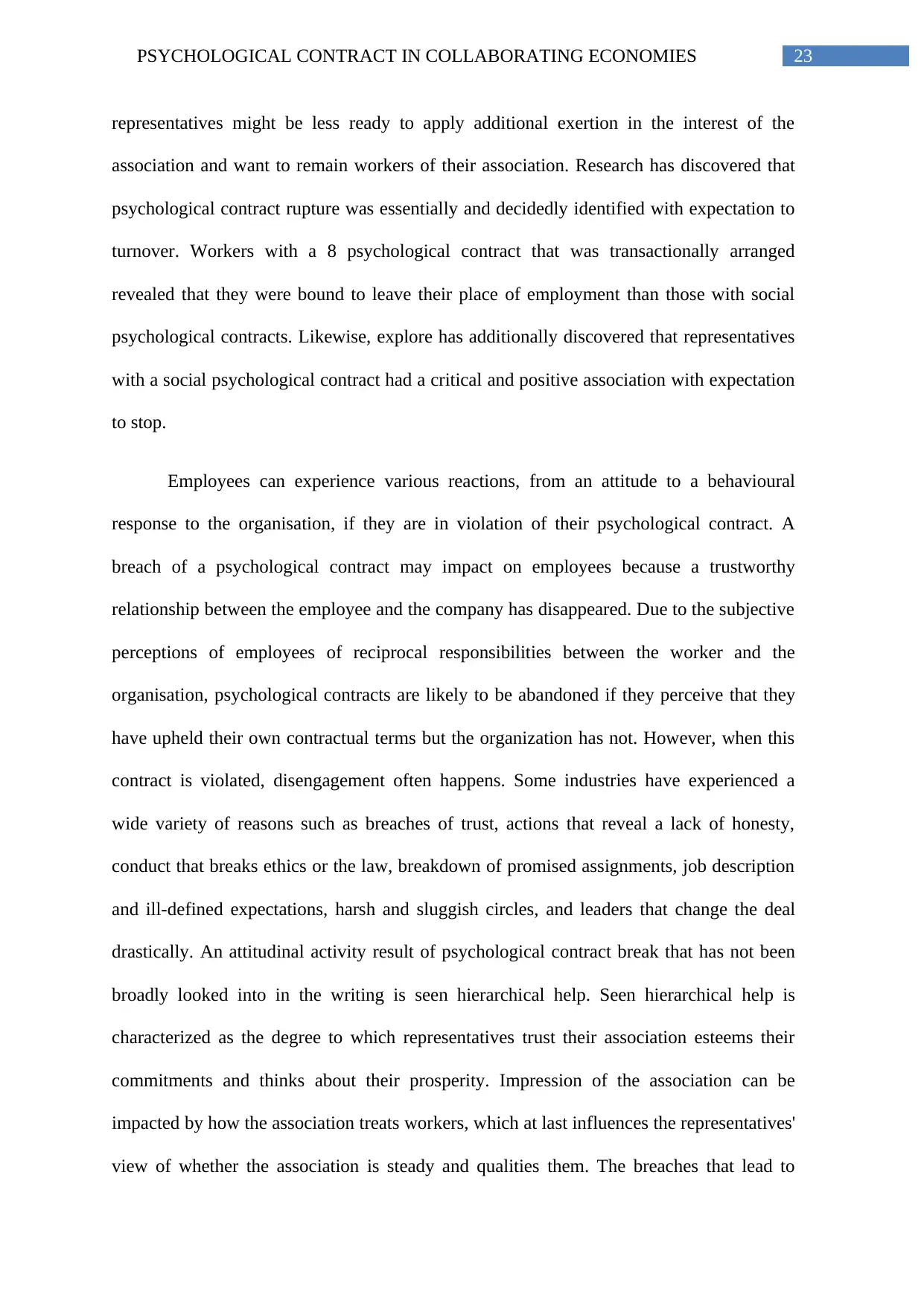
23PSYCHOLOGICAL CONTRACT IN COLLABORATING ECONOMIES
representatives might be less ready to apply additional exertion in the interest of the
association and want to remain workers of their association. Research has discovered that
psychological contract rupture was essentially and decidedly identified with expectation to
turnover. Workers with a 8 psychological contract that was transactionally arranged
revealed that they were bound to leave their place of employment than those with social
psychological contracts. Likewise, explore has additionally discovered that representatives
with a social psychological contract had a critical and positive association with expectation
to stop.
Employees can experience various reactions, from an attitude to a behavioural
response to the organisation, if they are in violation of their psychological contract. A
breach of a psychological contract may impact on employees because a trustworthy
relationship between the employee and the company has disappeared. Due to the subjective
perceptions of employees of reciprocal responsibilities between the worker and the
organisation, psychological contracts are likely to be abandoned if they perceive that they
have upheld their own contractual terms but the organization has not. However, when this
contract is violated, disengagement often happens. Some industries have experienced a
wide variety of reasons such as breaches of trust, actions that reveal a lack of honesty,
conduct that breaks ethics or the law, breakdown of promised assignments, job description
and ill-defined expectations, harsh and sluggish circles, and leaders that change the deal
drastically. An attitudinal activity result of psychological contract break that has not been
broadly looked into in the writing is seen hierarchical help. Seen hierarchical help is
characterized as the degree to which representatives trust their association esteems their
commitments and thinks about their prosperity. Impression of the association can be
impacted by how the association treats workers, which at last influences the representatives'
view of whether the association is steady and qualities them. The breaches that lead to
representatives might be less ready to apply additional exertion in the interest of the
association and want to remain workers of their association. Research has discovered that
psychological contract rupture was essentially and decidedly identified with expectation to
turnover. Workers with a 8 psychological contract that was transactionally arranged
revealed that they were bound to leave their place of employment than those with social
psychological contracts. Likewise, explore has additionally discovered that representatives
with a social psychological contract had a critical and positive association with expectation
to stop.
Employees can experience various reactions, from an attitude to a behavioural
response to the organisation, if they are in violation of their psychological contract. A
breach of a psychological contract may impact on employees because a trustworthy
relationship between the employee and the company has disappeared. Due to the subjective
perceptions of employees of reciprocal responsibilities between the worker and the
organisation, psychological contracts are likely to be abandoned if they perceive that they
have upheld their own contractual terms but the organization has not. However, when this
contract is violated, disengagement often happens. Some industries have experienced a
wide variety of reasons such as breaches of trust, actions that reveal a lack of honesty,
conduct that breaks ethics or the law, breakdown of promised assignments, job description
and ill-defined expectations, harsh and sluggish circles, and leaders that change the deal
drastically. An attitudinal activity result of psychological contract break that has not been
broadly looked into in the writing is seen hierarchical help. Seen hierarchical help is
characterized as the degree to which representatives trust their association esteems their
commitments and thinks about their prosperity. Impression of the association can be
impacted by how the association treats workers, which at last influences the representatives'
view of whether the association is steady and qualities them. The breaches that lead to
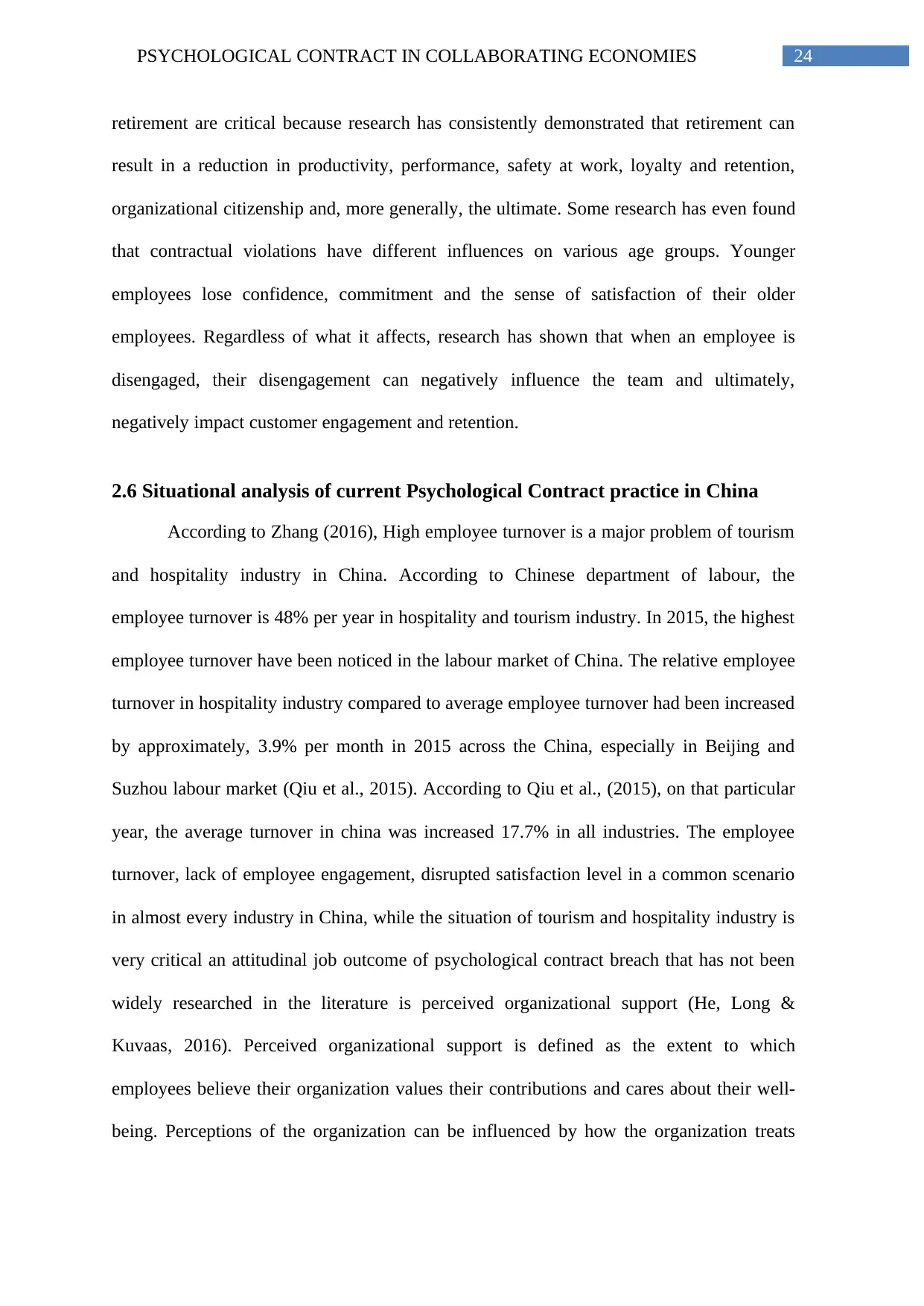
24PSYCHOLOGICAL CONTRACT IN COLLABORATING ECONOMIES
retirement are critical because research has consistently demonstrated that retirement can
result in a reduction in productivity, performance, safety at work, loyalty and retention,
organizational citizenship and, more generally, the ultimate. Some research has even found
that contractual violations have different influences on various age groups. Younger
employees lose confidence, commitment and the sense of satisfaction of their older
employees. Regardless of what it affects, research has shown that when an employee is
disengaged, their disengagement can negatively influence the team and ultimately,
negatively impact customer engagement and retention.
2.6 Situational analysis of current Psychological Contract practice in China
According to Zhang (2016), High employee turnover is a major problem of tourism
and hospitality industry in China. According to Chinese department of labour, the
employee turnover is 48% per year in hospitality and tourism industry. In 2015, the highest
employee turnover have been noticed in the labour market of China. The relative employee
turnover in hospitality industry compared to average employee turnover had been increased
by approximately, 3.9% per month in 2015 across the China, especially in Beijing and
Suzhou labour market (Qiu et al., 2015). According to Qiu et al., (2015), on that particular
year, the average turnover in china was increased 17.7% in all industries. The employee
turnover, lack of employee engagement, disrupted satisfaction level in a common scenario
in almost every industry in China, while the situation of tourism and hospitality industry is
very critical an attitudinal job outcome of psychological contract breach that has not been
widely researched in the literature is perceived organizational support (He, Long &
Kuvaas, 2016). Perceived organizational support is defined as the extent to which
employees believe their organization values their contributions and cares about their well-
being. Perceptions of the organization can be influenced by how the organization treats
retirement are critical because research has consistently demonstrated that retirement can
result in a reduction in productivity, performance, safety at work, loyalty and retention,
organizational citizenship and, more generally, the ultimate. Some research has even found
that contractual violations have different influences on various age groups. Younger
employees lose confidence, commitment and the sense of satisfaction of their older
employees. Regardless of what it affects, research has shown that when an employee is
disengaged, their disengagement can negatively influence the team and ultimately,
negatively impact customer engagement and retention.
2.6 Situational analysis of current Psychological Contract practice in China
According to Zhang (2016), High employee turnover is a major problem of tourism
and hospitality industry in China. According to Chinese department of labour, the
employee turnover is 48% per year in hospitality and tourism industry. In 2015, the highest
employee turnover have been noticed in the labour market of China. The relative employee
turnover in hospitality industry compared to average employee turnover had been increased
by approximately, 3.9% per month in 2015 across the China, especially in Beijing and
Suzhou labour market (Qiu et al., 2015). According to Qiu et al., (2015), on that particular
year, the average turnover in china was increased 17.7% in all industries. The employee
turnover, lack of employee engagement, disrupted satisfaction level in a common scenario
in almost every industry in China, while the situation of tourism and hospitality industry is
very critical an attitudinal job outcome of psychological contract breach that has not been
widely researched in the literature is perceived organizational support (He, Long &
Kuvaas, 2016). Perceived organizational support is defined as the extent to which
employees believe their organization values their contributions and cares about their well-
being. Perceptions of the organization can be influenced by how the organization treats
Paraphrase This Document
Need a fresh take? Get an instant paraphrase of this document with our AI Paraphraser
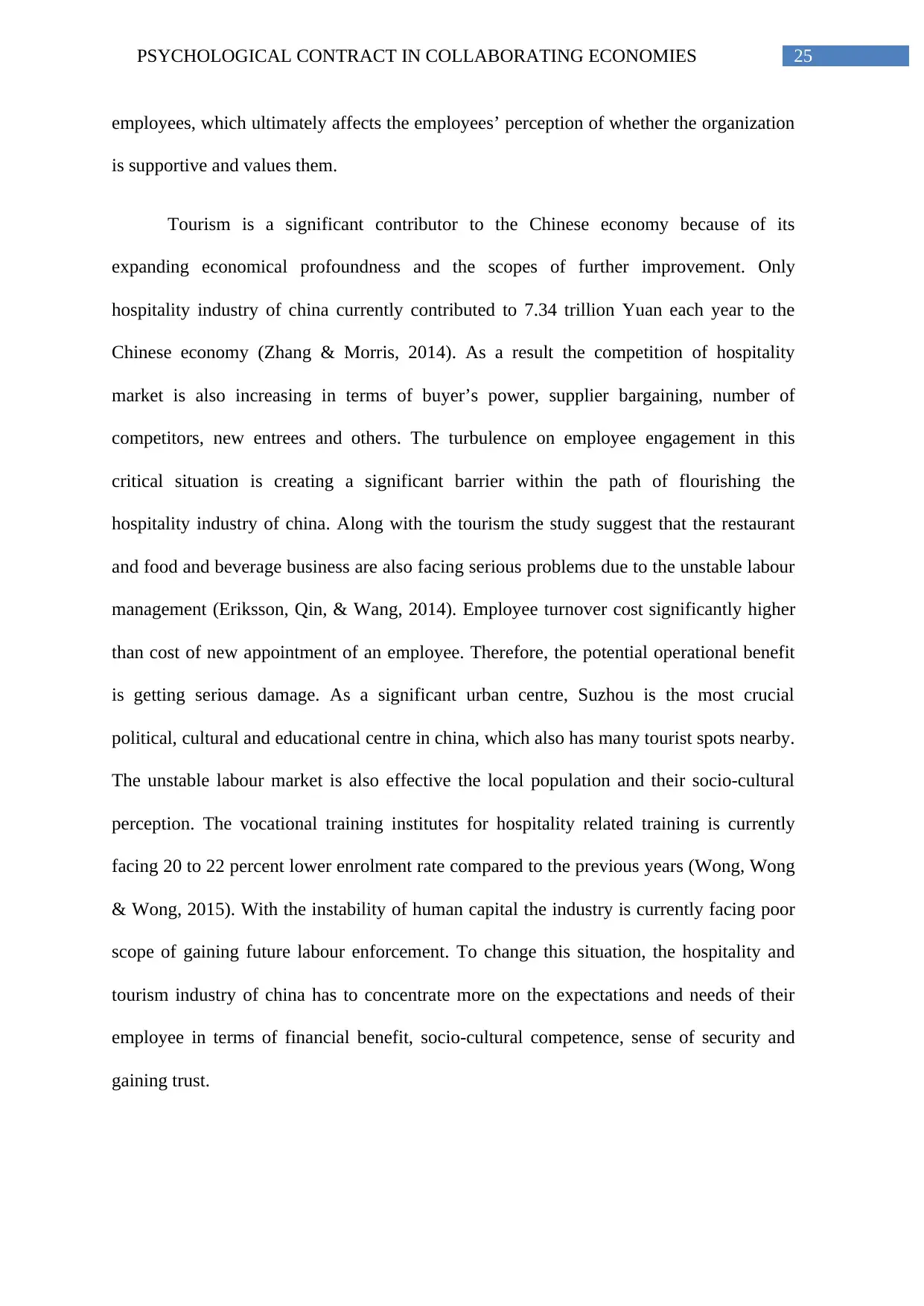
25PSYCHOLOGICAL CONTRACT IN COLLABORATING ECONOMIES
employees, which ultimately affects the employees’ perception of whether the organization
is supportive and values them.
Tourism is a significant contributor to the Chinese economy because of its
expanding economical profoundness and the scopes of further improvement. Only
hospitality industry of china currently contributed to 7.34 trillion Yuan each year to the
Chinese economy (Zhang & Morris, 2014). As a result the competition of hospitality
market is also increasing in terms of buyer’s power, supplier bargaining, number of
competitors, new entrees and others. The turbulence on employee engagement in this
critical situation is creating a significant barrier within the path of flourishing the
hospitality industry of china. Along with the tourism the study suggest that the restaurant
and food and beverage business are also facing serious problems due to the unstable labour
management (Eriksson, Qin, & Wang, 2014). Employee turnover cost significantly higher
than cost of new appointment of an employee. Therefore, the potential operational benefit
is getting serious damage. As a significant urban centre, Suzhou is the most crucial
political, cultural and educational centre in china, which also has many tourist spots nearby.
The unstable labour market is also effective the local population and their socio-cultural
perception. The vocational training institutes for hospitality related training is currently
facing 20 to 22 percent lower enrolment rate compared to the previous years (Wong, Wong
& Wong, 2015). With the instability of human capital the industry is currently facing poor
scope of gaining future labour enforcement. To change this situation, the hospitality and
tourism industry of china has to concentrate more on the expectations and needs of their
employee in terms of financial benefit, socio-cultural competence, sense of security and
gaining trust.
employees, which ultimately affects the employees’ perception of whether the organization
is supportive and values them.
Tourism is a significant contributor to the Chinese economy because of its
expanding economical profoundness and the scopes of further improvement. Only
hospitality industry of china currently contributed to 7.34 trillion Yuan each year to the
Chinese economy (Zhang & Morris, 2014). As a result the competition of hospitality
market is also increasing in terms of buyer’s power, supplier bargaining, number of
competitors, new entrees and others. The turbulence on employee engagement in this
critical situation is creating a significant barrier within the path of flourishing the
hospitality industry of china. Along with the tourism the study suggest that the restaurant
and food and beverage business are also facing serious problems due to the unstable labour
management (Eriksson, Qin, & Wang, 2014). Employee turnover cost significantly higher
than cost of new appointment of an employee. Therefore, the potential operational benefit
is getting serious damage. As a significant urban centre, Suzhou is the most crucial
political, cultural and educational centre in china, which also has many tourist spots nearby.
The unstable labour market is also effective the local population and their socio-cultural
perception. The vocational training institutes for hospitality related training is currently
facing 20 to 22 percent lower enrolment rate compared to the previous years (Wong, Wong
& Wong, 2015). With the instability of human capital the industry is currently facing poor
scope of gaining future labour enforcement. To change this situation, the hospitality and
tourism industry of china has to concentrate more on the expectations and needs of their
employee in terms of financial benefit, socio-cultural competence, sense of security and
gaining trust.
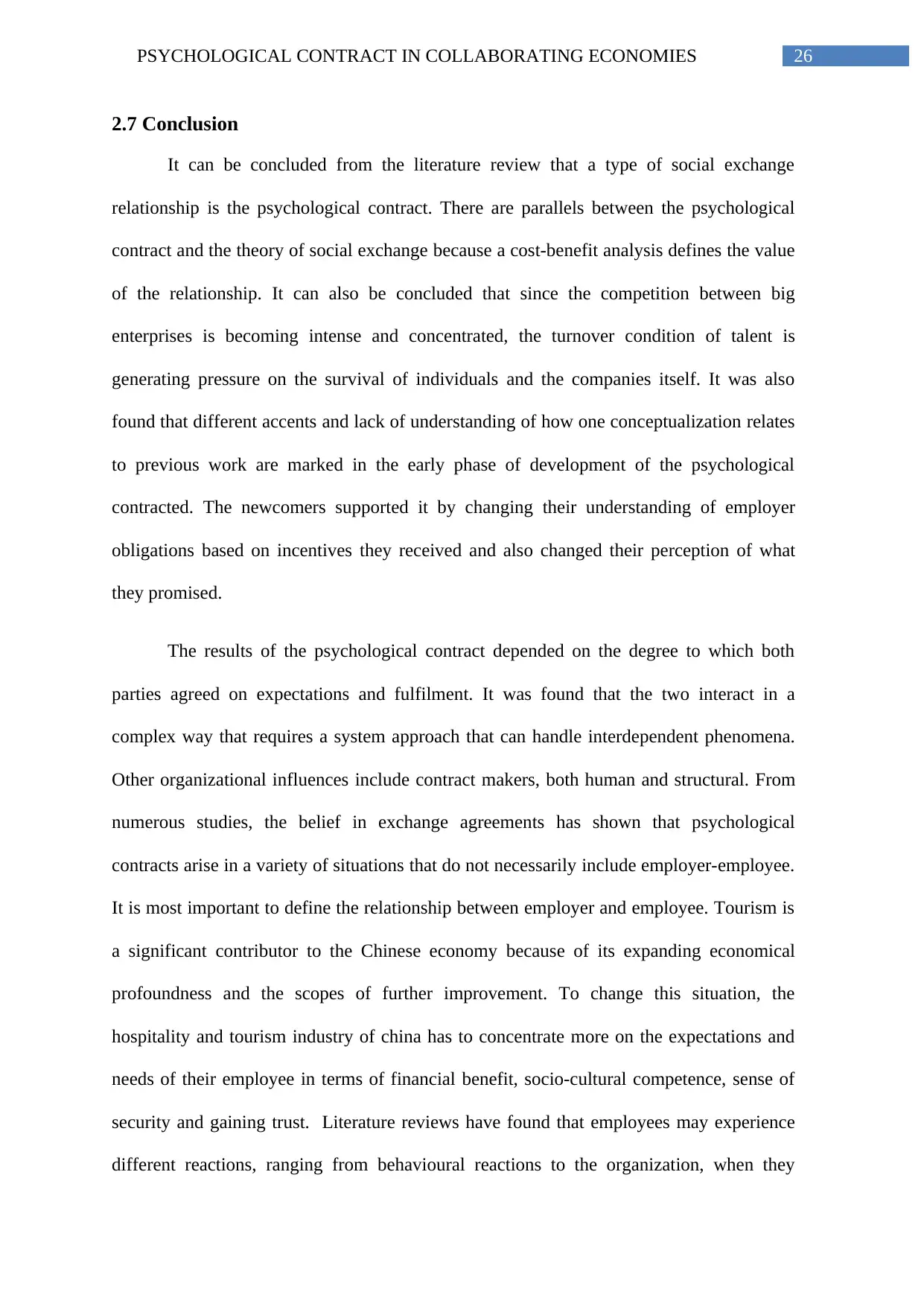
26PSYCHOLOGICAL CONTRACT IN COLLABORATING ECONOMIES
2.7 Conclusion
It can be concluded from the literature review that a type of social exchange
relationship is the psychological contract. There are parallels between the psychological
contract and the theory of social exchange because a cost-benefit analysis defines the value
of the relationship. It can also be concluded that since the competition between big
enterprises is becoming intense and concentrated, the turnover condition of talent is
generating pressure on the survival of individuals and the companies itself. It was also
found that different accents and lack of understanding of how one conceptualization relates
to previous work are marked in the early phase of development of the psychological
contracted. The newcomers supported it by changing their understanding of employer
obligations based on incentives they received and also changed their perception of what
they promised.
The results of the psychological contract depended on the degree to which both
parties agreed on expectations and fulfilment. It was found that the two interact in a
complex way that requires a system approach that can handle interdependent phenomena.
Other organizational influences include contract makers, both human and structural. From
numerous studies, the belief in exchange agreements has shown that psychological
contracts arise in a variety of situations that do not necessarily include employer-employee.
It is most important to define the relationship between employer and employee. Tourism is
a significant contributor to the Chinese economy because of its expanding economical
profoundness and the scopes of further improvement. To change this situation, the
hospitality and tourism industry of china has to concentrate more on the expectations and
needs of their employee in terms of financial benefit, socio-cultural competence, sense of
security and gaining trust. Literature reviews have found that employees may experience
different reactions, ranging from behavioural reactions to the organization, when they
2.7 Conclusion
It can be concluded from the literature review that a type of social exchange
relationship is the psychological contract. There are parallels between the psychological
contract and the theory of social exchange because a cost-benefit analysis defines the value
of the relationship. It can also be concluded that since the competition between big
enterprises is becoming intense and concentrated, the turnover condition of talent is
generating pressure on the survival of individuals and the companies itself. It was also
found that different accents and lack of understanding of how one conceptualization relates
to previous work are marked in the early phase of development of the psychological
contracted. The newcomers supported it by changing their understanding of employer
obligations based on incentives they received and also changed their perception of what
they promised.
The results of the psychological contract depended on the degree to which both
parties agreed on expectations and fulfilment. It was found that the two interact in a
complex way that requires a system approach that can handle interdependent phenomena.
Other organizational influences include contract makers, both human and structural. From
numerous studies, the belief in exchange agreements has shown that psychological
contracts arise in a variety of situations that do not necessarily include employer-employee.
It is most important to define the relationship between employer and employee. Tourism is
a significant contributor to the Chinese economy because of its expanding economical
profoundness and the scopes of further improvement. To change this situation, the
hospitality and tourism industry of china has to concentrate more on the expectations and
needs of their employee in terms of financial benefit, socio-cultural competence, sense of
security and gaining trust. Literature reviews have found that employees may experience
different reactions, ranging from behavioural reactions to the organization, when they
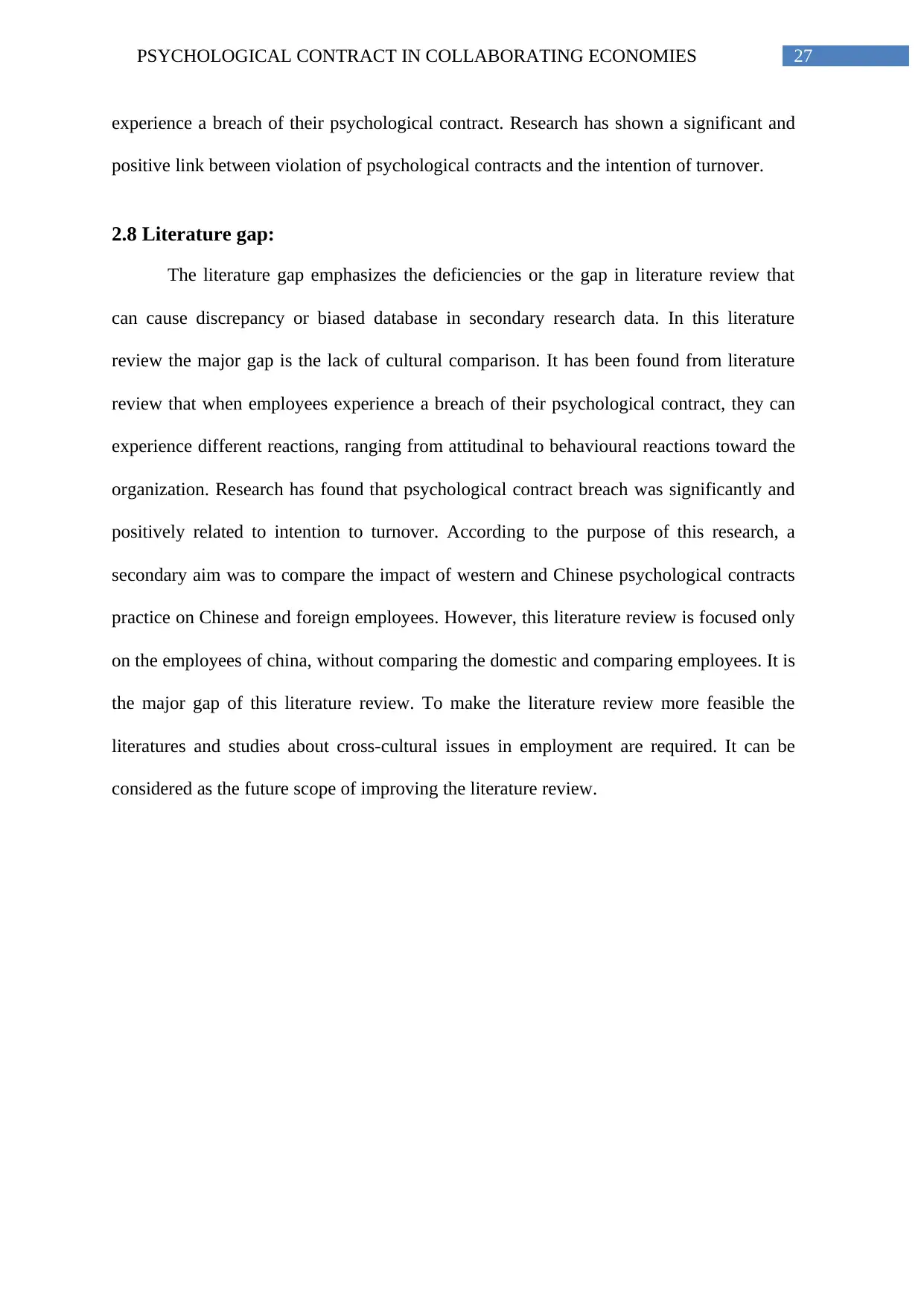
27PSYCHOLOGICAL CONTRACT IN COLLABORATING ECONOMIES
experience a breach of their psychological contract. Research has shown a significant and
positive link between violation of psychological contracts and the intention of turnover.
2.8 Literature gap:
The literature gap emphasizes the deficiencies or the gap in literature review that
can cause discrepancy or biased database in secondary research data. In this literature
review the major gap is the lack of cultural comparison. It has been found from literature
review that when employees experience a breach of their psychological contract, they can
experience different reactions, ranging from attitudinal to behavioural reactions toward the
organization. Research has found that psychological contract breach was significantly and
positively related to intention to turnover. According to the purpose of this research, a
secondary aim was to compare the impact of western and Chinese psychological contracts
practice on Chinese and foreign employees. However, this literature review is focused only
on the employees of china, without comparing the domestic and comparing employees. It is
the major gap of this literature review. To make the literature review more feasible the
literatures and studies about cross-cultural issues in employment are required. It can be
considered as the future scope of improving the literature review.
experience a breach of their psychological contract. Research has shown a significant and
positive link between violation of psychological contracts and the intention of turnover.
2.8 Literature gap:
The literature gap emphasizes the deficiencies or the gap in literature review that
can cause discrepancy or biased database in secondary research data. In this literature
review the major gap is the lack of cultural comparison. It has been found from literature
review that when employees experience a breach of their psychological contract, they can
experience different reactions, ranging from attitudinal to behavioural reactions toward the
organization. Research has found that psychological contract breach was significantly and
positively related to intention to turnover. According to the purpose of this research, a
secondary aim was to compare the impact of western and Chinese psychological contracts
practice on Chinese and foreign employees. However, this literature review is focused only
on the employees of china, without comparing the domestic and comparing employees. It is
the major gap of this literature review. To make the literature review more feasible the
literatures and studies about cross-cultural issues in employment are required. It can be
considered as the future scope of improving the literature review.
Secure Best Marks with AI Grader
Need help grading? Try our AI Grader for instant feedback on your assignments.
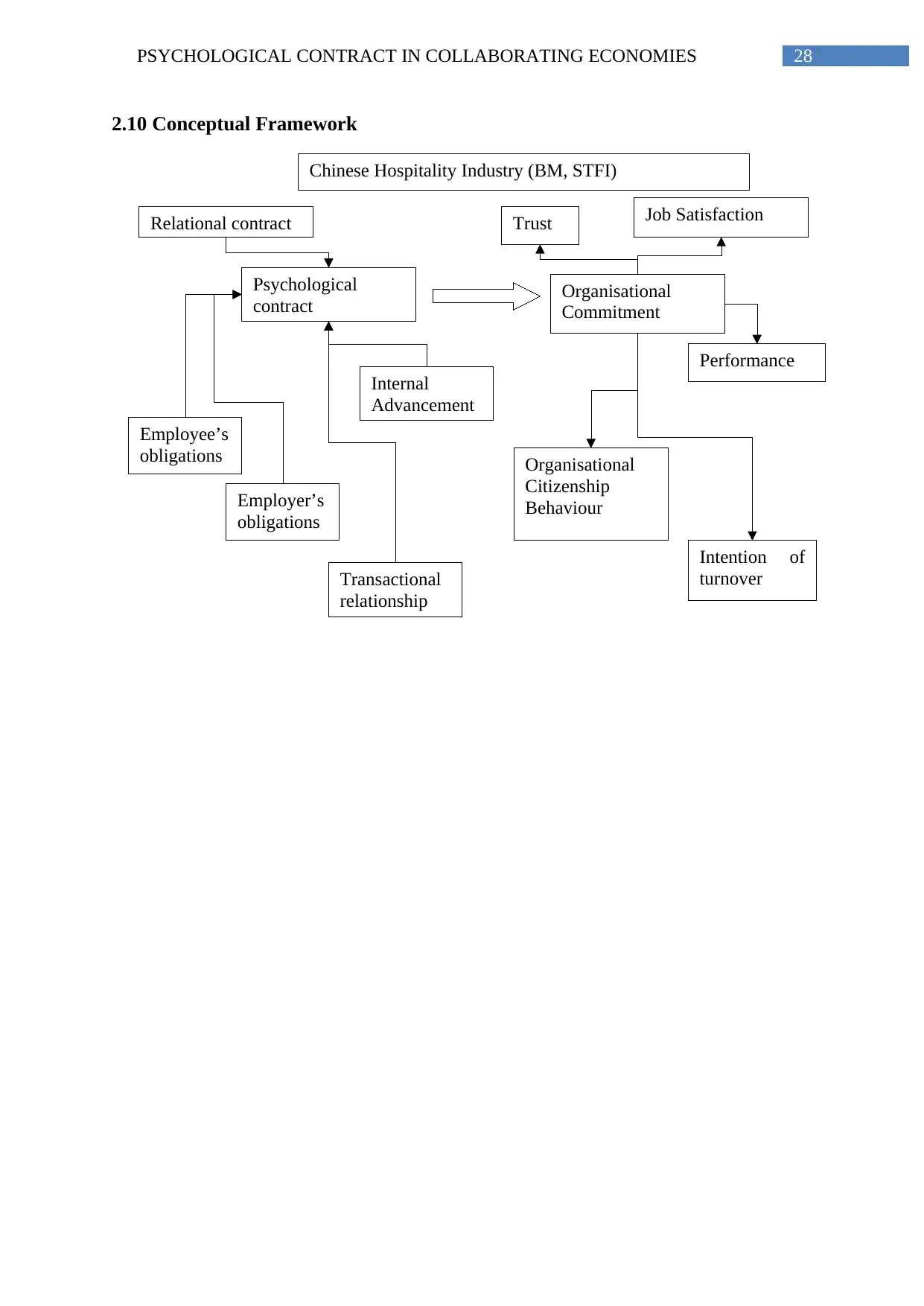
Psychological
contract Organisational
Commitment
Job Satisfaction
Organisational
Citizenship
Behaviour
Trust
Intention of
turnover
Performance
Relational contract
Transactional
relationship
Employer’s
obligations
Employee’s
obligations
Internal
Advancement
Chinese Hospitality Industry (BM, STFI)
28PSYCHOLOGICAL CONTRACT IN COLLABORATING ECONOMIES
2.10 Conceptual Framework
contract Organisational
Commitment
Job Satisfaction
Organisational
Citizenship
Behaviour
Trust
Intention of
turnover
Performance
Relational contract
Transactional
relationship
Employer’s
obligations
Employee’s
obligations
Internal
Advancement
Chinese Hospitality Industry (BM, STFI)
28PSYCHOLOGICAL CONTRACT IN COLLABORATING ECONOMIES
2.10 Conceptual Framework
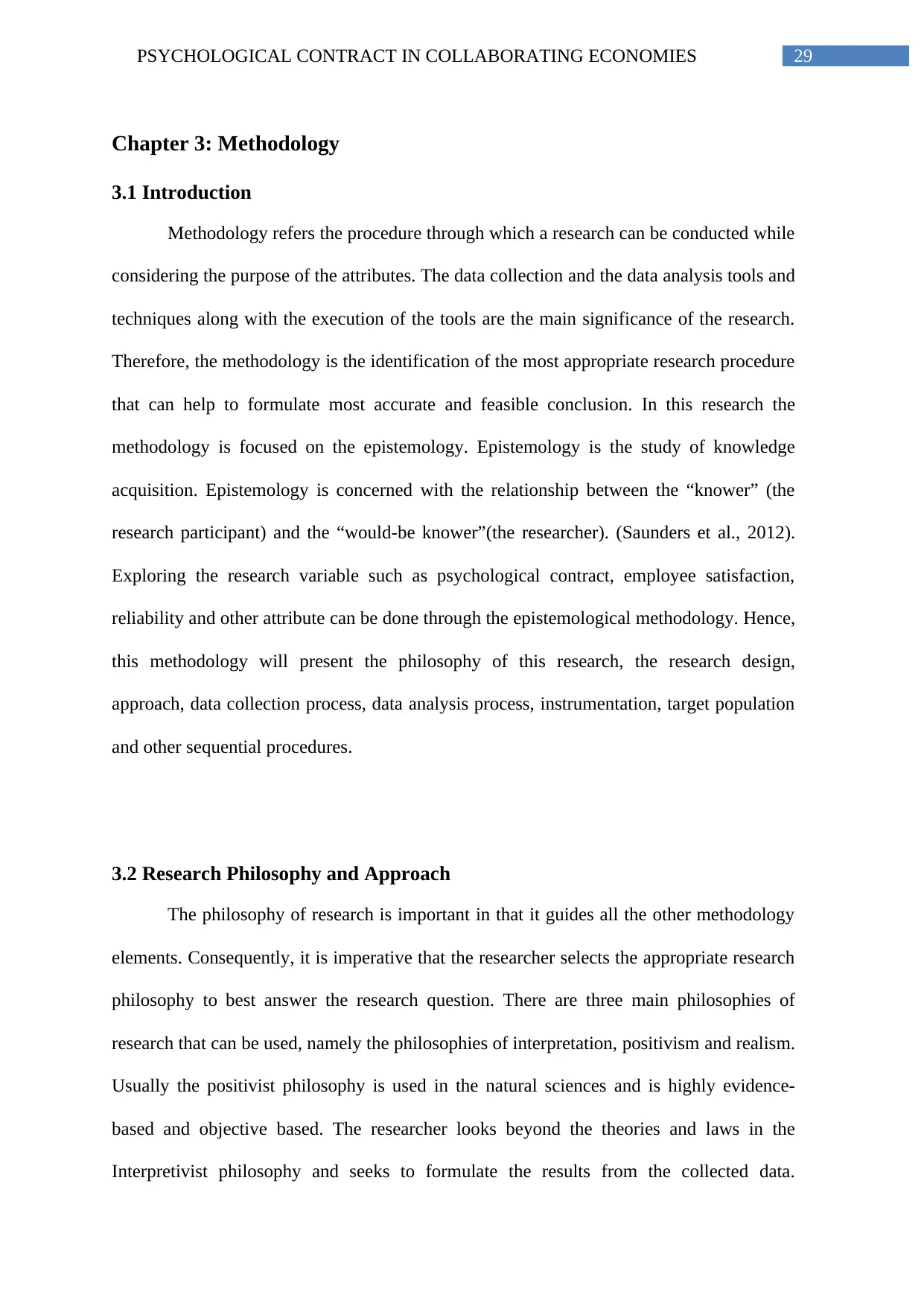
29PSYCHOLOGICAL CONTRACT IN COLLABORATING ECONOMIES
Chapter 3: Methodology
3.1 Introduction
Methodology refers the procedure through which a research can be conducted while
considering the purpose of the attributes. The data collection and the data analysis tools and
techniques along with the execution of the tools are the main significance of the research.
Therefore, the methodology is the identification of the most appropriate research procedure
that can help to formulate most accurate and feasible conclusion. In this research the
methodology is focused on the epistemology. Epistemology is the study of knowledge
acquisition. Epistemology is concerned with the relationship between the “knower” (the
research participant) and the “would-be knower”(the researcher). (Saunders et al., 2012).
Exploring the research variable such as psychological contract, employee satisfaction,
reliability and other attribute can be done through the epistemological methodology. Hence,
this methodology will present the philosophy of this research, the research design,
approach, data collection process, data analysis process, instrumentation, target population
and other sequential procedures.
3.2 Research Philosophy and Approach
The philosophy of research is important in that it guides all the other methodology
elements. Consequently, it is imperative that the researcher selects the appropriate research
philosophy to best answer the research question. There are three main philosophies of
research that can be used, namely the philosophies of interpretation, positivism and realism.
Usually the positivist philosophy is used in the natural sciences and is highly evidence-
based and objective based. The researcher looks beyond the theories and laws in the
Interpretivist philosophy and seeks to formulate the results from the collected data.
Chapter 3: Methodology
3.1 Introduction
Methodology refers the procedure through which a research can be conducted while
considering the purpose of the attributes. The data collection and the data analysis tools and
techniques along with the execution of the tools are the main significance of the research.
Therefore, the methodology is the identification of the most appropriate research procedure
that can help to formulate most accurate and feasible conclusion. In this research the
methodology is focused on the epistemology. Epistemology is the study of knowledge
acquisition. Epistemology is concerned with the relationship between the “knower” (the
research participant) and the “would-be knower”(the researcher). (Saunders et al., 2012).
Exploring the research variable such as psychological contract, employee satisfaction,
reliability and other attribute can be done through the epistemological methodology. Hence,
this methodology will present the philosophy of this research, the research design,
approach, data collection process, data analysis process, instrumentation, target population
and other sequential procedures.
3.2 Research Philosophy and Approach
The philosophy of research is important in that it guides all the other methodology
elements. Consequently, it is imperative that the researcher selects the appropriate research
philosophy to best answer the research question. There are three main philosophies of
research that can be used, namely the philosophies of interpretation, positivism and realism.
Usually the positivist philosophy is used in the natural sciences and is highly evidence-
based and objective based. The researcher looks beyond the theories and laws in the
Interpretivist philosophy and seeks to formulate the results from the collected data.
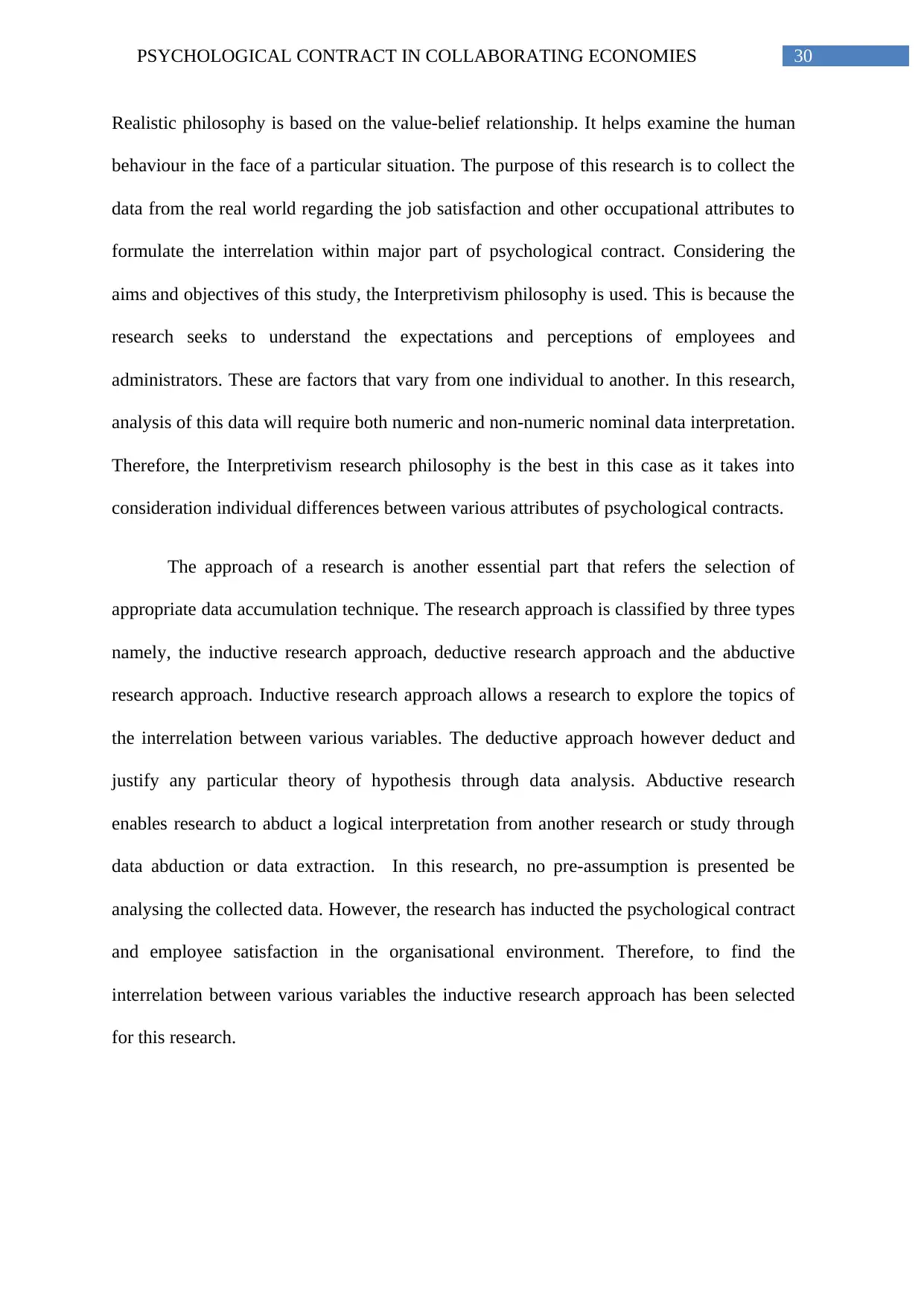
30PSYCHOLOGICAL CONTRACT IN COLLABORATING ECONOMIES
Realistic philosophy is based on the value-belief relationship. It helps examine the human
behaviour in the face of a particular situation. The purpose of this research is to collect the
data from the real world regarding the job satisfaction and other occupational attributes to
formulate the interrelation within major part of psychological contract. Considering the
aims and objectives of this study, the Interpretivism philosophy is used. This is because the
research seeks to understand the expectations and perceptions of employees and
administrators. These are factors that vary from one individual to another. In this research,
analysis of this data will require both numeric and non-numeric nominal data interpretation.
Therefore, the Interpretivism research philosophy is the best in this case as it takes into
consideration individual differences between various attributes of psychological contracts.
The approach of a research is another essential part that refers the selection of
appropriate data accumulation technique. The research approach is classified by three types
namely, the inductive research approach, deductive research approach and the abductive
research approach. Inductive research approach allows a research to explore the topics of
the interrelation between various variables. The deductive approach however deduct and
justify any particular theory of hypothesis through data analysis. Abductive research
enables research to abduct a logical interpretation from another research or study through
data abduction or data extraction. In this research, no pre-assumption is presented be
analysing the collected data. However, the research has inducted the psychological contract
and employee satisfaction in the organisational environment. Therefore, to find the
interrelation between various variables the inductive research approach has been selected
for this research.
Realistic philosophy is based on the value-belief relationship. It helps examine the human
behaviour in the face of a particular situation. The purpose of this research is to collect the
data from the real world regarding the job satisfaction and other occupational attributes to
formulate the interrelation within major part of psychological contract. Considering the
aims and objectives of this study, the Interpretivism philosophy is used. This is because the
research seeks to understand the expectations and perceptions of employees and
administrators. These are factors that vary from one individual to another. In this research,
analysis of this data will require both numeric and non-numeric nominal data interpretation.
Therefore, the Interpretivism research philosophy is the best in this case as it takes into
consideration individual differences between various attributes of psychological contracts.
The approach of a research is another essential part that refers the selection of
appropriate data accumulation technique. The research approach is classified by three types
namely, the inductive research approach, deductive research approach and the abductive
research approach. Inductive research approach allows a research to explore the topics of
the interrelation between various variables. The deductive approach however deduct and
justify any particular theory of hypothesis through data analysis. Abductive research
enables research to abduct a logical interpretation from another research or study through
data abduction or data extraction. In this research, no pre-assumption is presented be
analysing the collected data. However, the research has inducted the psychological contract
and employee satisfaction in the organisational environment. Therefore, to find the
interrelation between various variables the inductive research approach has been selected
for this research.
Paraphrase This Document
Need a fresh take? Get an instant paraphrase of this document with our AI Paraphraser
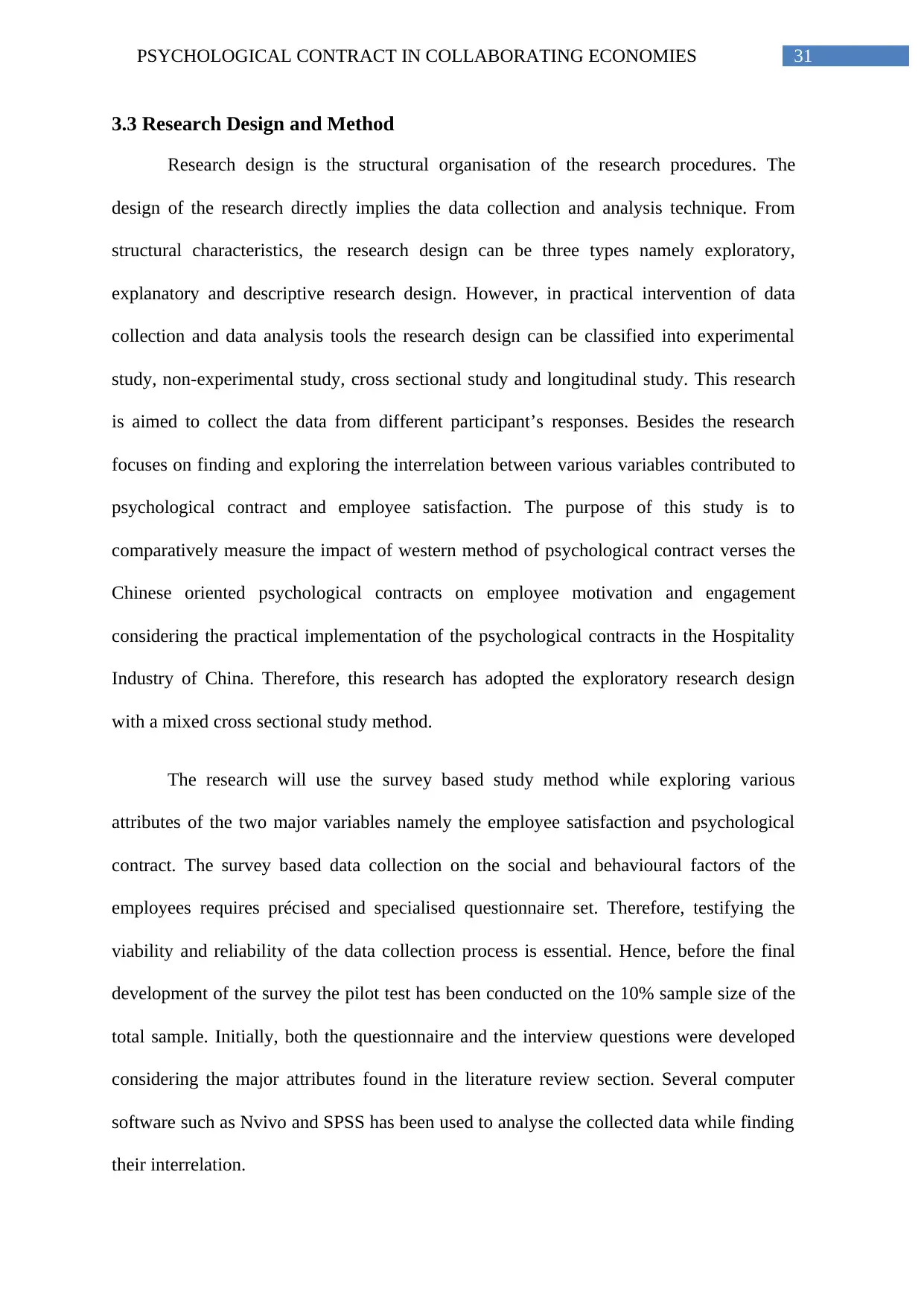
31PSYCHOLOGICAL CONTRACT IN COLLABORATING ECONOMIES
3.3 Research Design and Method
Research design is the structural organisation of the research procedures. The
design of the research directly implies the data collection and analysis technique. From
structural characteristics, the research design can be three types namely exploratory,
explanatory and descriptive research design. However, in practical intervention of data
collection and data analysis tools the research design can be classified into experimental
study, non-experimental study, cross sectional study and longitudinal study. This research
is aimed to collect the data from different participant’s responses. Besides the research
focuses on finding and exploring the interrelation between various variables contributed to
psychological contract and employee satisfaction. The purpose of this study is to
comparatively measure the impact of western method of psychological contract verses the
Chinese oriented psychological contracts on employee motivation and engagement
considering the practical implementation of the psychological contracts in the Hospitality
Industry of China. Therefore, this research has adopted the exploratory research design
with a mixed cross sectional study method.
The research will use the survey based study method while exploring various
attributes of the two major variables namely the employee satisfaction and psychological
contract. The survey based data collection on the social and behavioural factors of the
employees requires précised and specialised questionnaire set. Therefore, testifying the
viability and reliability of the data collection process is essential. Hence, before the final
development of the survey the pilot test has been conducted on the 10% sample size of the
total sample. Initially, both the questionnaire and the interview questions were developed
considering the major attributes found in the literature review section. Several computer
software such as Nvivo and SPSS has been used to analyse the collected data while finding
their interrelation.
3.3 Research Design and Method
Research design is the structural organisation of the research procedures. The
design of the research directly implies the data collection and analysis technique. From
structural characteristics, the research design can be three types namely exploratory,
explanatory and descriptive research design. However, in practical intervention of data
collection and data analysis tools the research design can be classified into experimental
study, non-experimental study, cross sectional study and longitudinal study. This research
is aimed to collect the data from different participant’s responses. Besides the research
focuses on finding and exploring the interrelation between various variables contributed to
psychological contract and employee satisfaction. The purpose of this study is to
comparatively measure the impact of western method of psychological contract verses the
Chinese oriented psychological contracts on employee motivation and engagement
considering the practical implementation of the psychological contracts in the Hospitality
Industry of China. Therefore, this research has adopted the exploratory research design
with a mixed cross sectional study method.
The research will use the survey based study method while exploring various
attributes of the two major variables namely the employee satisfaction and psychological
contract. The survey based data collection on the social and behavioural factors of the
employees requires précised and specialised questionnaire set. Therefore, testifying the
viability and reliability of the data collection process is essential. Hence, before the final
development of the survey the pilot test has been conducted on the 10% sample size of the
total sample. Initially, both the questionnaire and the interview questions were developed
considering the major attributes found in the literature review section. Several computer
software such as Nvivo and SPSS has been used to analyse the collected data while finding
their interrelation.
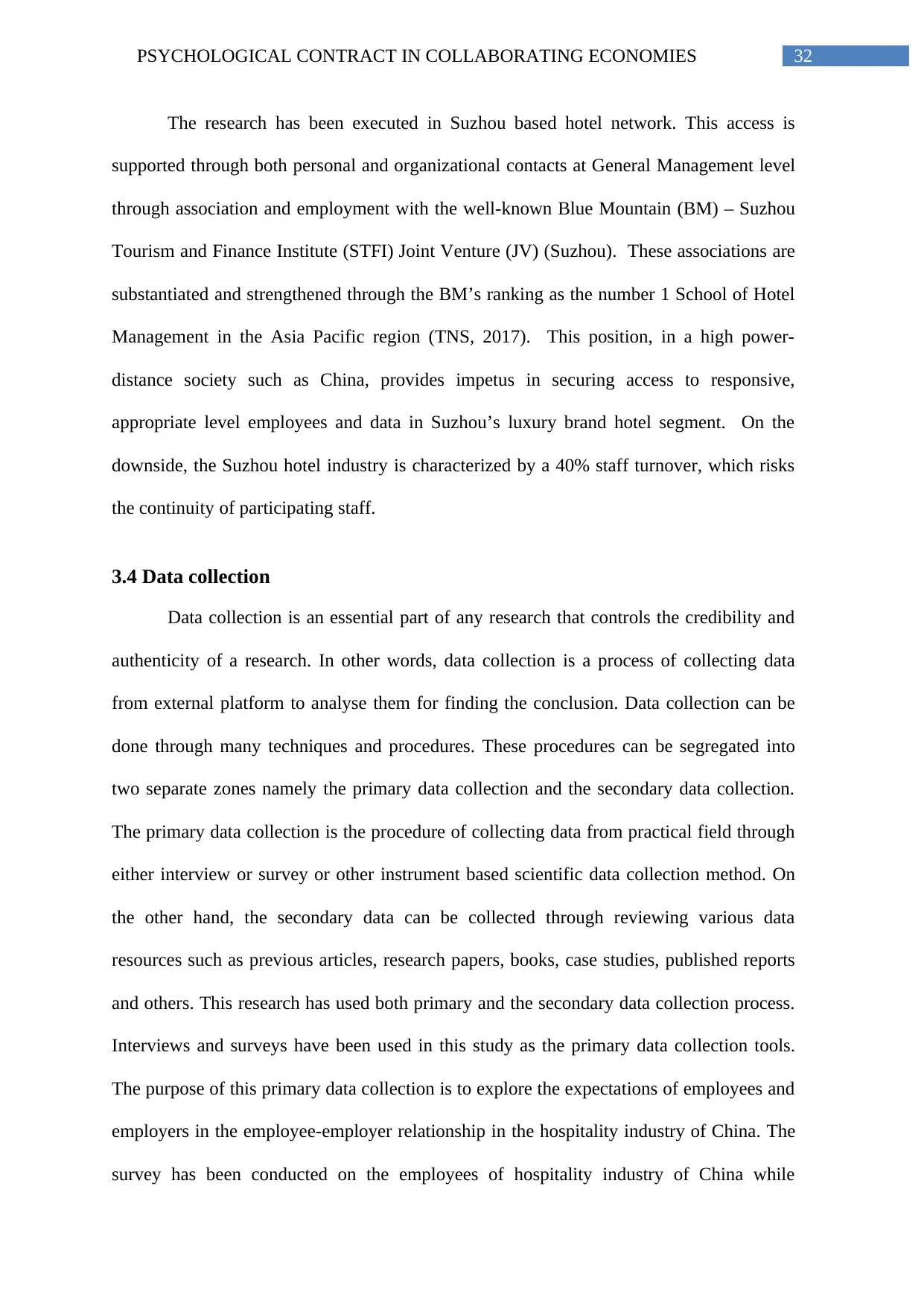
32PSYCHOLOGICAL CONTRACT IN COLLABORATING ECONOMIES
The research has been executed in Suzhou based hotel network. This access is
supported through both personal and organizational contacts at General Management level
through association and employment with the well-known Blue Mountain (BM) – Suzhou
Tourism and Finance Institute (STFI) Joint Venture (JV) (Suzhou). These associations are
substantiated and strengthened through the BM’s ranking as the number 1 School of Hotel
Management in the Asia Pacific region (TNS, 2017). This position, in a high power-
distance society such as China, provides impetus in securing access to responsive,
appropriate level employees and data in Suzhou’s luxury brand hotel segment. On the
downside, the Suzhou hotel industry is characterized by a 40% staff turnover, which risks
the continuity of participating staff.
3.4 Data collection
Data collection is an essential part of any research that controls the credibility and
authenticity of a research. In other words, data collection is a process of collecting data
from external platform to analyse them for finding the conclusion. Data collection can be
done through many techniques and procedures. These procedures can be segregated into
two separate zones namely the primary data collection and the secondary data collection.
The primary data collection is the procedure of collecting data from practical field through
either interview or survey or other instrument based scientific data collection method. On
the other hand, the secondary data can be collected through reviewing various data
resources such as previous articles, research papers, books, case studies, published reports
and others. This research has used both primary and the secondary data collection process.
Interviews and surveys have been used in this study as the primary data collection tools.
The purpose of this primary data collection is to explore the expectations of employees and
employers in the employee-employer relationship in the hospitality industry of China. The
survey has been conducted on the employees of hospitality industry of China while
The research has been executed in Suzhou based hotel network. This access is
supported through both personal and organizational contacts at General Management level
through association and employment with the well-known Blue Mountain (BM) – Suzhou
Tourism and Finance Institute (STFI) Joint Venture (JV) (Suzhou). These associations are
substantiated and strengthened through the BM’s ranking as the number 1 School of Hotel
Management in the Asia Pacific region (TNS, 2017). This position, in a high power-
distance society such as China, provides impetus in securing access to responsive,
appropriate level employees and data in Suzhou’s luxury brand hotel segment. On the
downside, the Suzhou hotel industry is characterized by a 40% staff turnover, which risks
the continuity of participating staff.
3.4 Data collection
Data collection is an essential part of any research that controls the credibility and
authenticity of a research. In other words, data collection is a process of collecting data
from external platform to analyse them for finding the conclusion. Data collection can be
done through many techniques and procedures. These procedures can be segregated into
two separate zones namely the primary data collection and the secondary data collection.
The primary data collection is the procedure of collecting data from practical field through
either interview or survey or other instrument based scientific data collection method. On
the other hand, the secondary data can be collected through reviewing various data
resources such as previous articles, research papers, books, case studies, published reports
and others. This research has used both primary and the secondary data collection process.
Interviews and surveys have been used in this study as the primary data collection tools.
The purpose of this primary data collection is to explore the expectations of employees and
employers in the employee-employer relationship in the hospitality industry of China. The
survey has been conducted on the employees of hospitality industry of China while
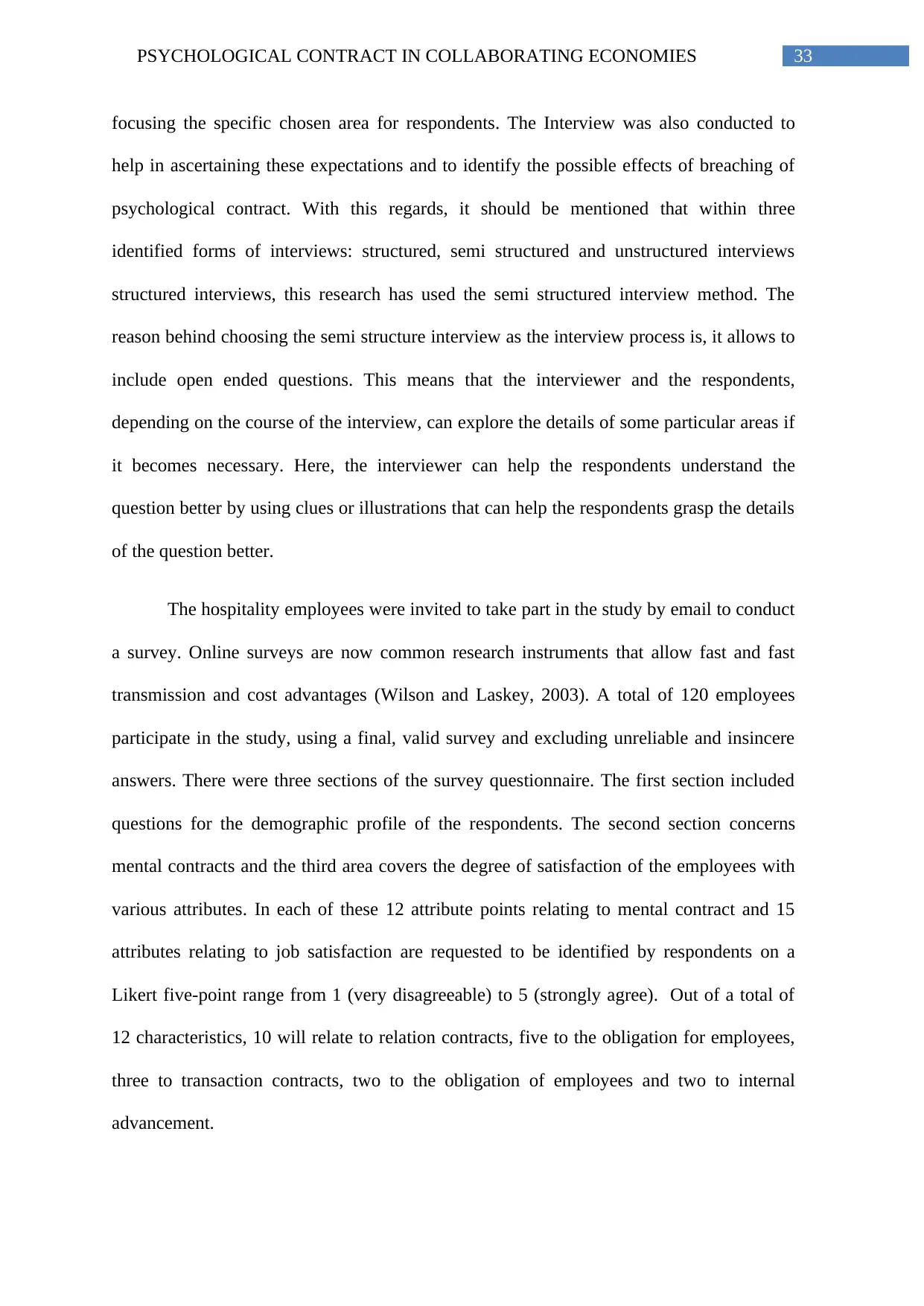
33PSYCHOLOGICAL CONTRACT IN COLLABORATING ECONOMIES
focusing the specific chosen area for respondents. The Interview was also conducted to
help in ascertaining these expectations and to identify the possible effects of breaching of
psychological contract. With this regards, it should be mentioned that within three
identified forms of interviews: structured, semi structured and unstructured interviews
structured interviews, this research has used the semi structured interview method. The
reason behind choosing the semi structure interview as the interview process is, it allows to
include open ended questions. This means that the interviewer and the respondents,
depending on the course of the interview, can explore the details of some particular areas if
it becomes necessary. Here, the interviewer can help the respondents understand the
question better by using clues or illustrations that can help the respondents grasp the details
of the question better.
The hospitality employees were invited to take part in the study by email to conduct
a survey. Online surveys are now common research instruments that allow fast and fast
transmission and cost advantages (Wilson and Laskey, 2003). A total of 120 employees
participate in the study, using a final, valid survey and excluding unreliable and insincere
answers. There were three sections of the survey questionnaire. The first section included
questions for the demographic profile of the respondents. The second section concerns
mental contracts and the third area covers the degree of satisfaction of the employees with
various attributes. In each of these 12 attribute points relating to mental contract and 15
attributes relating to job satisfaction are requested to be identified by respondents on a
Likert five-point range from 1 (very disagreeable) to 5 (strongly agree). Out of a total of
12 characteristics, 10 will relate to relation contracts, five to the obligation for employees,
three to transaction contracts, two to the obligation of employees and two to internal
advancement.
focusing the specific chosen area for respondents. The Interview was also conducted to
help in ascertaining these expectations and to identify the possible effects of breaching of
psychological contract. With this regards, it should be mentioned that within three
identified forms of interviews: structured, semi structured and unstructured interviews
structured interviews, this research has used the semi structured interview method. The
reason behind choosing the semi structure interview as the interview process is, it allows to
include open ended questions. This means that the interviewer and the respondents,
depending on the course of the interview, can explore the details of some particular areas if
it becomes necessary. Here, the interviewer can help the respondents understand the
question better by using clues or illustrations that can help the respondents grasp the details
of the question better.
The hospitality employees were invited to take part in the study by email to conduct
a survey. Online surveys are now common research instruments that allow fast and fast
transmission and cost advantages (Wilson and Laskey, 2003). A total of 120 employees
participate in the study, using a final, valid survey and excluding unreliable and insincere
answers. There were three sections of the survey questionnaire. The first section included
questions for the demographic profile of the respondents. The second section concerns
mental contracts and the third area covers the degree of satisfaction of the employees with
various attributes. In each of these 12 attribute points relating to mental contract and 15
attributes relating to job satisfaction are requested to be identified by respondents on a
Likert five-point range from 1 (very disagreeable) to 5 (strongly agree). Out of a total of
12 characteristics, 10 will relate to relation contracts, five to the obligation for employees,
three to transaction contracts, two to the obligation of employees and two to internal
advancement.
Secure Best Marks with AI Grader
Need help grading? Try our AI Grader for instant feedback on your assignments.
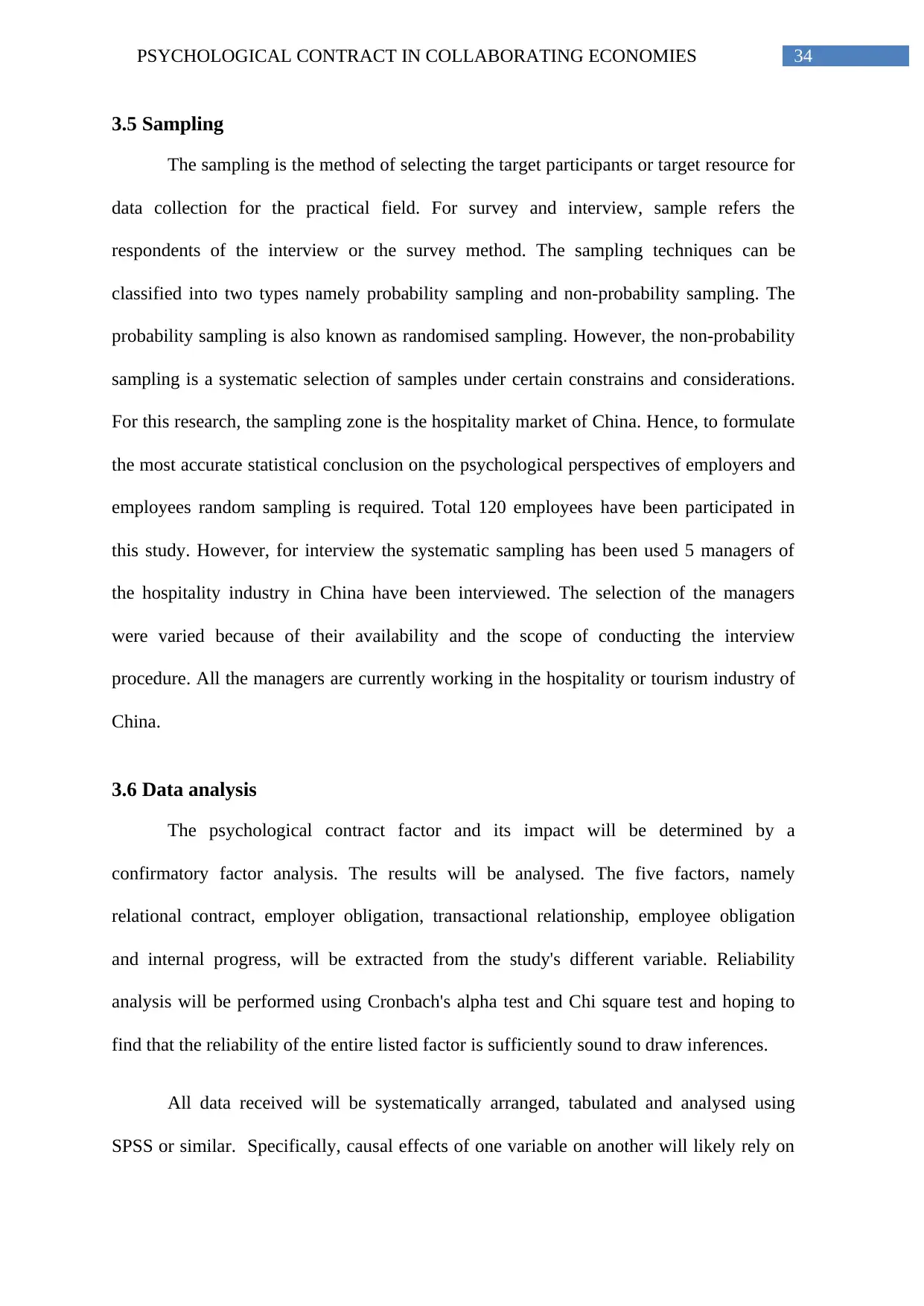
34PSYCHOLOGICAL CONTRACT IN COLLABORATING ECONOMIES
3.5 Sampling
The sampling is the method of selecting the target participants or target resource for
data collection for the practical field. For survey and interview, sample refers the
respondents of the interview or the survey method. The sampling techniques can be
classified into two types namely probability sampling and non-probability sampling. The
probability sampling is also known as randomised sampling. However, the non-probability
sampling is a systematic selection of samples under certain constrains and considerations.
For this research, the sampling zone is the hospitality market of China. Hence, to formulate
the most accurate statistical conclusion on the psychological perspectives of employers and
employees random sampling is required. Total 120 employees have been participated in
this study. However, for interview the systematic sampling has been used 5 managers of
the hospitality industry in China have been interviewed. The selection of the managers
were varied because of their availability and the scope of conducting the interview
procedure. All the managers are currently working in the hospitality or tourism industry of
China.
3.6 Data analysis
The psychological contract factor and its impact will be determined by a
confirmatory factor analysis. The results will be analysed. The five factors, namely
relational contract, employer obligation, transactional relationship, employee obligation
and internal progress, will be extracted from the study's different variable. Reliability
analysis will be performed using Cronbach's alpha test and Chi square test and hoping to
find that the reliability of the entire listed factor is sufficiently sound to draw inferences.
All data received will be systematically arranged, tabulated and analysed using
SPSS or similar. Specifically, causal effects of one variable on another will likely rely on
3.5 Sampling
The sampling is the method of selecting the target participants or target resource for
data collection for the practical field. For survey and interview, sample refers the
respondents of the interview or the survey method. The sampling techniques can be
classified into two types namely probability sampling and non-probability sampling. The
probability sampling is also known as randomised sampling. However, the non-probability
sampling is a systematic selection of samples under certain constrains and considerations.
For this research, the sampling zone is the hospitality market of China. Hence, to formulate
the most accurate statistical conclusion on the psychological perspectives of employers and
employees random sampling is required. Total 120 employees have been participated in
this study. However, for interview the systematic sampling has been used 5 managers of
the hospitality industry in China have been interviewed. The selection of the managers
were varied because of their availability and the scope of conducting the interview
procedure. All the managers are currently working in the hospitality or tourism industry of
China.
3.6 Data analysis
The psychological contract factor and its impact will be determined by a
confirmatory factor analysis. The results will be analysed. The five factors, namely
relational contract, employer obligation, transactional relationship, employee obligation
and internal progress, will be extracted from the study's different variable. Reliability
analysis will be performed using Cronbach's alpha test and Chi square test and hoping to
find that the reliability of the entire listed factor is sufficiently sound to draw inferences.
All data received will be systematically arranged, tabulated and analysed using
SPSS or similar. Specifically, causal effects of one variable on another will likely rely on
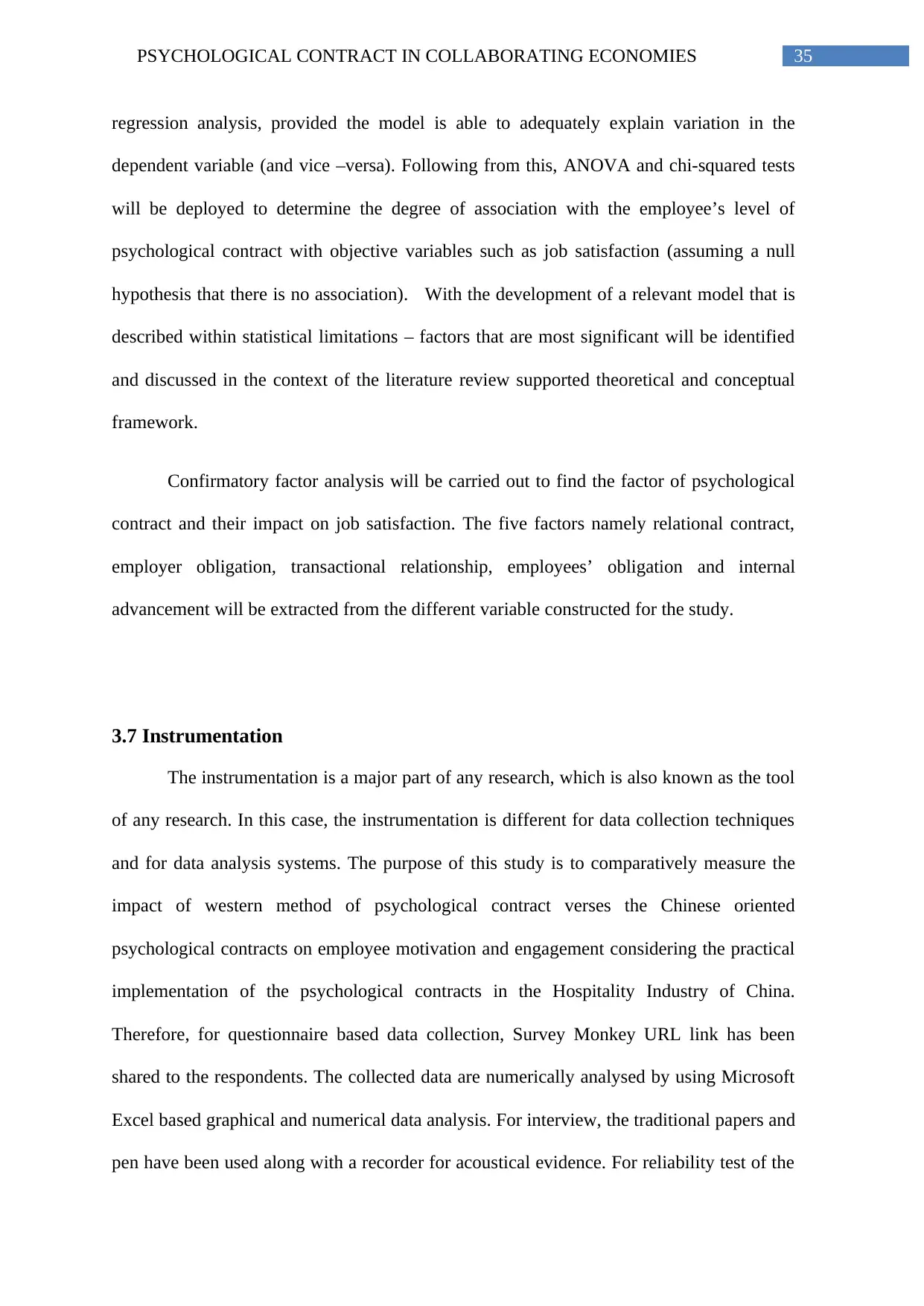
35PSYCHOLOGICAL CONTRACT IN COLLABORATING ECONOMIES
regression analysis, provided the model is able to adequately explain variation in the
dependent variable (and vice –versa). Following from this, ANOVA and chi-squared tests
will be deployed to determine the degree of association with the employee’s level of
psychological contract with objective variables such as job satisfaction (assuming a null
hypothesis that there is no association). With the development of a relevant model that is
described within statistical limitations – factors that are most significant will be identified
and discussed in the context of the literature review supported theoretical and conceptual
framework.
Confirmatory factor analysis will be carried out to find the factor of psychological
contract and their impact on job satisfaction. The five factors namely relational contract,
employer obligation, transactional relationship, employees’ obligation and internal
advancement will be extracted from the different variable constructed for the study.
3.7 Instrumentation
The instrumentation is a major part of any research, which is also known as the tool
of any research. In this case, the instrumentation is different for data collection techniques
and for data analysis systems. The purpose of this study is to comparatively measure the
impact of western method of psychological contract verses the Chinese oriented
psychological contracts on employee motivation and engagement considering the practical
implementation of the psychological contracts in the Hospitality Industry of China.
Therefore, for questionnaire based data collection, Survey Monkey URL link has been
shared to the respondents. The collected data are numerically analysed by using Microsoft
Excel based graphical and numerical data analysis. For interview, the traditional papers and
pen have been used along with a recorder for acoustical evidence. For reliability test of the
regression analysis, provided the model is able to adequately explain variation in the
dependent variable (and vice –versa). Following from this, ANOVA and chi-squared tests
will be deployed to determine the degree of association with the employee’s level of
psychological contract with objective variables such as job satisfaction (assuming a null
hypothesis that there is no association). With the development of a relevant model that is
described within statistical limitations – factors that are most significant will be identified
and discussed in the context of the literature review supported theoretical and conceptual
framework.
Confirmatory factor analysis will be carried out to find the factor of psychological
contract and their impact on job satisfaction. The five factors namely relational contract,
employer obligation, transactional relationship, employees’ obligation and internal
advancement will be extracted from the different variable constructed for the study.
3.7 Instrumentation
The instrumentation is a major part of any research, which is also known as the tool
of any research. In this case, the instrumentation is different for data collection techniques
and for data analysis systems. The purpose of this study is to comparatively measure the
impact of western method of psychological contract verses the Chinese oriented
psychological contracts on employee motivation and engagement considering the practical
implementation of the psychological contracts in the Hospitality Industry of China.
Therefore, for questionnaire based data collection, Survey Monkey URL link has been
shared to the respondents. The collected data are numerically analysed by using Microsoft
Excel based graphical and numerical data analysis. For interview, the traditional papers and
pen have been used along with a recorder for acoustical evidence. For reliability test of the
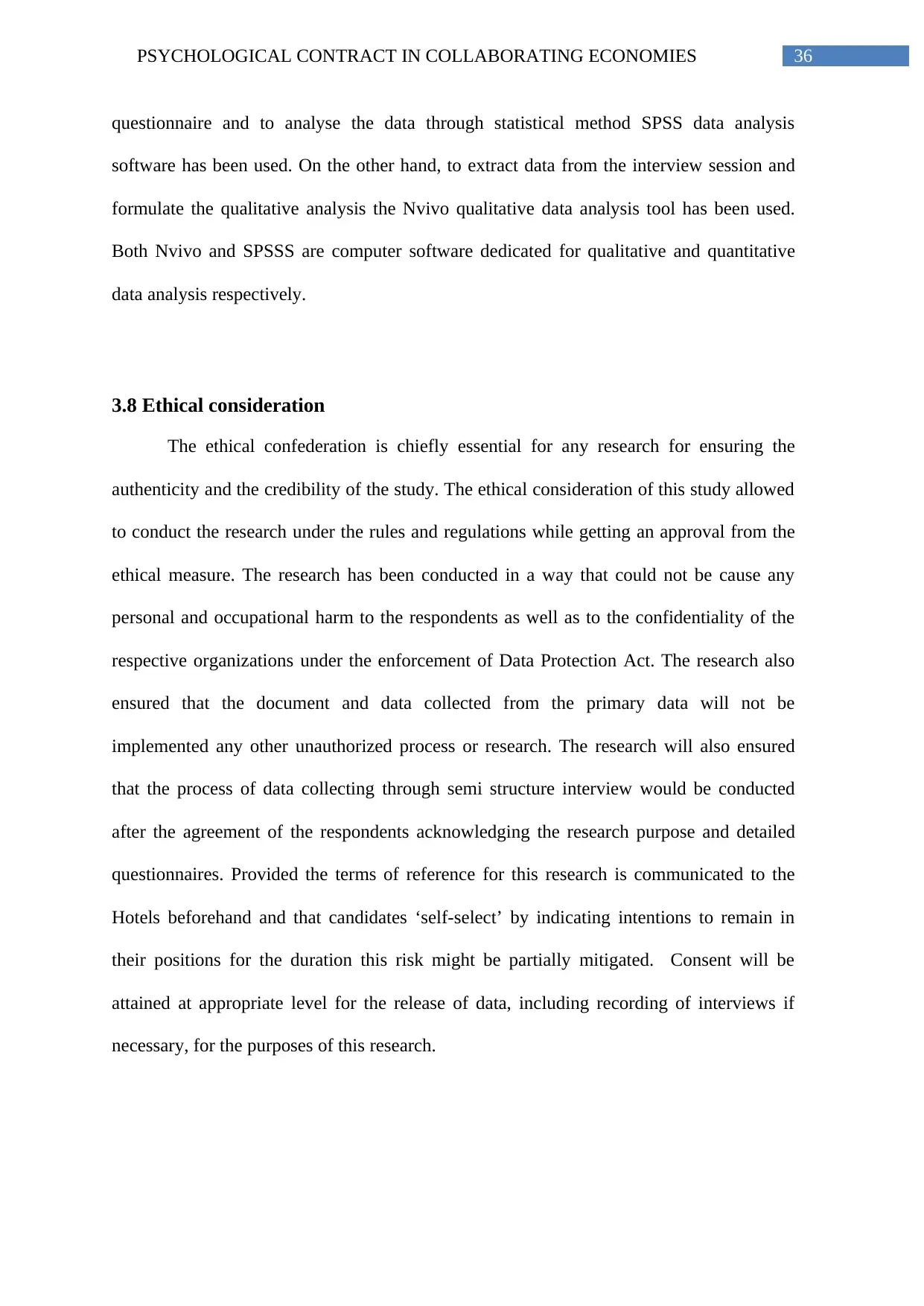
36PSYCHOLOGICAL CONTRACT IN COLLABORATING ECONOMIES
questionnaire and to analyse the data through statistical method SPSS data analysis
software has been used. On the other hand, to extract data from the interview session and
formulate the qualitative analysis the Nvivo qualitative data analysis tool has been used.
Both Nvivo and SPSSS are computer software dedicated for qualitative and quantitative
data analysis respectively.
3.8 Ethical consideration
The ethical confederation is chiefly essential for any research for ensuring the
authenticity and the credibility of the study. The ethical consideration of this study allowed
to conduct the research under the rules and regulations while getting an approval from the
ethical measure. The research has been conducted in a way that could not be cause any
personal and occupational harm to the respondents as well as to the confidentiality of the
respective organizations under the enforcement of Data Protection Act. The research also
ensured that the document and data collected from the primary data will not be
implemented any other unauthorized process or research. The research will also ensured
that the process of data collecting through semi structure interview would be conducted
after the agreement of the respondents acknowledging the research purpose and detailed
questionnaires. Provided the terms of reference for this research is communicated to the
Hotels beforehand and that candidates ‘self-select’ by indicating intentions to remain in
their positions for the duration this risk might be partially mitigated. Consent will be
attained at appropriate level for the release of data, including recording of interviews if
necessary, for the purposes of this research.
questionnaire and to analyse the data through statistical method SPSS data analysis
software has been used. On the other hand, to extract data from the interview session and
formulate the qualitative analysis the Nvivo qualitative data analysis tool has been used.
Both Nvivo and SPSSS are computer software dedicated for qualitative and quantitative
data analysis respectively.
3.8 Ethical consideration
The ethical confederation is chiefly essential for any research for ensuring the
authenticity and the credibility of the study. The ethical consideration of this study allowed
to conduct the research under the rules and regulations while getting an approval from the
ethical measure. The research has been conducted in a way that could not be cause any
personal and occupational harm to the respondents as well as to the confidentiality of the
respective organizations under the enforcement of Data Protection Act. The research also
ensured that the document and data collected from the primary data will not be
implemented any other unauthorized process or research. The research will also ensured
that the process of data collecting through semi structure interview would be conducted
after the agreement of the respondents acknowledging the research purpose and detailed
questionnaires. Provided the terms of reference for this research is communicated to the
Hotels beforehand and that candidates ‘self-select’ by indicating intentions to remain in
their positions for the duration this risk might be partially mitigated. Consent will be
attained at appropriate level for the release of data, including recording of interviews if
necessary, for the purposes of this research.
Paraphrase This Document
Need a fresh take? Get an instant paraphrase of this document with our AI Paraphraser
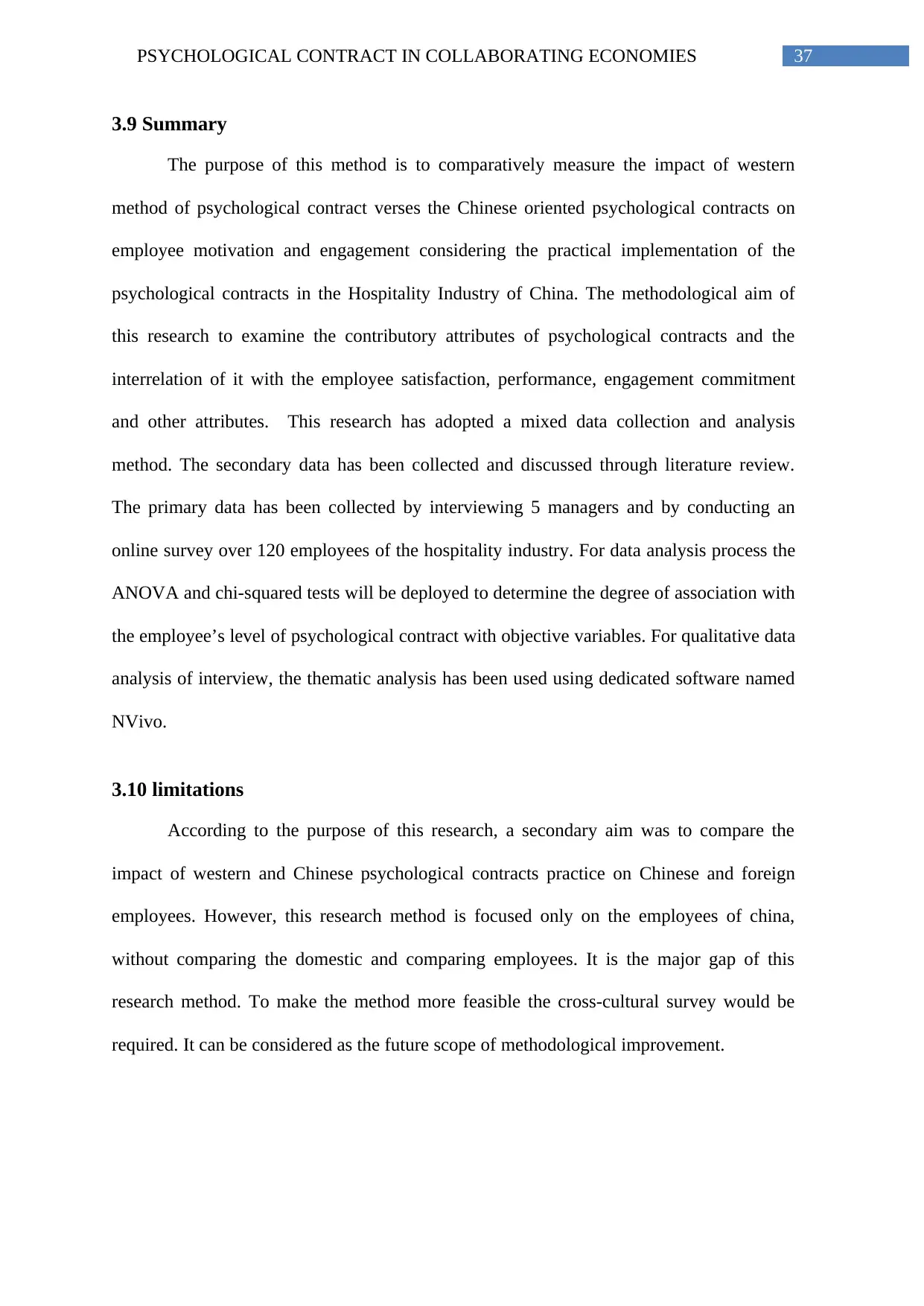
37PSYCHOLOGICAL CONTRACT IN COLLABORATING ECONOMIES
3.9 Summary
The purpose of this method is to comparatively measure the impact of western
method of psychological contract verses the Chinese oriented psychological contracts on
employee motivation and engagement considering the practical implementation of the
psychological contracts in the Hospitality Industry of China. The methodological aim of
this research to examine the contributory attributes of psychological contracts and the
interrelation of it with the employee satisfaction, performance, engagement commitment
and other attributes. This research has adopted a mixed data collection and analysis
method. The secondary data has been collected and discussed through literature review.
The primary data has been collected by interviewing 5 managers and by conducting an
online survey over 120 employees of the hospitality industry. For data analysis process the
ANOVA and chi-squared tests will be deployed to determine the degree of association with
the employee’s level of psychological contract with objective variables. For qualitative data
analysis of interview, the thematic analysis has been used using dedicated software named
NVivo.
3.10 limitations
According to the purpose of this research, a secondary aim was to compare the
impact of western and Chinese psychological contracts practice on Chinese and foreign
employees. However, this research method is focused only on the employees of china,
without comparing the domestic and comparing employees. It is the major gap of this
research method. To make the method more feasible the cross-cultural survey would be
required. It can be considered as the future scope of methodological improvement.
3.9 Summary
The purpose of this method is to comparatively measure the impact of western
method of psychological contract verses the Chinese oriented psychological contracts on
employee motivation and engagement considering the practical implementation of the
psychological contracts in the Hospitality Industry of China. The methodological aim of
this research to examine the contributory attributes of psychological contracts and the
interrelation of it with the employee satisfaction, performance, engagement commitment
and other attributes. This research has adopted a mixed data collection and analysis
method. The secondary data has been collected and discussed through literature review.
The primary data has been collected by interviewing 5 managers and by conducting an
online survey over 120 employees of the hospitality industry. For data analysis process the
ANOVA and chi-squared tests will be deployed to determine the degree of association with
the employee’s level of psychological contract with objective variables. For qualitative data
analysis of interview, the thematic analysis has been used using dedicated software named
NVivo.
3.10 limitations
According to the purpose of this research, a secondary aim was to compare the
impact of western and Chinese psychological contracts practice on Chinese and foreign
employees. However, this research method is focused only on the employees of china,
without comparing the domestic and comparing employees. It is the major gap of this
research method. To make the method more feasible the cross-cultural survey would be
required. It can be considered as the future scope of methodological improvement.
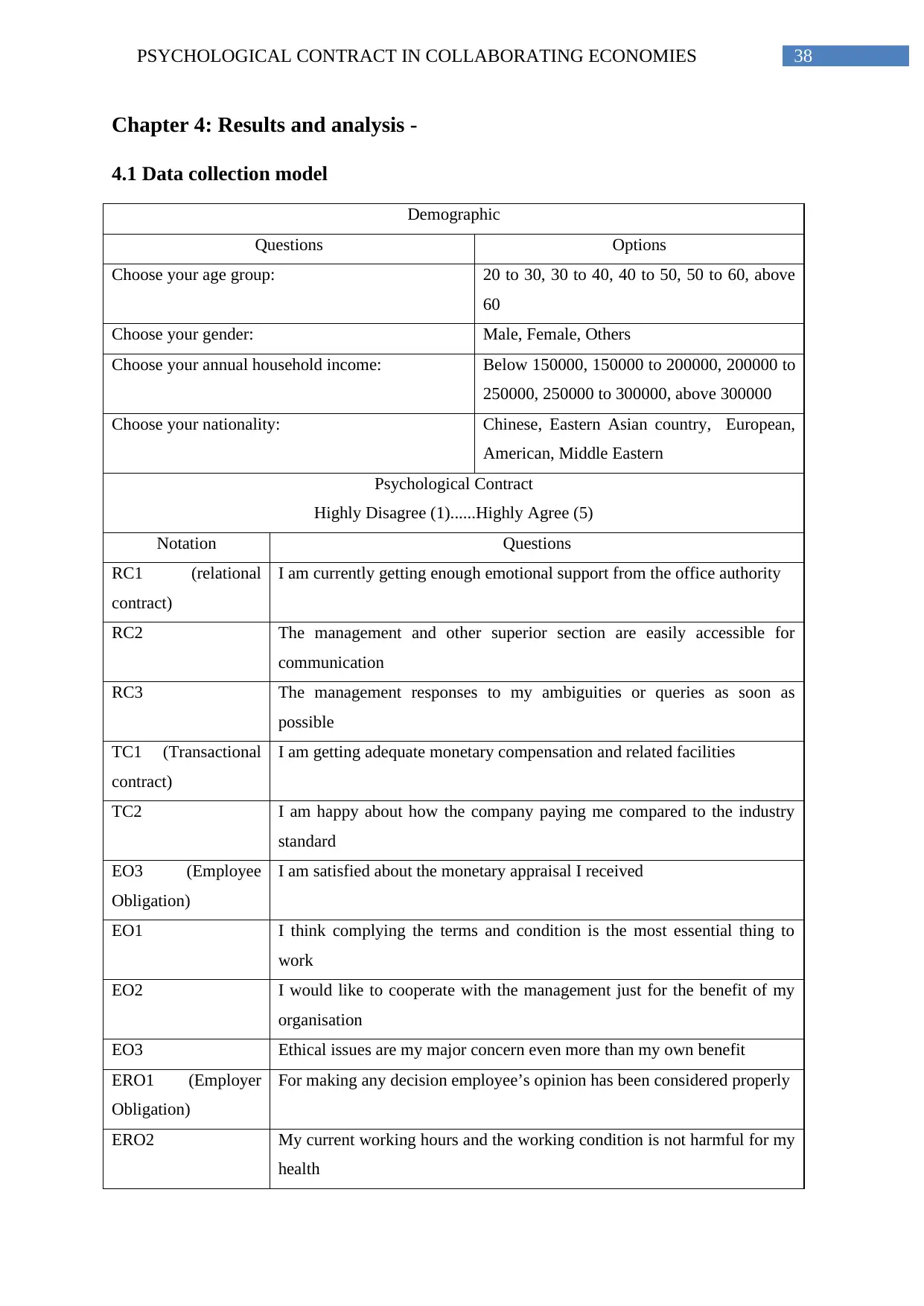
38PSYCHOLOGICAL CONTRACT IN COLLABORATING ECONOMIES
Chapter 4: Results and analysis -
4.1 Data collection model
Demographic
Questions Options
Choose your age group: 20 to 30, 30 to 40, 40 to 50, 50 to 60, above
60
Choose your gender: Male, Female, Others
Choose your annual household income: Below 150000, 150000 to 200000, 200000 to
250000, 250000 to 300000, above 300000
Choose your nationality: Chinese, Eastern Asian country, European,
American, Middle Eastern
Psychological Contract
Highly Disagree (1)......Highly Agree (5)
Notation Questions
RC1 (relational
contract)
I am currently getting enough emotional support from the office authority
RC2 The management and other superior section are easily accessible for
communication
RC3 The management responses to my ambiguities or queries as soon as
possible
TC1 (Transactional
contract)
I am getting adequate monetary compensation and related facilities
TC2 I am happy about how the company paying me compared to the industry
standard
EO3 (Employee
Obligation)
I am satisfied about the monetary appraisal I received
EO1 I think complying the terms and condition is the most essential thing to
work
EO2 I would like to cooperate with the management just for the benefit of my
organisation
EO3 Ethical issues are my major concern even more than my own benefit
ERO1 (Employer
Obligation)
For making any decision employee’s opinion has been considered properly
ERO2 My current working hours and the working condition is not harmful for my
health
Chapter 4: Results and analysis -
4.1 Data collection model
Demographic
Questions Options
Choose your age group: 20 to 30, 30 to 40, 40 to 50, 50 to 60, above
60
Choose your gender: Male, Female, Others
Choose your annual household income: Below 150000, 150000 to 200000, 200000 to
250000, 250000 to 300000, above 300000
Choose your nationality: Chinese, Eastern Asian country, European,
American, Middle Eastern
Psychological Contract
Highly Disagree (1)......Highly Agree (5)
Notation Questions
RC1 (relational
contract)
I am currently getting enough emotional support from the office authority
RC2 The management and other superior section are easily accessible for
communication
RC3 The management responses to my ambiguities or queries as soon as
possible
TC1 (Transactional
contract)
I am getting adequate monetary compensation and related facilities
TC2 I am happy about how the company paying me compared to the industry
standard
EO3 (Employee
Obligation)
I am satisfied about the monetary appraisal I received
EO1 I think complying the terms and condition is the most essential thing to
work
EO2 I would like to cooperate with the management just for the benefit of my
organisation
EO3 Ethical issues are my major concern even more than my own benefit
ERO1 (Employer
Obligation)
For making any decision employee’s opinion has been considered properly
ERO2 My current working hours and the working condition is not harmful for my
health
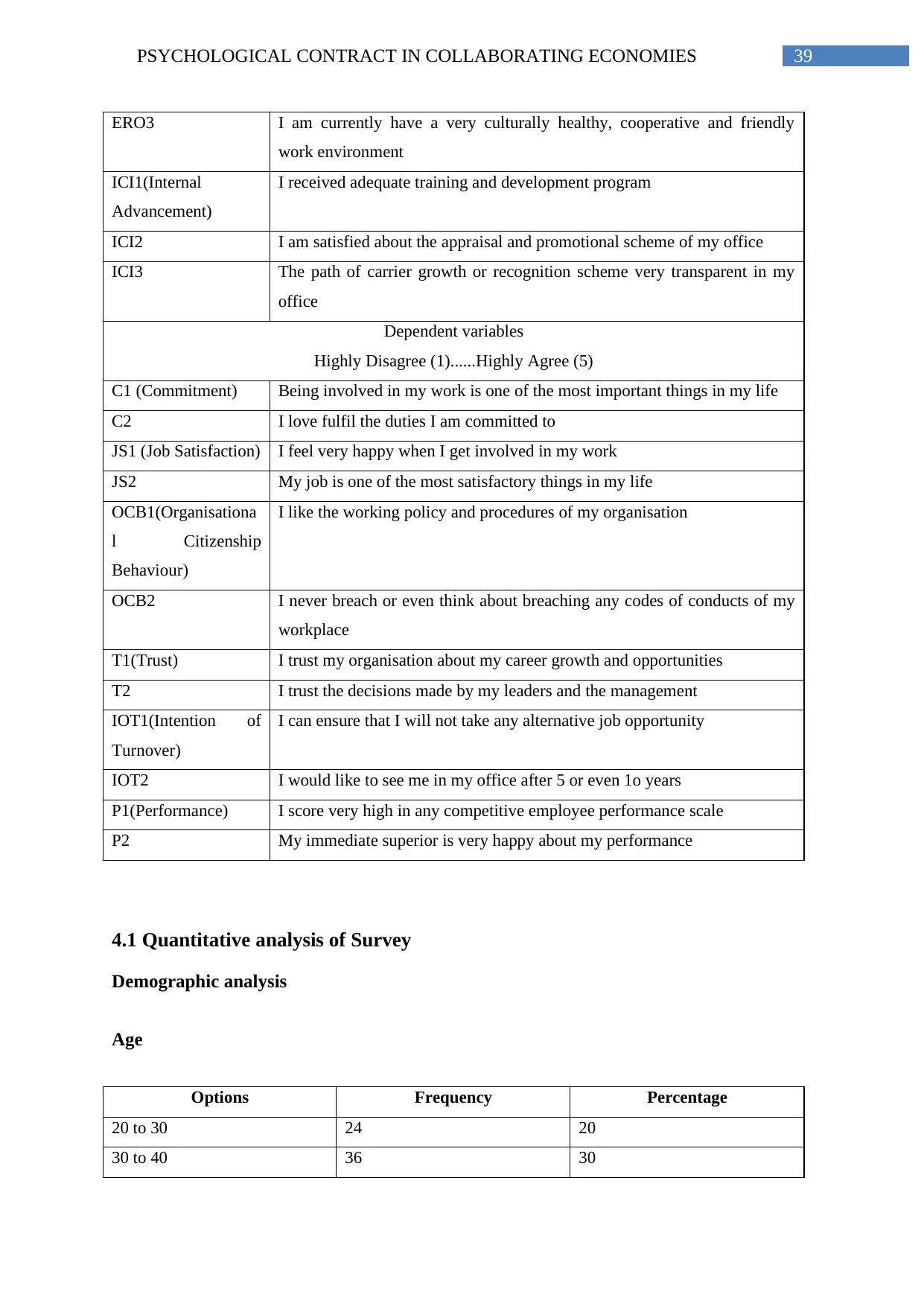
39PSYCHOLOGICAL CONTRACT IN COLLABORATING ECONOMIES
ERO3 I am currently have a very culturally healthy, cooperative and friendly
work environment
ICI1(Internal
Advancement)
I received adequate training and development program
ICI2 I am satisfied about the appraisal and promotional scheme of my office
ICI3 The path of carrier growth or recognition scheme very transparent in my
office
Dependent variables
Highly Disagree (1)......Highly Agree (5)
C1 (Commitment) Being involved in my work is one of the most important things in my life
C2 I love fulfil the duties I am committed to
JS1 (Job Satisfaction) I feel very happy when I get involved in my work
JS2 My job is one of the most satisfactory things in my life
OCB1(Organisationa
l Citizenship
Behaviour)
I like the working policy and procedures of my organisation
OCB2 I never breach or even think about breaching any codes of conducts of my
workplace
T1(Trust) I trust my organisation about my career growth and opportunities
T2 I trust the decisions made by my leaders and the management
IOT1(Intention of
Turnover)
I can ensure that I will not take any alternative job opportunity
IOT2 I would like to see me in my office after 5 or even 1o years
P1(Performance) I score very high in any competitive employee performance scale
P2 My immediate superior is very happy about my performance
4.1 Quantitative analysis of Survey
Demographic analysis
Age
Options Frequency Percentage
20 to 30 24 20
30 to 40 36 30
ERO3 I am currently have a very culturally healthy, cooperative and friendly
work environment
ICI1(Internal
Advancement)
I received adequate training and development program
ICI2 I am satisfied about the appraisal and promotional scheme of my office
ICI3 The path of carrier growth or recognition scheme very transparent in my
office
Dependent variables
Highly Disagree (1)......Highly Agree (5)
C1 (Commitment) Being involved in my work is one of the most important things in my life
C2 I love fulfil the duties I am committed to
JS1 (Job Satisfaction) I feel very happy when I get involved in my work
JS2 My job is one of the most satisfactory things in my life
OCB1(Organisationa
l Citizenship
Behaviour)
I like the working policy and procedures of my organisation
OCB2 I never breach or even think about breaching any codes of conducts of my
workplace
T1(Trust) I trust my organisation about my career growth and opportunities
T2 I trust the decisions made by my leaders and the management
IOT1(Intention of
Turnover)
I can ensure that I will not take any alternative job opportunity
IOT2 I would like to see me in my office after 5 or even 1o years
P1(Performance) I score very high in any competitive employee performance scale
P2 My immediate superior is very happy about my performance
4.1 Quantitative analysis of Survey
Demographic analysis
Age
Options Frequency Percentage
20 to 30 24 20
30 to 40 36 30
Secure Best Marks with AI Grader
Need help grading? Try our AI Grader for instant feedback on your assignments.
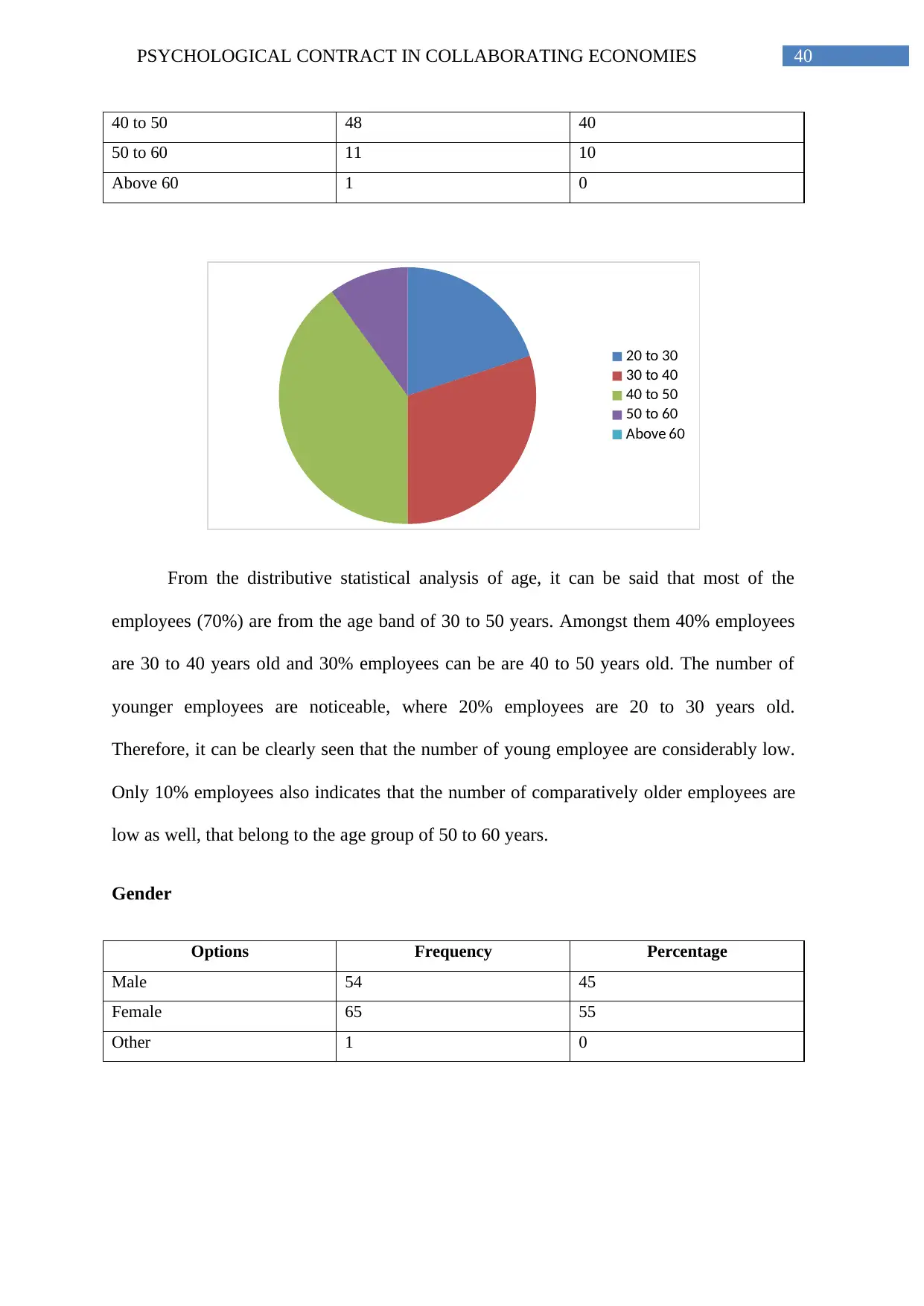
40PSYCHOLOGICAL CONTRACT IN COLLABORATING ECONOMIES
40 to 50 48 40
50 to 60 11 10
Above 60 1 0
20 to 30
30 to 40
40 to 50
50 to 60
Above 60
From the distributive statistical analysis of age, it can be said that most of the
employees (70%) are from the age band of 30 to 50 years. Amongst them 40% employees
are 30 to 40 years old and 30% employees can be are 40 to 50 years old. The number of
younger employees are noticeable, where 20% employees are 20 to 30 years old.
Therefore, it can be clearly seen that the number of young employee are considerably low.
Only 10% employees also indicates that the number of comparatively older employees are
low as well, that belong to the age group of 50 to 60 years.
Gender
Options Frequency Percentage
Male 54 45
Female 65 55
Other 1 0
40 to 50 48 40
50 to 60 11 10
Above 60 1 0
20 to 30
30 to 40
40 to 50
50 to 60
Above 60
From the distributive statistical analysis of age, it can be said that most of the
employees (70%) are from the age band of 30 to 50 years. Amongst them 40% employees
are 30 to 40 years old and 30% employees can be are 40 to 50 years old. The number of
younger employees are noticeable, where 20% employees are 20 to 30 years old.
Therefore, it can be clearly seen that the number of young employee are considerably low.
Only 10% employees also indicates that the number of comparatively older employees are
low as well, that belong to the age group of 50 to 60 years.
Gender
Options Frequency Percentage
Male 54 45
Female 65 55
Other 1 0
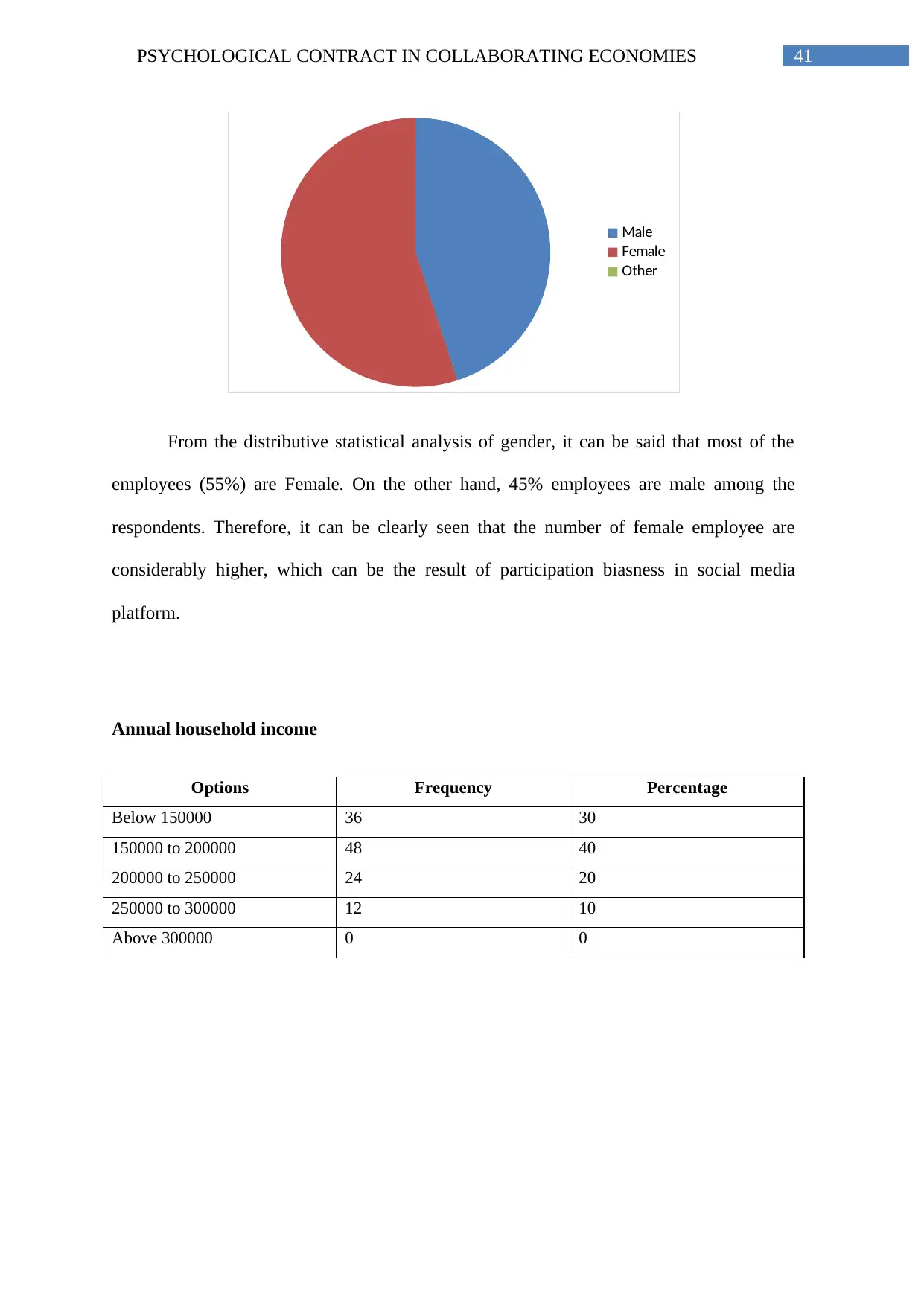
41PSYCHOLOGICAL CONTRACT IN COLLABORATING ECONOMIES
Male
Female
Other
From the distributive statistical analysis of gender, it can be said that most of the
employees (55%) are Female. On the other hand, 45% employees are male among the
respondents. Therefore, it can be clearly seen that the number of female employee are
considerably higher, which can be the result of participation biasness in social media
platform.
Annual household income
Options Frequency Percentage
Below 150000 36 30
150000 to 200000 48 40
200000 to 250000 24 20
250000 to 300000 12 10
Above 300000 0 0
Male
Female
Other
From the distributive statistical analysis of gender, it can be said that most of the
employees (55%) are Female. On the other hand, 45% employees are male among the
respondents. Therefore, it can be clearly seen that the number of female employee are
considerably higher, which can be the result of participation biasness in social media
platform.
Annual household income
Options Frequency Percentage
Below 150000 36 30
150000 to 200000 48 40
200000 to 250000 24 20
250000 to 300000 12 10
Above 300000 0 0
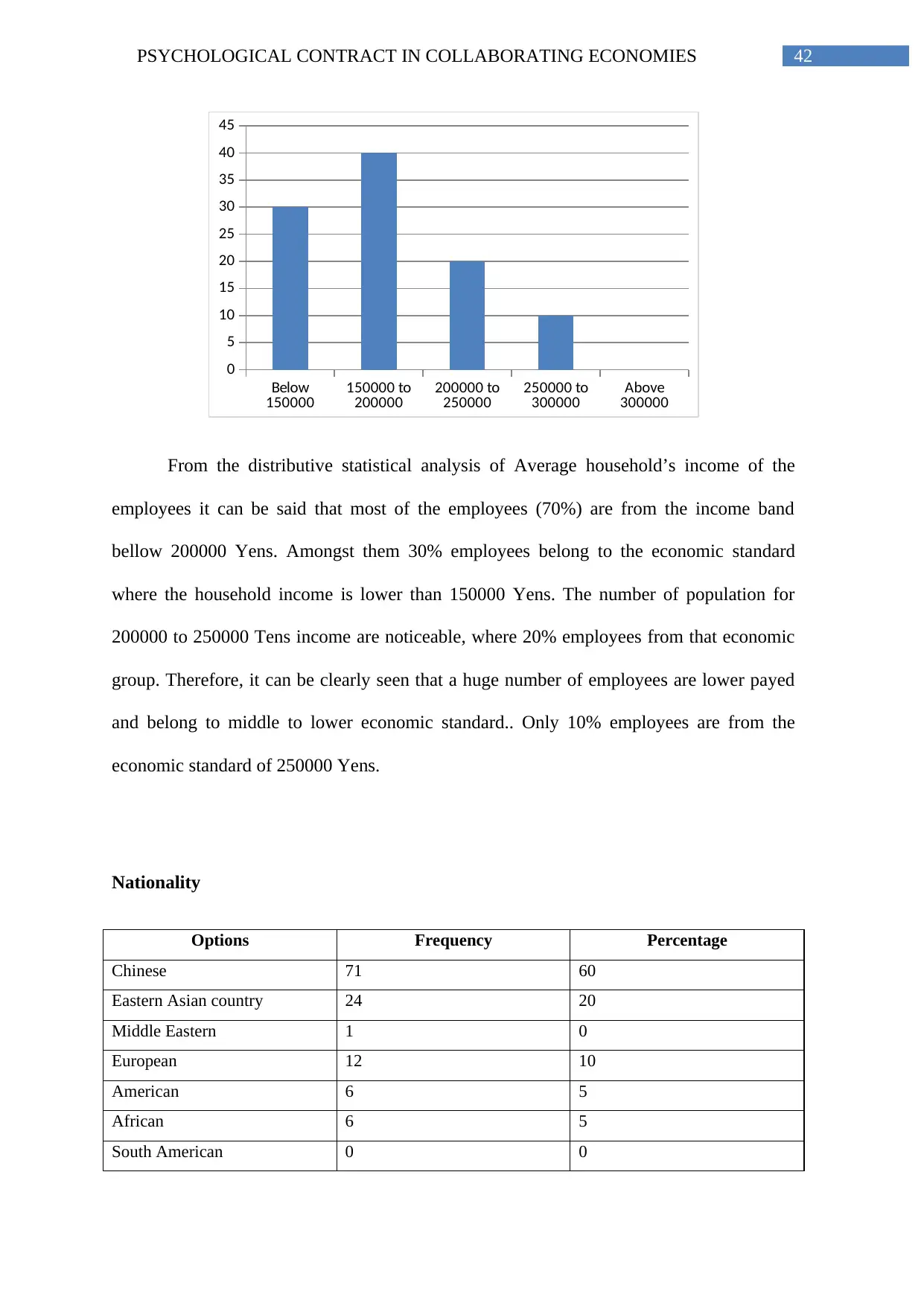
42PSYCHOLOGICAL CONTRACT IN COLLABORATING ECONOMIES
Below
150000 150000 to
200000 200000 to
250000 250000 to
300000 Above
300000
0
5
10
15
20
25
30
35
40
45
From the distributive statistical analysis of Average household’s income of the
employees it can be said that most of the employees (70%) are from the income band
bellow 200000 Yens. Amongst them 30% employees belong to the economic standard
where the household income is lower than 150000 Yens. The number of population for
200000 to 250000 Tens income are noticeable, where 20% employees from that economic
group. Therefore, it can be clearly seen that a huge number of employees are lower payed
and belong to middle to lower economic standard.. Only 10% employees are from the
economic standard of 250000 Yens.
Nationality
Options Frequency Percentage
Chinese 71 60
Eastern Asian country 24 20
Middle Eastern 1 0
European 12 10
American 6 5
African 6 5
South American 0 0
Below
150000 150000 to
200000 200000 to
250000 250000 to
300000 Above
300000
0
5
10
15
20
25
30
35
40
45
From the distributive statistical analysis of Average household’s income of the
employees it can be said that most of the employees (70%) are from the income band
bellow 200000 Yens. Amongst them 30% employees belong to the economic standard
where the household income is lower than 150000 Yens. The number of population for
200000 to 250000 Tens income are noticeable, where 20% employees from that economic
group. Therefore, it can be clearly seen that a huge number of employees are lower payed
and belong to middle to lower economic standard.. Only 10% employees are from the
economic standard of 250000 Yens.
Nationality
Options Frequency Percentage
Chinese 71 60
Eastern Asian country 24 20
Middle Eastern 1 0
European 12 10
American 6 5
African 6 5
South American 0 0
Paraphrase This Document
Need a fresh take? Get an instant paraphrase of this document with our AI Paraphraser
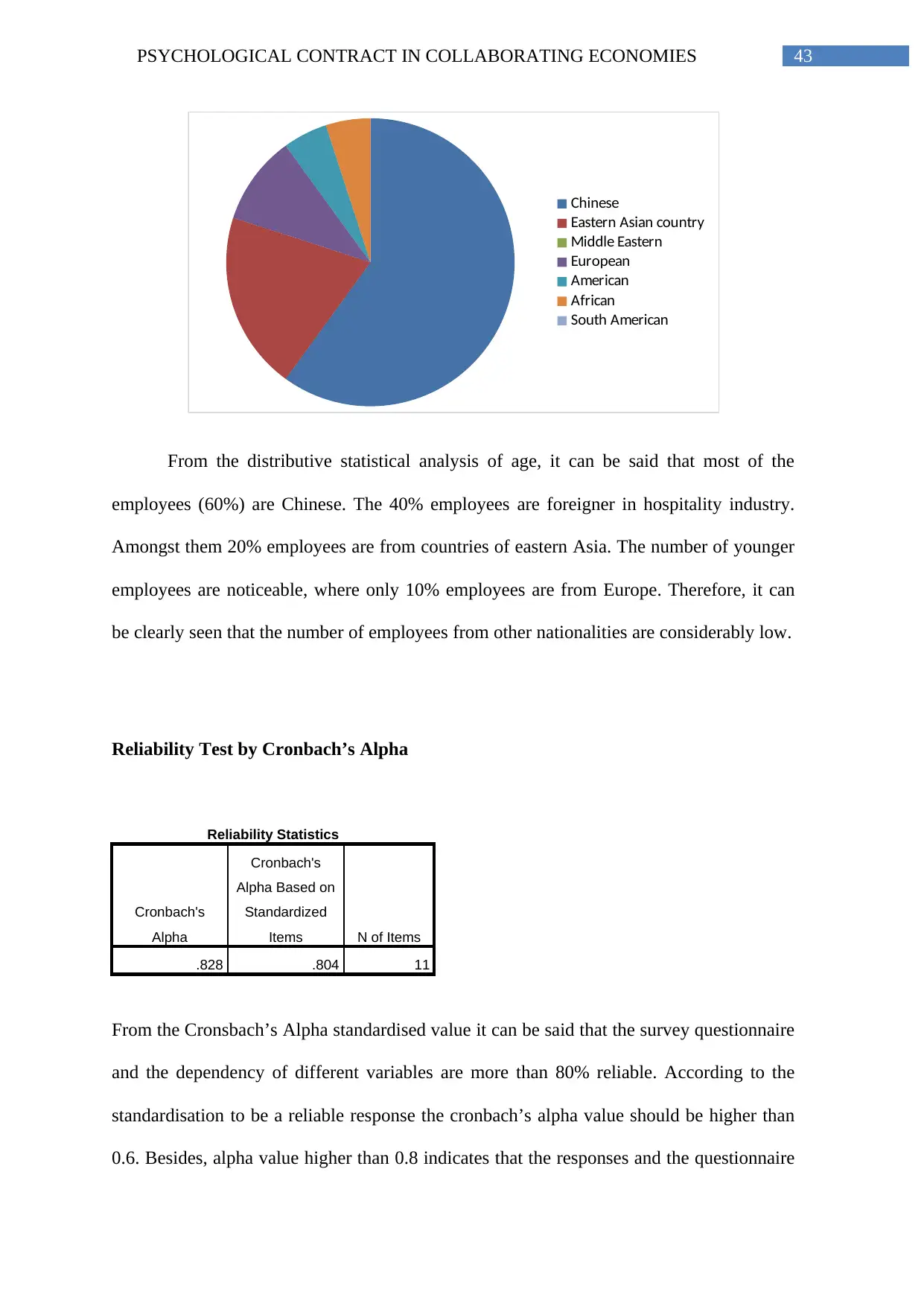
43PSYCHOLOGICAL CONTRACT IN COLLABORATING ECONOMIES
Chinese
Eastern Asian country
Middle Eastern
European
American
African
South American
From the distributive statistical analysis of age, it can be said that most of the
employees (60%) are Chinese. The 40% employees are foreigner in hospitality industry.
Amongst them 20% employees are from countries of eastern Asia. The number of younger
employees are noticeable, where only 10% employees are from Europe. Therefore, it can
be clearly seen that the number of employees from other nationalities are considerably low.
Reliability Test by Cronbach’s Alpha
Reliability Statistics
Cronbach's
Alpha
Cronbach's
Alpha Based on
Standardized
Items N of Items
.828 .804 11
From the Cronsbach’s Alpha standardised value it can be said that the survey questionnaire
and the dependency of different variables are more than 80% reliable. According to the
standardisation to be a reliable response the cronbach’s alpha value should be higher than
0.6. Besides, alpha value higher than 0.8 indicates that the responses and the questionnaire
Chinese
Eastern Asian country
Middle Eastern
European
American
African
South American
From the distributive statistical analysis of age, it can be said that most of the
employees (60%) are Chinese. The 40% employees are foreigner in hospitality industry.
Amongst them 20% employees are from countries of eastern Asia. The number of younger
employees are noticeable, where only 10% employees are from Europe. Therefore, it can
be clearly seen that the number of employees from other nationalities are considerably low.
Reliability Test by Cronbach’s Alpha
Reliability Statistics
Cronbach's
Alpha
Cronbach's
Alpha Based on
Standardized
Items N of Items
.828 .804 11
From the Cronsbach’s Alpha standardised value it can be said that the survey questionnaire
and the dependency of different variables are more than 80% reliable. According to the
standardisation to be a reliable response the cronbach’s alpha value should be higher than
0.6. Besides, alpha value higher than 0.8 indicates that the responses and the questionnaire
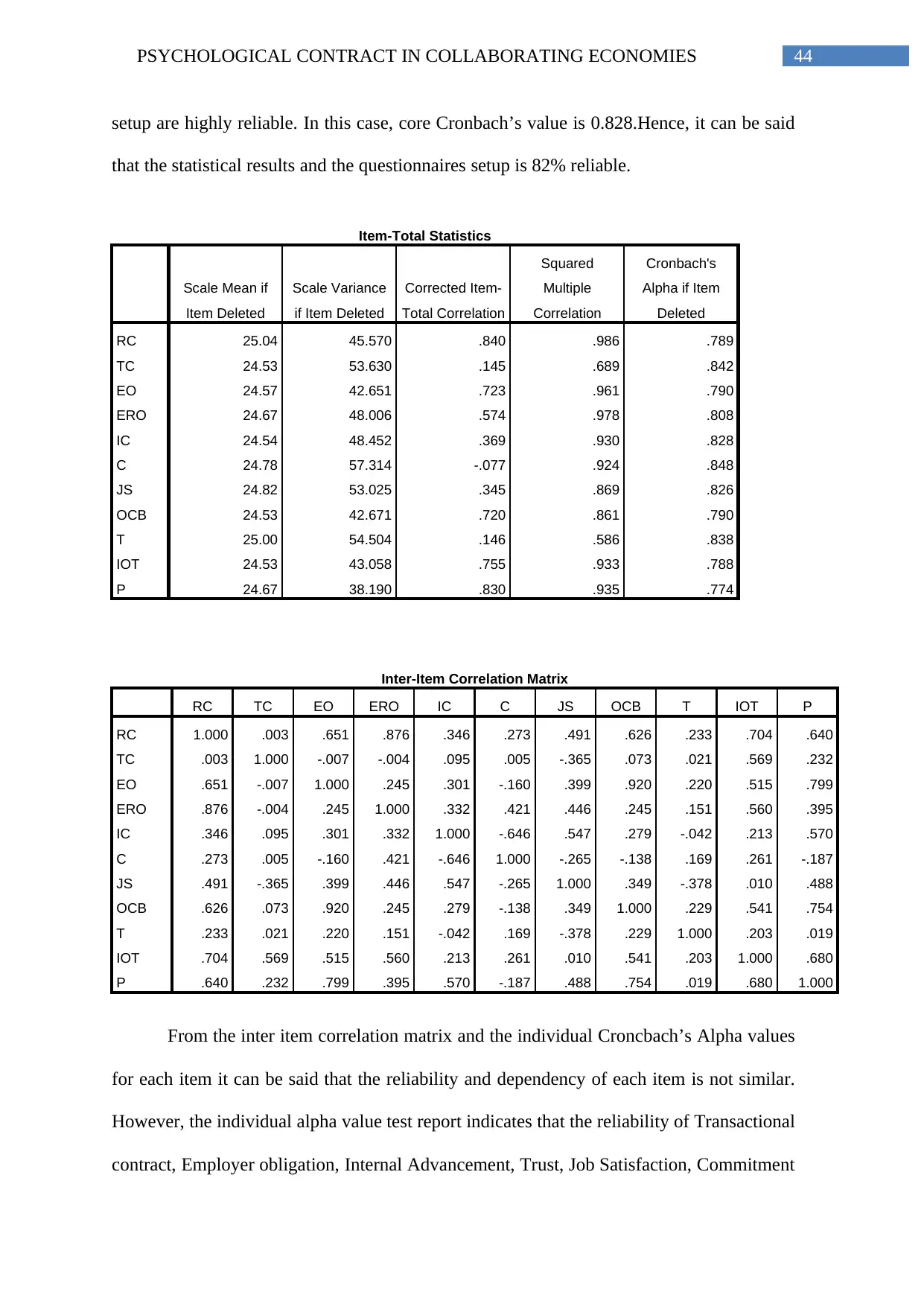
44PSYCHOLOGICAL CONTRACT IN COLLABORATING ECONOMIES
setup are highly reliable. In this case, core Cronbach’s value is 0.828.Hence, it can be said
that the statistical results and the questionnaires setup is 82% reliable.
Item-Total Statistics
Scale Mean if
Item Deleted
Scale Variance
if Item Deleted
Corrected Item-
Total Correlation
Squared
Multiple
Correlation
Cronbach's
Alpha if Item
Deleted
RC 25.04 45.570 .840 .986 .789
TC 24.53 53.630 .145 .689 .842
EO 24.57 42.651 .723 .961 .790
ERO 24.67 48.006 .574 .978 .808
IC 24.54 48.452 .369 .930 .828
C 24.78 57.314 -.077 .924 .848
JS 24.82 53.025 .345 .869 .826
OCB 24.53 42.671 .720 .861 .790
T 25.00 54.504 .146 .586 .838
IOT 24.53 43.058 .755 .933 .788
P 24.67 38.190 .830 .935 .774
Inter-Item Correlation Matrix
RC TC EO ERO IC C JS OCB T IOT P
RC 1.000 .003 .651 .876 .346 .273 .491 .626 .233 .704 .640
TC .003 1.000 -.007 -.004 .095 .005 -.365 .073 .021 .569 .232
EO .651 -.007 1.000 .245 .301 -.160 .399 .920 .220 .515 .799
ERO .876 -.004 .245 1.000 .332 .421 .446 .245 .151 .560 .395
IC .346 .095 .301 .332 1.000 -.646 .547 .279 -.042 .213 .570
C .273 .005 -.160 .421 -.646 1.000 -.265 -.138 .169 .261 -.187
JS .491 -.365 .399 .446 .547 -.265 1.000 .349 -.378 .010 .488
OCB .626 .073 .920 .245 .279 -.138 .349 1.000 .229 .541 .754
T .233 .021 .220 .151 -.042 .169 -.378 .229 1.000 .203 .019
IOT .704 .569 .515 .560 .213 .261 .010 .541 .203 1.000 .680
P .640 .232 .799 .395 .570 -.187 .488 .754 .019 .680 1.000
From the inter item correlation matrix and the individual Croncbach’s Alpha values
for each item it can be said that the reliability and dependency of each item is not similar.
However, the individual alpha value test report indicates that the reliability of Transactional
contract, Employer obligation, Internal Advancement, Trust, Job Satisfaction, Commitment
setup are highly reliable. In this case, core Cronbach’s value is 0.828.Hence, it can be said
that the statistical results and the questionnaires setup is 82% reliable.
Item-Total Statistics
Scale Mean if
Item Deleted
Scale Variance
if Item Deleted
Corrected Item-
Total Correlation
Squared
Multiple
Correlation
Cronbach's
Alpha if Item
Deleted
RC 25.04 45.570 .840 .986 .789
TC 24.53 53.630 .145 .689 .842
EO 24.57 42.651 .723 .961 .790
ERO 24.67 48.006 .574 .978 .808
IC 24.54 48.452 .369 .930 .828
C 24.78 57.314 -.077 .924 .848
JS 24.82 53.025 .345 .869 .826
OCB 24.53 42.671 .720 .861 .790
T 25.00 54.504 .146 .586 .838
IOT 24.53 43.058 .755 .933 .788
P 24.67 38.190 .830 .935 .774
Inter-Item Correlation Matrix
RC TC EO ERO IC C JS OCB T IOT P
RC 1.000 .003 .651 .876 .346 .273 .491 .626 .233 .704 .640
TC .003 1.000 -.007 -.004 .095 .005 -.365 .073 .021 .569 .232
EO .651 -.007 1.000 .245 .301 -.160 .399 .920 .220 .515 .799
ERO .876 -.004 .245 1.000 .332 .421 .446 .245 .151 .560 .395
IC .346 .095 .301 .332 1.000 -.646 .547 .279 -.042 .213 .570
C .273 .005 -.160 .421 -.646 1.000 -.265 -.138 .169 .261 -.187
JS .491 -.365 .399 .446 .547 -.265 1.000 .349 -.378 .010 .488
OCB .626 .073 .920 .245 .279 -.138 .349 1.000 .229 .541 .754
T .233 .021 .220 .151 -.042 .169 -.378 .229 1.000 .203 .019
IOT .704 .569 .515 .560 .213 .261 .010 .541 .203 1.000 .680
P .640 .232 .799 .395 .570 -.187 .488 .754 .019 .680 1.000
From the inter item correlation matrix and the individual Croncbach’s Alpha values
for each item it can be said that the reliability and dependency of each item is not similar.
However, the individual alpha value test report indicates that the reliability of Transactional
contract, Employer obligation, Internal Advancement, Trust, Job Satisfaction, Commitment
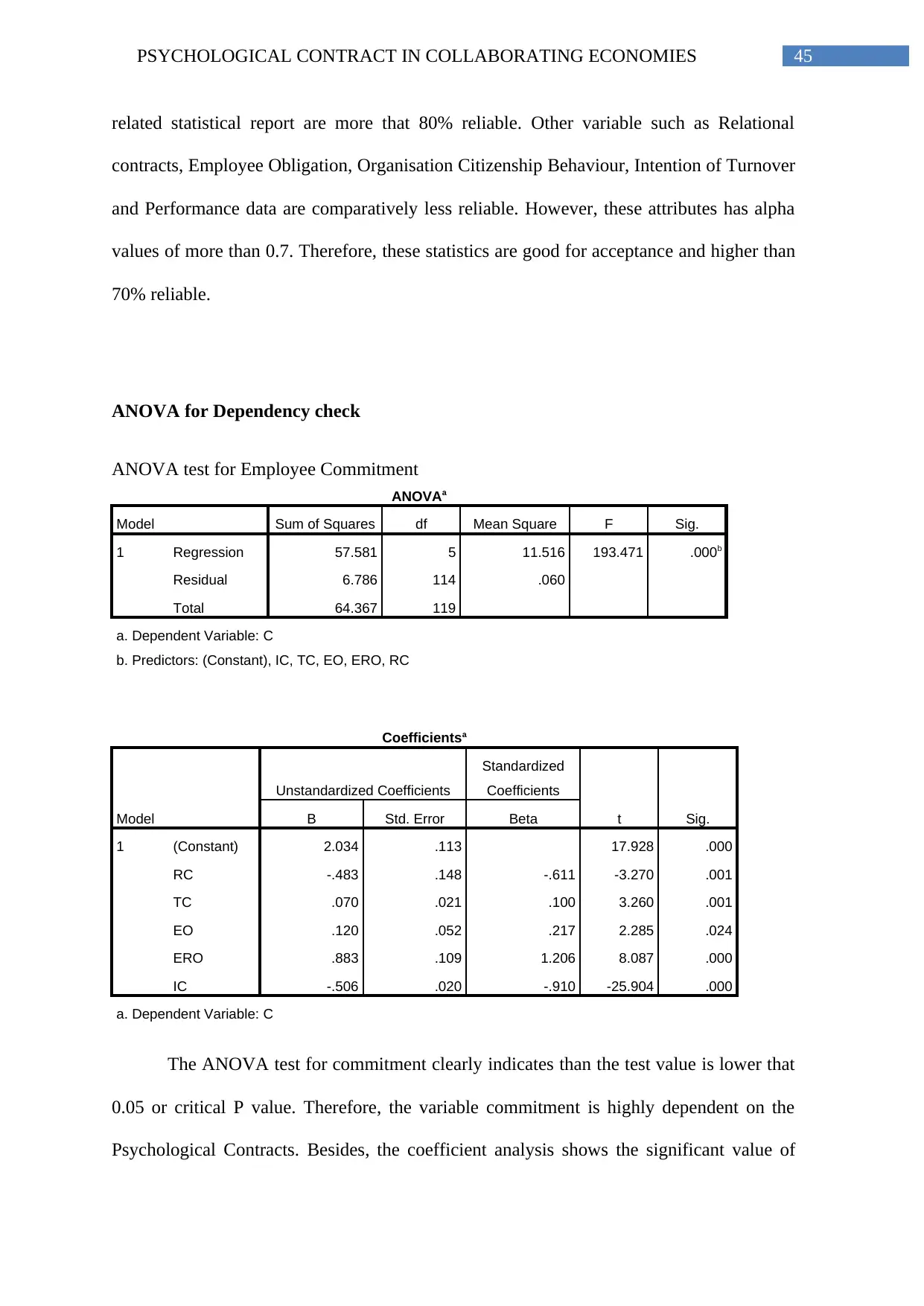
45PSYCHOLOGICAL CONTRACT IN COLLABORATING ECONOMIES
related statistical report are more that 80% reliable. Other variable such as Relational
contracts, Employee Obligation, Organisation Citizenship Behaviour, Intention of Turnover
and Performance data are comparatively less reliable. However, these attributes has alpha
values of more than 0.7. Therefore, these statistics are good for acceptance and higher than
70% reliable.
ANOVA for Dependency check
ANOVA test for Employee Commitment
ANOVAa
Model Sum of Squares df Mean Square F Sig.
1 Regression 57.581 5 11.516 193.471 .000b
Residual 6.786 114 .060
Total 64.367 119
a. Dependent Variable: C
b. Predictors: (Constant), IC, TC, EO, ERO, RC
Coefficientsa
Model
Unstandardized Coefficients
Standardized
Coefficients
t Sig.B Std. Error Beta
1 (Constant) 2.034 .113 17.928 .000
RC -.483 .148 -.611 -3.270 .001
TC .070 .021 .100 3.260 .001
EO .120 .052 .217 2.285 .024
ERO .883 .109 1.206 8.087 .000
IC -.506 .020 -.910 -25.904 .000
a. Dependent Variable: C
The ANOVA test for commitment clearly indicates than the test value is lower that
0.05 or critical P value. Therefore, the variable commitment is highly dependent on the
Psychological Contracts. Besides, the coefficient analysis shows the significant value of
related statistical report are more that 80% reliable. Other variable such as Relational
contracts, Employee Obligation, Organisation Citizenship Behaviour, Intention of Turnover
and Performance data are comparatively less reliable. However, these attributes has alpha
values of more than 0.7. Therefore, these statistics are good for acceptance and higher than
70% reliable.
ANOVA for Dependency check
ANOVA test for Employee Commitment
ANOVAa
Model Sum of Squares df Mean Square F Sig.
1 Regression 57.581 5 11.516 193.471 .000b
Residual 6.786 114 .060
Total 64.367 119
a. Dependent Variable: C
b. Predictors: (Constant), IC, TC, EO, ERO, RC
Coefficientsa
Model
Unstandardized Coefficients
Standardized
Coefficients
t Sig.B Std. Error Beta
1 (Constant) 2.034 .113 17.928 .000
RC -.483 .148 -.611 -3.270 .001
TC .070 .021 .100 3.260 .001
EO .120 .052 .217 2.285 .024
ERO .883 .109 1.206 8.087 .000
IC -.506 .020 -.910 -25.904 .000
a. Dependent Variable: C
The ANOVA test for commitment clearly indicates than the test value is lower that
0.05 or critical P value. Therefore, the variable commitment is highly dependent on the
Psychological Contracts. Besides, the coefficient analysis shows the significant value of
Secure Best Marks with AI Grader
Need help grading? Try our AI Grader for instant feedback on your assignments.
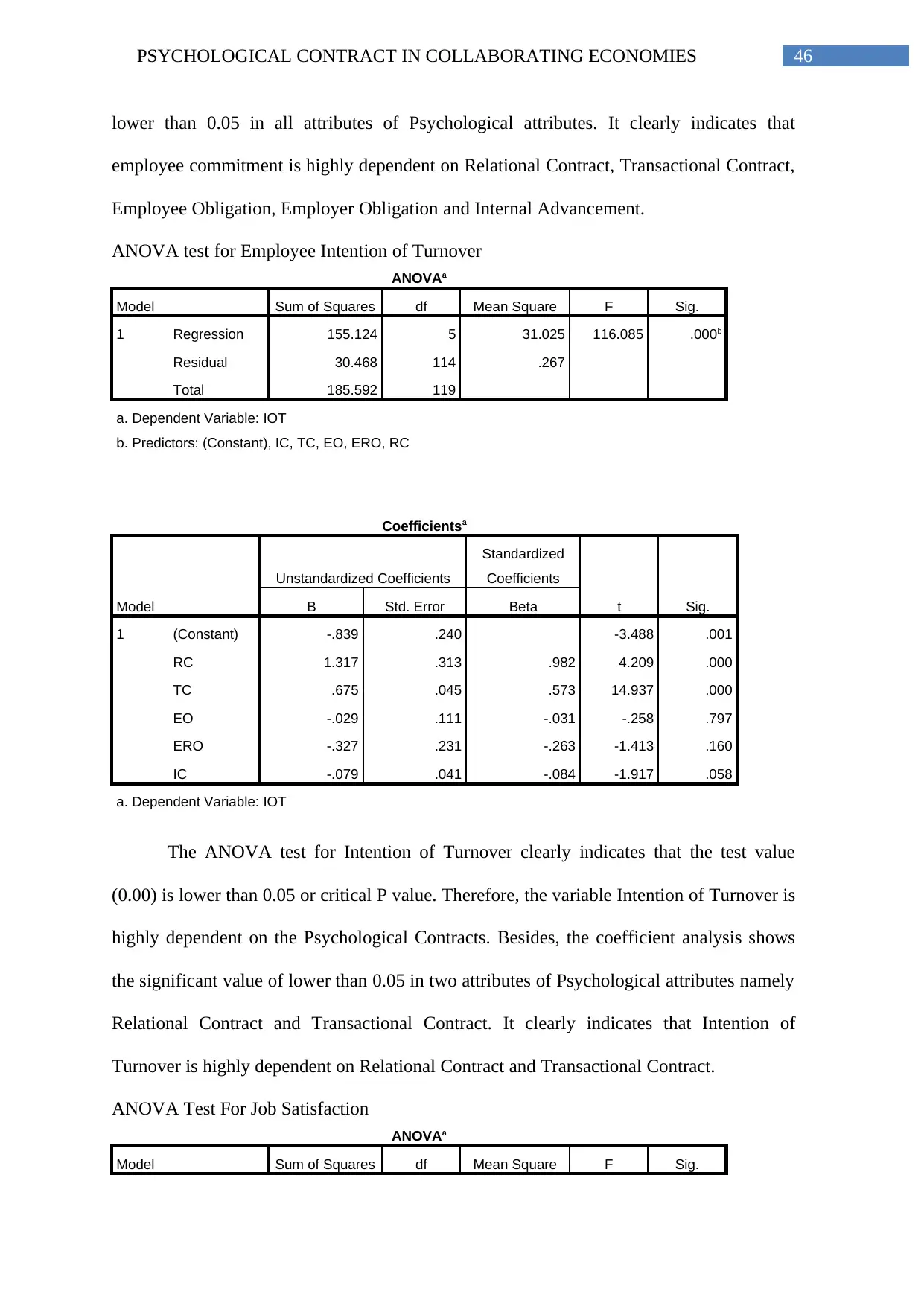
46PSYCHOLOGICAL CONTRACT IN COLLABORATING ECONOMIES
lower than 0.05 in all attributes of Psychological attributes. It clearly indicates that
employee commitment is highly dependent on Relational Contract, Transactional Contract,
Employee Obligation, Employer Obligation and Internal Advancement.
ANOVA test for Employee Intention of Turnover
ANOVAa
Model Sum of Squares df Mean Square F Sig.
1 Regression 155.124 5 31.025 116.085 .000b
Residual 30.468 114 .267
Total 185.592 119
a. Dependent Variable: IOT
b. Predictors: (Constant), IC, TC, EO, ERO, RC
Coefficientsa
Model
Unstandardized Coefficients
Standardized
Coefficients
t Sig.B Std. Error Beta
1 (Constant) -.839 .240 -3.488 .001
RC 1.317 .313 .982 4.209 .000
TC .675 .045 .573 14.937 .000
EO -.029 .111 -.031 -.258 .797
ERO -.327 .231 -.263 -1.413 .160
IC -.079 .041 -.084 -1.917 .058
a. Dependent Variable: IOT
The ANOVA test for Intention of Turnover clearly indicates that the test value
(0.00) is lower than 0.05 or critical P value. Therefore, the variable Intention of Turnover is
highly dependent on the Psychological Contracts. Besides, the coefficient analysis shows
the significant value of lower than 0.05 in two attributes of Psychological attributes namely
Relational Contract and Transactional Contract. It clearly indicates that Intention of
Turnover is highly dependent on Relational Contract and Transactional Contract.
ANOVA Test For Job Satisfaction
ANOVAa
Model Sum of Squares df Mean Square F Sig.
lower than 0.05 in all attributes of Psychological attributes. It clearly indicates that
employee commitment is highly dependent on Relational Contract, Transactional Contract,
Employee Obligation, Employer Obligation and Internal Advancement.
ANOVA test for Employee Intention of Turnover
ANOVAa
Model Sum of Squares df Mean Square F Sig.
1 Regression 155.124 5 31.025 116.085 .000b
Residual 30.468 114 .267
Total 185.592 119
a. Dependent Variable: IOT
b. Predictors: (Constant), IC, TC, EO, ERO, RC
Coefficientsa
Model
Unstandardized Coefficients
Standardized
Coefficients
t Sig.B Std. Error Beta
1 (Constant) -.839 .240 -3.488 .001
RC 1.317 .313 .982 4.209 .000
TC .675 .045 .573 14.937 .000
EO -.029 .111 -.031 -.258 .797
ERO -.327 .231 -.263 -1.413 .160
IC -.079 .041 -.084 -1.917 .058
a. Dependent Variable: IOT
The ANOVA test for Intention of Turnover clearly indicates that the test value
(0.00) is lower than 0.05 or critical P value. Therefore, the variable Intention of Turnover is
highly dependent on the Psychological Contracts. Besides, the coefficient analysis shows
the significant value of lower than 0.05 in two attributes of Psychological attributes namely
Relational Contract and Transactional Contract. It clearly indicates that Intention of
Turnover is highly dependent on Relational Contract and Transactional Contract.
ANOVA Test For Job Satisfaction
ANOVAa
Model Sum of Squares df Mean Square F Sig.
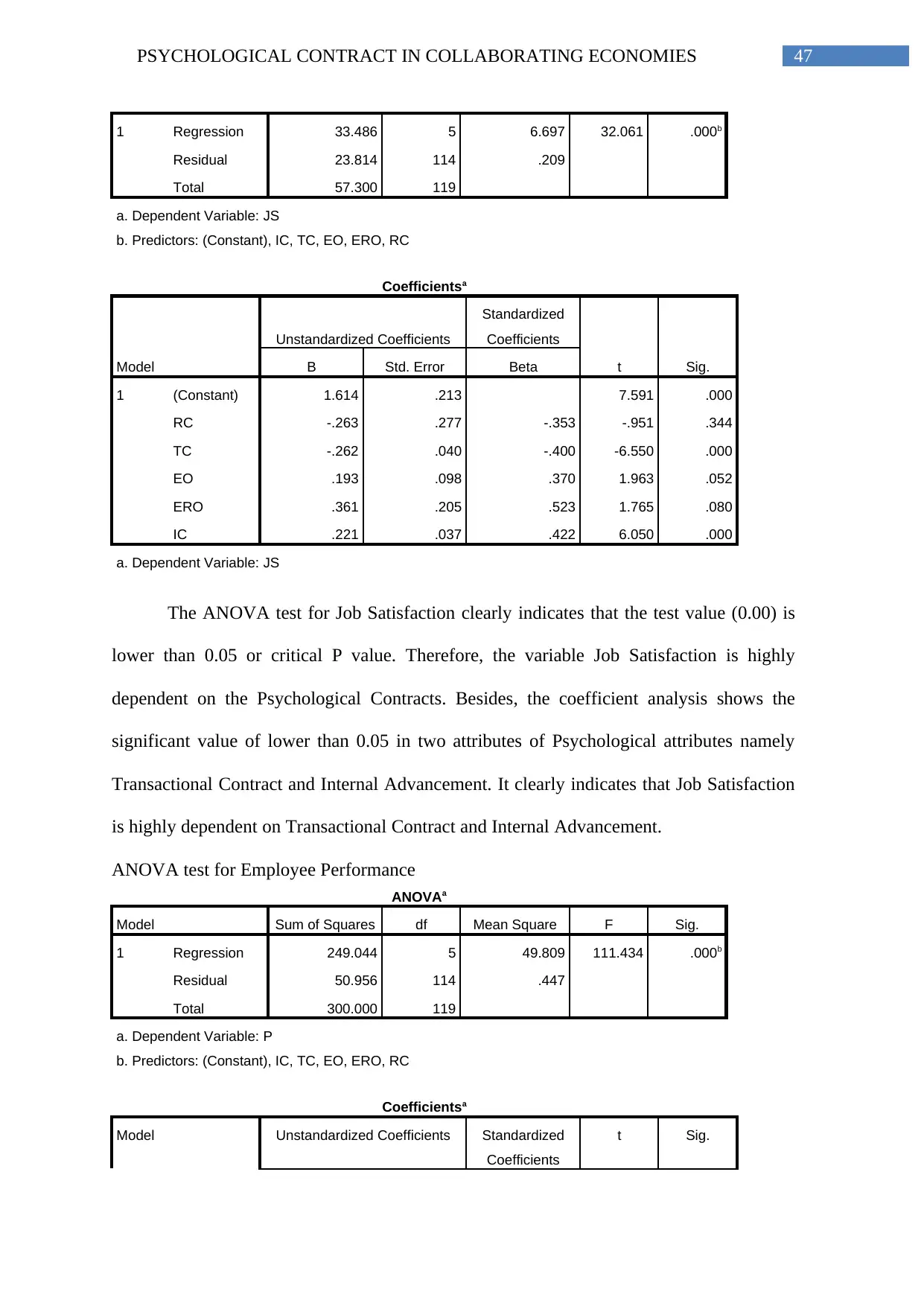
47PSYCHOLOGICAL CONTRACT IN COLLABORATING ECONOMIES
1 Regression 33.486 5 6.697 32.061 .000b
Residual 23.814 114 .209
Total 57.300 119
a. Dependent Variable: JS
b. Predictors: (Constant), IC, TC, EO, ERO, RC
Coefficientsa
Model
Unstandardized Coefficients
Standardized
Coefficients
t Sig.B Std. Error Beta
1 (Constant) 1.614 .213 7.591 .000
RC -.263 .277 -.353 -.951 .344
TC -.262 .040 -.400 -6.550 .000
EO .193 .098 .370 1.963 .052
ERO .361 .205 .523 1.765 .080
IC .221 .037 .422 6.050 .000
a. Dependent Variable: JS
The ANOVA test for Job Satisfaction clearly indicates that the test value (0.00) is
lower than 0.05 or critical P value. Therefore, the variable Job Satisfaction is highly
dependent on the Psychological Contracts. Besides, the coefficient analysis shows the
significant value of lower than 0.05 in two attributes of Psychological attributes namely
Transactional Contract and Internal Advancement. It clearly indicates that Job Satisfaction
is highly dependent on Transactional Contract and Internal Advancement.
ANOVA test for Employee Performance
ANOVAa
Model Sum of Squares df Mean Square F Sig.
1 Regression 249.044 5 49.809 111.434 .000b
Residual 50.956 114 .447
Total 300.000 119
a. Dependent Variable: P
b. Predictors: (Constant), IC, TC, EO, ERO, RC
Coefficientsa
Model Unstandardized Coefficients Standardized
Coefficients
t Sig.
1 Regression 33.486 5 6.697 32.061 .000b
Residual 23.814 114 .209
Total 57.300 119
a. Dependent Variable: JS
b. Predictors: (Constant), IC, TC, EO, ERO, RC
Coefficientsa
Model
Unstandardized Coefficients
Standardized
Coefficients
t Sig.B Std. Error Beta
1 (Constant) 1.614 .213 7.591 .000
RC -.263 .277 -.353 -.951 .344
TC -.262 .040 -.400 -6.550 .000
EO .193 .098 .370 1.963 .052
ERO .361 .205 .523 1.765 .080
IC .221 .037 .422 6.050 .000
a. Dependent Variable: JS
The ANOVA test for Job Satisfaction clearly indicates that the test value (0.00) is
lower than 0.05 or critical P value. Therefore, the variable Job Satisfaction is highly
dependent on the Psychological Contracts. Besides, the coefficient analysis shows the
significant value of lower than 0.05 in two attributes of Psychological attributes namely
Transactional Contract and Internal Advancement. It clearly indicates that Job Satisfaction
is highly dependent on Transactional Contract and Internal Advancement.
ANOVA test for Employee Performance
ANOVAa
Model Sum of Squares df Mean Square F Sig.
1 Regression 249.044 5 49.809 111.434 .000b
Residual 50.956 114 .447
Total 300.000 119
a. Dependent Variable: P
b. Predictors: (Constant), IC, TC, EO, ERO, RC
Coefficientsa
Model Unstandardized Coefficients Standardized
Coefficients
t Sig.
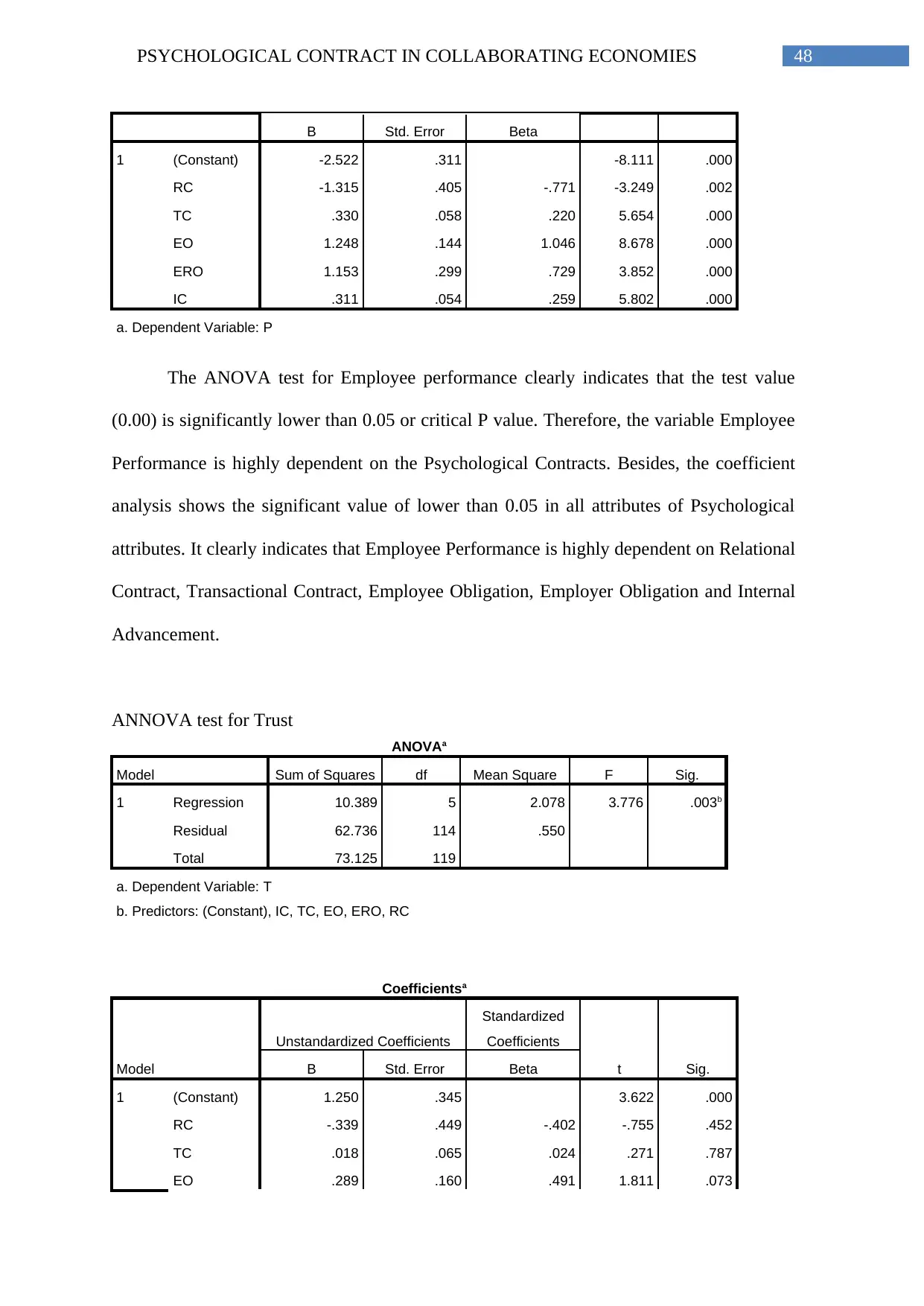
48PSYCHOLOGICAL CONTRACT IN COLLABORATING ECONOMIES
B Std. Error Beta
1 (Constant) -2.522 .311 -8.111 .000
RC -1.315 .405 -.771 -3.249 .002
TC .330 .058 .220 5.654 .000
EO 1.248 .144 1.046 8.678 .000
ERO 1.153 .299 .729 3.852 .000
IC .311 .054 .259 5.802 .000
a. Dependent Variable: P
The ANOVA test for Employee performance clearly indicates that the test value
(0.00) is significantly lower than 0.05 or critical P value. Therefore, the variable Employee
Performance is highly dependent on the Psychological Contracts. Besides, the coefficient
analysis shows the significant value of lower than 0.05 in all attributes of Psychological
attributes. It clearly indicates that Employee Performance is highly dependent on Relational
Contract, Transactional Contract, Employee Obligation, Employer Obligation and Internal
Advancement.
ANNOVA test for Trust
ANOVAa
Model Sum of Squares df Mean Square F Sig.
1 Regression 10.389 5 2.078 3.776 .003b
Residual 62.736 114 .550
Total 73.125 119
a. Dependent Variable: T
b. Predictors: (Constant), IC, TC, EO, ERO, RC
Coefficientsa
Model
Unstandardized Coefficients
Standardized
Coefficients
t Sig.B Std. Error Beta
1 (Constant) 1.250 .345 3.622 .000
RC -.339 .449 -.402 -.755 .452
TC .018 .065 .024 .271 .787
EO .289 .160 .491 1.811 .073
B Std. Error Beta
1 (Constant) -2.522 .311 -8.111 .000
RC -1.315 .405 -.771 -3.249 .002
TC .330 .058 .220 5.654 .000
EO 1.248 .144 1.046 8.678 .000
ERO 1.153 .299 .729 3.852 .000
IC .311 .054 .259 5.802 .000
a. Dependent Variable: P
The ANOVA test for Employee performance clearly indicates that the test value
(0.00) is significantly lower than 0.05 or critical P value. Therefore, the variable Employee
Performance is highly dependent on the Psychological Contracts. Besides, the coefficient
analysis shows the significant value of lower than 0.05 in all attributes of Psychological
attributes. It clearly indicates that Employee Performance is highly dependent on Relational
Contract, Transactional Contract, Employee Obligation, Employer Obligation and Internal
Advancement.
ANNOVA test for Trust
ANOVAa
Model Sum of Squares df Mean Square F Sig.
1 Regression 10.389 5 2.078 3.776 .003b
Residual 62.736 114 .550
Total 73.125 119
a. Dependent Variable: T
b. Predictors: (Constant), IC, TC, EO, ERO, RC
Coefficientsa
Model
Unstandardized Coefficients
Standardized
Coefficients
t Sig.B Std. Error Beta
1 (Constant) 1.250 .345 3.622 .000
RC -.339 .449 -.402 -.755 .452
TC .018 .065 .024 .271 .787
EO .289 .160 .491 1.811 .073
Paraphrase This Document
Need a fresh take? Get an instant paraphrase of this document with our AI Paraphraser
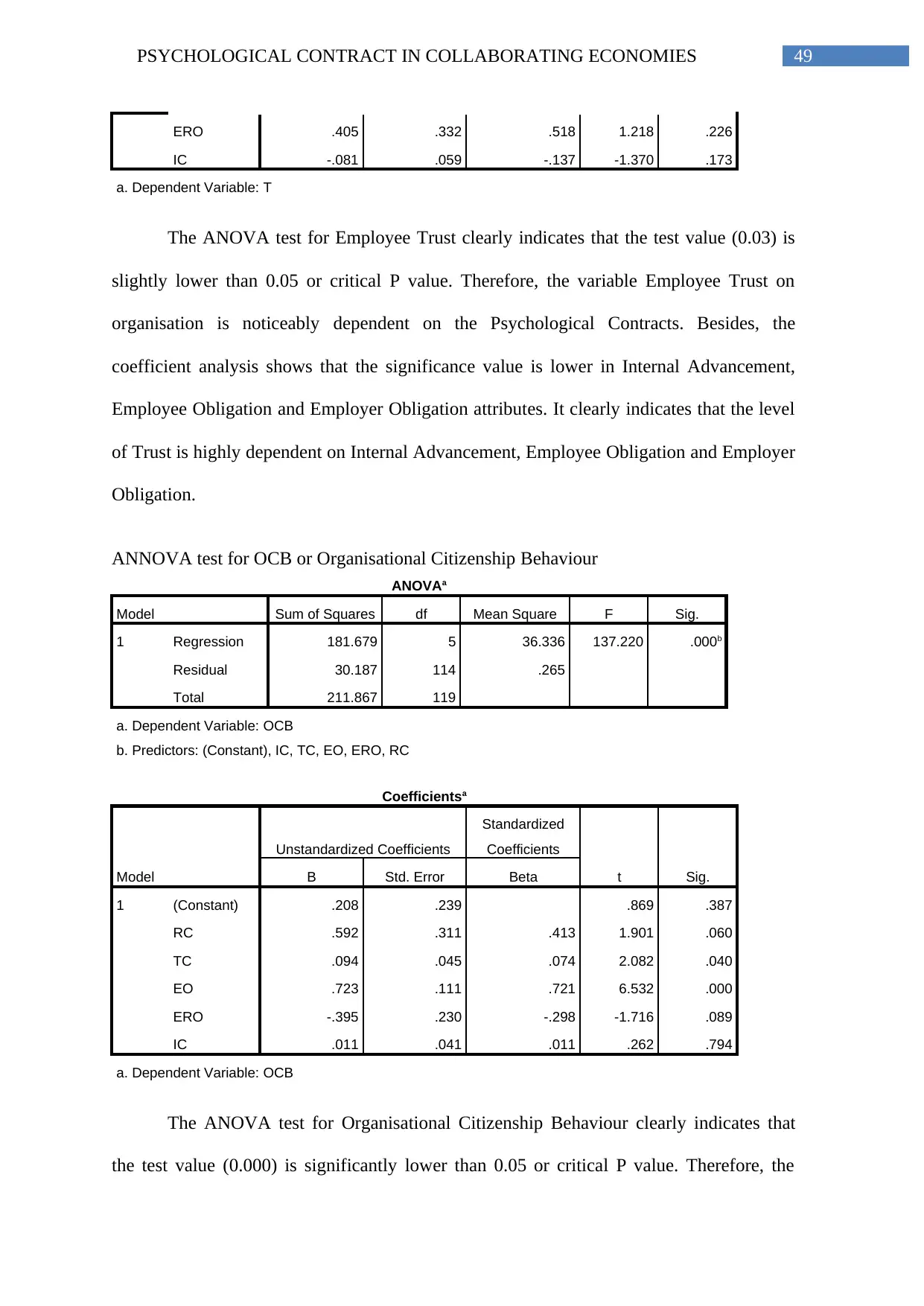
49PSYCHOLOGICAL CONTRACT IN COLLABORATING ECONOMIES
ERO .405 .332 .518 1.218 .226
IC -.081 .059 -.137 -1.370 .173
a. Dependent Variable: T
The ANOVA test for Employee Trust clearly indicates that the test value (0.03) is
slightly lower than 0.05 or critical P value. Therefore, the variable Employee Trust on
organisation is noticeably dependent on the Psychological Contracts. Besides, the
coefficient analysis shows that the significance value is lower in Internal Advancement,
Employee Obligation and Employer Obligation attributes. It clearly indicates that the level
of Trust is highly dependent on Internal Advancement, Employee Obligation and Employer
Obligation.
ANNOVA test for OCB or Organisational Citizenship Behaviour
ANOVAa
Model Sum of Squares df Mean Square F Sig.
1 Regression 181.679 5 36.336 137.220 .000b
Residual 30.187 114 .265
Total 211.867 119
a. Dependent Variable: OCB
b. Predictors: (Constant), IC, TC, EO, ERO, RC
Coefficientsa
Model
Unstandardized Coefficients
Standardized
Coefficients
t Sig.B Std. Error Beta
1 (Constant) .208 .239 .869 .387
RC .592 .311 .413 1.901 .060
TC .094 .045 .074 2.082 .040
EO .723 .111 .721 6.532 .000
ERO -.395 .230 -.298 -1.716 .089
IC .011 .041 .011 .262 .794
a. Dependent Variable: OCB
The ANOVA test for Organisational Citizenship Behaviour clearly indicates that
the test value (0.000) is significantly lower than 0.05 or critical P value. Therefore, the
ERO .405 .332 .518 1.218 .226
IC -.081 .059 -.137 -1.370 .173
a. Dependent Variable: T
The ANOVA test for Employee Trust clearly indicates that the test value (0.03) is
slightly lower than 0.05 or critical P value. Therefore, the variable Employee Trust on
organisation is noticeably dependent on the Psychological Contracts. Besides, the
coefficient analysis shows that the significance value is lower in Internal Advancement,
Employee Obligation and Employer Obligation attributes. It clearly indicates that the level
of Trust is highly dependent on Internal Advancement, Employee Obligation and Employer
Obligation.
ANNOVA test for OCB or Organisational Citizenship Behaviour
ANOVAa
Model Sum of Squares df Mean Square F Sig.
1 Regression 181.679 5 36.336 137.220 .000b
Residual 30.187 114 .265
Total 211.867 119
a. Dependent Variable: OCB
b. Predictors: (Constant), IC, TC, EO, ERO, RC
Coefficientsa
Model
Unstandardized Coefficients
Standardized
Coefficients
t Sig.B Std. Error Beta
1 (Constant) .208 .239 .869 .387
RC .592 .311 .413 1.901 .060
TC .094 .045 .074 2.082 .040
EO .723 .111 .721 6.532 .000
ERO -.395 .230 -.298 -1.716 .089
IC .011 .041 .011 .262 .794
a. Dependent Variable: OCB
The ANOVA test for Organisational Citizenship Behaviour clearly indicates that
the test value (0.000) is significantly lower than 0.05 or critical P value. Therefore, the
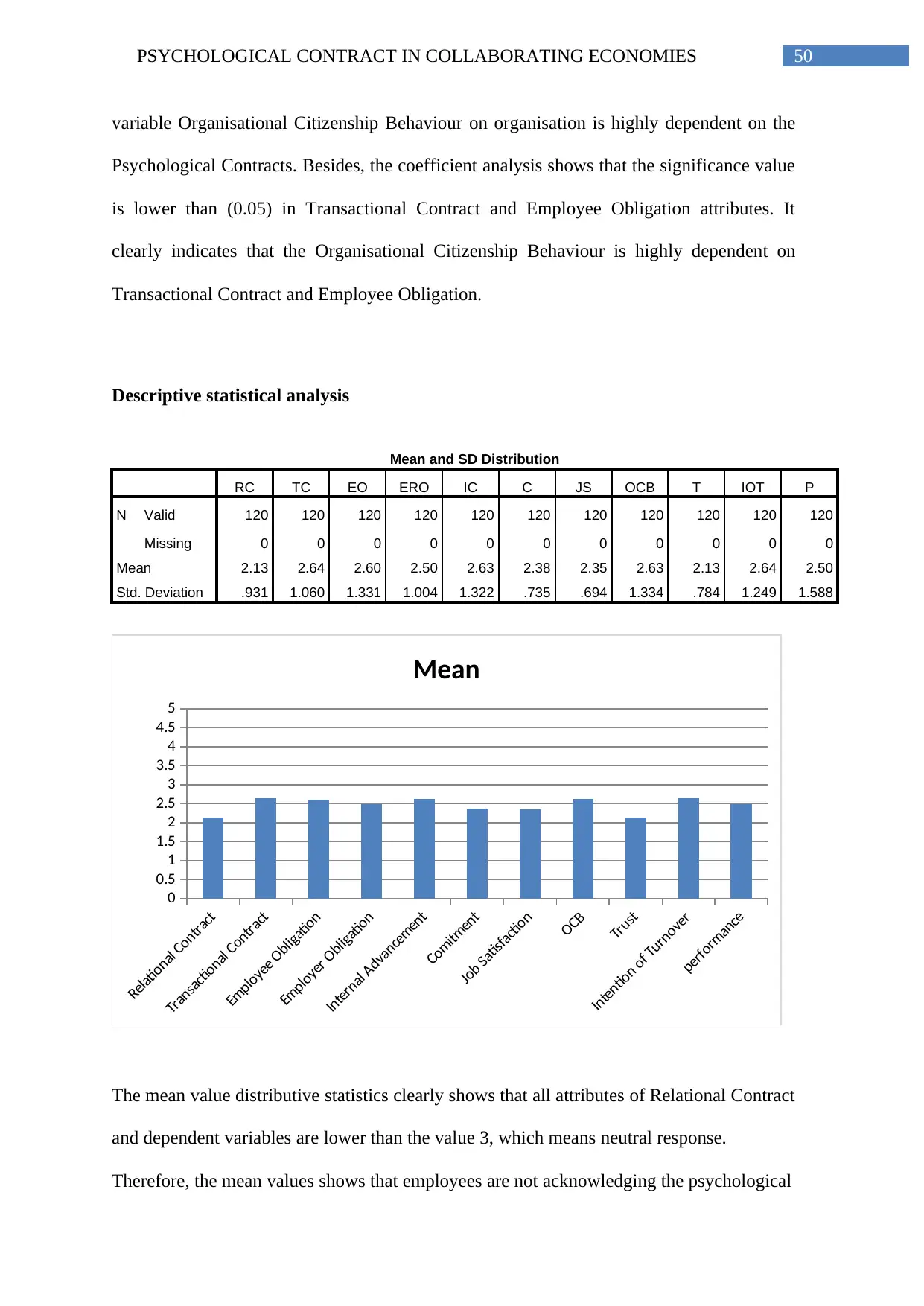
50PSYCHOLOGICAL CONTRACT IN COLLABORATING ECONOMIES
variable Organisational Citizenship Behaviour on organisation is highly dependent on the
Psychological Contracts. Besides, the coefficient analysis shows that the significance value
is lower than (0.05) in Transactional Contract and Employee Obligation attributes. It
clearly indicates that the Organisational Citizenship Behaviour is highly dependent on
Transactional Contract and Employee Obligation.
Descriptive statistical analysis
Mean and SD Distribution
RC TC EO ERO IC C JS OCB T IOT P
N Valid 120 120 120 120 120 120 120 120 120 120 120
Missing 0 0 0 0 0 0 0 0 0 0 0
Mean 2.13 2.64 2.60 2.50 2.63 2.38 2.35 2.63 2.13 2.64 2.50
Std. Deviation .931 1.060 1.331 1.004 1.322 .735 .694 1.334 .784 1.249 1.588
Relational Contract
Transactional Contract
Employee Obligation
Employer Obligation
Internal Advancement
Comitment
Job Satisfaction
OCB
Trust
Intention of Turnover
performance
0
0.5
1
1.5
2
2.5
3
3.5
4
4.5
5
Mean
The mean value distributive statistics clearly shows that all attributes of Relational Contract
and dependent variables are lower than the value 3, which means neutral response.
Therefore, the mean values shows that employees are not acknowledging the psychological
variable Organisational Citizenship Behaviour on organisation is highly dependent on the
Psychological Contracts. Besides, the coefficient analysis shows that the significance value
is lower than (0.05) in Transactional Contract and Employee Obligation attributes. It
clearly indicates that the Organisational Citizenship Behaviour is highly dependent on
Transactional Contract and Employee Obligation.
Descriptive statistical analysis
Mean and SD Distribution
RC TC EO ERO IC C JS OCB T IOT P
N Valid 120 120 120 120 120 120 120 120 120 120 120
Missing 0 0 0 0 0 0 0 0 0 0 0
Mean 2.13 2.64 2.60 2.50 2.63 2.38 2.35 2.63 2.13 2.64 2.50
Std. Deviation .931 1.060 1.331 1.004 1.322 .735 .694 1.334 .784 1.249 1.588
Relational Contract
Transactional Contract
Employee Obligation
Employer Obligation
Internal Advancement
Comitment
Job Satisfaction
OCB
Trust
Intention of Turnover
performance
0
0.5
1
1.5
2
2.5
3
3.5
4
4.5
5
Mean
The mean value distributive statistics clearly shows that all attributes of Relational Contract
and dependent variables are lower than the value 3, which means neutral response.
Therefore, the mean values shows that employees are not acknowledging the psychological
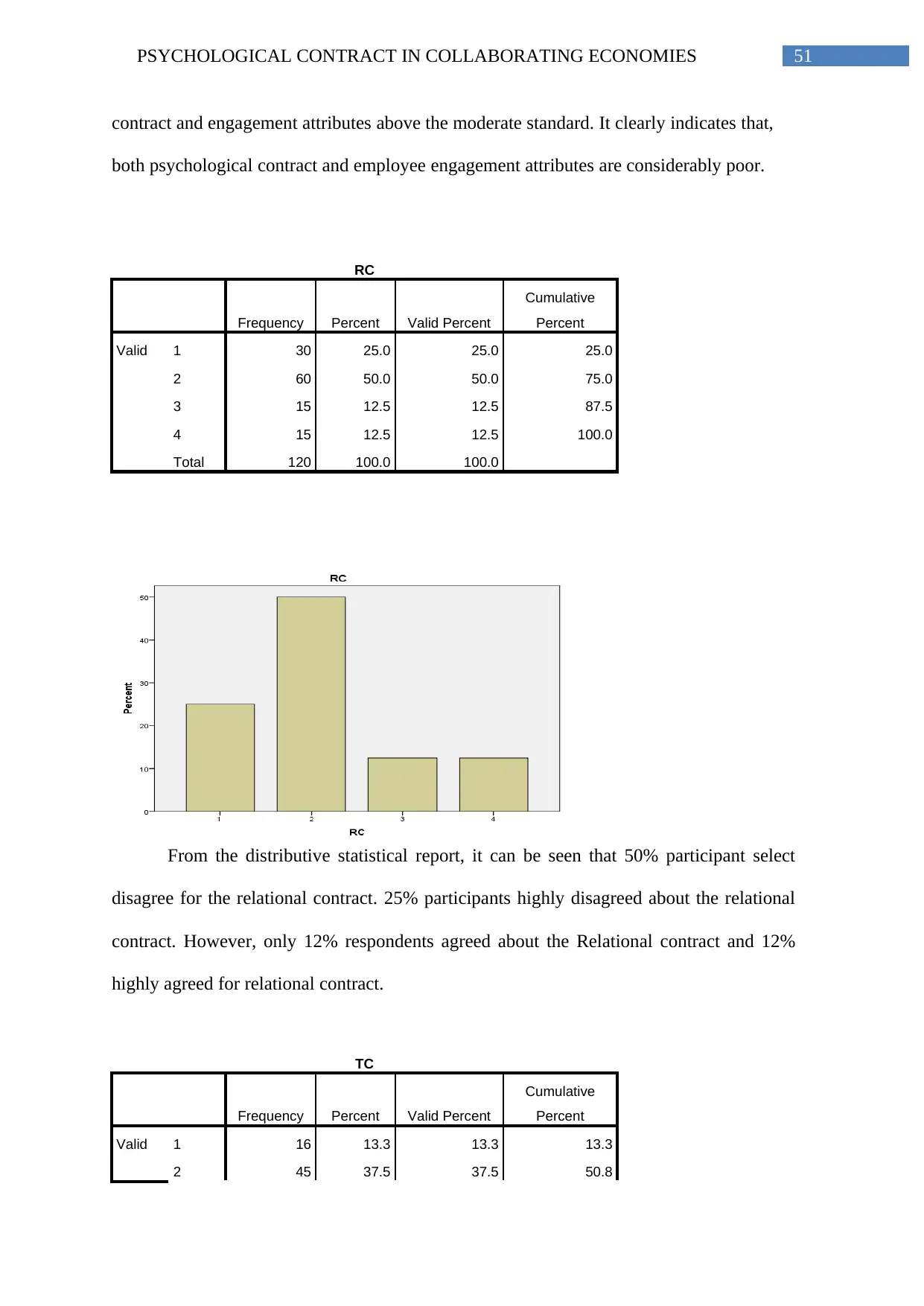
51PSYCHOLOGICAL CONTRACT IN COLLABORATING ECONOMIES
contract and engagement attributes above the moderate standard. It clearly indicates that,
both psychological contract and employee engagement attributes are considerably poor.
RC
Frequency Percent Valid Percent
Cumulative
Percent
Valid 1 30 25.0 25.0 25.0
2 60 50.0 50.0 75.0
3 15 12.5 12.5 87.5
4 15 12.5 12.5 100.0
Total 120 100.0 100.0
From the distributive statistical report, it can be seen that 50% participant select
disagree for the relational contract. 25% participants highly disagreed about the relational
contract. However, only 12% respondents agreed about the Relational contract and 12%
highly agreed for relational contract.
TC
Frequency Percent Valid Percent
Cumulative
Percent
Valid 1 16 13.3 13.3 13.3
2 45 37.5 37.5 50.8
contract and engagement attributes above the moderate standard. It clearly indicates that,
both psychological contract and employee engagement attributes are considerably poor.
RC
Frequency Percent Valid Percent
Cumulative
Percent
Valid 1 30 25.0 25.0 25.0
2 60 50.0 50.0 75.0
3 15 12.5 12.5 87.5
4 15 12.5 12.5 100.0
Total 120 100.0 100.0
From the distributive statistical report, it can be seen that 50% participant select
disagree for the relational contract. 25% participants highly disagreed about the relational
contract. However, only 12% respondents agreed about the Relational contract and 12%
highly agreed for relational contract.
TC
Frequency Percent Valid Percent
Cumulative
Percent
Valid 1 16 13.3 13.3 13.3
2 45 37.5 37.5 50.8
Secure Best Marks with AI Grader
Need help grading? Try our AI Grader for instant feedback on your assignments.
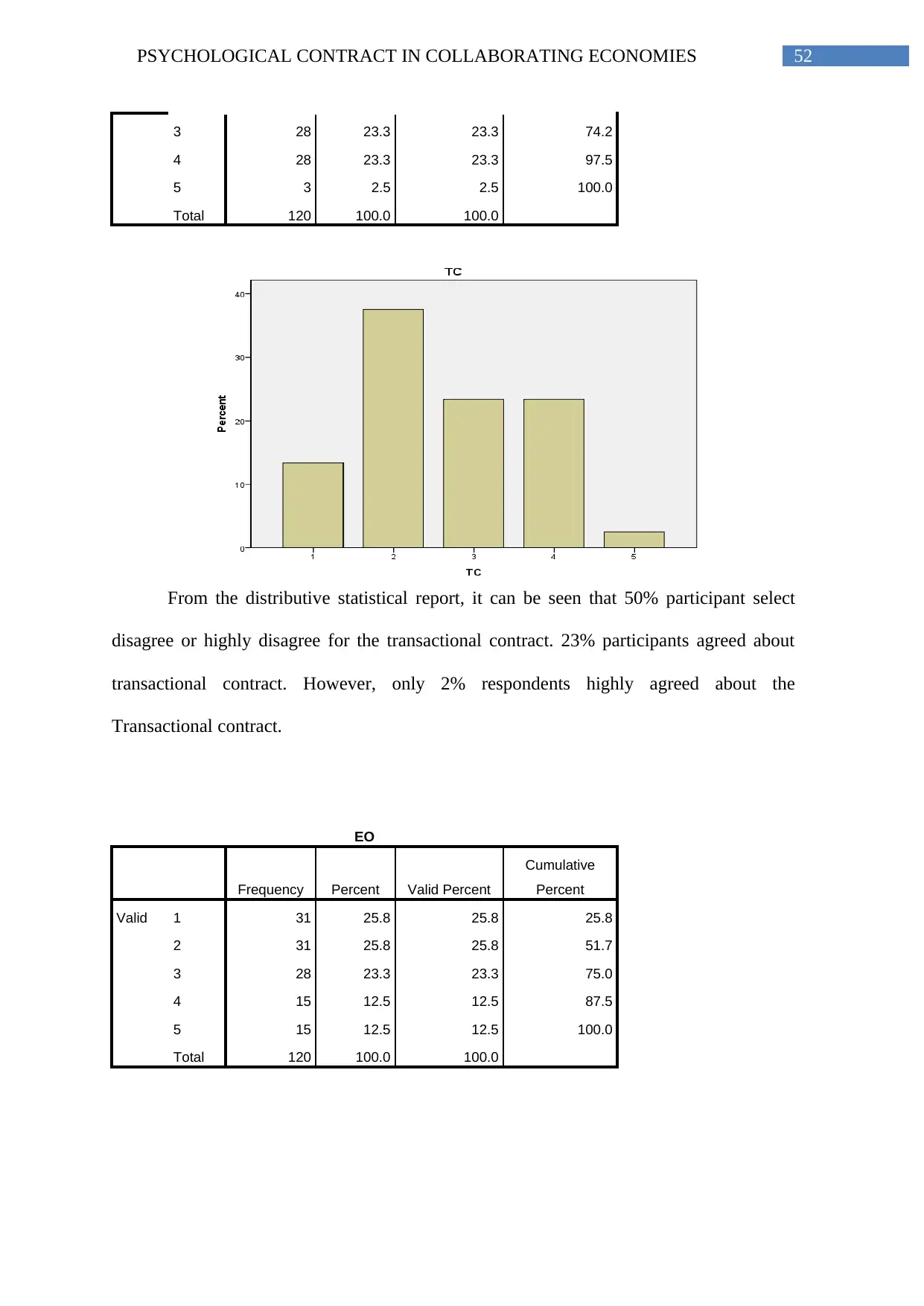
52PSYCHOLOGICAL CONTRACT IN COLLABORATING ECONOMIES
3 28 23.3 23.3 74.2
4 28 23.3 23.3 97.5
5 3 2.5 2.5 100.0
Total 120 100.0 100.0
From the distributive statistical report, it can be seen that 50% participant select
disagree or highly disagree for the transactional contract. 23% participants agreed about
transactional contract. However, only 2% respondents highly agreed about the
Transactional contract.
EO
Frequency Percent Valid Percent
Cumulative
Percent
Valid 1 31 25.8 25.8 25.8
2 31 25.8 25.8 51.7
3 28 23.3 23.3 75.0
4 15 12.5 12.5 87.5
5 15 12.5 12.5 100.0
Total 120 100.0 100.0
3 28 23.3 23.3 74.2
4 28 23.3 23.3 97.5
5 3 2.5 2.5 100.0
Total 120 100.0 100.0
From the distributive statistical report, it can be seen that 50% participant select
disagree or highly disagree for the transactional contract. 23% participants agreed about
transactional contract. However, only 2% respondents highly agreed about the
Transactional contract.
EO
Frequency Percent Valid Percent
Cumulative
Percent
Valid 1 31 25.8 25.8 25.8
2 31 25.8 25.8 51.7
3 28 23.3 23.3 75.0
4 15 12.5 12.5 87.5
5 15 12.5 12.5 100.0
Total 120 100.0 100.0
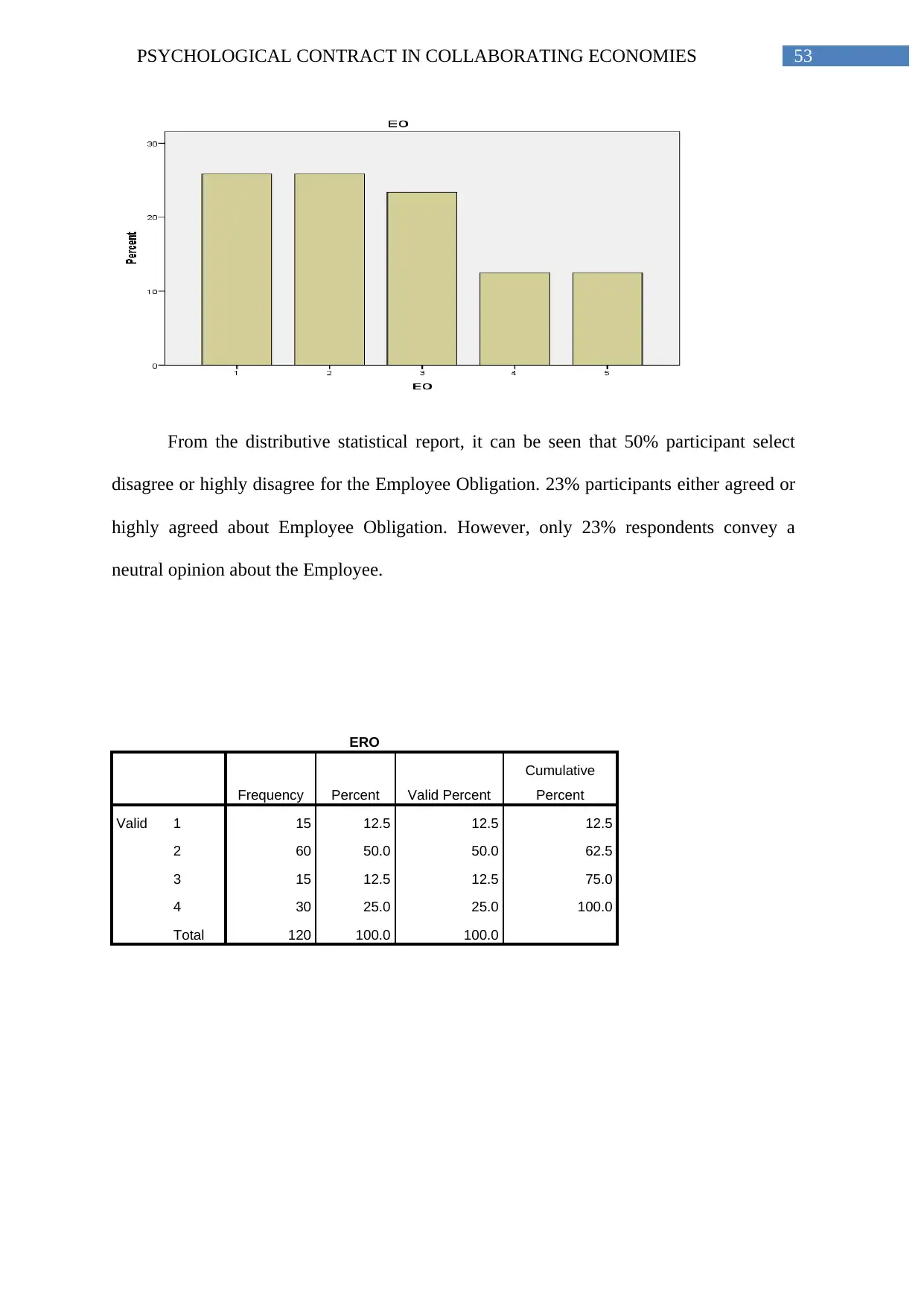
53PSYCHOLOGICAL CONTRACT IN COLLABORATING ECONOMIES
From the distributive statistical report, it can be seen that 50% participant select
disagree or highly disagree for the Employee Obligation. 23% participants either agreed or
highly agreed about Employee Obligation. However, only 23% respondents convey a
neutral opinion about the Employee.
ERO
Frequency Percent Valid Percent
Cumulative
Percent
Valid 1 15 12.5 12.5 12.5
2 60 50.0 50.0 62.5
3 15 12.5 12.5 75.0
4 30 25.0 25.0 100.0
Total 120 100.0 100.0
From the distributive statistical report, it can be seen that 50% participant select
disagree or highly disagree for the Employee Obligation. 23% participants either agreed or
highly agreed about Employee Obligation. However, only 23% respondents convey a
neutral opinion about the Employee.
ERO
Frequency Percent Valid Percent
Cumulative
Percent
Valid 1 15 12.5 12.5 12.5
2 60 50.0 50.0 62.5
3 15 12.5 12.5 75.0
4 30 25.0 25.0 100.0
Total 120 100.0 100.0
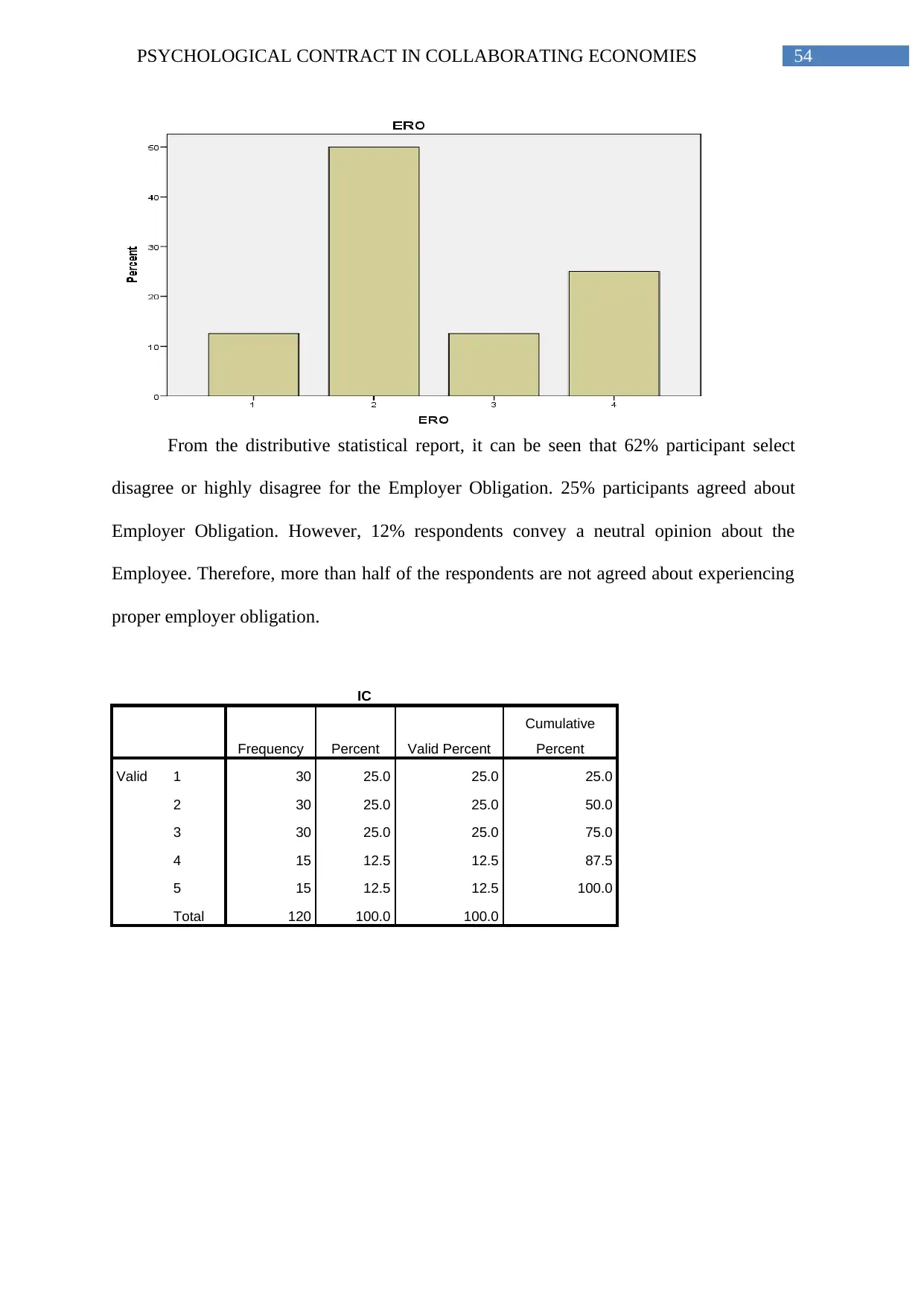
54PSYCHOLOGICAL CONTRACT IN COLLABORATING ECONOMIES
From the distributive statistical report, it can be seen that 62% participant select
disagree or highly disagree for the Employer Obligation. 25% participants agreed about
Employer Obligation. However, 12% respondents convey a neutral opinion about the
Employee. Therefore, more than half of the respondents are not agreed about experiencing
proper employer obligation.
IC
Frequency Percent Valid Percent
Cumulative
Percent
Valid 1 30 25.0 25.0 25.0
2 30 25.0 25.0 50.0
3 30 25.0 25.0 75.0
4 15 12.5 12.5 87.5
5 15 12.5 12.5 100.0
Total 120 100.0 100.0
From the distributive statistical report, it can be seen that 62% participant select
disagree or highly disagree for the Employer Obligation. 25% participants agreed about
Employer Obligation. However, 12% respondents convey a neutral opinion about the
Employee. Therefore, more than half of the respondents are not agreed about experiencing
proper employer obligation.
IC
Frequency Percent Valid Percent
Cumulative
Percent
Valid 1 30 25.0 25.0 25.0
2 30 25.0 25.0 50.0
3 30 25.0 25.0 75.0
4 15 12.5 12.5 87.5
5 15 12.5 12.5 100.0
Total 120 100.0 100.0
Paraphrase This Document
Need a fresh take? Get an instant paraphrase of this document with our AI Paraphraser
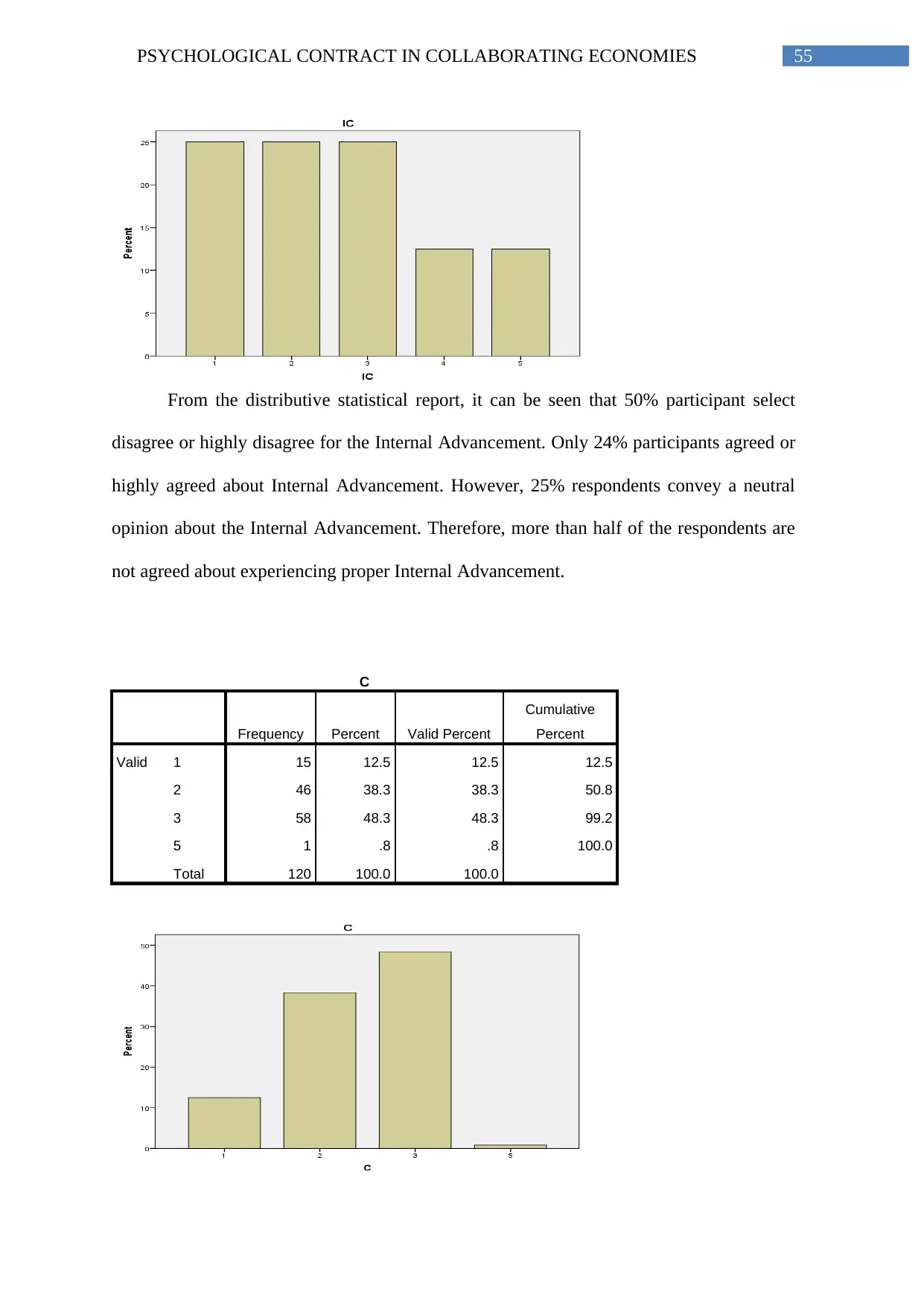
55PSYCHOLOGICAL CONTRACT IN COLLABORATING ECONOMIES
From the distributive statistical report, it can be seen that 50% participant select
disagree or highly disagree for the Internal Advancement. Only 24% participants agreed or
highly agreed about Internal Advancement. However, 25% respondents convey a neutral
opinion about the Internal Advancement. Therefore, more than half of the respondents are
not agreed about experiencing proper Internal Advancement.
C
Frequency Percent Valid Percent
Cumulative
Percent
Valid 1 15 12.5 12.5 12.5
2 46 38.3 38.3 50.8
3 58 48.3 48.3 99.2
5 1 .8 .8 100.0
Total 120 100.0 100.0
From the distributive statistical report, it can be seen that 50% participant select
disagree or highly disagree for the Internal Advancement. Only 24% participants agreed or
highly agreed about Internal Advancement. However, 25% respondents convey a neutral
opinion about the Internal Advancement. Therefore, more than half of the respondents are
not agreed about experiencing proper Internal Advancement.
C
Frequency Percent Valid Percent
Cumulative
Percent
Valid 1 15 12.5 12.5 12.5
2 46 38.3 38.3 50.8
3 58 48.3 48.3 99.2
5 1 .8 .8 100.0
Total 120 100.0 100.0
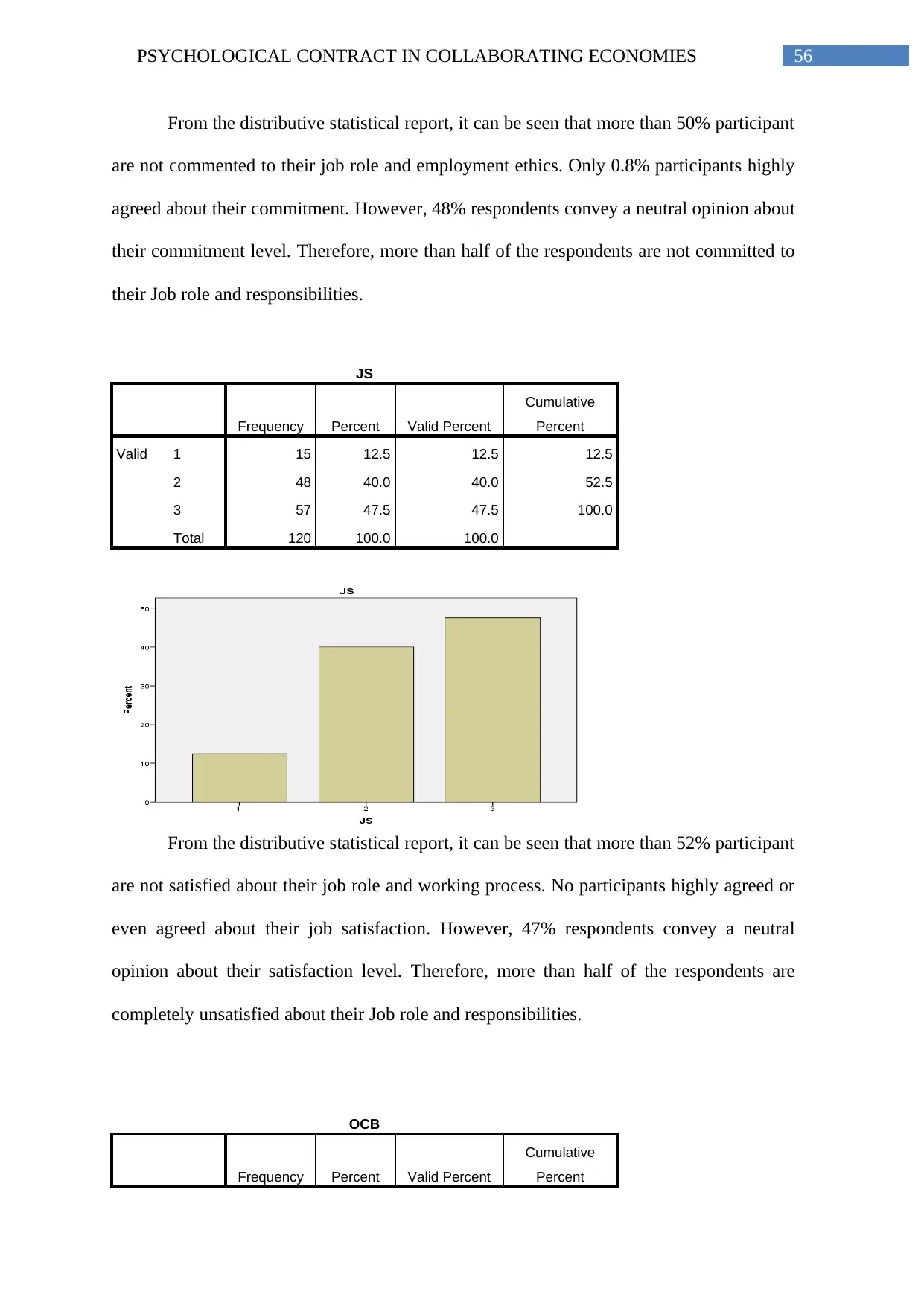
56PSYCHOLOGICAL CONTRACT IN COLLABORATING ECONOMIES
From the distributive statistical report, it can be seen that more than 50% participant
are not commented to their job role and employment ethics. Only 0.8% participants highly
agreed about their commitment. However, 48% respondents convey a neutral opinion about
their commitment level. Therefore, more than half of the respondents are not committed to
their Job role and responsibilities.
JS
Frequency Percent Valid Percent
Cumulative
Percent
Valid 1 15 12.5 12.5 12.5
2 48 40.0 40.0 52.5
3 57 47.5 47.5 100.0
Total 120 100.0 100.0
From the distributive statistical report, it can be seen that more than 52% participant
are not satisfied about their job role and working process. No participants highly agreed or
even agreed about their job satisfaction. However, 47% respondents convey a neutral
opinion about their satisfaction level. Therefore, more than half of the respondents are
completely unsatisfied about their Job role and responsibilities.
OCB
Frequency Percent Valid Percent
Cumulative
Percent
From the distributive statistical report, it can be seen that more than 50% participant
are not commented to their job role and employment ethics. Only 0.8% participants highly
agreed about their commitment. However, 48% respondents convey a neutral opinion about
their commitment level. Therefore, more than half of the respondents are not committed to
their Job role and responsibilities.
JS
Frequency Percent Valid Percent
Cumulative
Percent
Valid 1 15 12.5 12.5 12.5
2 48 40.0 40.0 52.5
3 57 47.5 47.5 100.0
Total 120 100.0 100.0
From the distributive statistical report, it can be seen that more than 52% participant
are not satisfied about their job role and working process. No participants highly agreed or
even agreed about their job satisfaction. However, 47% respondents convey a neutral
opinion about their satisfaction level. Therefore, more than half of the respondents are
completely unsatisfied about their Job role and responsibilities.
OCB
Frequency Percent Valid Percent
Cumulative
Percent
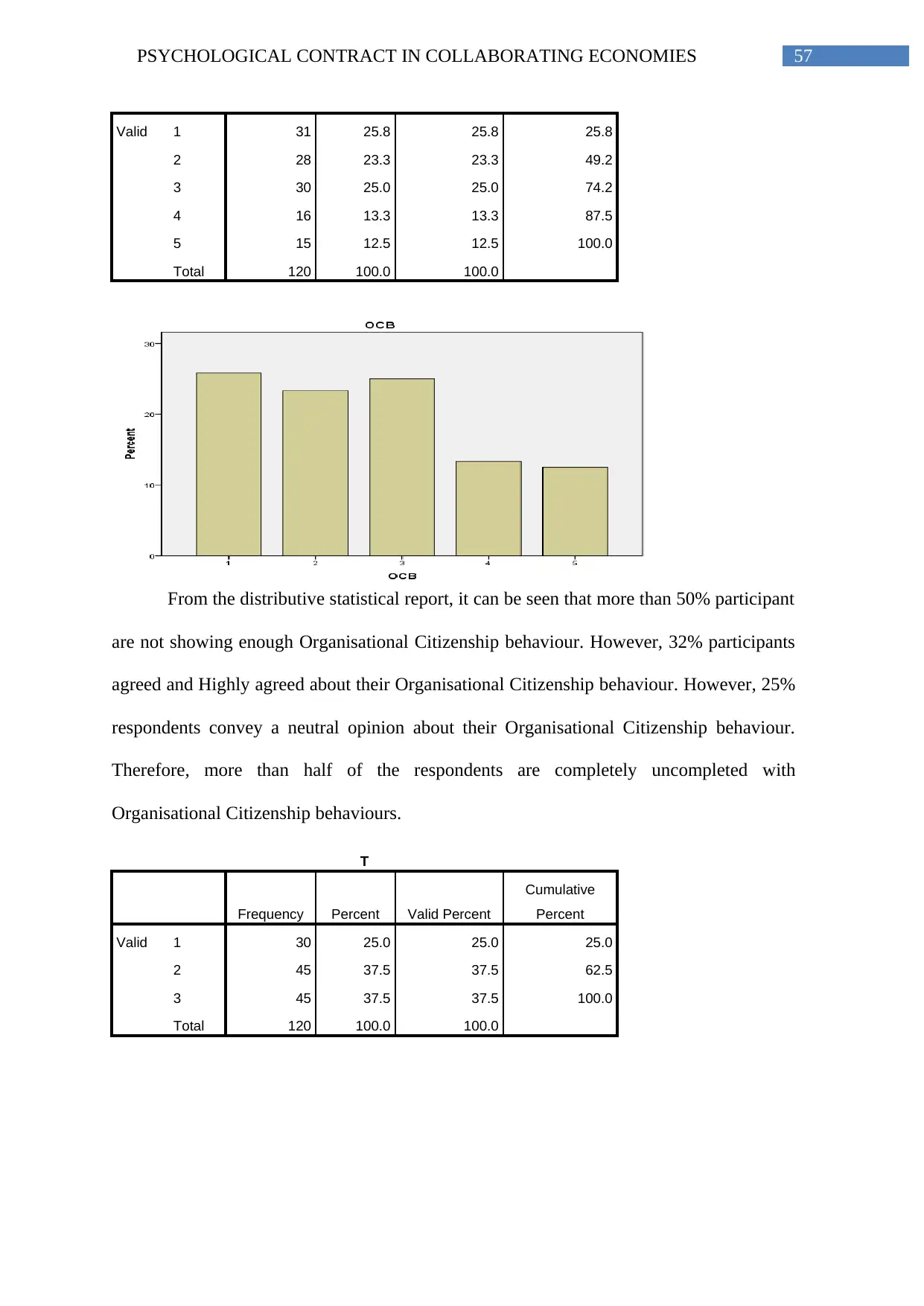
57PSYCHOLOGICAL CONTRACT IN COLLABORATING ECONOMIES
Valid 1 31 25.8 25.8 25.8
2 28 23.3 23.3 49.2
3 30 25.0 25.0 74.2
4 16 13.3 13.3 87.5
5 15 12.5 12.5 100.0
Total 120 100.0 100.0
From the distributive statistical report, it can be seen that more than 50% participant
are not showing enough Organisational Citizenship behaviour. However, 32% participants
agreed and Highly agreed about their Organisational Citizenship behaviour. However, 25%
respondents convey a neutral opinion about their Organisational Citizenship behaviour.
Therefore, more than half of the respondents are completely uncompleted with
Organisational Citizenship behaviours.
T
Frequency Percent Valid Percent
Cumulative
Percent
Valid 1 30 25.0 25.0 25.0
2 45 37.5 37.5 62.5
3 45 37.5 37.5 100.0
Total 120 100.0 100.0
Valid 1 31 25.8 25.8 25.8
2 28 23.3 23.3 49.2
3 30 25.0 25.0 74.2
4 16 13.3 13.3 87.5
5 15 12.5 12.5 100.0
Total 120 100.0 100.0
From the distributive statistical report, it can be seen that more than 50% participant
are not showing enough Organisational Citizenship behaviour. However, 32% participants
agreed and Highly agreed about their Organisational Citizenship behaviour. However, 25%
respondents convey a neutral opinion about their Organisational Citizenship behaviour.
Therefore, more than half of the respondents are completely uncompleted with
Organisational Citizenship behaviours.
T
Frequency Percent Valid Percent
Cumulative
Percent
Valid 1 30 25.0 25.0 25.0
2 45 37.5 37.5 62.5
3 45 37.5 37.5 100.0
Total 120 100.0 100.0
Secure Best Marks with AI Grader
Need help grading? Try our AI Grader for instant feedback on your assignments.
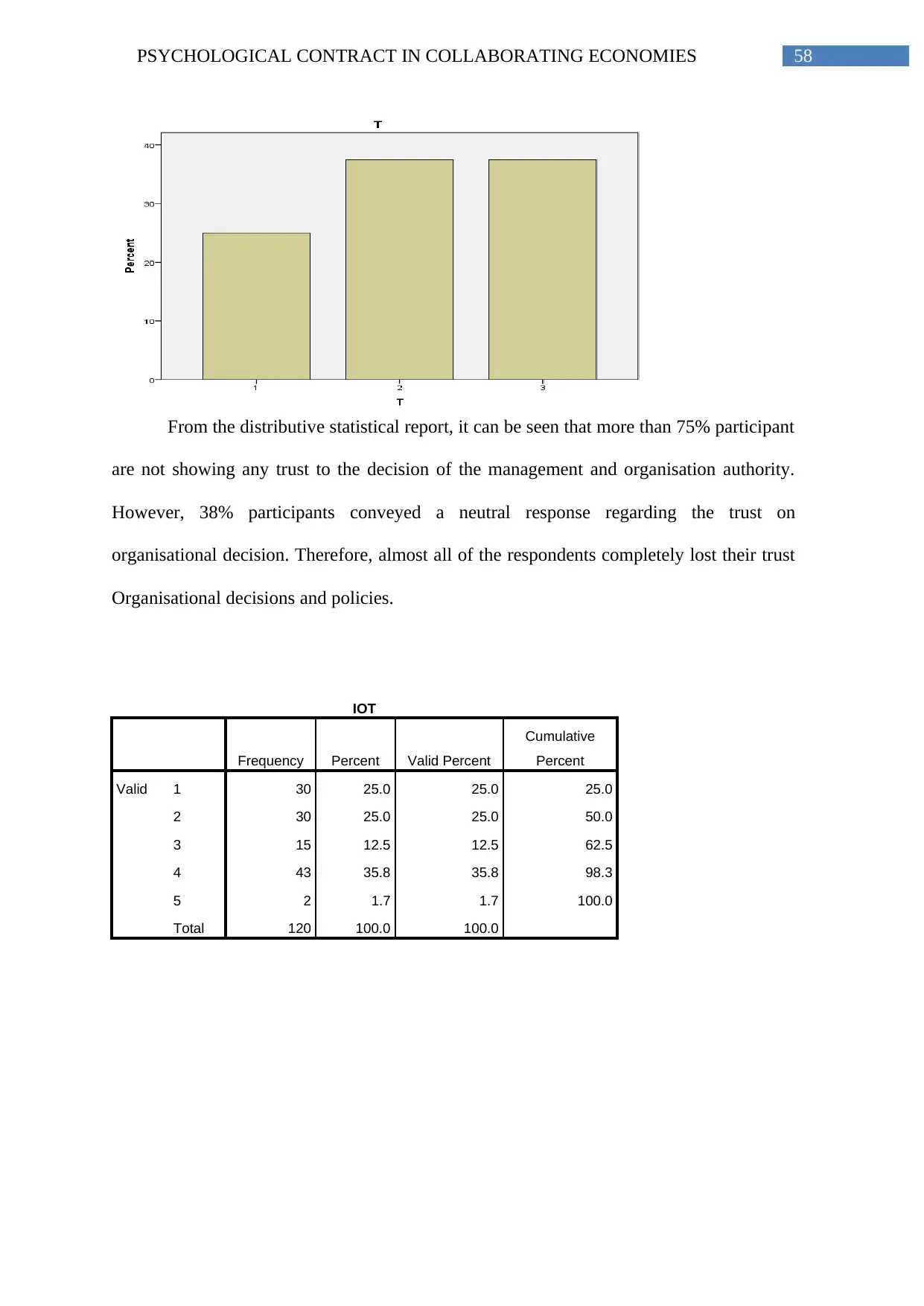
58PSYCHOLOGICAL CONTRACT IN COLLABORATING ECONOMIES
From the distributive statistical report, it can be seen that more than 75% participant
are not showing any trust to the decision of the management and organisation authority.
However, 38% participants conveyed a neutral response regarding the trust on
organisational decision. Therefore, almost all of the respondents completely lost their trust
Organisational decisions and policies.
IOT
Frequency Percent Valid Percent
Cumulative
Percent
Valid 1 30 25.0 25.0 25.0
2 30 25.0 25.0 50.0
3 15 12.5 12.5 62.5
4 43 35.8 35.8 98.3
5 2 1.7 1.7 100.0
Total 120 100.0 100.0
From the distributive statistical report, it can be seen that more than 75% participant
are not showing any trust to the decision of the management and organisation authority.
However, 38% participants conveyed a neutral response regarding the trust on
organisational decision. Therefore, almost all of the respondents completely lost their trust
Organisational decisions and policies.
IOT
Frequency Percent Valid Percent
Cumulative
Percent
Valid 1 30 25.0 25.0 25.0
2 30 25.0 25.0 50.0
3 15 12.5 12.5 62.5
4 43 35.8 35.8 98.3
5 2 1.7 1.7 100.0
Total 120 100.0 100.0
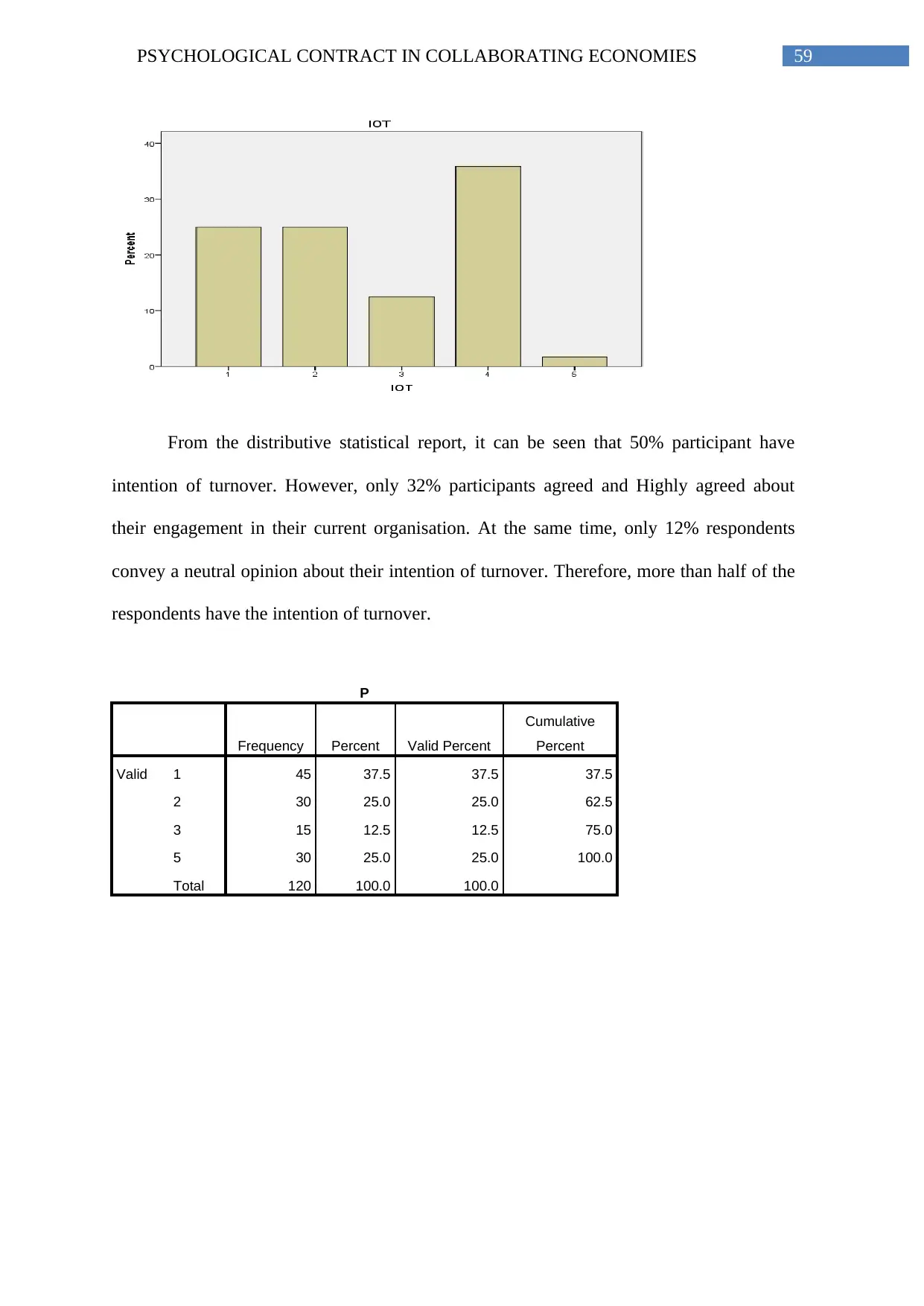
59PSYCHOLOGICAL CONTRACT IN COLLABORATING ECONOMIES
From the distributive statistical report, it can be seen that 50% participant have
intention of turnover. However, only 32% participants agreed and Highly agreed about
their engagement in their current organisation. At the same time, only 12% respondents
convey a neutral opinion about their intention of turnover. Therefore, more than half of the
respondents have the intention of turnover.
P
Frequency Percent Valid Percent
Cumulative
Percent
Valid 1 45 37.5 37.5 37.5
2 30 25.0 25.0 62.5
3 15 12.5 12.5 75.0
5 30 25.0 25.0 100.0
Total 120 100.0 100.0
From the distributive statistical report, it can be seen that 50% participant have
intention of turnover. However, only 32% participants agreed and Highly agreed about
their engagement in their current organisation. At the same time, only 12% respondents
convey a neutral opinion about their intention of turnover. Therefore, more than half of the
respondents have the intention of turnover.
P
Frequency Percent Valid Percent
Cumulative
Percent
Valid 1 45 37.5 37.5 37.5
2 30 25.0 25.0 62.5
3 15 12.5 12.5 75.0
5 30 25.0 25.0 100.0
Total 120 100.0 100.0
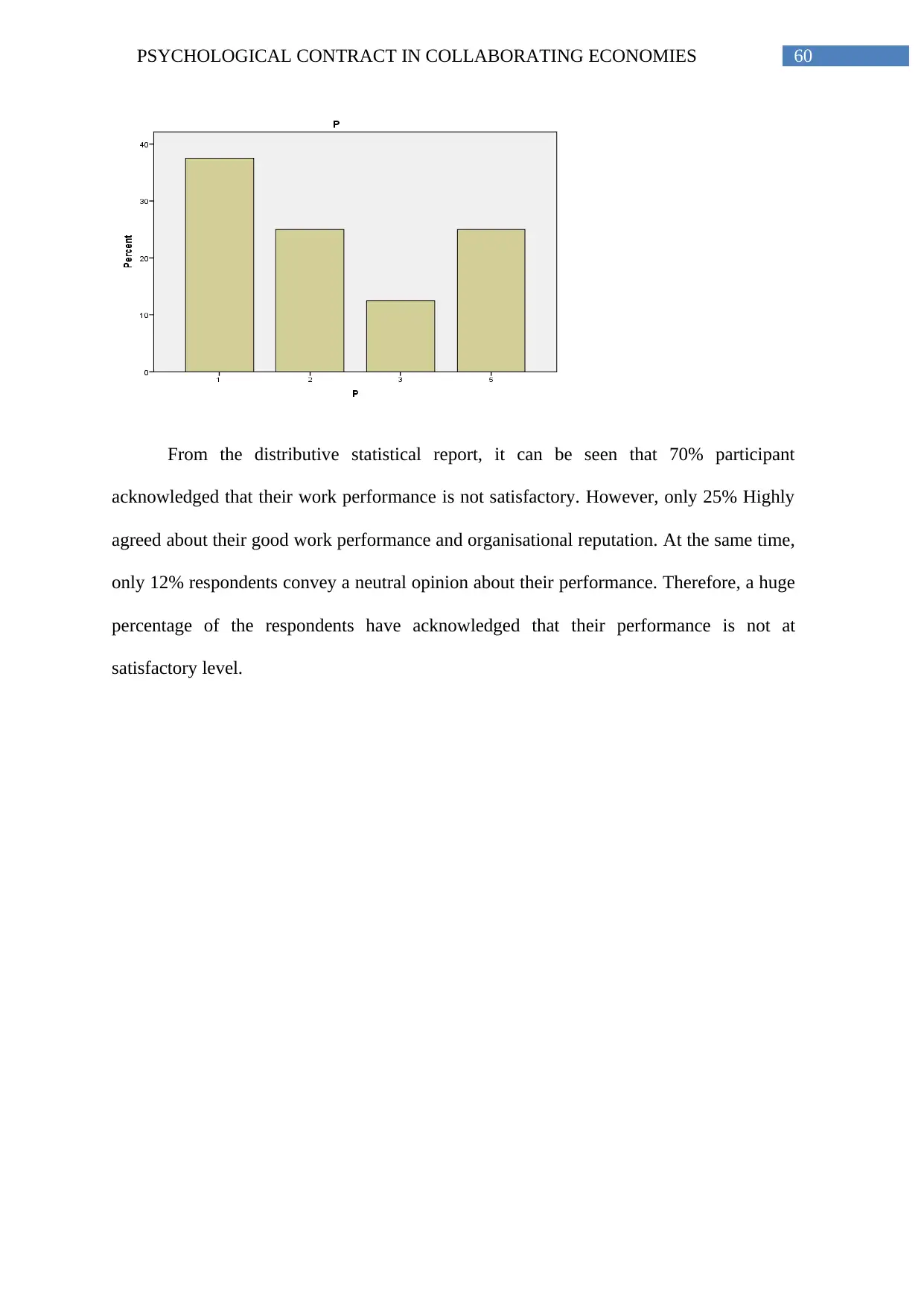
60PSYCHOLOGICAL CONTRACT IN COLLABORATING ECONOMIES
From the distributive statistical report, it can be seen that 70% participant
acknowledged that their work performance is not satisfactory. However, only 25% Highly
agreed about their good work performance and organisational reputation. At the same time,
only 12% respondents convey a neutral opinion about their performance. Therefore, a huge
percentage of the respondents have acknowledged that their performance is not at
satisfactory level.
From the distributive statistical report, it can be seen that 70% participant
acknowledged that their work performance is not satisfactory. However, only 25% Highly
agreed about their good work performance and organisational reputation. At the same time,
only 12% respondents convey a neutral opinion about their performance. Therefore, a huge
percentage of the respondents have acknowledged that their performance is not at
satisfactory level.
Paraphrase This Document
Need a fresh take? Get an instant paraphrase of this document with our AI Paraphraser
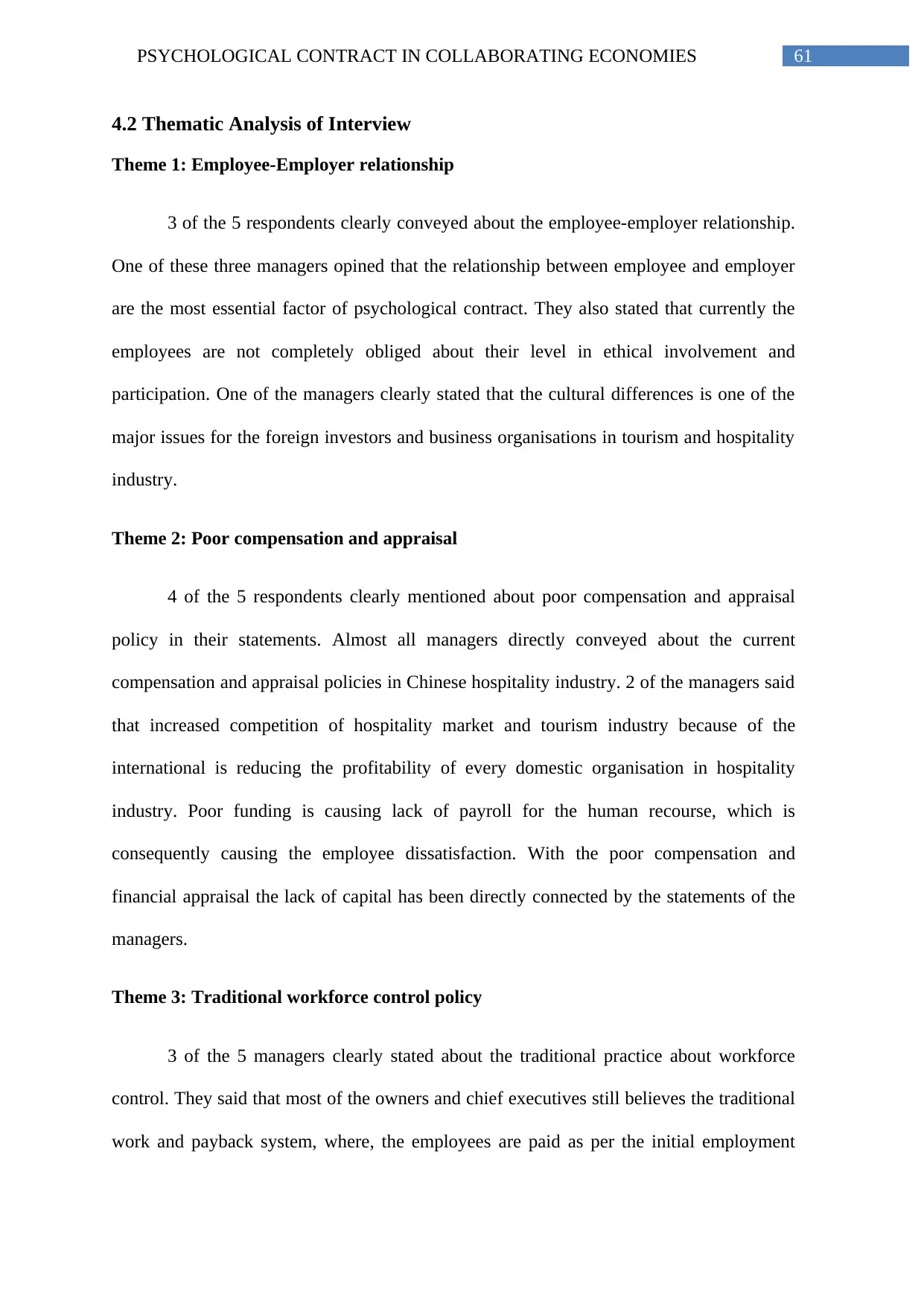
61PSYCHOLOGICAL CONTRACT IN COLLABORATING ECONOMIES
4.2 Thematic Analysis of Interview
Theme 1: Employee-Employer relationship
3 of the 5 respondents clearly conveyed about the employee-employer relationship.
One of these three managers opined that the relationship between employee and employer
are the most essential factor of psychological contract. They also stated that currently the
employees are not completely obliged about their level in ethical involvement and
participation. One of the managers clearly stated that the cultural differences is one of the
major issues for the foreign investors and business organisations in tourism and hospitality
industry.
Theme 2: Poor compensation and appraisal
4 of the 5 respondents clearly mentioned about poor compensation and appraisal
policy in their statements. Almost all managers directly conveyed about the current
compensation and appraisal policies in Chinese hospitality industry. 2 of the managers said
that increased competition of hospitality market and tourism industry because of the
international is reducing the profitability of every domestic organisation in hospitality
industry. Poor funding is causing lack of payroll for the human recourse, which is
consequently causing the employee dissatisfaction. With the poor compensation and
financial appraisal the lack of capital has been directly connected by the statements of the
managers.
Theme 3: Traditional workforce control policy
3 of the 5 managers clearly stated about the traditional practice about workforce
control. They said that most of the owners and chief executives still believes the traditional
work and payback system, where, the employees are paid as per the initial employment
4.2 Thematic Analysis of Interview
Theme 1: Employee-Employer relationship
3 of the 5 respondents clearly conveyed about the employee-employer relationship.
One of these three managers opined that the relationship between employee and employer
are the most essential factor of psychological contract. They also stated that currently the
employees are not completely obliged about their level in ethical involvement and
participation. One of the managers clearly stated that the cultural differences is one of the
major issues for the foreign investors and business organisations in tourism and hospitality
industry.
Theme 2: Poor compensation and appraisal
4 of the 5 respondents clearly mentioned about poor compensation and appraisal
policy in their statements. Almost all managers directly conveyed about the current
compensation and appraisal policies in Chinese hospitality industry. 2 of the managers said
that increased competition of hospitality market and tourism industry because of the
international is reducing the profitability of every domestic organisation in hospitality
industry. Poor funding is causing lack of payroll for the human recourse, which is
consequently causing the employee dissatisfaction. With the poor compensation and
financial appraisal the lack of capital has been directly connected by the statements of the
managers.
Theme 3: Traditional workforce control policy
3 of the 5 managers clearly stated about the traditional practice about workforce
control. They said that most of the owners and chief executives still believes the traditional
work and payback system, where, the employees are paid as per the initial employment
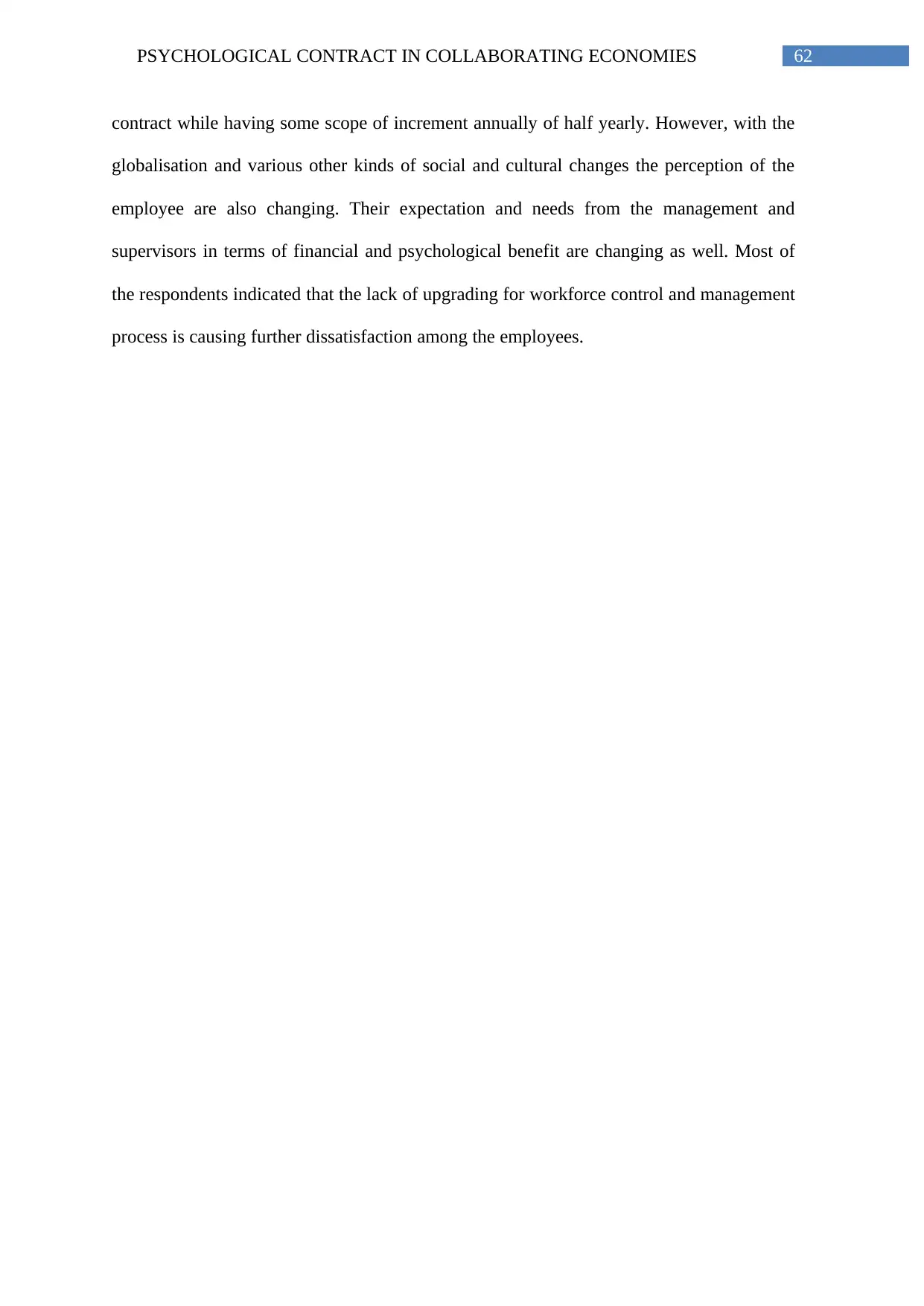
62PSYCHOLOGICAL CONTRACT IN COLLABORATING ECONOMIES
contract while having some scope of increment annually of half yearly. However, with the
globalisation and various other kinds of social and cultural changes the perception of the
employee are also changing. Their expectation and needs from the management and
supervisors in terms of financial and psychological benefit are changing as well. Most of
the respondents indicated that the lack of upgrading for workforce control and management
process is causing further dissatisfaction among the employees.
contract while having some scope of increment annually of half yearly. However, with the
globalisation and various other kinds of social and cultural changes the perception of the
employee are also changing. Their expectation and needs from the management and
supervisors in terms of financial and psychological benefit are changing as well. Most of
the respondents indicated that the lack of upgrading for workforce control and management
process is causing further dissatisfaction among the employees.
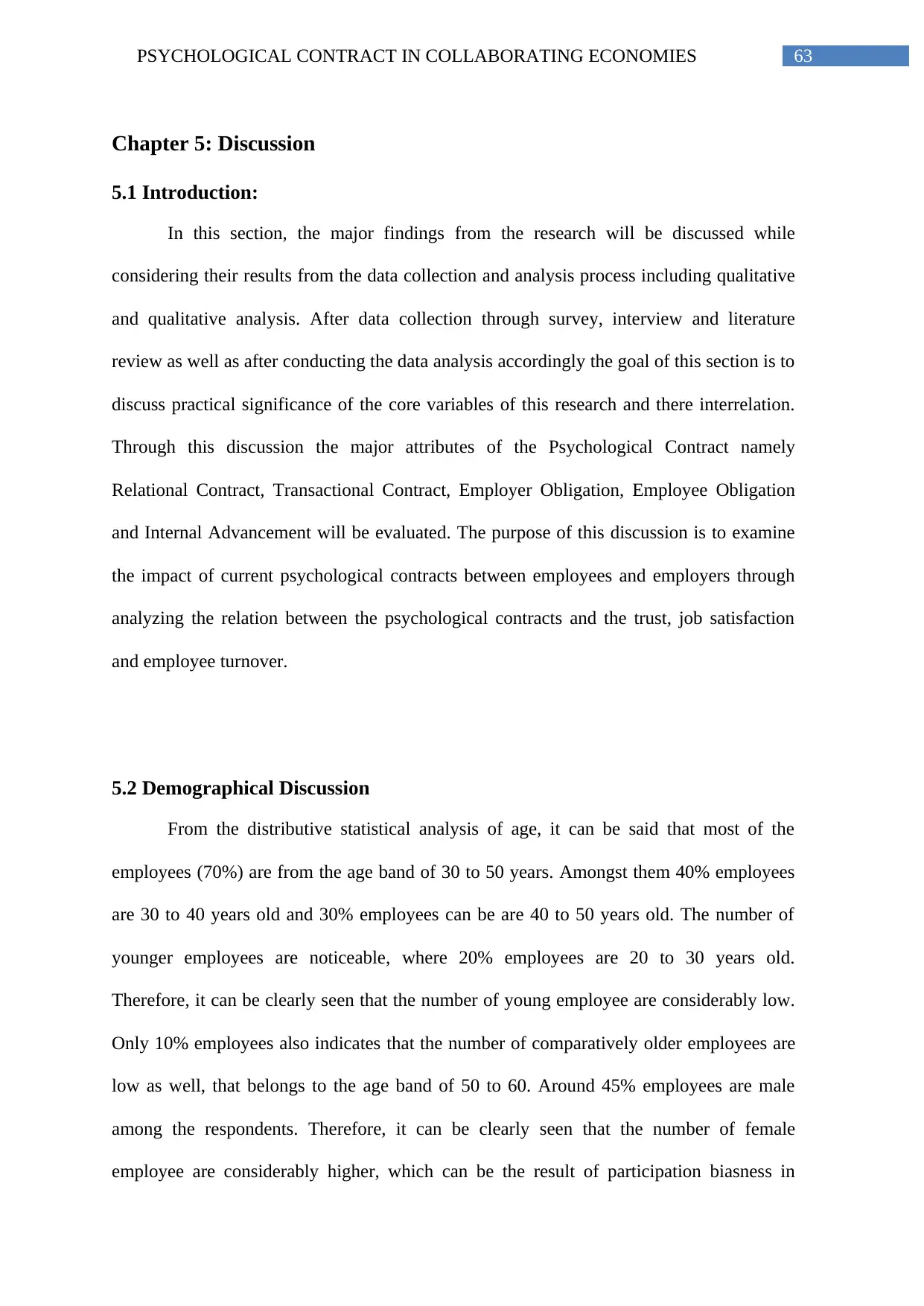
63PSYCHOLOGICAL CONTRACT IN COLLABORATING ECONOMIES
Chapter 5: Discussion
5.1 Introduction:
In this section, the major findings from the research will be discussed while
considering their results from the data collection and analysis process including qualitative
and qualitative analysis. After data collection through survey, interview and literature
review as well as after conducting the data analysis accordingly the goal of this section is to
discuss practical significance of the core variables of this research and there interrelation.
Through this discussion the major attributes of the Psychological Contract namely
Relational Contract, Transactional Contract, Employer Obligation, Employee Obligation
and Internal Advancement will be evaluated. The purpose of this discussion is to examine
the impact of current psychological contracts between employees and employers through
analyzing the relation between the psychological contracts and the trust, job satisfaction
and employee turnover.
5.2 Demographical Discussion
From the distributive statistical analysis of age, it can be said that most of the
employees (70%) are from the age band of 30 to 50 years. Amongst them 40% employees
are 30 to 40 years old and 30% employees can be are 40 to 50 years old. The number of
younger employees are noticeable, where 20% employees are 20 to 30 years old.
Therefore, it can be clearly seen that the number of young employee are considerably low.
Only 10% employees also indicates that the number of comparatively older employees are
low as well, that belongs to the age band of 50 to 60. Around 45% employees are male
among the respondents. Therefore, it can be clearly seen that the number of female
employee are considerably higher, which can be the result of participation biasness in
Chapter 5: Discussion
5.1 Introduction:
In this section, the major findings from the research will be discussed while
considering their results from the data collection and analysis process including qualitative
and qualitative analysis. After data collection through survey, interview and literature
review as well as after conducting the data analysis accordingly the goal of this section is to
discuss practical significance of the core variables of this research and there interrelation.
Through this discussion the major attributes of the Psychological Contract namely
Relational Contract, Transactional Contract, Employer Obligation, Employee Obligation
and Internal Advancement will be evaluated. The purpose of this discussion is to examine
the impact of current psychological contracts between employees and employers through
analyzing the relation between the psychological contracts and the trust, job satisfaction
and employee turnover.
5.2 Demographical Discussion
From the distributive statistical analysis of age, it can be said that most of the
employees (70%) are from the age band of 30 to 50 years. Amongst them 40% employees
are 30 to 40 years old and 30% employees can be are 40 to 50 years old. The number of
younger employees are noticeable, where 20% employees are 20 to 30 years old.
Therefore, it can be clearly seen that the number of young employee are considerably low.
Only 10% employees also indicates that the number of comparatively older employees are
low as well, that belongs to the age band of 50 to 60. Around 45% employees are male
among the respondents. Therefore, it can be clearly seen that the number of female
employee are considerably higher, which can be the result of participation biasness in
Secure Best Marks with AI Grader
Need help grading? Try our AI Grader for instant feedback on your assignments.
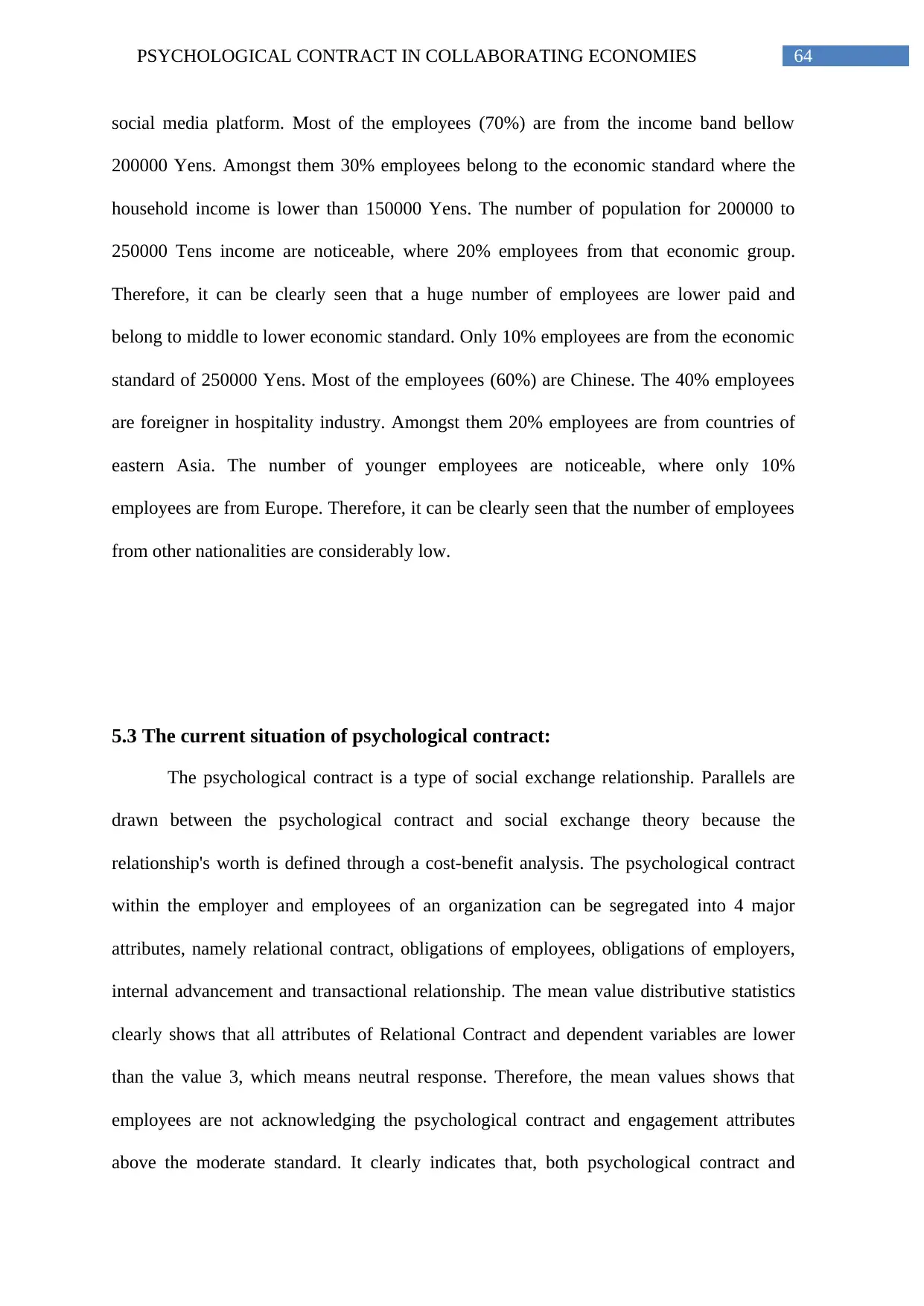
64PSYCHOLOGICAL CONTRACT IN COLLABORATING ECONOMIES
social media platform. Most of the employees (70%) are from the income band bellow
200000 Yens. Amongst them 30% employees belong to the economic standard where the
household income is lower than 150000 Yens. The number of population for 200000 to
250000 Tens income are noticeable, where 20% employees from that economic group.
Therefore, it can be clearly seen that a huge number of employees are lower paid and
belong to middle to lower economic standard. Only 10% employees are from the economic
standard of 250000 Yens. Most of the employees (60%) are Chinese. The 40% employees
are foreigner in hospitality industry. Amongst them 20% employees are from countries of
eastern Asia. The number of younger employees are noticeable, where only 10%
employees are from Europe. Therefore, it can be clearly seen that the number of employees
from other nationalities are considerably low.
5.3 The current situation of psychological contract:
The psychological contract is a type of social exchange relationship. Parallels are
drawn between the psychological contract and social exchange theory because the
relationship's worth is defined through a cost-benefit analysis. The psychological contract
within the employer and employees of an organization can be segregated into 4 major
attributes, namely relational contract, obligations of employees, obligations of employers,
internal advancement and transactional relationship. The mean value distributive statistics
clearly shows that all attributes of Relational Contract and dependent variables are lower
than the value 3, which means neutral response. Therefore, the mean values shows that
employees are not acknowledging the psychological contract and engagement attributes
above the moderate standard. It clearly indicates that, both psychological contract and
social media platform. Most of the employees (70%) are from the income band bellow
200000 Yens. Amongst them 30% employees belong to the economic standard where the
household income is lower than 150000 Yens. The number of population for 200000 to
250000 Tens income are noticeable, where 20% employees from that economic group.
Therefore, it can be clearly seen that a huge number of employees are lower paid and
belong to middle to lower economic standard. Only 10% employees are from the economic
standard of 250000 Yens. Most of the employees (60%) are Chinese. The 40% employees
are foreigner in hospitality industry. Amongst them 20% employees are from countries of
eastern Asia. The number of younger employees are noticeable, where only 10%
employees are from Europe. Therefore, it can be clearly seen that the number of employees
from other nationalities are considerably low.
5.3 The current situation of psychological contract:
The psychological contract is a type of social exchange relationship. Parallels are
drawn between the psychological contract and social exchange theory because the
relationship's worth is defined through a cost-benefit analysis. The psychological contract
within the employer and employees of an organization can be segregated into 4 major
attributes, namely relational contract, obligations of employees, obligations of employers,
internal advancement and transactional relationship. The mean value distributive statistics
clearly shows that all attributes of Relational Contract and dependent variables are lower
than the value 3, which means neutral response. Therefore, the mean values shows that
employees are not acknowledging the psychological contract and engagement attributes
above the moderate standard. It clearly indicates that, both psychological contract and
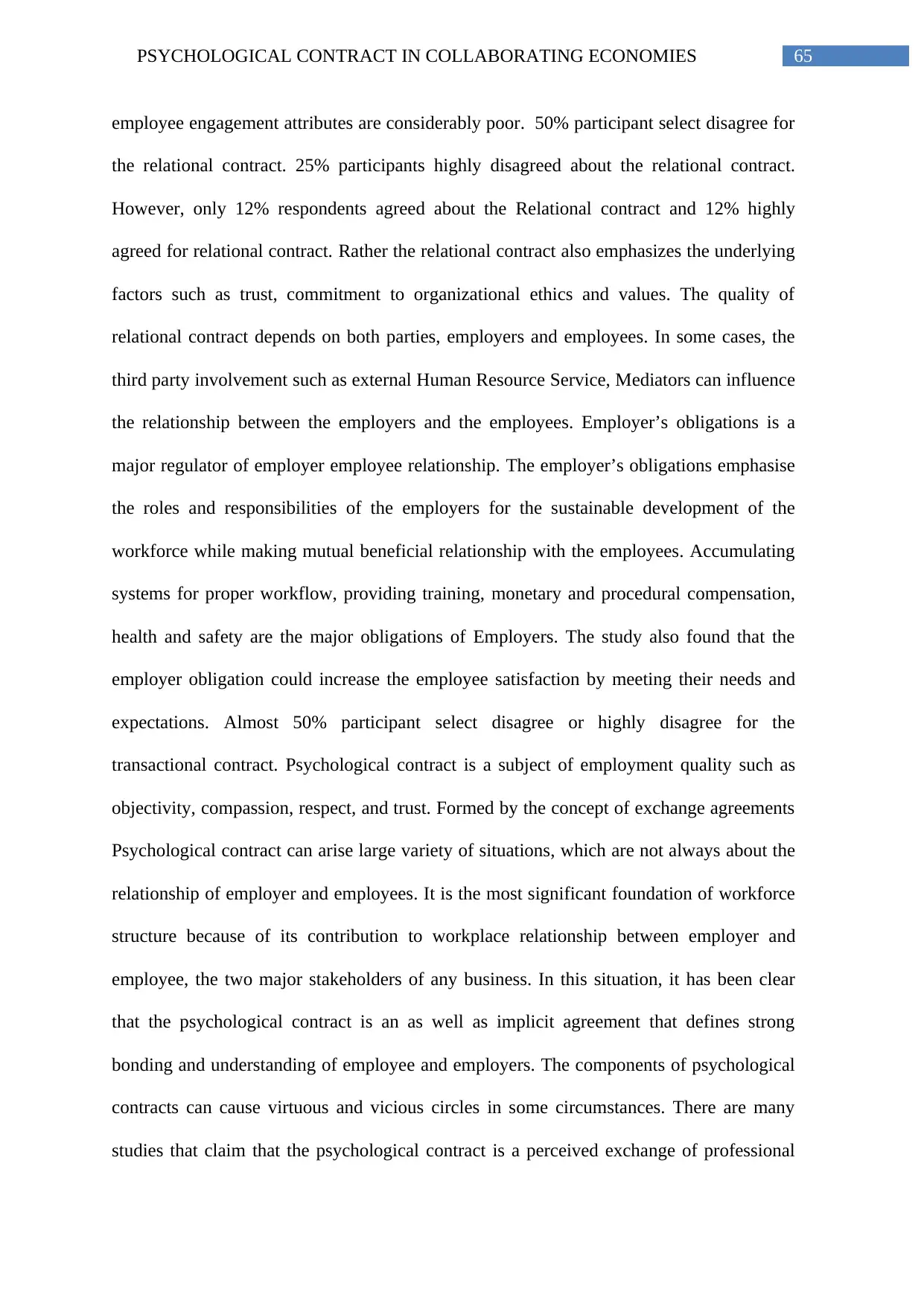
65PSYCHOLOGICAL CONTRACT IN COLLABORATING ECONOMIES
employee engagement attributes are considerably poor. 50% participant select disagree for
the relational contract. 25% participants highly disagreed about the relational contract.
However, only 12% respondents agreed about the Relational contract and 12% highly
agreed for relational contract. Rather the relational contract also emphasizes the underlying
factors such as trust, commitment to organizational ethics and values. The quality of
relational contract depends on both parties, employers and employees. In some cases, the
third party involvement such as external Human Resource Service, Mediators can influence
the relationship between the employers and the employees. Employer’s obligations is a
major regulator of employer employee relationship. The employer’s obligations emphasise
the roles and responsibilities of the employers for the sustainable development of the
workforce while making mutual beneficial relationship with the employees. Accumulating
systems for proper workflow, providing training, monetary and procedural compensation,
health and safety are the major obligations of Employers. The study also found that the
employer obligation could increase the employee satisfaction by meeting their needs and
expectations. Almost 50% participant select disagree or highly disagree for the
transactional contract. Psychological contract is a subject of employment quality such as
objectivity, compassion, respect, and trust. Formed by the concept of exchange agreements
Psychological contract can arise large variety of situations, which are not always about the
relationship of employer and employees. It is the most significant foundation of workforce
structure because of its contribution to workplace relationship between employer and
employee, the two major stakeholders of any business. In this situation, it has been clear
that the psychological contract is an as well as implicit agreement that defines strong
bonding and understanding of employee and employers. The components of psychological
contracts can cause virtuous and vicious circles in some circumstances. There are many
studies that claim that the psychological contract is a perceived exchange of professional
employee engagement attributes are considerably poor. 50% participant select disagree for
the relational contract. 25% participants highly disagreed about the relational contract.
However, only 12% respondents agreed about the Relational contract and 12% highly
agreed for relational contract. Rather the relational contract also emphasizes the underlying
factors such as trust, commitment to organizational ethics and values. The quality of
relational contract depends on both parties, employers and employees. In some cases, the
third party involvement such as external Human Resource Service, Mediators can influence
the relationship between the employers and the employees. Employer’s obligations is a
major regulator of employer employee relationship. The employer’s obligations emphasise
the roles and responsibilities of the employers for the sustainable development of the
workforce while making mutual beneficial relationship with the employees. Accumulating
systems for proper workflow, providing training, monetary and procedural compensation,
health and safety are the major obligations of Employers. The study also found that the
employer obligation could increase the employee satisfaction by meeting their needs and
expectations. Almost 50% participant select disagree or highly disagree for the
transactional contract. Psychological contract is a subject of employment quality such as
objectivity, compassion, respect, and trust. Formed by the concept of exchange agreements
Psychological contract can arise large variety of situations, which are not always about the
relationship of employer and employees. It is the most significant foundation of workforce
structure because of its contribution to workplace relationship between employer and
employee, the two major stakeholders of any business. In this situation, it has been clear
that the psychological contract is an as well as implicit agreement that defines strong
bonding and understanding of employee and employers. The components of psychological
contracts can cause virtuous and vicious circles in some circumstances. There are many
studies that claim that the psychological contract is a perceived exchange of professional
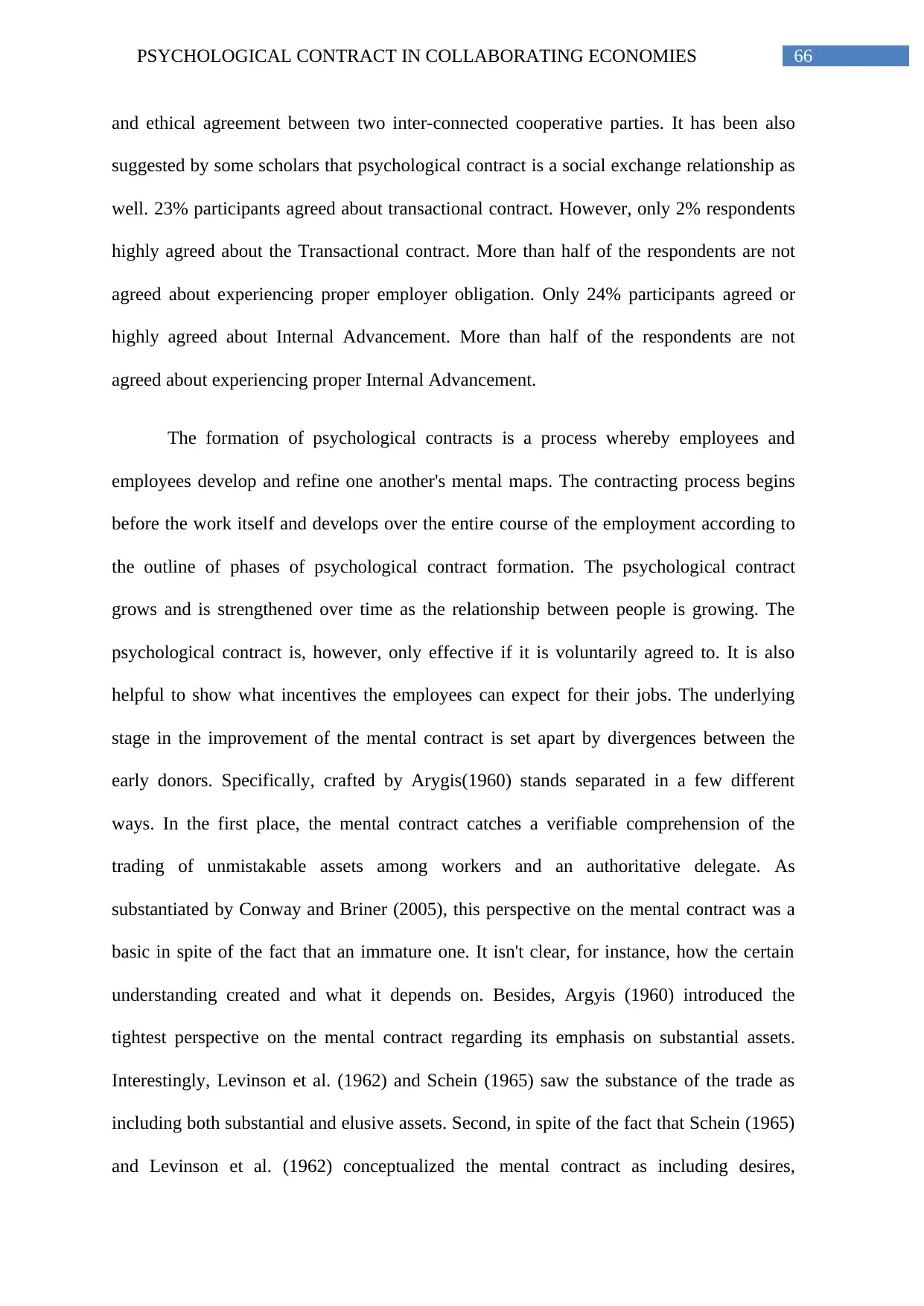
66PSYCHOLOGICAL CONTRACT IN COLLABORATING ECONOMIES
and ethical agreement between two inter-connected cooperative parties. It has been also
suggested by some scholars that psychological contract is a social exchange relationship as
well. 23% participants agreed about transactional contract. However, only 2% respondents
highly agreed about the Transactional contract. More than half of the respondents are not
agreed about experiencing proper employer obligation. Only 24% participants agreed or
highly agreed about Internal Advancement. More than half of the respondents are not
agreed about experiencing proper Internal Advancement.
The formation of psychological contracts is a process whereby employees and
employees develop and refine one another's mental maps. The contracting process begins
before the work itself and develops over the entire course of the employment according to
the outline of phases of psychological contract formation. The psychological contract
grows and is strengthened over time as the relationship between people is growing. The
psychological contract is, however, only effective if it is voluntarily agreed to. It is also
helpful to show what incentives the employees can expect for their jobs. The underlying
stage in the improvement of the mental contract is set apart by divergences between the
early donors. Specifically, crafted by Arygis(1960) stands separated in a few different
ways. In the first place, the mental contract catches a verifiable comprehension of the
trading of unmistakable assets among workers and an authoritative delegate. As
substantiated by Conway and Briner (2005), this perspective on the mental contract was a
basic in spite of the fact that an immature one. It isn't clear, for instance, how the certain
understanding created and what it depends on. Besides, Argyis (1960) introduced the
tightest perspective on the mental contract regarding its emphasis on substantial assets.
Interestingly, Levinson et al. (1962) and Schein (1965) saw the substance of the trade as
including both substantial and elusive assets. Second, in spite of the fact that Schein (1965)
and Levinson et al. (1962) conceptualized the mental contract as including desires,
and ethical agreement between two inter-connected cooperative parties. It has been also
suggested by some scholars that psychological contract is a social exchange relationship as
well. 23% participants agreed about transactional contract. However, only 2% respondents
highly agreed about the Transactional contract. More than half of the respondents are not
agreed about experiencing proper employer obligation. Only 24% participants agreed or
highly agreed about Internal Advancement. More than half of the respondents are not
agreed about experiencing proper Internal Advancement.
The formation of psychological contracts is a process whereby employees and
employees develop and refine one another's mental maps. The contracting process begins
before the work itself and develops over the entire course of the employment according to
the outline of phases of psychological contract formation. The psychological contract
grows and is strengthened over time as the relationship between people is growing. The
psychological contract is, however, only effective if it is voluntarily agreed to. It is also
helpful to show what incentives the employees can expect for their jobs. The underlying
stage in the improvement of the mental contract is set apart by divergences between the
early donors. Specifically, crafted by Arygis(1960) stands separated in a few different
ways. In the first place, the mental contract catches a verifiable comprehension of the
trading of unmistakable assets among workers and an authoritative delegate. As
substantiated by Conway and Briner (2005), this perspective on the mental contract was a
basic in spite of the fact that an immature one. It isn't clear, for instance, how the certain
understanding created and what it depends on. Besides, Argyis (1960) introduced the
tightest perspective on the mental contract regarding its emphasis on substantial assets.
Interestingly, Levinson et al. (1962) and Schein (1965) saw the substance of the trade as
including both substantial and elusive assets. Second, in spite of the fact that Schein (1965)
and Levinson et al. (1962) conceptualized the mental contract as including desires,
Paraphrase This Document
Need a fresh take? Get an instant paraphrase of this document with our AI Paraphraser
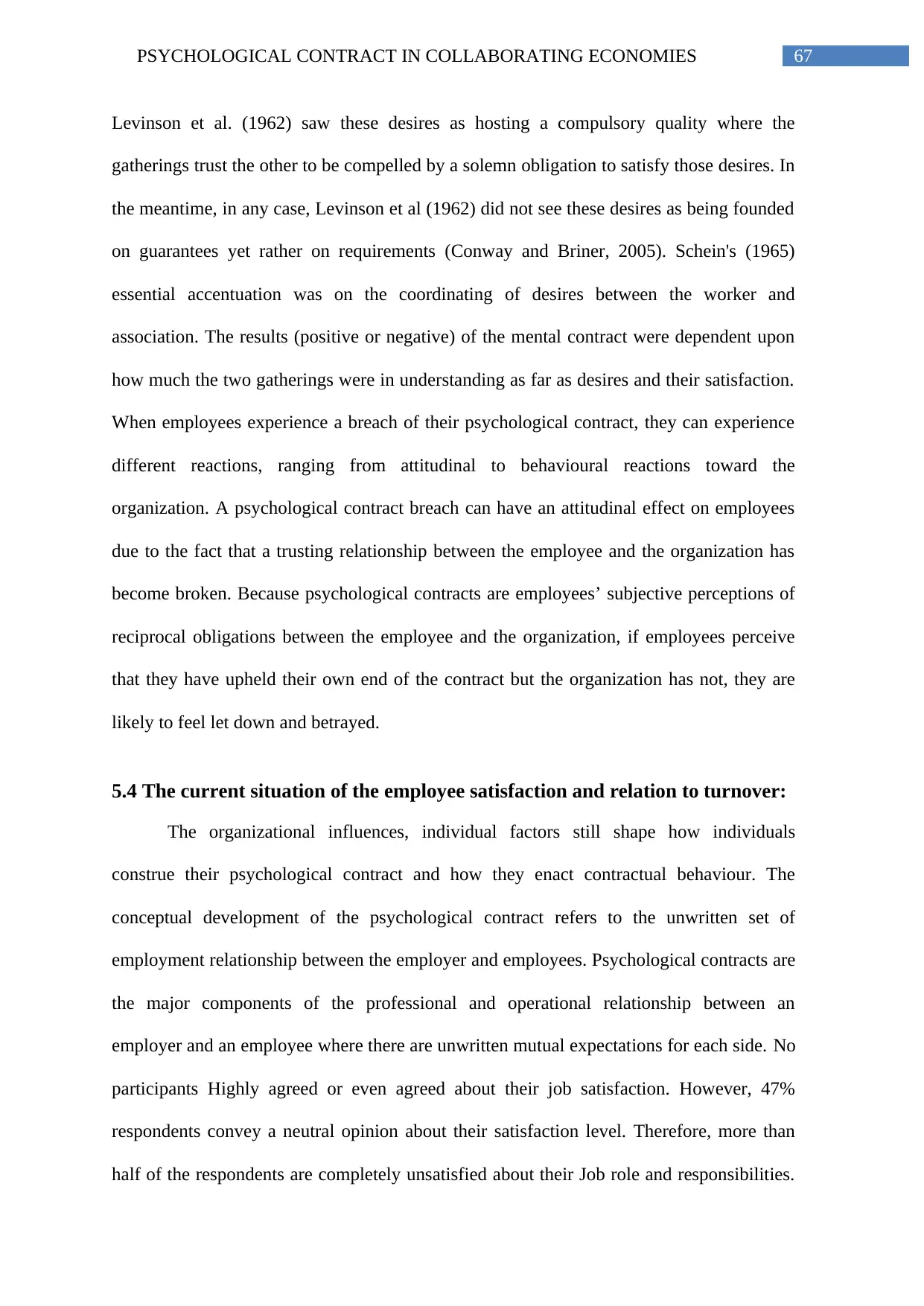
67PSYCHOLOGICAL CONTRACT IN COLLABORATING ECONOMIES
Levinson et al. (1962) saw these desires as hosting a compulsory quality where the
gatherings trust the other to be compelled by a solemn obligation to satisfy those desires. In
the meantime, in any case, Levinson et al (1962) did not see these desires as being founded
on guarantees yet rather on requirements (Conway and Briner, 2005). Schein's (1965)
essential accentuation was on the coordinating of desires between the worker and
association. The results (positive or negative) of the mental contract were dependent upon
how much the two gatherings were in understanding as far as desires and their satisfaction.
When employees experience a breach of their psychological contract, they can experience
different reactions, ranging from attitudinal to behavioural reactions toward the
organization. A psychological contract breach can have an attitudinal effect on employees
due to the fact that a trusting relationship between the employee and the organization has
become broken. Because psychological contracts are employees’ subjective perceptions of
reciprocal obligations between the employee and the organization, if employees perceive
that they have upheld their own end of the contract but the organization has not, they are
likely to feel let down and betrayed.
5.4 The current situation of the employee satisfaction and relation to turnover:
The organizational influences, individual factors still shape how individuals
construe their psychological contract and how they enact contractual behaviour. The
conceptual development of the psychological contract refers to the unwritten set of
employment relationship between the employer and employees. Psychological contracts are
the major components of the professional and operational relationship between an
employer and an employee where there are unwritten mutual expectations for each side. No
participants Highly agreed or even agreed about their job satisfaction. However, 47%
respondents convey a neutral opinion about their satisfaction level. Therefore, more than
half of the respondents are completely unsatisfied about their Job role and responsibilities.
Levinson et al. (1962) saw these desires as hosting a compulsory quality where the
gatherings trust the other to be compelled by a solemn obligation to satisfy those desires. In
the meantime, in any case, Levinson et al (1962) did not see these desires as being founded
on guarantees yet rather on requirements (Conway and Briner, 2005). Schein's (1965)
essential accentuation was on the coordinating of desires between the worker and
association. The results (positive or negative) of the mental contract were dependent upon
how much the two gatherings were in understanding as far as desires and their satisfaction.
When employees experience a breach of their psychological contract, they can experience
different reactions, ranging from attitudinal to behavioural reactions toward the
organization. A psychological contract breach can have an attitudinal effect on employees
due to the fact that a trusting relationship between the employee and the organization has
become broken. Because psychological contracts are employees’ subjective perceptions of
reciprocal obligations between the employee and the organization, if employees perceive
that they have upheld their own end of the contract but the organization has not, they are
likely to feel let down and betrayed.
5.4 The current situation of the employee satisfaction and relation to turnover:
The organizational influences, individual factors still shape how individuals
construe their psychological contract and how they enact contractual behaviour. The
conceptual development of the psychological contract refers to the unwritten set of
employment relationship between the employer and employees. Psychological contracts are
the major components of the professional and operational relationship between an
employer and an employee where there are unwritten mutual expectations for each side. No
participants Highly agreed or even agreed about their job satisfaction. However, 47%
respondents convey a neutral opinion about their satisfaction level. Therefore, more than
half of the respondents are completely unsatisfied about their Job role and responsibilities.
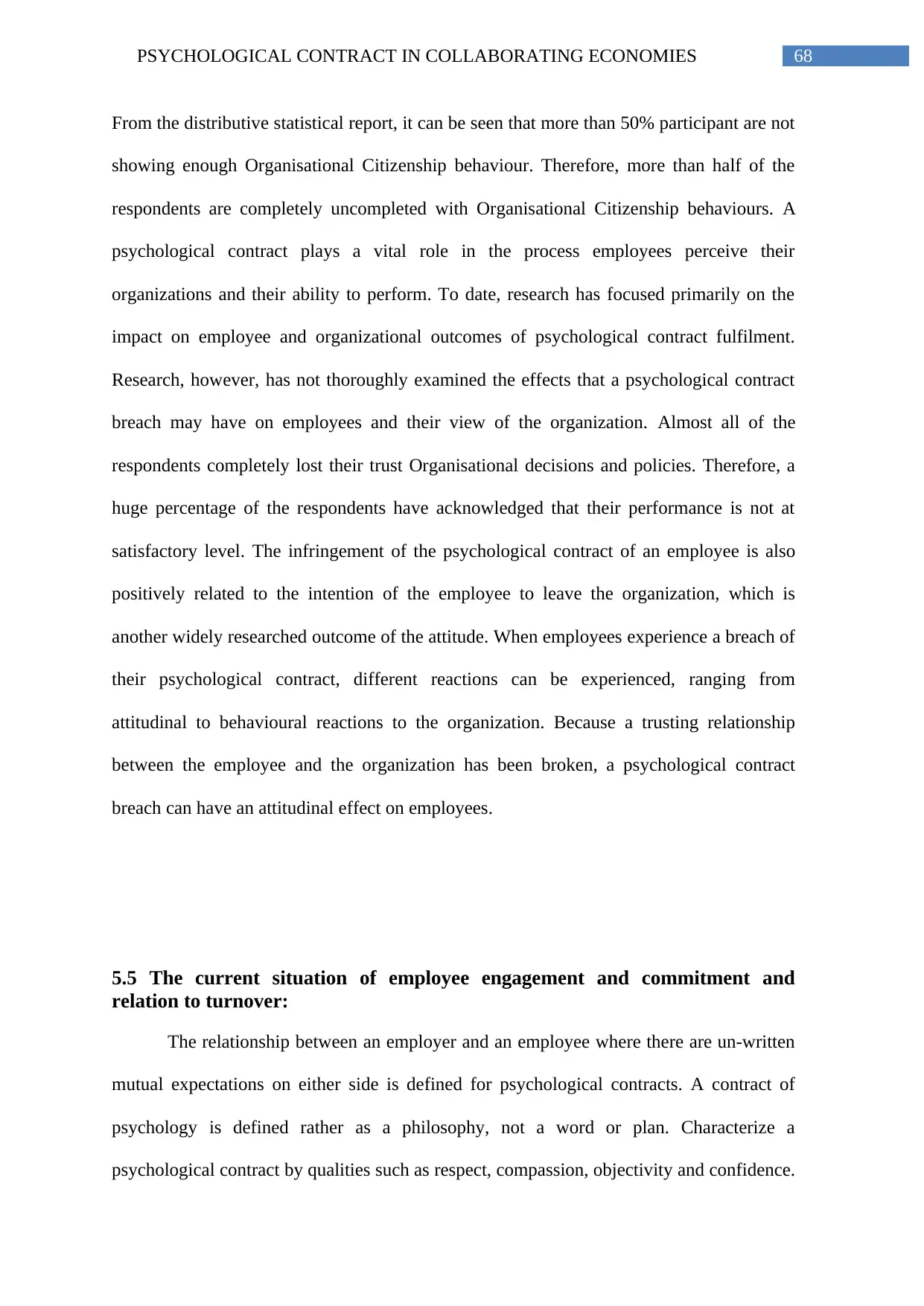
68PSYCHOLOGICAL CONTRACT IN COLLABORATING ECONOMIES
From the distributive statistical report, it can be seen that more than 50% participant are not
showing enough Organisational Citizenship behaviour. Therefore, more than half of the
respondents are completely uncompleted with Organisational Citizenship behaviours. A
psychological contract plays a vital role in the process employees perceive their
organizations and their ability to perform. To date, research has focused primarily on the
impact on employee and organizational outcomes of psychological contract fulfilment.
Research, however, has not thoroughly examined the effects that a psychological contract
breach may have on employees and their view of the organization. Almost all of the
respondents completely lost their trust Organisational decisions and policies. Therefore, a
huge percentage of the respondents have acknowledged that their performance is not at
satisfactory level. The infringement of the psychological contract of an employee is also
positively related to the intention of the employee to leave the organization, which is
another widely researched outcome of the attitude. When employees experience a breach of
their psychological contract, different reactions can be experienced, ranging from
attitudinal to behavioural reactions to the organization. Because a trusting relationship
between the employee and the organization has been broken, a psychological contract
breach can have an attitudinal effect on employees.
5.5 The current situation of employee engagement and commitment and
relation to turnover:
The relationship between an employer and an employee where there are un-written
mutual expectations on either side is defined for psychological contracts. A contract of
psychology is defined rather as a philosophy, not a word or plan. Characterize a
psychological contract by qualities such as respect, compassion, objectivity and confidence.
From the distributive statistical report, it can be seen that more than 50% participant are not
showing enough Organisational Citizenship behaviour. Therefore, more than half of the
respondents are completely uncompleted with Organisational Citizenship behaviours. A
psychological contract plays a vital role in the process employees perceive their
organizations and their ability to perform. To date, research has focused primarily on the
impact on employee and organizational outcomes of psychological contract fulfilment.
Research, however, has not thoroughly examined the effects that a psychological contract
breach may have on employees and their view of the organization. Almost all of the
respondents completely lost their trust Organisational decisions and policies. Therefore, a
huge percentage of the respondents have acknowledged that their performance is not at
satisfactory level. The infringement of the psychological contract of an employee is also
positively related to the intention of the employee to leave the organization, which is
another widely researched outcome of the attitude. When employees experience a breach of
their psychological contract, different reactions can be experienced, ranging from
attitudinal to behavioural reactions to the organization. Because a trusting relationship
between the employee and the organization has been broken, a psychological contract
breach can have an attitudinal effect on employees.
5.5 The current situation of employee engagement and commitment and
relation to turnover:
The relationship between an employer and an employee where there are un-written
mutual expectations on either side is defined for psychological contracts. A contract of
psychology is defined rather as a philosophy, not a word or plan. Characterize a
psychological contract by qualities such as respect, compassion, objectivity and confidence.
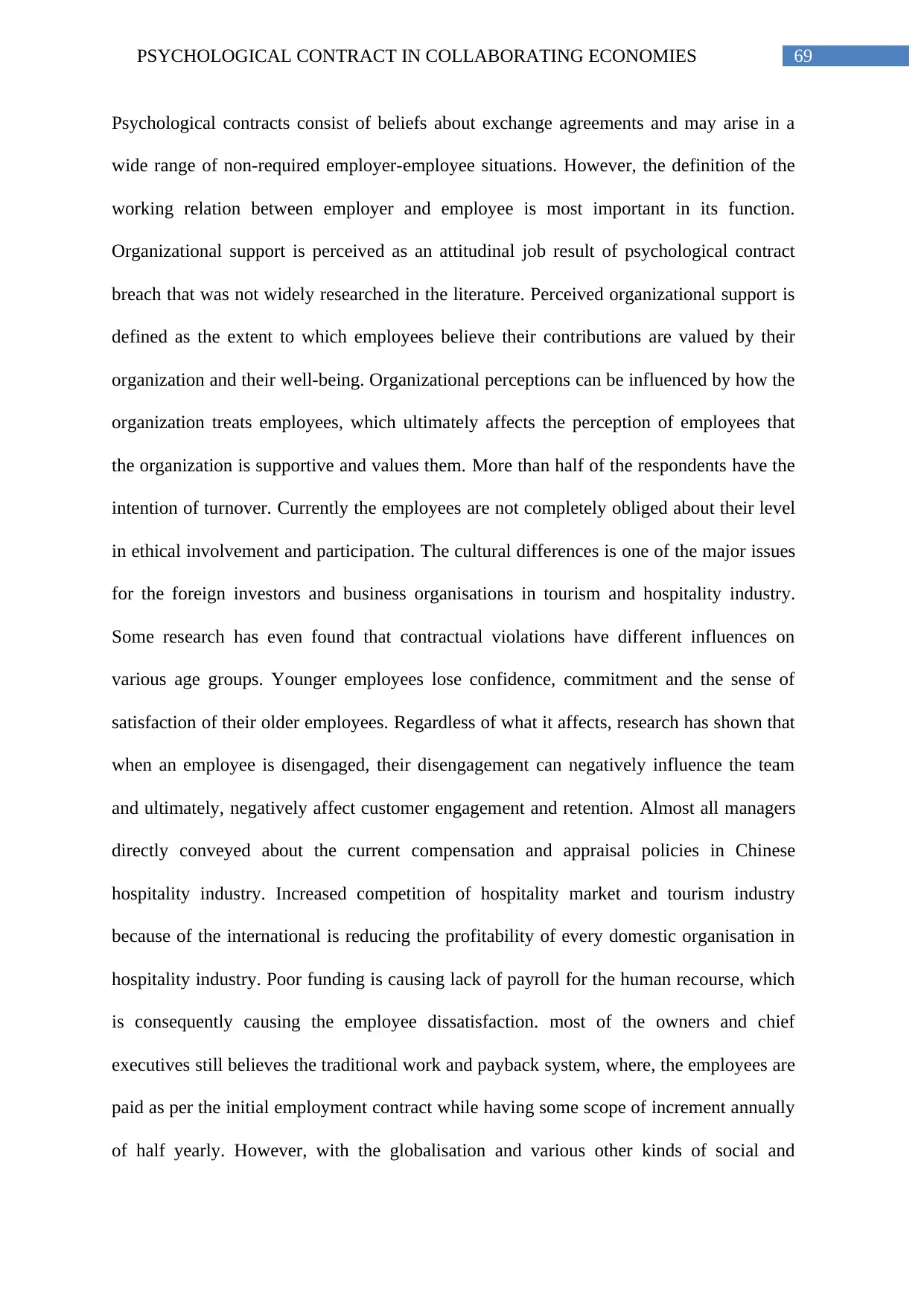
69PSYCHOLOGICAL CONTRACT IN COLLABORATING ECONOMIES
Psychological contracts consist of beliefs about exchange agreements and may arise in a
wide range of non-required employer-employee situations. However, the definition of the
working relation between employer and employee is most important in its function.
Organizational support is perceived as an attitudinal job result of psychological contract
breach that was not widely researched in the literature. Perceived organizational support is
defined as the extent to which employees believe their contributions are valued by their
organization and their well-being. Organizational perceptions can be influenced by how the
organization treats employees, which ultimately affects the perception of employees that
the organization is supportive and values them. More than half of the respondents have the
intention of turnover. Currently the employees are not completely obliged about their level
in ethical involvement and participation. The cultural differences is one of the major issues
for the foreign investors and business organisations in tourism and hospitality industry.
Some research has even found that contractual violations have different influences on
various age groups. Younger employees lose confidence, commitment and the sense of
satisfaction of their older employees. Regardless of what it affects, research has shown that
when an employee is disengaged, their disengagement can negatively influence the team
and ultimately, negatively affect customer engagement and retention. Almost all managers
directly conveyed about the current compensation and appraisal policies in Chinese
hospitality industry. Increased competition of hospitality market and tourism industry
because of the international is reducing the profitability of every domestic organisation in
hospitality industry. Poor funding is causing lack of payroll for the human recourse, which
is consequently causing the employee dissatisfaction. most of the owners and chief
executives still believes the traditional work and payback system, where, the employees are
paid as per the initial employment contract while having some scope of increment annually
of half yearly. However, with the globalisation and various other kinds of social and
Psychological contracts consist of beliefs about exchange agreements and may arise in a
wide range of non-required employer-employee situations. However, the definition of the
working relation between employer and employee is most important in its function.
Organizational support is perceived as an attitudinal job result of psychological contract
breach that was not widely researched in the literature. Perceived organizational support is
defined as the extent to which employees believe their contributions are valued by their
organization and their well-being. Organizational perceptions can be influenced by how the
organization treats employees, which ultimately affects the perception of employees that
the organization is supportive and values them. More than half of the respondents have the
intention of turnover. Currently the employees are not completely obliged about their level
in ethical involvement and participation. The cultural differences is one of the major issues
for the foreign investors and business organisations in tourism and hospitality industry.
Some research has even found that contractual violations have different influences on
various age groups. Younger employees lose confidence, commitment and the sense of
satisfaction of their older employees. Regardless of what it affects, research has shown that
when an employee is disengaged, their disengagement can negatively influence the team
and ultimately, negatively affect customer engagement and retention. Almost all managers
directly conveyed about the current compensation and appraisal policies in Chinese
hospitality industry. Increased competition of hospitality market and tourism industry
because of the international is reducing the profitability of every domestic organisation in
hospitality industry. Poor funding is causing lack of payroll for the human recourse, which
is consequently causing the employee dissatisfaction. most of the owners and chief
executives still believes the traditional work and payback system, where, the employees are
paid as per the initial employment contract while having some scope of increment annually
of half yearly. However, with the globalisation and various other kinds of social and
Secure Best Marks with AI Grader
Need help grading? Try our AI Grader for instant feedback on your assignments.
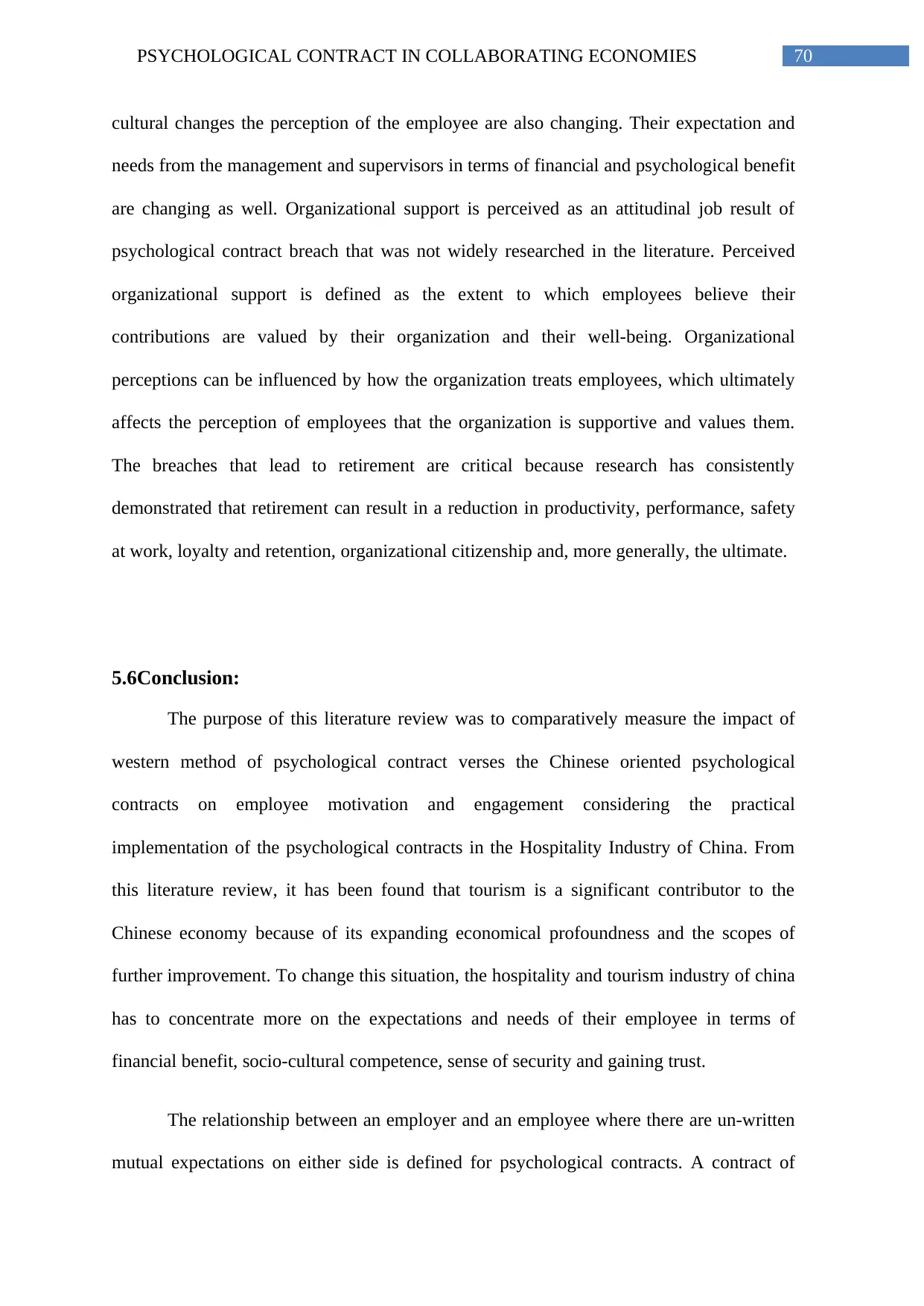
70PSYCHOLOGICAL CONTRACT IN COLLABORATING ECONOMIES
cultural changes the perception of the employee are also changing. Their expectation and
needs from the management and supervisors in terms of financial and psychological benefit
are changing as well. Organizational support is perceived as an attitudinal job result of
psychological contract breach that was not widely researched in the literature. Perceived
organizational support is defined as the extent to which employees believe their
contributions are valued by their organization and their well-being. Organizational
perceptions can be influenced by how the organization treats employees, which ultimately
affects the perception of employees that the organization is supportive and values them.
The breaches that lead to retirement are critical because research has consistently
demonstrated that retirement can result in a reduction in productivity, performance, safety
at work, loyalty and retention, organizational citizenship and, more generally, the ultimate.
5.6Conclusion:
The purpose of this literature review was to comparatively measure the impact of
western method of psychological contract verses the Chinese oriented psychological
contracts on employee motivation and engagement considering the practical
implementation of the psychological contracts in the Hospitality Industry of China. From
this literature review, it has been found that tourism is a significant contributor to the
Chinese economy because of its expanding economical profoundness and the scopes of
further improvement. To change this situation, the hospitality and tourism industry of china
has to concentrate more on the expectations and needs of their employee in terms of
financial benefit, socio-cultural competence, sense of security and gaining trust.
The relationship between an employer and an employee where there are un-written
mutual expectations on either side is defined for psychological contracts. A contract of
cultural changes the perception of the employee are also changing. Their expectation and
needs from the management and supervisors in terms of financial and psychological benefit
are changing as well. Organizational support is perceived as an attitudinal job result of
psychological contract breach that was not widely researched in the literature. Perceived
organizational support is defined as the extent to which employees believe their
contributions are valued by their organization and their well-being. Organizational
perceptions can be influenced by how the organization treats employees, which ultimately
affects the perception of employees that the organization is supportive and values them.
The breaches that lead to retirement are critical because research has consistently
demonstrated that retirement can result in a reduction in productivity, performance, safety
at work, loyalty and retention, organizational citizenship and, more generally, the ultimate.
5.6Conclusion:
The purpose of this literature review was to comparatively measure the impact of
western method of psychological contract verses the Chinese oriented psychological
contracts on employee motivation and engagement considering the practical
implementation of the psychological contracts in the Hospitality Industry of China. From
this literature review, it has been found that tourism is a significant contributor to the
Chinese economy because of its expanding economical profoundness and the scopes of
further improvement. To change this situation, the hospitality and tourism industry of china
has to concentrate more on the expectations and needs of their employee in terms of
financial benefit, socio-cultural competence, sense of security and gaining trust.
The relationship between an employer and an employee where there are un-written
mutual expectations on either side is defined for psychological contracts. A contract of
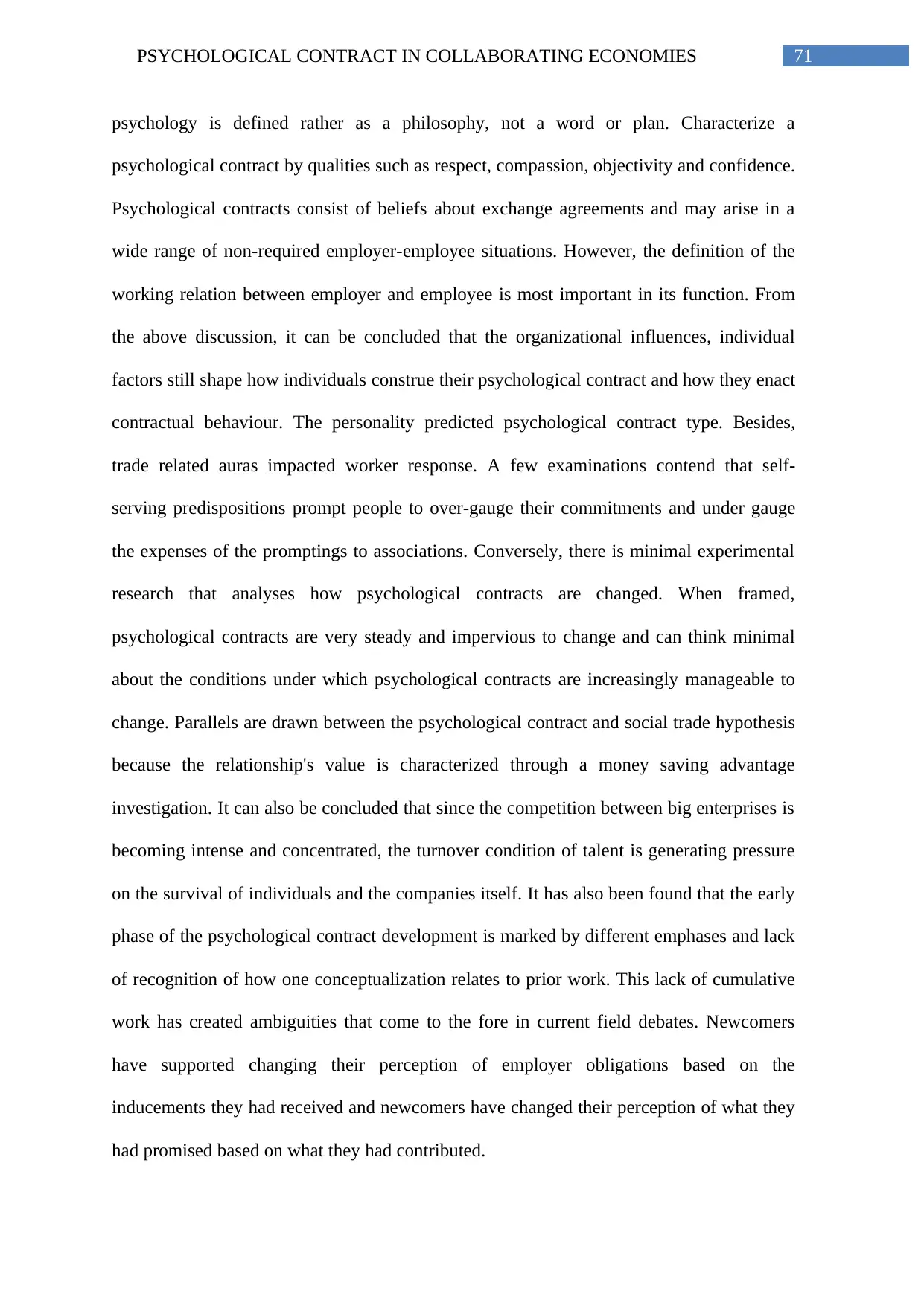
71PSYCHOLOGICAL CONTRACT IN COLLABORATING ECONOMIES
psychology is defined rather as a philosophy, not a word or plan. Characterize a
psychological contract by qualities such as respect, compassion, objectivity and confidence.
Psychological contracts consist of beliefs about exchange agreements and may arise in a
wide range of non-required employer-employee situations. However, the definition of the
working relation between employer and employee is most important in its function. From
the above discussion, it can be concluded that the organizational influences, individual
factors still shape how individuals construe their psychological contract and how they enact
contractual behaviour. The personality predicted psychological contract type. Besides,
trade related auras impacted worker response. A few examinations contend that self-
serving predispositions prompt people to over-gauge their commitments and under gauge
the expenses of the promptings to associations. Conversely, there is minimal experimental
research that analyses how psychological contracts are changed. When framed,
psychological contracts are very steady and impervious to change and can think minimal
about the conditions under which psychological contracts are increasingly manageable to
change. Parallels are drawn between the psychological contract and social trade hypothesis
because the relationship's value is characterized through a money saving advantage
investigation. It can also be concluded that since the competition between big enterprises is
becoming intense and concentrated, the turnover condition of talent is generating pressure
on the survival of individuals and the companies itself. It has also been found that the early
phase of the psychological contract development is marked by different emphases and lack
of recognition of how one conceptualization relates to prior work. This lack of cumulative
work has created ambiguities that come to the fore in current field debates. Newcomers
have supported changing their perception of employer obligations based on the
inducements they had received and newcomers have changed their perception of what they
had promised based on what they had contributed.
psychology is defined rather as a philosophy, not a word or plan. Characterize a
psychological contract by qualities such as respect, compassion, objectivity and confidence.
Psychological contracts consist of beliefs about exchange agreements and may arise in a
wide range of non-required employer-employee situations. However, the definition of the
working relation between employer and employee is most important in its function. From
the above discussion, it can be concluded that the organizational influences, individual
factors still shape how individuals construe their psychological contract and how they enact
contractual behaviour. The personality predicted psychological contract type. Besides,
trade related auras impacted worker response. A few examinations contend that self-
serving predispositions prompt people to over-gauge their commitments and under gauge
the expenses of the promptings to associations. Conversely, there is minimal experimental
research that analyses how psychological contracts are changed. When framed,
psychological contracts are very steady and impervious to change and can think minimal
about the conditions under which psychological contracts are increasingly manageable to
change. Parallels are drawn between the psychological contract and social trade hypothesis
because the relationship's value is characterized through a money saving advantage
investigation. It can also be concluded that since the competition between big enterprises is
becoming intense and concentrated, the turnover condition of talent is generating pressure
on the survival of individuals and the companies itself. It has also been found that the early
phase of the psychological contract development is marked by different emphases and lack
of recognition of how one conceptualization relates to prior work. This lack of cumulative
work has created ambiguities that come to the fore in current field debates. Newcomers
have supported changing their perception of employer obligations based on the
inducements they had received and newcomers have changed their perception of what they
had promised based on what they had contributed.
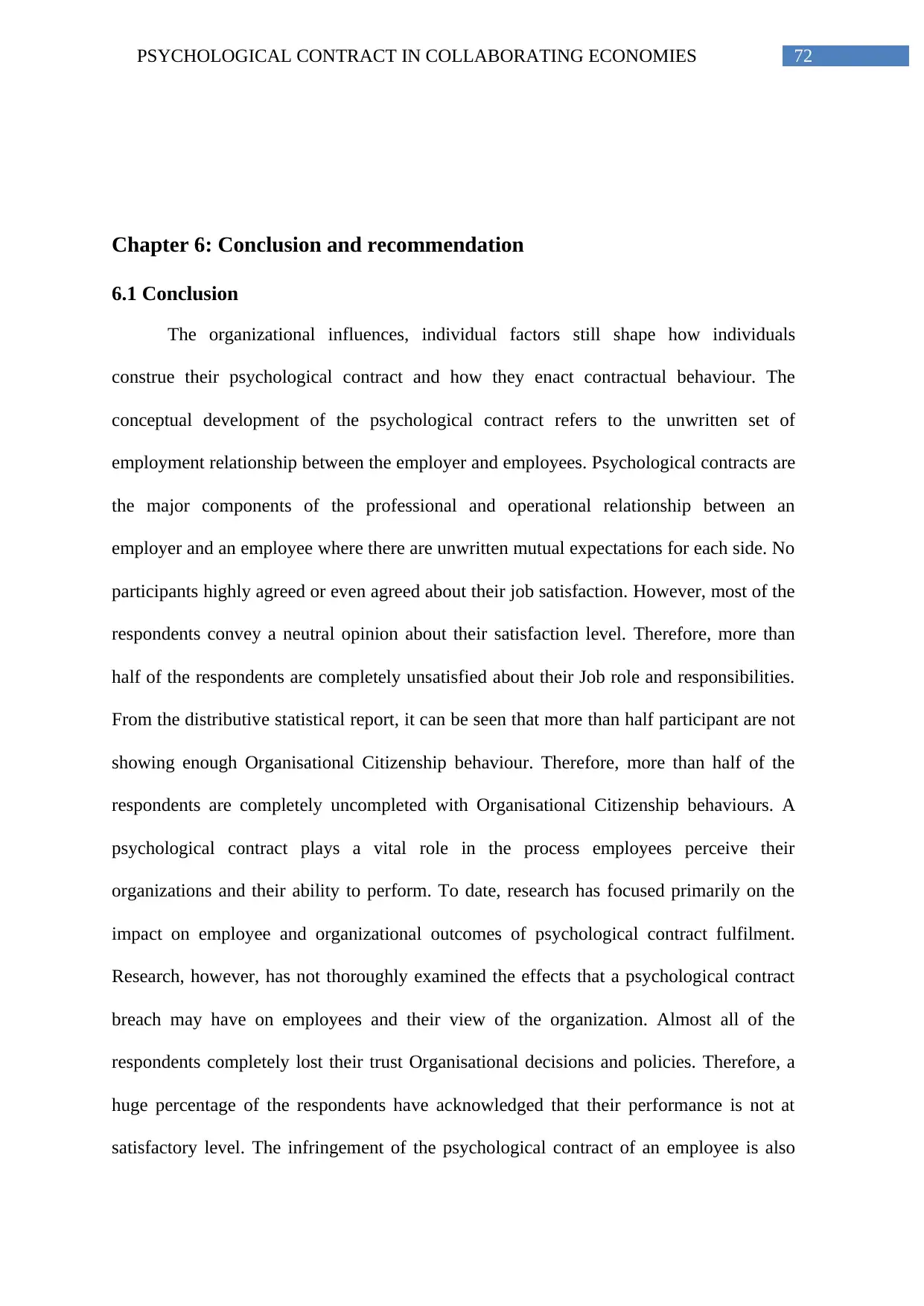
72PSYCHOLOGICAL CONTRACT IN COLLABORATING ECONOMIES
Chapter 6: Conclusion and recommendation
6.1 Conclusion
The organizational influences, individual factors still shape how individuals
construe their psychological contract and how they enact contractual behaviour. The
conceptual development of the psychological contract refers to the unwritten set of
employment relationship between the employer and employees. Psychological contracts are
the major components of the professional and operational relationship between an
employer and an employee where there are unwritten mutual expectations for each side. No
participants highly agreed or even agreed about their job satisfaction. However, most of the
respondents convey a neutral opinion about their satisfaction level. Therefore, more than
half of the respondents are completely unsatisfied about their Job role and responsibilities.
From the distributive statistical report, it can be seen that more than half participant are not
showing enough Organisational Citizenship behaviour. Therefore, more than half of the
respondents are completely uncompleted with Organisational Citizenship behaviours. A
psychological contract plays a vital role in the process employees perceive their
organizations and their ability to perform. To date, research has focused primarily on the
impact on employee and organizational outcomes of psychological contract fulfilment.
Research, however, has not thoroughly examined the effects that a psychological contract
breach may have on employees and their view of the organization. Almost all of the
respondents completely lost their trust Organisational decisions and policies. Therefore, a
huge percentage of the respondents have acknowledged that their performance is not at
satisfactory level. The infringement of the psychological contract of an employee is also
Chapter 6: Conclusion and recommendation
6.1 Conclusion
The organizational influences, individual factors still shape how individuals
construe their psychological contract and how they enact contractual behaviour. The
conceptual development of the psychological contract refers to the unwritten set of
employment relationship between the employer and employees. Psychological contracts are
the major components of the professional and operational relationship between an
employer and an employee where there are unwritten mutual expectations for each side. No
participants highly agreed or even agreed about their job satisfaction. However, most of the
respondents convey a neutral opinion about their satisfaction level. Therefore, more than
half of the respondents are completely unsatisfied about their Job role and responsibilities.
From the distributive statistical report, it can be seen that more than half participant are not
showing enough Organisational Citizenship behaviour. Therefore, more than half of the
respondents are completely uncompleted with Organisational Citizenship behaviours. A
psychological contract plays a vital role in the process employees perceive their
organizations and their ability to perform. To date, research has focused primarily on the
impact on employee and organizational outcomes of psychological contract fulfilment.
Research, however, has not thoroughly examined the effects that a psychological contract
breach may have on employees and their view of the organization. Almost all of the
respondents completely lost their trust Organisational decisions and policies. Therefore, a
huge percentage of the respondents have acknowledged that their performance is not at
satisfactory level. The infringement of the psychological contract of an employee is also
Paraphrase This Document
Need a fresh take? Get an instant paraphrase of this document with our AI Paraphraser
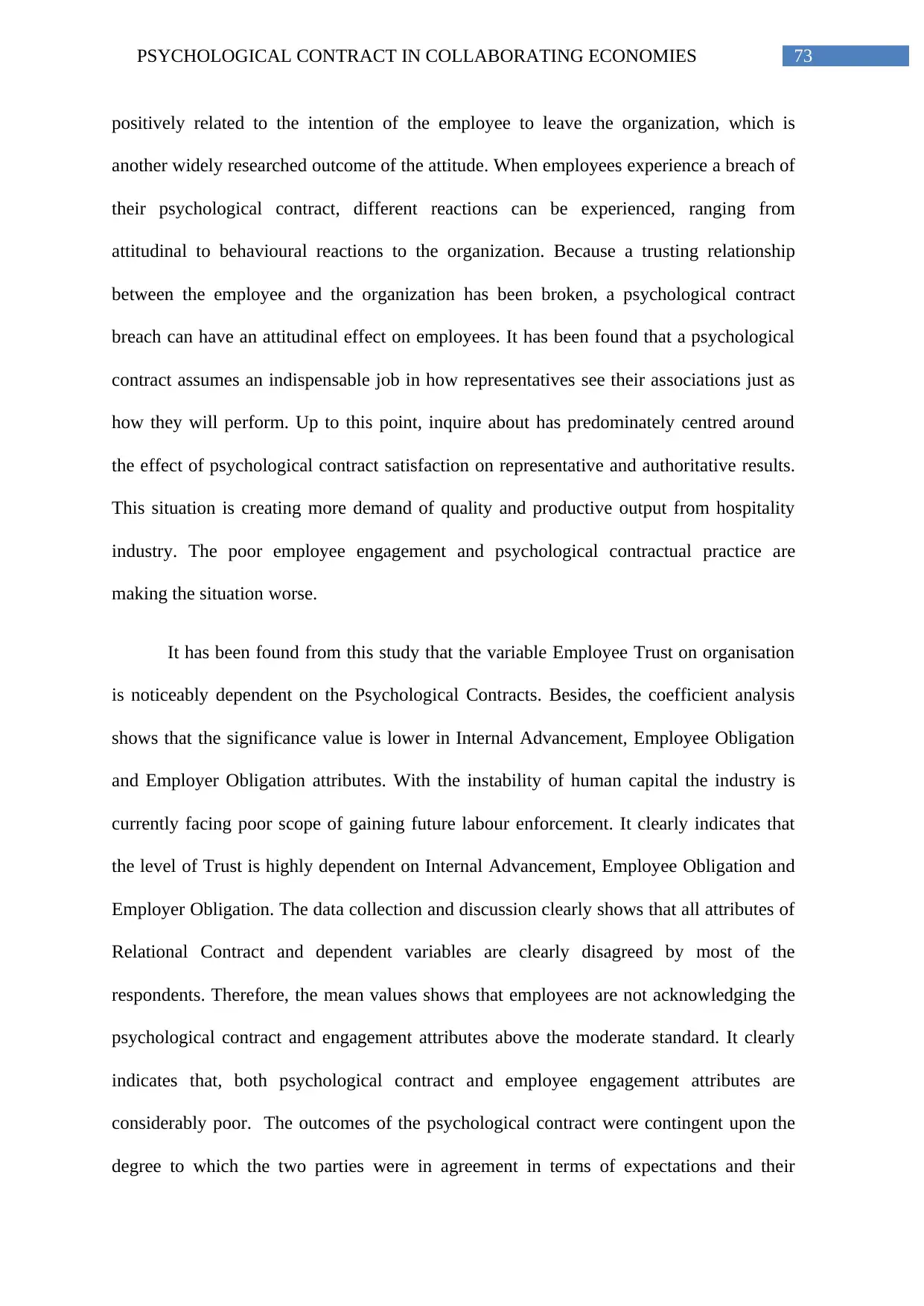
73PSYCHOLOGICAL CONTRACT IN COLLABORATING ECONOMIES
positively related to the intention of the employee to leave the organization, which is
another widely researched outcome of the attitude. When employees experience a breach of
their psychological contract, different reactions can be experienced, ranging from
attitudinal to behavioural reactions to the organization. Because a trusting relationship
between the employee and the organization has been broken, a psychological contract
breach can have an attitudinal effect on employees. It has been found that a psychological
contract assumes an indispensable job in how representatives see their associations just as
how they will perform. Up to this point, inquire about has predominately centred around
the effect of psychological contract satisfaction on representative and authoritative results.
This situation is creating more demand of quality and productive output from hospitality
industry. The poor employee engagement and psychological contractual practice are
making the situation worse.
It has been found from this study that the variable Employee Trust on organisation
is noticeably dependent on the Psychological Contracts. Besides, the coefficient analysis
shows that the significance value is lower in Internal Advancement, Employee Obligation
and Employer Obligation attributes. With the instability of human capital the industry is
currently facing poor scope of gaining future labour enforcement. It clearly indicates that
the level of Trust is highly dependent on Internal Advancement, Employee Obligation and
Employer Obligation. The data collection and discussion clearly shows that all attributes of
Relational Contract and dependent variables are clearly disagreed by most of the
respondents. Therefore, the mean values shows that employees are not acknowledging the
psychological contract and engagement attributes above the moderate standard. It clearly
indicates that, both psychological contract and employee engagement attributes are
considerably poor. The outcomes of the psychological contract were contingent upon the
degree to which the two parties were in agreement in terms of expectations and their
positively related to the intention of the employee to leave the organization, which is
another widely researched outcome of the attitude. When employees experience a breach of
their psychological contract, different reactions can be experienced, ranging from
attitudinal to behavioural reactions to the organization. Because a trusting relationship
between the employee and the organization has been broken, a psychological contract
breach can have an attitudinal effect on employees. It has been found that a psychological
contract assumes an indispensable job in how representatives see their associations just as
how they will perform. Up to this point, inquire about has predominately centred around
the effect of psychological contract satisfaction on representative and authoritative results.
This situation is creating more demand of quality and productive output from hospitality
industry. The poor employee engagement and psychological contractual practice are
making the situation worse.
It has been found from this study that the variable Employee Trust on organisation
is noticeably dependent on the Psychological Contracts. Besides, the coefficient analysis
shows that the significance value is lower in Internal Advancement, Employee Obligation
and Employer Obligation attributes. With the instability of human capital the industry is
currently facing poor scope of gaining future labour enforcement. It clearly indicates that
the level of Trust is highly dependent on Internal Advancement, Employee Obligation and
Employer Obligation. The data collection and discussion clearly shows that all attributes of
Relational Contract and dependent variables are clearly disagreed by most of the
respondents. Therefore, the mean values shows that employees are not acknowledging the
psychological contract and engagement attributes above the moderate standard. It clearly
indicates that, both psychological contract and employee engagement attributes are
considerably poor. The outcomes of the psychological contract were contingent upon the
degree to which the two parties were in agreement in terms of expectations and their
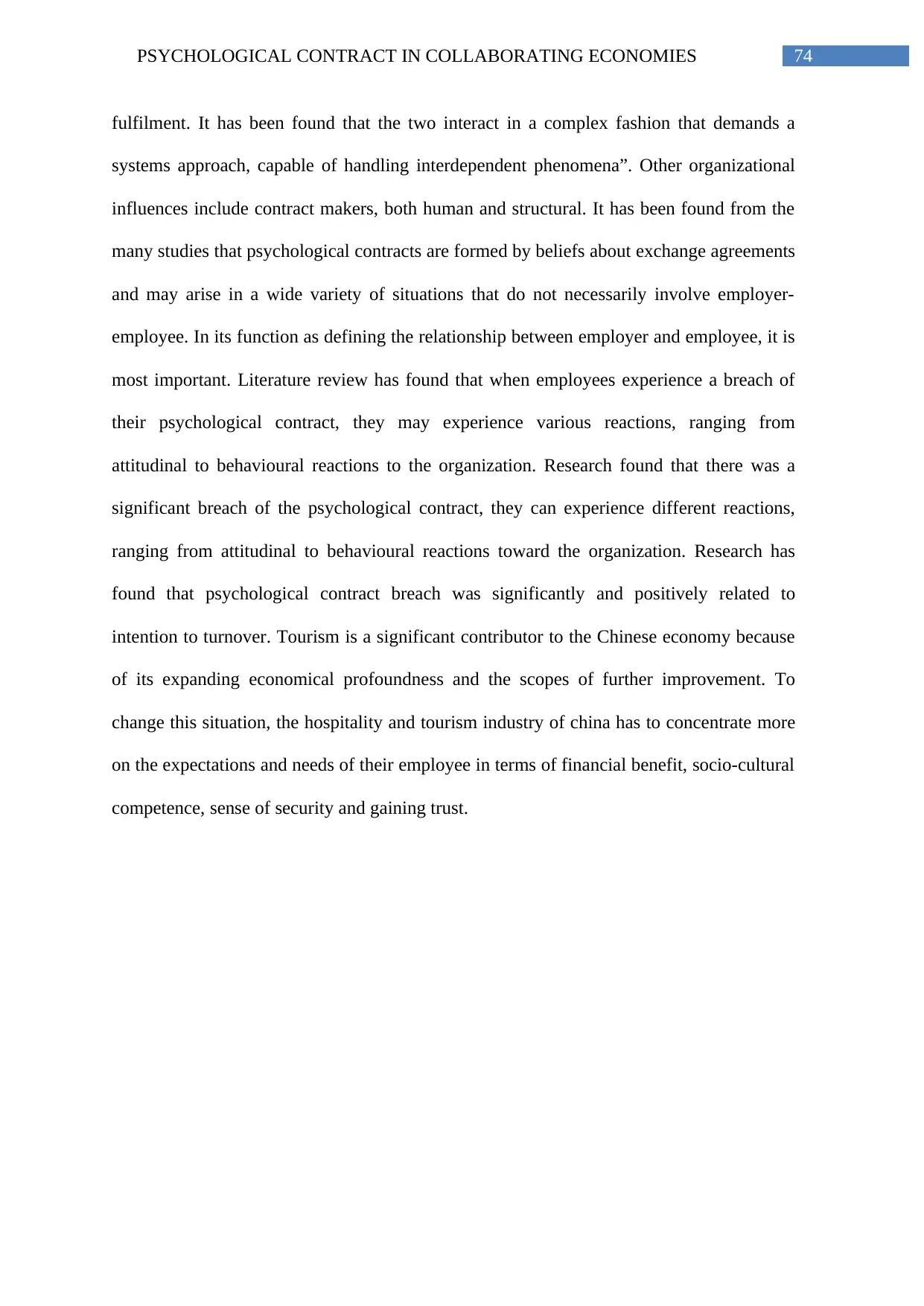
74PSYCHOLOGICAL CONTRACT IN COLLABORATING ECONOMIES
fulfilment. It has been found that the two interact in a complex fashion that demands a
systems approach, capable of handling interdependent phenomena”. Other organizational
influences include contract makers, both human and structural. It has been found from the
many studies that psychological contracts are formed by beliefs about exchange agreements
and may arise in a wide variety of situations that do not necessarily involve employer-
employee. In its function as defining the relationship between employer and employee, it is
most important. Literature review has found that when employees experience a breach of
their psychological contract, they may experience various reactions, ranging from
attitudinal to behavioural reactions to the organization. Research found that there was a
significant breach of the psychological contract, they can experience different reactions,
ranging from attitudinal to behavioural reactions toward the organization. Research has
found that psychological contract breach was significantly and positively related to
intention to turnover. Tourism is a significant contributor to the Chinese economy because
of its expanding economical profoundness and the scopes of further improvement. To
change this situation, the hospitality and tourism industry of china has to concentrate more
on the expectations and needs of their employee in terms of financial benefit, socio-cultural
competence, sense of security and gaining trust.
fulfilment. It has been found that the two interact in a complex fashion that demands a
systems approach, capable of handling interdependent phenomena”. Other organizational
influences include contract makers, both human and structural. It has been found from the
many studies that psychological contracts are formed by beliefs about exchange agreements
and may arise in a wide variety of situations that do not necessarily involve employer-
employee. In its function as defining the relationship between employer and employee, it is
most important. Literature review has found that when employees experience a breach of
their psychological contract, they may experience various reactions, ranging from
attitudinal to behavioural reactions to the organization. Research found that there was a
significant breach of the psychological contract, they can experience different reactions,
ranging from attitudinal to behavioural reactions toward the organization. Research has
found that psychological contract breach was significantly and positively related to
intention to turnover. Tourism is a significant contributor to the Chinese economy because
of its expanding economical profoundness and the scopes of further improvement. To
change this situation, the hospitality and tourism industry of china has to concentrate more
on the expectations and needs of their employee in terms of financial benefit, socio-cultural
competence, sense of security and gaining trust.
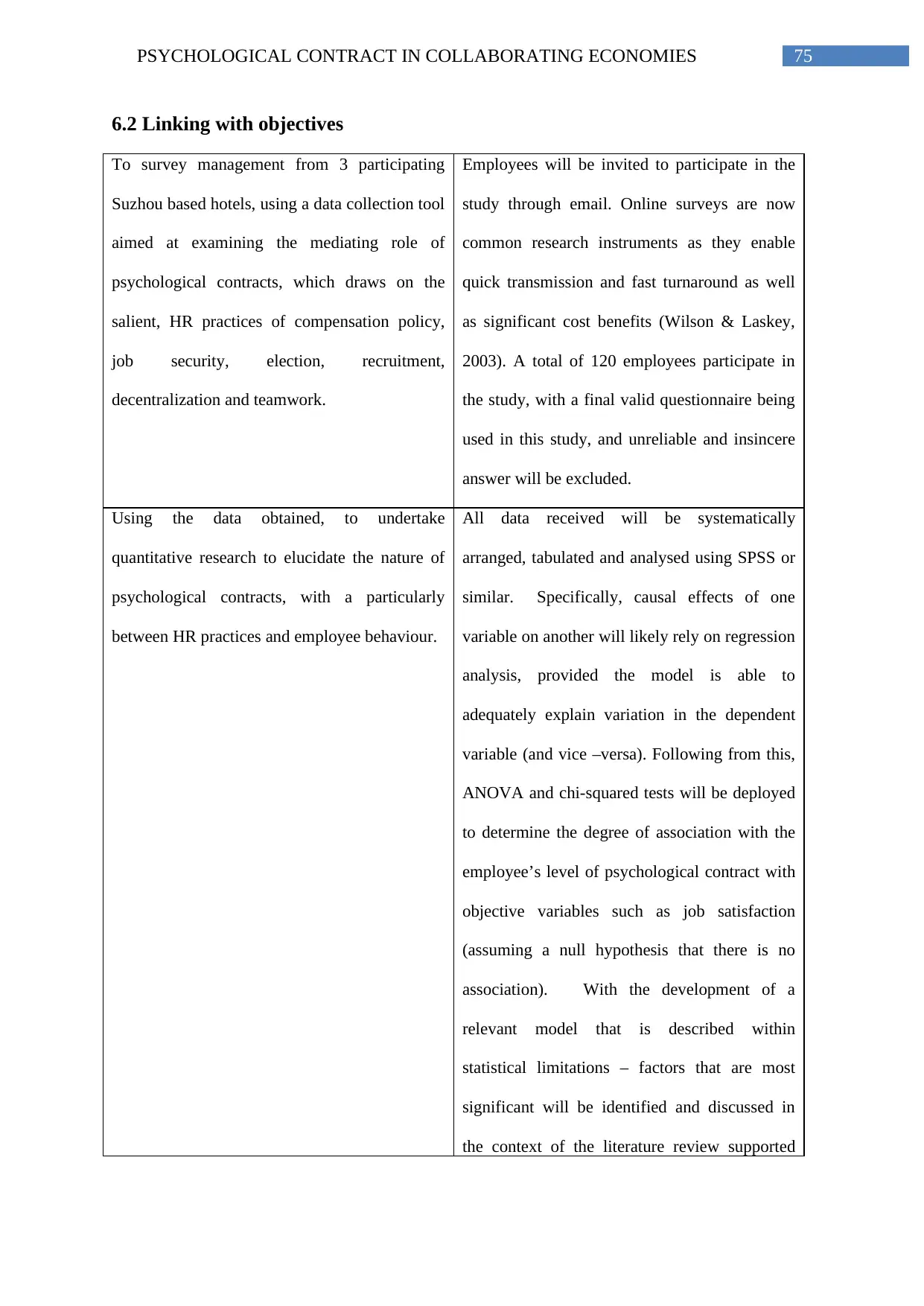
75PSYCHOLOGICAL CONTRACT IN COLLABORATING ECONOMIES
6.2 Linking with objectives
To survey management from 3 participating
Suzhou based hotels, using a data collection tool
aimed at examining the mediating role of
psychological contracts, which draws on the
salient, HR practices of compensation policy,
job security, election, recruitment,
decentralization and teamwork.
Employees will be invited to participate in the
study through email. Online surveys are now
common research instruments as they enable
quick transmission and fast turnaround as well
as significant cost benefits (Wilson & Laskey,
2003). A total of 120 employees participate in
the study, with a final valid questionnaire being
used in this study, and unreliable and insincere
answer will be excluded.
Using the data obtained, to undertake
quantitative research to elucidate the nature of
psychological contracts, with a particularly
between HR practices and employee behaviour.
All data received will be systematically
arranged, tabulated and analysed using SPSS or
similar. Specifically, causal effects of one
variable on another will likely rely on regression
analysis, provided the model is able to
adequately explain variation in the dependent
variable (and vice –versa). Following from this,
ANOVA and chi-squared tests will be deployed
to determine the degree of association with the
employee’s level of psychological contract with
objective variables such as job satisfaction
(assuming a null hypothesis that there is no
association). With the development of a
relevant model that is described within
statistical limitations – factors that are most
significant will be identified and discussed in
the context of the literature review supported
6.2 Linking with objectives
To survey management from 3 participating
Suzhou based hotels, using a data collection tool
aimed at examining the mediating role of
psychological contracts, which draws on the
salient, HR practices of compensation policy,
job security, election, recruitment,
decentralization and teamwork.
Employees will be invited to participate in the
study through email. Online surveys are now
common research instruments as they enable
quick transmission and fast turnaround as well
as significant cost benefits (Wilson & Laskey,
2003). A total of 120 employees participate in
the study, with a final valid questionnaire being
used in this study, and unreliable and insincere
answer will be excluded.
Using the data obtained, to undertake
quantitative research to elucidate the nature of
psychological contracts, with a particularly
between HR practices and employee behaviour.
All data received will be systematically
arranged, tabulated and analysed using SPSS or
similar. Specifically, causal effects of one
variable on another will likely rely on regression
analysis, provided the model is able to
adequately explain variation in the dependent
variable (and vice –versa). Following from this,
ANOVA and chi-squared tests will be deployed
to determine the degree of association with the
employee’s level of psychological contract with
objective variables such as job satisfaction
(assuming a null hypothesis that there is no
association). With the development of a
relevant model that is described within
statistical limitations – factors that are most
significant will be identified and discussed in
the context of the literature review supported
Secure Best Marks with AI Grader
Need help grading? Try our AI Grader for instant feedback on your assignments.
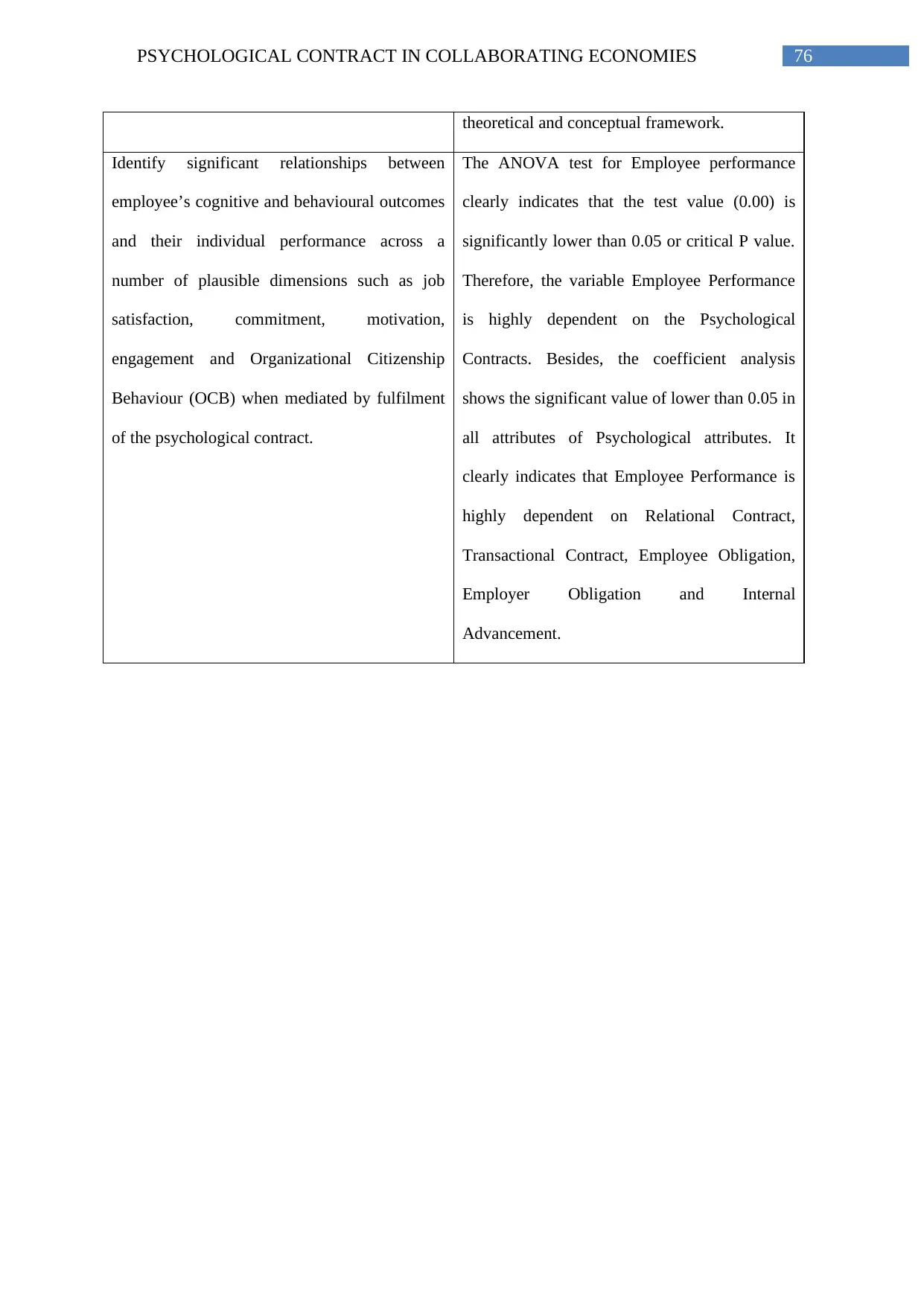
76PSYCHOLOGICAL CONTRACT IN COLLABORATING ECONOMIES
theoretical and conceptual framework.
Identify significant relationships between
employee’s cognitive and behavioural outcomes
and their individual performance across a
number of plausible dimensions such as job
satisfaction, commitment, motivation,
engagement and Organizational Citizenship
Behaviour (OCB) when mediated by fulfilment
of the psychological contract.
The ANOVA test for Employee performance
clearly indicates that the test value (0.00) is
significantly lower than 0.05 or critical P value.
Therefore, the variable Employee Performance
is highly dependent on the Psychological
Contracts. Besides, the coefficient analysis
shows the significant value of lower than 0.05 in
all attributes of Psychological attributes. It
clearly indicates that Employee Performance is
highly dependent on Relational Contract,
Transactional Contract, Employee Obligation,
Employer Obligation and Internal
Advancement.
theoretical and conceptual framework.
Identify significant relationships between
employee’s cognitive and behavioural outcomes
and their individual performance across a
number of plausible dimensions such as job
satisfaction, commitment, motivation,
engagement and Organizational Citizenship
Behaviour (OCB) when mediated by fulfilment
of the psychological contract.
The ANOVA test for Employee performance
clearly indicates that the test value (0.00) is
significantly lower than 0.05 or critical P value.
Therefore, the variable Employee Performance
is highly dependent on the Psychological
Contracts. Besides, the coefficient analysis
shows the significant value of lower than 0.05 in
all attributes of Psychological attributes. It
clearly indicates that Employee Performance is
highly dependent on Relational Contract,
Transactional Contract, Employee Obligation,
Employer Obligation and Internal
Advancement.
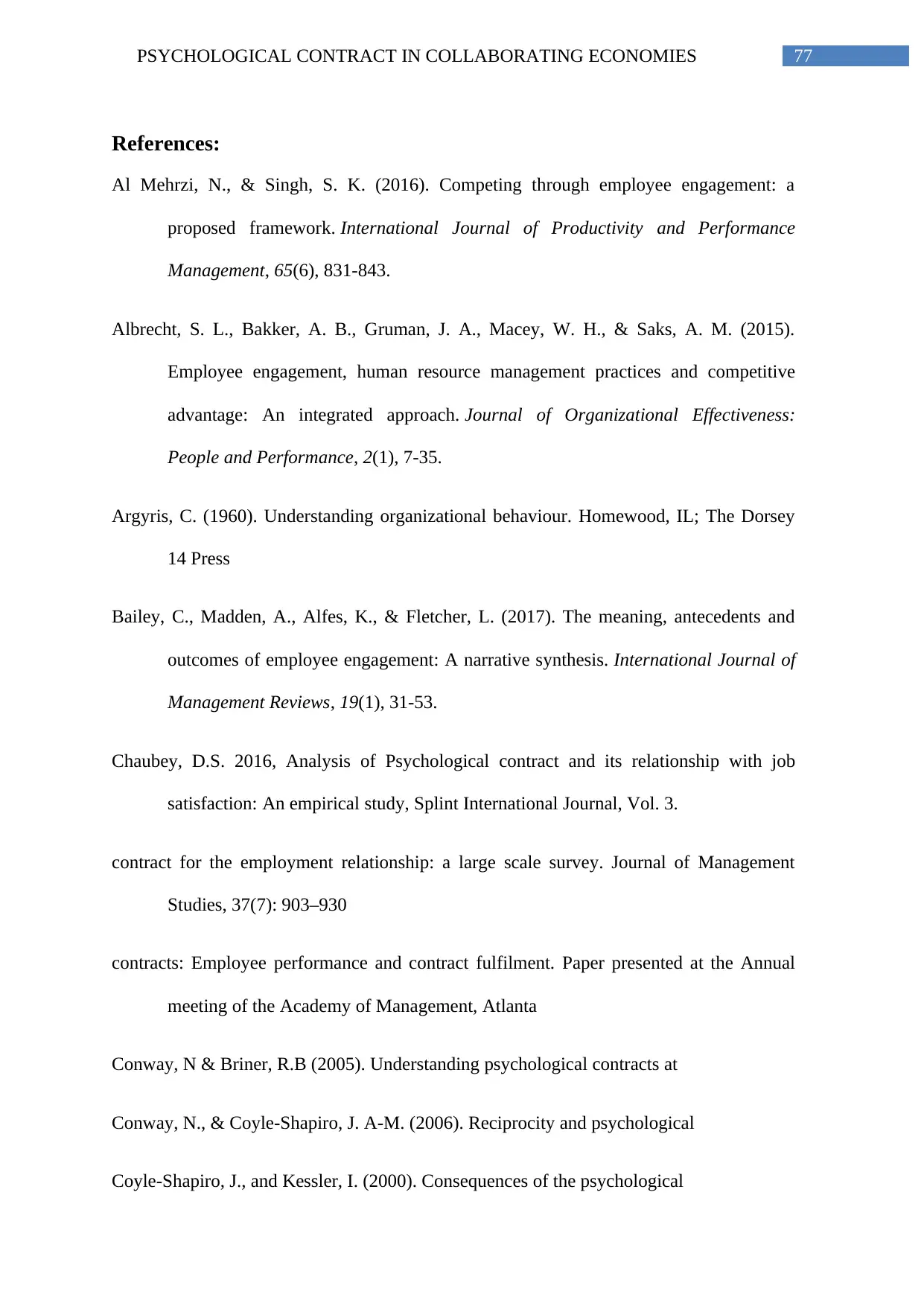
77PSYCHOLOGICAL CONTRACT IN COLLABORATING ECONOMIES
References:
Al Mehrzi, N., & Singh, S. K. (2016). Competing through employee engagement: a
proposed framework. International Journal of Productivity and Performance
Management, 65(6), 831-843.
Albrecht, S. L., Bakker, A. B., Gruman, J. A., Macey, W. H., & Saks, A. M. (2015).
Employee engagement, human resource management practices and competitive
advantage: An integrated approach. Journal of Organizational Effectiveness:
People and Performance, 2(1), 7-35.
Argyris, C. (1960). Understanding organizational behaviour. Homewood, IL; The Dorsey
14 Press
Bailey, C., Madden, A., Alfes, K., & Fletcher, L. (2017). The meaning, antecedents and
outcomes of employee engagement: A narrative synthesis. International Journal of
Management Reviews, 19(1), 31-53.
Chaubey, D.S. 2016, Analysis of Psychological contract and its relationship with job
satisfaction: An empirical study, Splint International Journal, Vol. 3.
contract for the employment relationship: a large scale survey. Journal of Management
Studies, 37(7): 903–930
contracts: Employee performance and contract fulfilment. Paper presented at the Annual
meeting of the Academy of Management, Atlanta
Conway, N & Briner, R.B (2005). Understanding psychological contracts at
Conway, N., & Coyle-Shapiro, J. A-M. (2006). Reciprocity and psychological
Coyle-Shapiro, J., and Kessler, I. (2000). Consequences of the psychological
References:
Al Mehrzi, N., & Singh, S. K. (2016). Competing through employee engagement: a
proposed framework. International Journal of Productivity and Performance
Management, 65(6), 831-843.
Albrecht, S. L., Bakker, A. B., Gruman, J. A., Macey, W. H., & Saks, A. M. (2015).
Employee engagement, human resource management practices and competitive
advantage: An integrated approach. Journal of Organizational Effectiveness:
People and Performance, 2(1), 7-35.
Argyris, C. (1960). Understanding organizational behaviour. Homewood, IL; The Dorsey
14 Press
Bailey, C., Madden, A., Alfes, K., & Fletcher, L. (2017). The meaning, antecedents and
outcomes of employee engagement: A narrative synthesis. International Journal of
Management Reviews, 19(1), 31-53.
Chaubey, D.S. 2016, Analysis of Psychological contract and its relationship with job
satisfaction: An empirical study, Splint International Journal, Vol. 3.
contract for the employment relationship: a large scale survey. Journal of Management
Studies, 37(7): 903–930
contracts: Employee performance and contract fulfilment. Paper presented at the Annual
meeting of the Academy of Management, Atlanta
Conway, N & Briner, R.B (2005). Understanding psychological contracts at
Conway, N., & Coyle-Shapiro, J. A-M. (2006). Reciprocity and psychological
Coyle-Shapiro, J., and Kessler, I. (2000). Consequences of the psychological
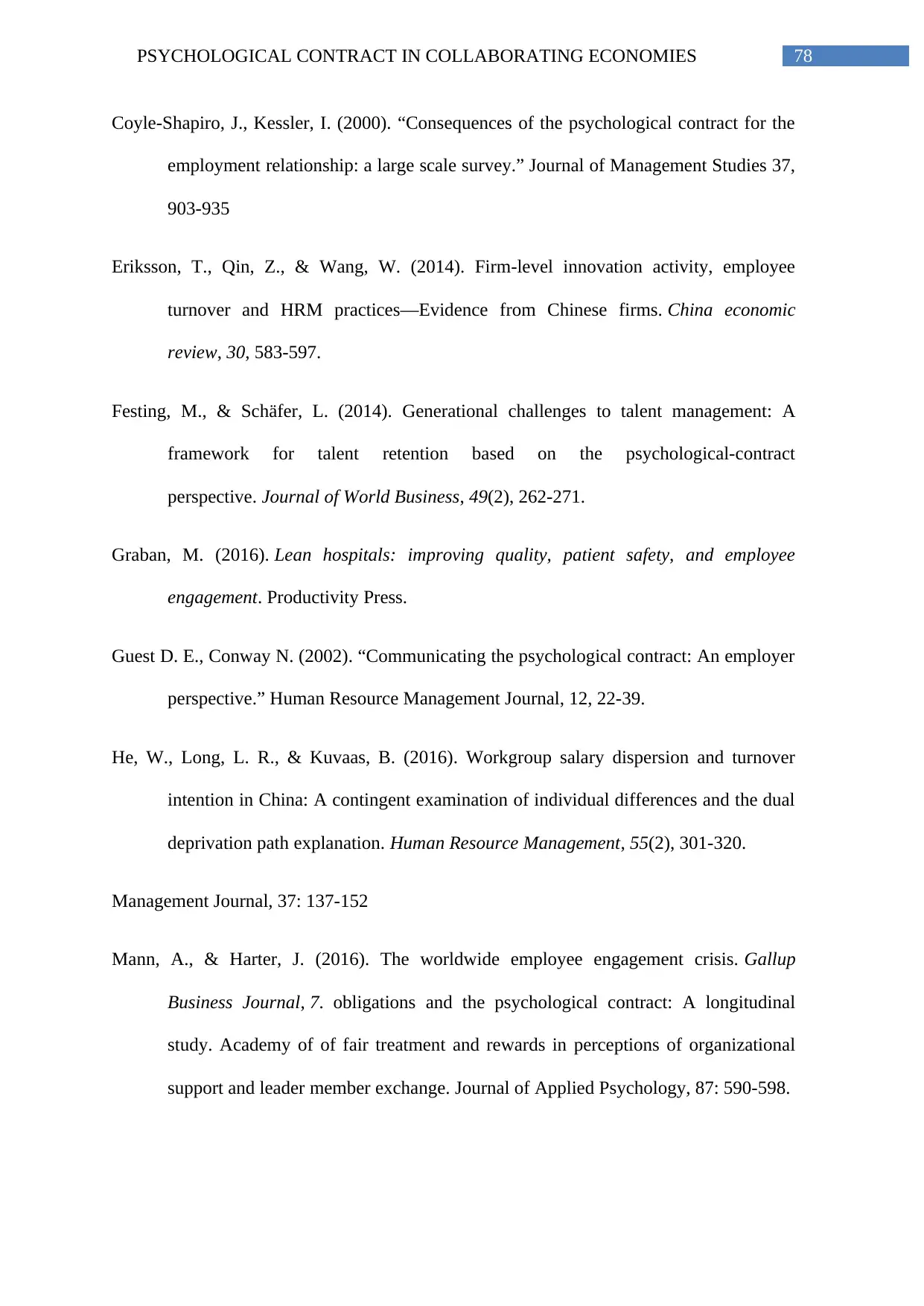
78PSYCHOLOGICAL CONTRACT IN COLLABORATING ECONOMIES
Coyle-Shapiro, J., Kessler, I. (2000). “Consequences of the psychological contract for the
employment relationship: a large scale survey.” Journal of Management Studies 37,
903-935
Eriksson, T., Qin, Z., & Wang, W. (2014). Firm-level innovation activity, employee
turnover and HRM practices—Evidence from Chinese firms. China economic
review, 30, 583-597.
Festing, M., & Schäfer, L. (2014). Generational challenges to talent management: A
framework for talent retention based on the psychological-contract
perspective. Journal of World Business, 49(2), 262-271.
Graban, M. (2016). Lean hospitals: improving quality, patient safety, and employee
engagement. Productivity Press.
Guest D. E., Conway N. (2002). “Communicating the psychological contract: An employer
perspective.” Human Resource Management Journal, 12, 22-39.
He, W., Long, L. R., & Kuvaas, B. (2016). Workgroup salary dispersion and turnover
intention in China: A contingent examination of individual differences and the dual
deprivation path explanation. Human Resource Management, 55(2), 301-320.
Management Journal, 37: 137-152
Mann, A., & Harter, J. (2016). The worldwide employee engagement crisis. Gallup
Business Journal, 7. obligations and the psychological contract: A longitudinal
study. Academy of of fair treatment and rewards in perceptions of organizational
support and leader member exchange. Journal of Applied Psychology, 87: 590-598.
Coyle-Shapiro, J., Kessler, I. (2000). “Consequences of the psychological contract for the
employment relationship: a large scale survey.” Journal of Management Studies 37,
903-935
Eriksson, T., Qin, Z., & Wang, W. (2014). Firm-level innovation activity, employee
turnover and HRM practices—Evidence from Chinese firms. China economic
review, 30, 583-597.
Festing, M., & Schäfer, L. (2014). Generational challenges to talent management: A
framework for talent retention based on the psychological-contract
perspective. Journal of World Business, 49(2), 262-271.
Graban, M. (2016). Lean hospitals: improving quality, patient safety, and employee
engagement. Productivity Press.
Guest D. E., Conway N. (2002). “Communicating the psychological contract: An employer
perspective.” Human Resource Management Journal, 12, 22-39.
He, W., Long, L. R., & Kuvaas, B. (2016). Workgroup salary dispersion and turnover
intention in China: A contingent examination of individual differences and the dual
deprivation path explanation. Human Resource Management, 55(2), 301-320.
Management Journal, 37: 137-152
Mann, A., & Harter, J. (2016). The worldwide employee engagement crisis. Gallup
Business Journal, 7. obligations and the psychological contract: A longitudinal
study. Academy of of fair treatment and rewards in perceptions of organizational
support and leader member exchange. Journal of Applied Psychology, 87: 590-598.
Paraphrase This Document
Need a fresh take? Get an instant paraphrase of this document with our AI Paraphraser
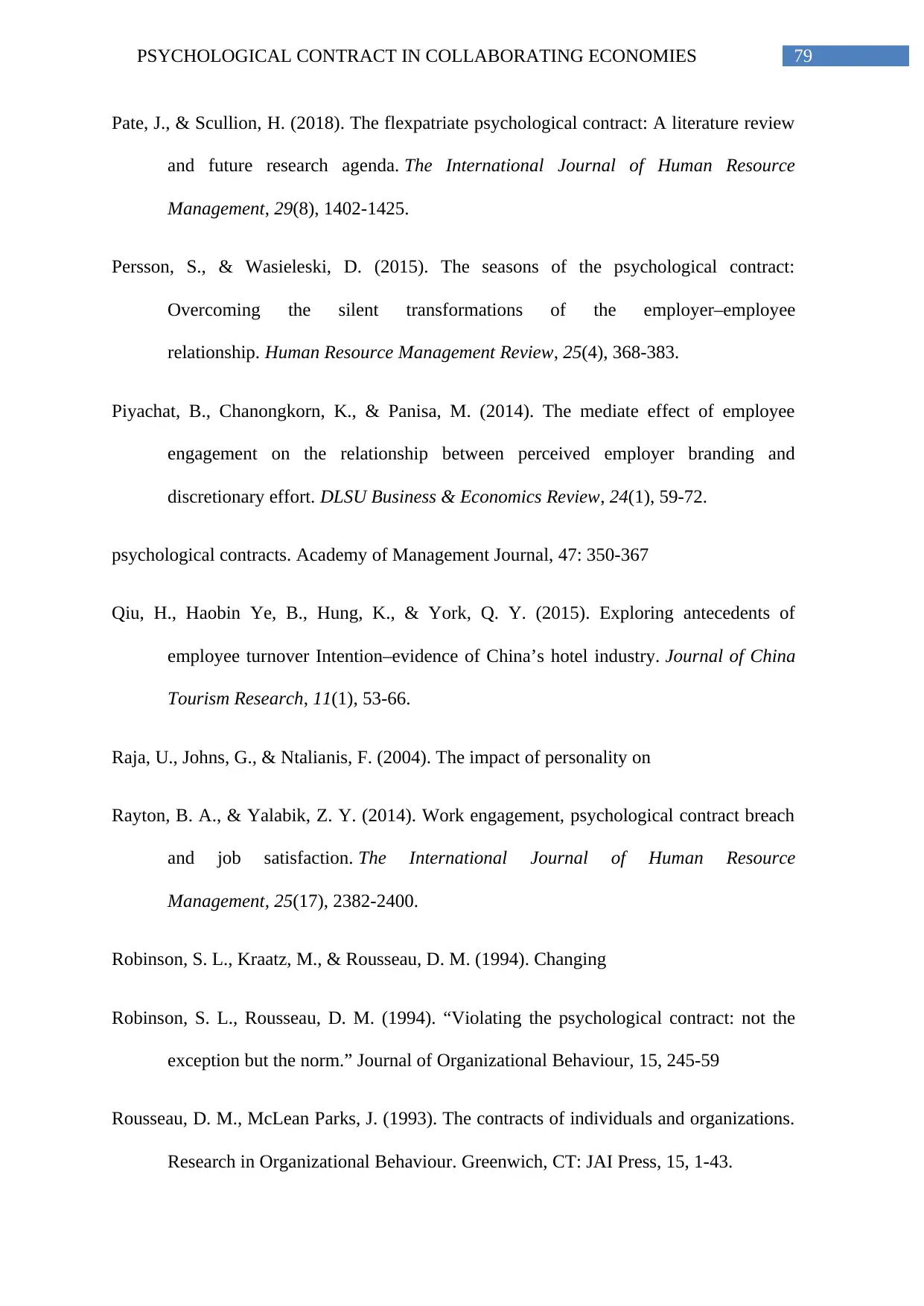
79PSYCHOLOGICAL CONTRACT IN COLLABORATING ECONOMIES
Pate, J., & Scullion, H. (2018). The flexpatriate psychological contract: A literature review
and future research agenda. The International Journal of Human Resource
Management, 29(8), 1402-1425.
Persson, S., & Wasieleski, D. (2015). The seasons of the psychological contract:
Overcoming the silent transformations of the employer–employee
relationship. Human Resource Management Review, 25(4), 368-383.
Piyachat, B., Chanongkorn, K., & Panisa, M. (2014). The mediate effect of employee
engagement on the relationship between perceived employer branding and
discretionary effort. DLSU Business & Economics Review, 24(1), 59-72.
psychological contracts. Academy of Management Journal, 47: 350-367
Qiu, H., Haobin Ye, B., Hung, K., & York, Q. Y. (2015). Exploring antecedents of
employee turnover Intention–evidence of China’s hotel industry. Journal of China
Tourism Research, 11(1), 53-66.
Raja, U., Johns, G., & Ntalianis, F. (2004). The impact of personality on
Rayton, B. A., & Yalabik, Z. Y. (2014). Work engagement, psychological contract breach
and job satisfaction. The International Journal of Human Resource
Management, 25(17), 2382-2400.
Robinson, S. L., Kraatz, M., & Rousseau, D. M. (1994). Changing
Robinson, S. L., Rousseau, D. M. (1994). “Violating the psychological contract: not the
exception but the norm.” Journal of Organizational Behaviour, 15, 245-59
Rousseau, D. M., McLean Parks, J. (1993). The contracts of individuals and organizations.
Research in Organizational Behaviour. Greenwich, CT: JAI Press, 15, 1-43.
Pate, J., & Scullion, H. (2018). The flexpatriate psychological contract: A literature review
and future research agenda. The International Journal of Human Resource
Management, 29(8), 1402-1425.
Persson, S., & Wasieleski, D. (2015). The seasons of the psychological contract:
Overcoming the silent transformations of the employer–employee
relationship. Human Resource Management Review, 25(4), 368-383.
Piyachat, B., Chanongkorn, K., & Panisa, M. (2014). The mediate effect of employee
engagement on the relationship between perceived employer branding and
discretionary effort. DLSU Business & Economics Review, 24(1), 59-72.
psychological contracts. Academy of Management Journal, 47: 350-367
Qiu, H., Haobin Ye, B., Hung, K., & York, Q. Y. (2015). Exploring antecedents of
employee turnover Intention–evidence of China’s hotel industry. Journal of China
Tourism Research, 11(1), 53-66.
Raja, U., Johns, G., & Ntalianis, F. (2004). The impact of personality on
Rayton, B. A., & Yalabik, Z. Y. (2014). Work engagement, psychological contract breach
and job satisfaction. The International Journal of Human Resource
Management, 25(17), 2382-2400.
Robinson, S. L., Kraatz, M., & Rousseau, D. M. (1994). Changing
Robinson, S. L., Rousseau, D. M. (1994). “Violating the psychological contract: not the
exception but the norm.” Journal of Organizational Behaviour, 15, 245-59
Rousseau, D. M., McLean Parks, J. (1993). The contracts of individuals and organizations.
Research in Organizational Behaviour. Greenwich, CT: JAI Press, 15, 1-43.
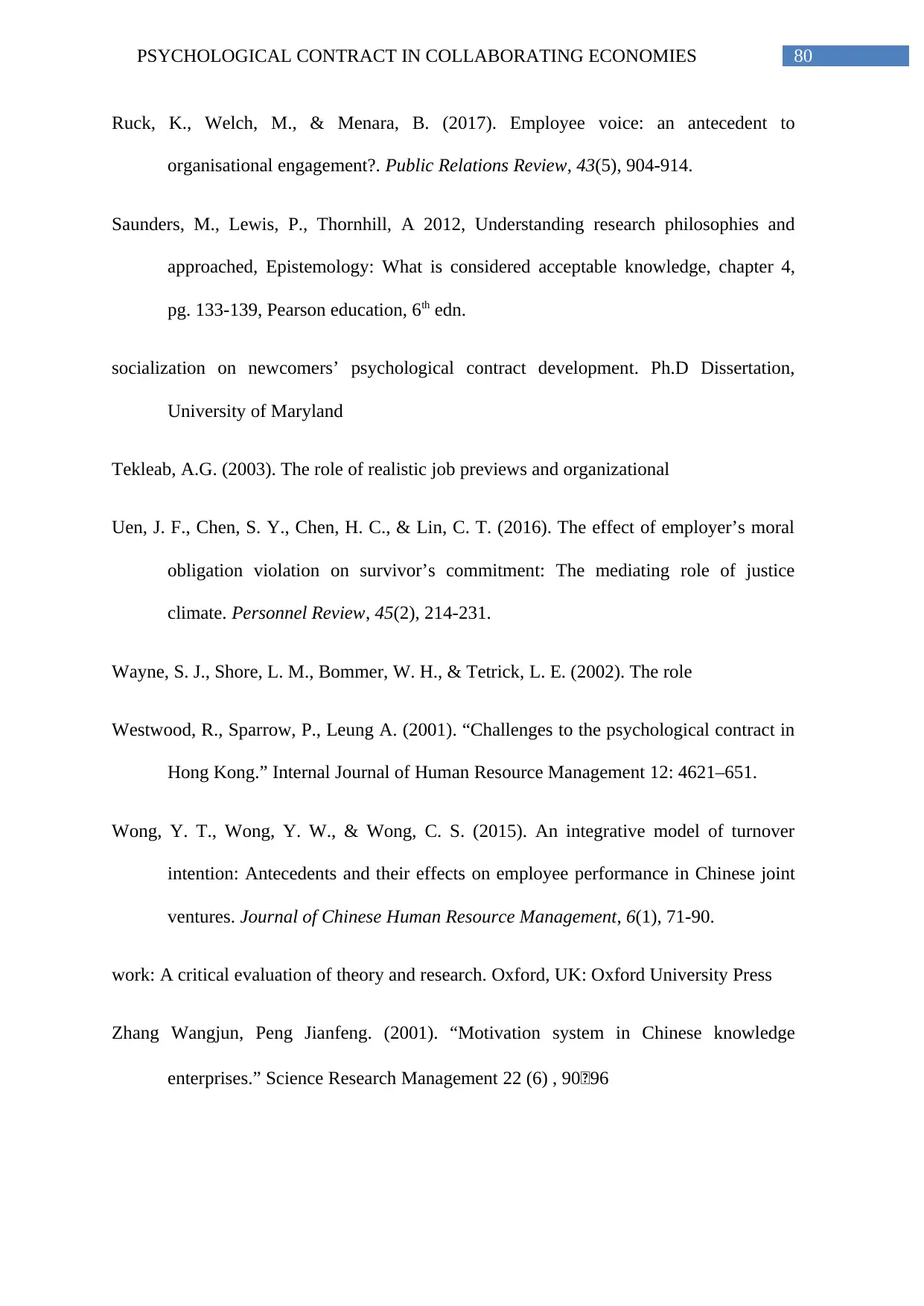
80PSYCHOLOGICAL CONTRACT IN COLLABORATING ECONOMIES
Ruck, K., Welch, M., & Menara, B. (2017). Employee voice: an antecedent to
organisational engagement?. Public Relations Review, 43(5), 904-914.
Saunders, M., Lewis, P., Thornhill, A 2012, Understanding research philosophies and
approached, Epistemology: What is considered acceptable knowledge, chapter 4,
pg. 133-139, Pearson education, 6th edn.
socialization on newcomers’ psychological contract development. Ph.D Dissertation,
University of Maryland
Tekleab, A.G. (2003). The role of realistic job previews and organizational
Uen, J. F., Chen, S. Y., Chen, H. C., & Lin, C. T. (2016). The effect of employer’s moral
obligation violation on survivor’s commitment: The mediating role of justice
climate. Personnel Review, 45(2), 214-231.
Wayne, S. J., Shore, L. M., Bommer, W. H., & Tetrick, L. E. (2002). The role
Westwood, R., Sparrow, P., Leung A. (2001). “Challenges to the psychological contract in
Hong Kong.” Internal Journal of Human Resource Management 12: 4621–651.
Wong, Y. T., Wong, Y. W., & Wong, C. S. (2015). An integrative model of turnover
intention: Antecedents and their effects on employee performance in Chinese joint
ventures. Journal of Chinese Human Resource Management, 6(1), 71-90.
work: A critical evaluation of theory and research. Oxford, UK: Oxford University Press
Zhang Wangjun, Peng Jianfeng. (2001). “Motivation system in Chinese knowledge
enterprises.” Science Research Management 22 (6) , 90-96
Ruck, K., Welch, M., & Menara, B. (2017). Employee voice: an antecedent to
organisational engagement?. Public Relations Review, 43(5), 904-914.
Saunders, M., Lewis, P., Thornhill, A 2012, Understanding research philosophies and
approached, Epistemology: What is considered acceptable knowledge, chapter 4,
pg. 133-139, Pearson education, 6th edn.
socialization on newcomers’ psychological contract development. Ph.D Dissertation,
University of Maryland
Tekleab, A.G. (2003). The role of realistic job previews and organizational
Uen, J. F., Chen, S. Y., Chen, H. C., & Lin, C. T. (2016). The effect of employer’s moral
obligation violation on survivor’s commitment: The mediating role of justice
climate. Personnel Review, 45(2), 214-231.
Wayne, S. J., Shore, L. M., Bommer, W. H., & Tetrick, L. E. (2002). The role
Westwood, R., Sparrow, P., Leung A. (2001). “Challenges to the psychological contract in
Hong Kong.” Internal Journal of Human Resource Management 12: 4621–651.
Wong, Y. T., Wong, Y. W., & Wong, C. S. (2015). An integrative model of turnover
intention: Antecedents and their effects on employee performance in Chinese joint
ventures. Journal of Chinese Human Resource Management, 6(1), 71-90.
work: A critical evaluation of theory and research. Oxford, UK: Oxford University Press
Zhang Wangjun, Peng Jianfeng. (2001). “Motivation system in Chinese knowledge
enterprises.” Science Research Management 22 (6) , 90-96
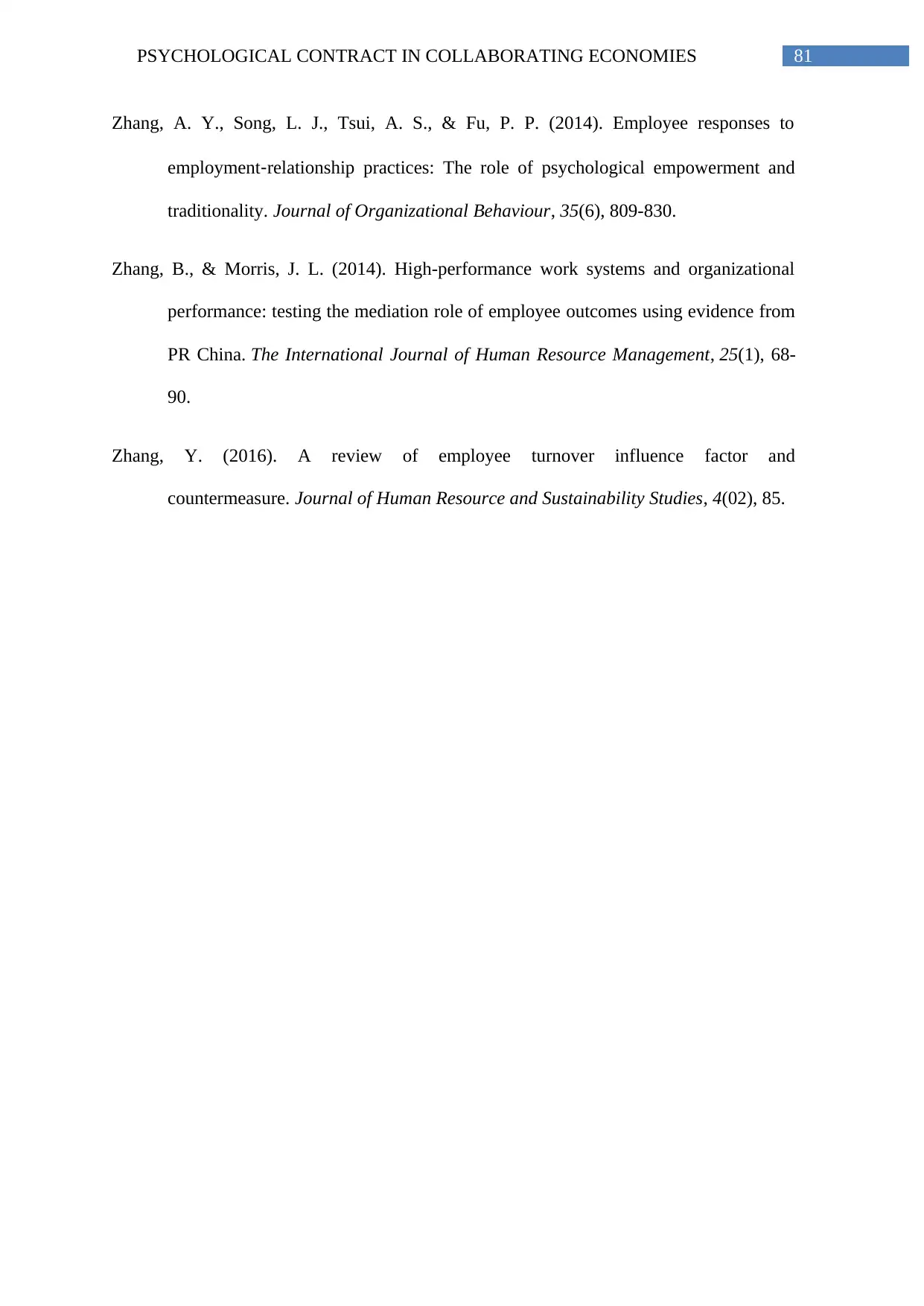
81PSYCHOLOGICAL CONTRACT IN COLLABORATING ECONOMIES
Zhang, A. Y., Song, L. J., Tsui, A. S., & Fu, P. P. (2014). Employee responses to
employment‐relationship practices: The role of psychological empowerment and
traditionality. Journal of Organizational Behaviour, 35(6), 809-830.
Zhang, B., & Morris, J. L. (2014). High-performance work systems and organizational
performance: testing the mediation role of employee outcomes using evidence from
PR China. The International Journal of Human Resource Management, 25(1), 68-
90.
Zhang, Y. (2016). A review of employee turnover influence factor and
countermeasure. Journal of Human Resource and Sustainability Studies, 4(02), 85.
Zhang, A. Y., Song, L. J., Tsui, A. S., & Fu, P. P. (2014). Employee responses to
employment‐relationship practices: The role of psychological empowerment and
traditionality. Journal of Organizational Behaviour, 35(6), 809-830.
Zhang, B., & Morris, J. L. (2014). High-performance work systems and organizational
performance: testing the mediation role of employee outcomes using evidence from
PR China. The International Journal of Human Resource Management, 25(1), 68-
90.
Zhang, Y. (2016). A review of employee turnover influence factor and
countermeasure. Journal of Human Resource and Sustainability Studies, 4(02), 85.
1 out of 82
Your All-in-One AI-Powered Toolkit for Academic Success.
+13062052269
info@desklib.com
Available 24*7 on WhatsApp / Email
![[object Object]](/_next/static/media/star-bottom.7253800d.svg)
Unlock your academic potential
© 2024 | Zucol Services PVT LTD | All rights reserved.